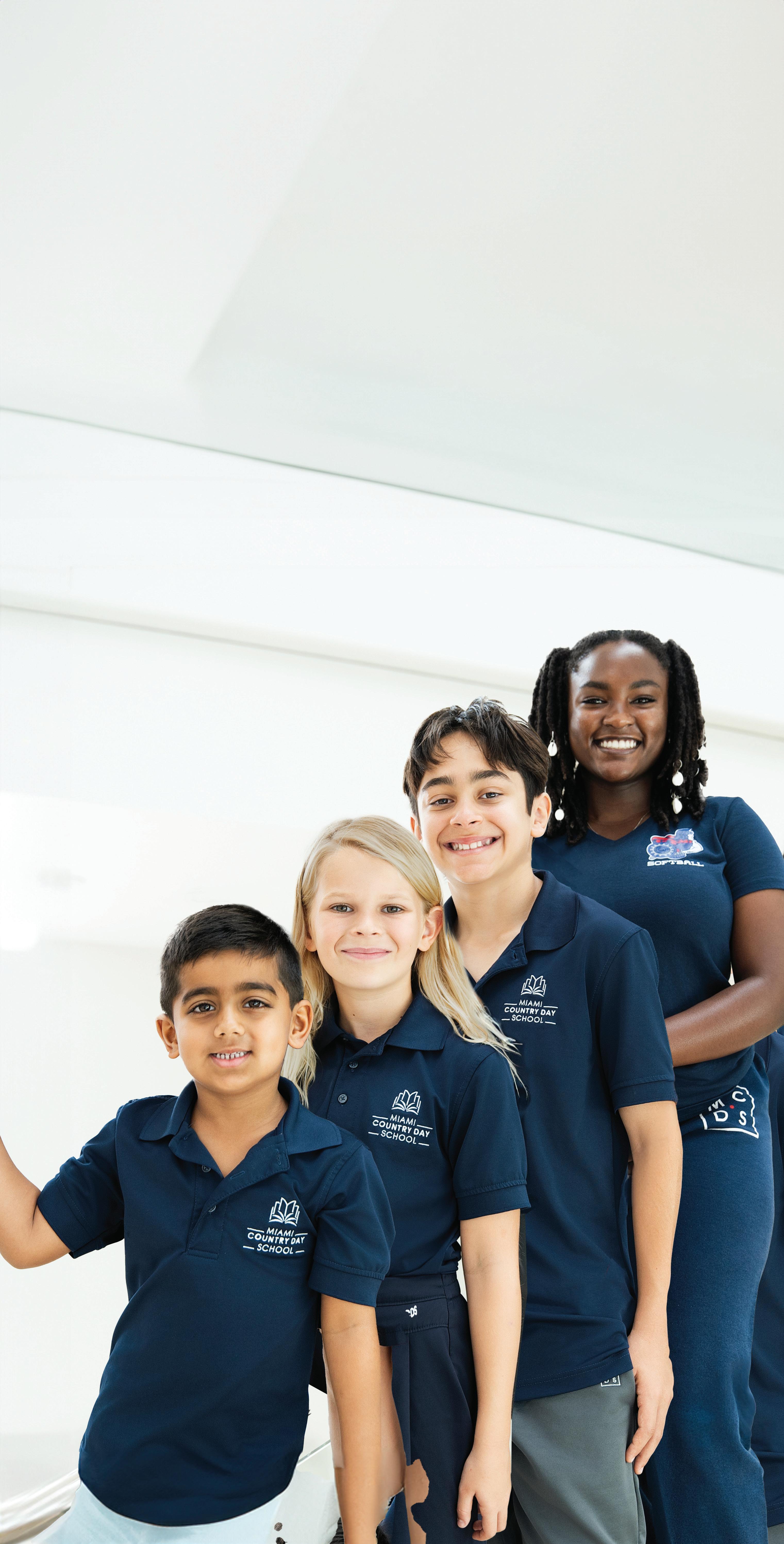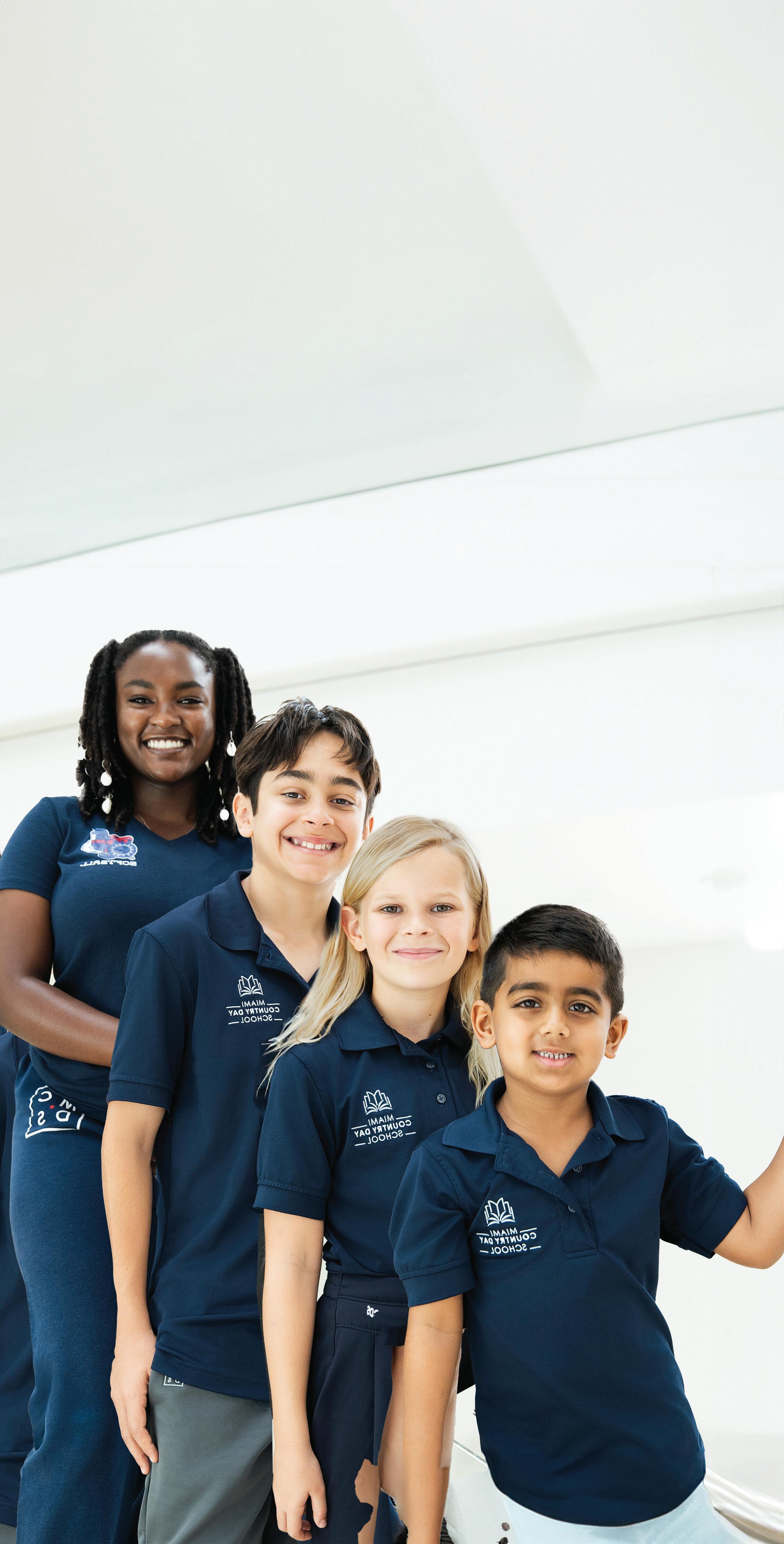
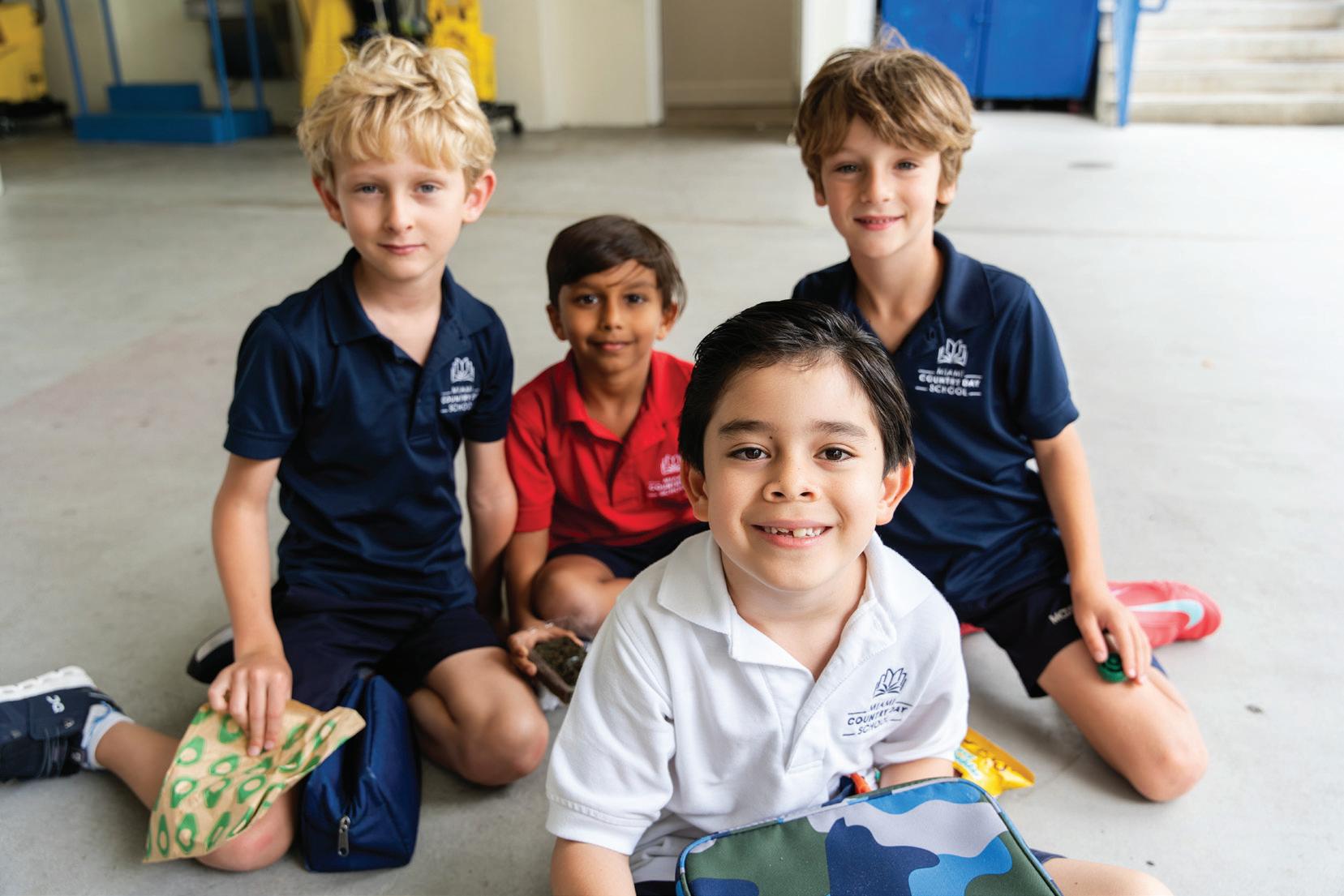
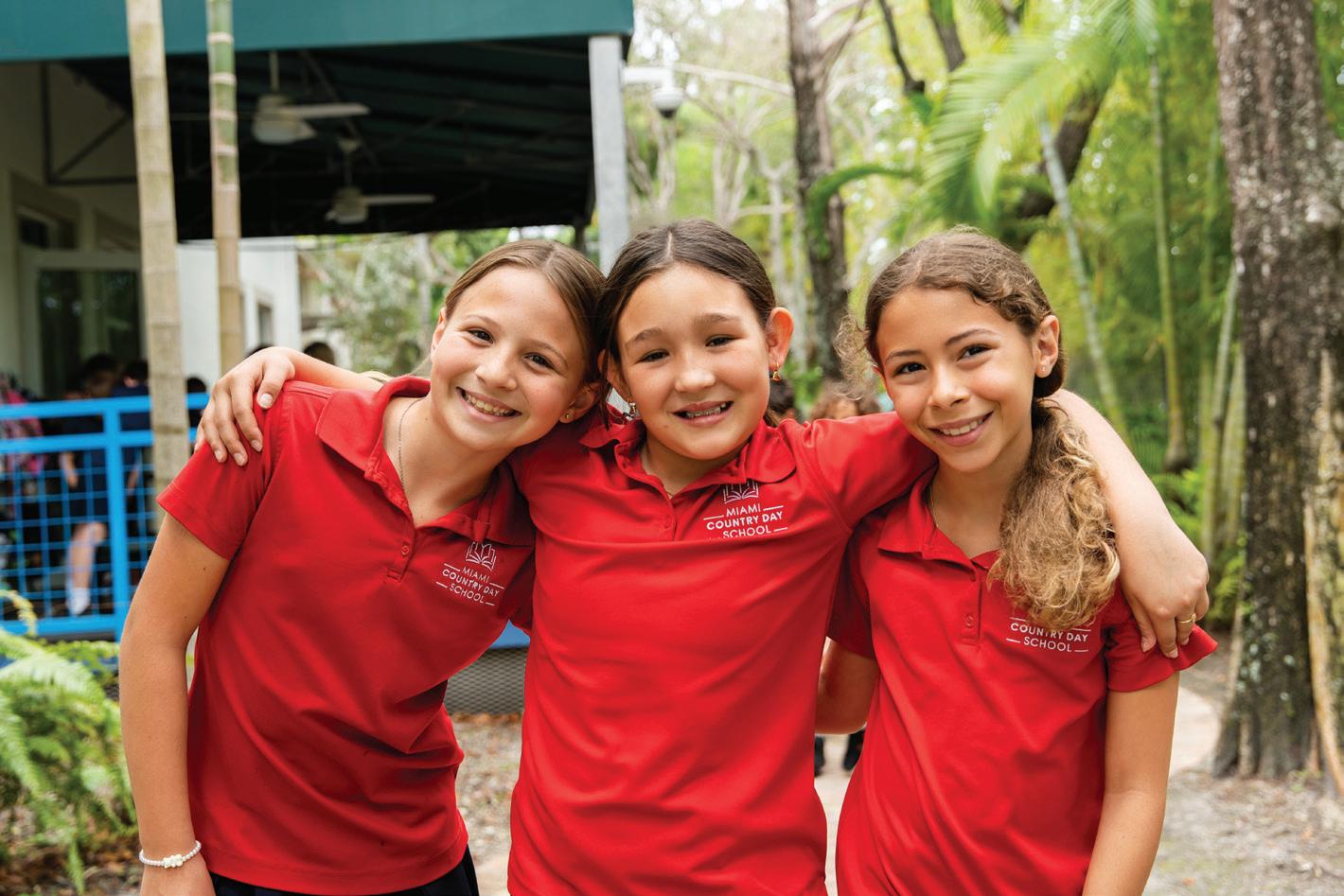
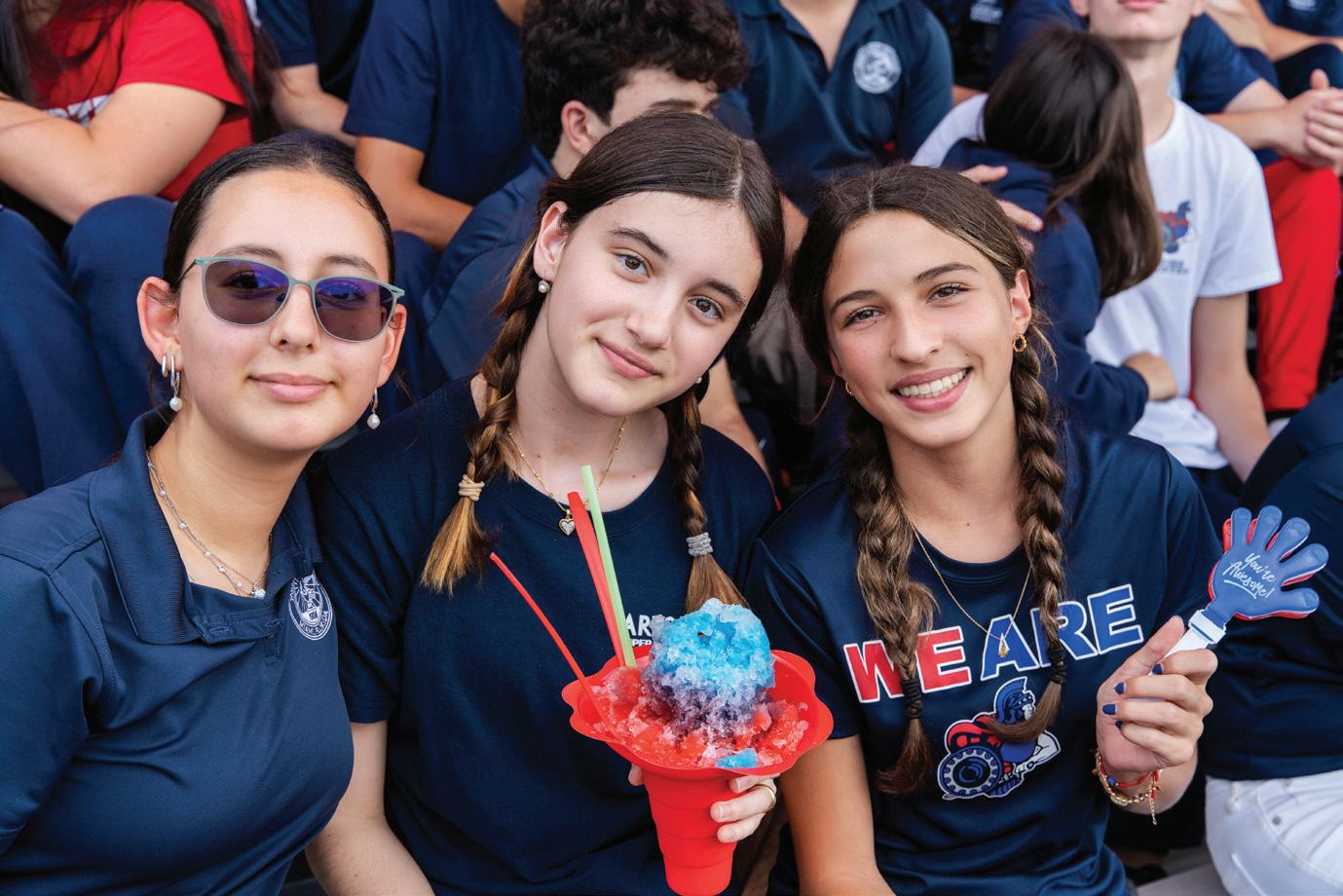
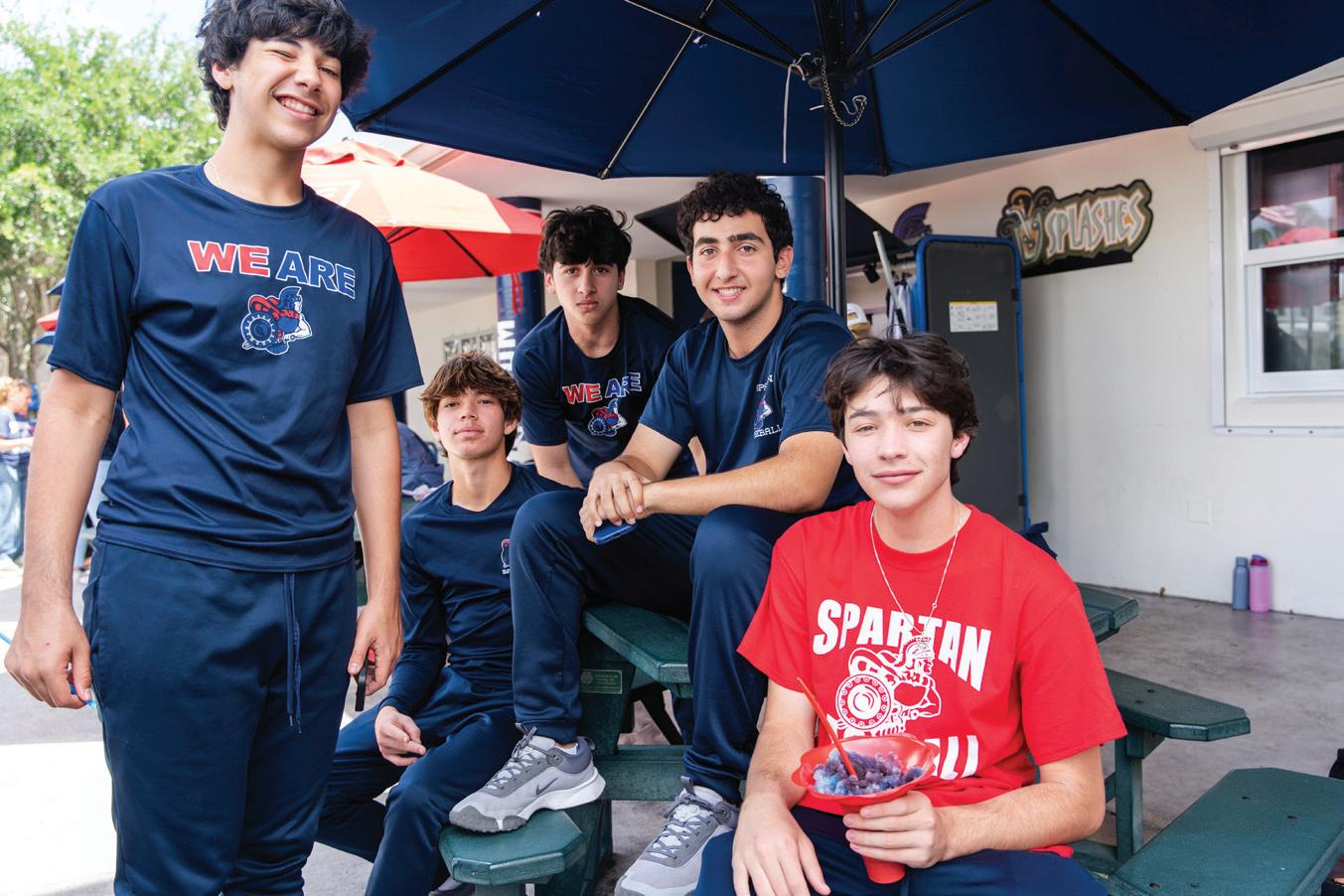

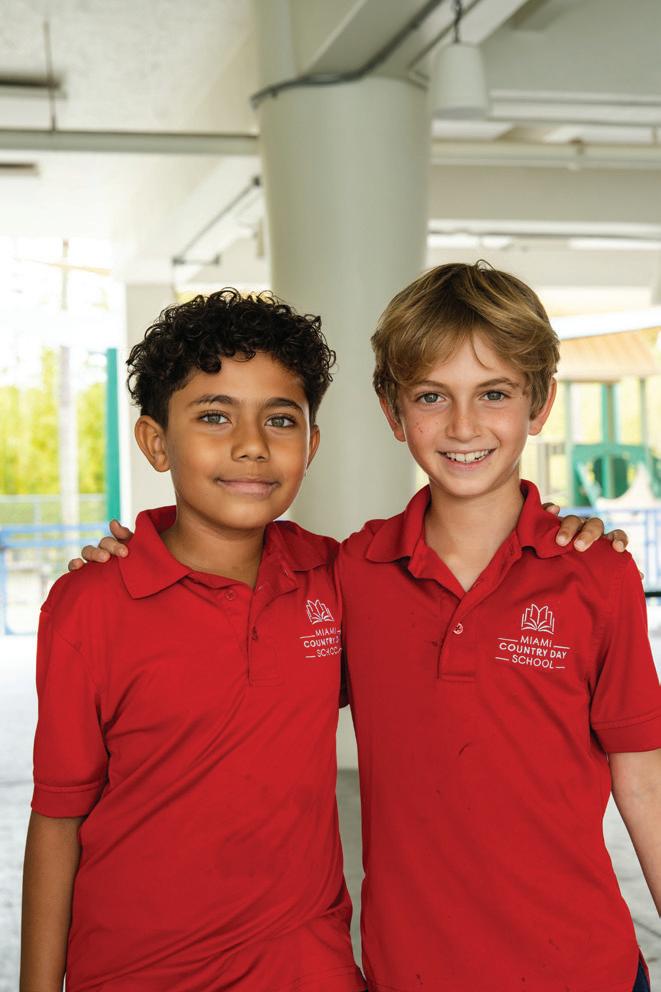
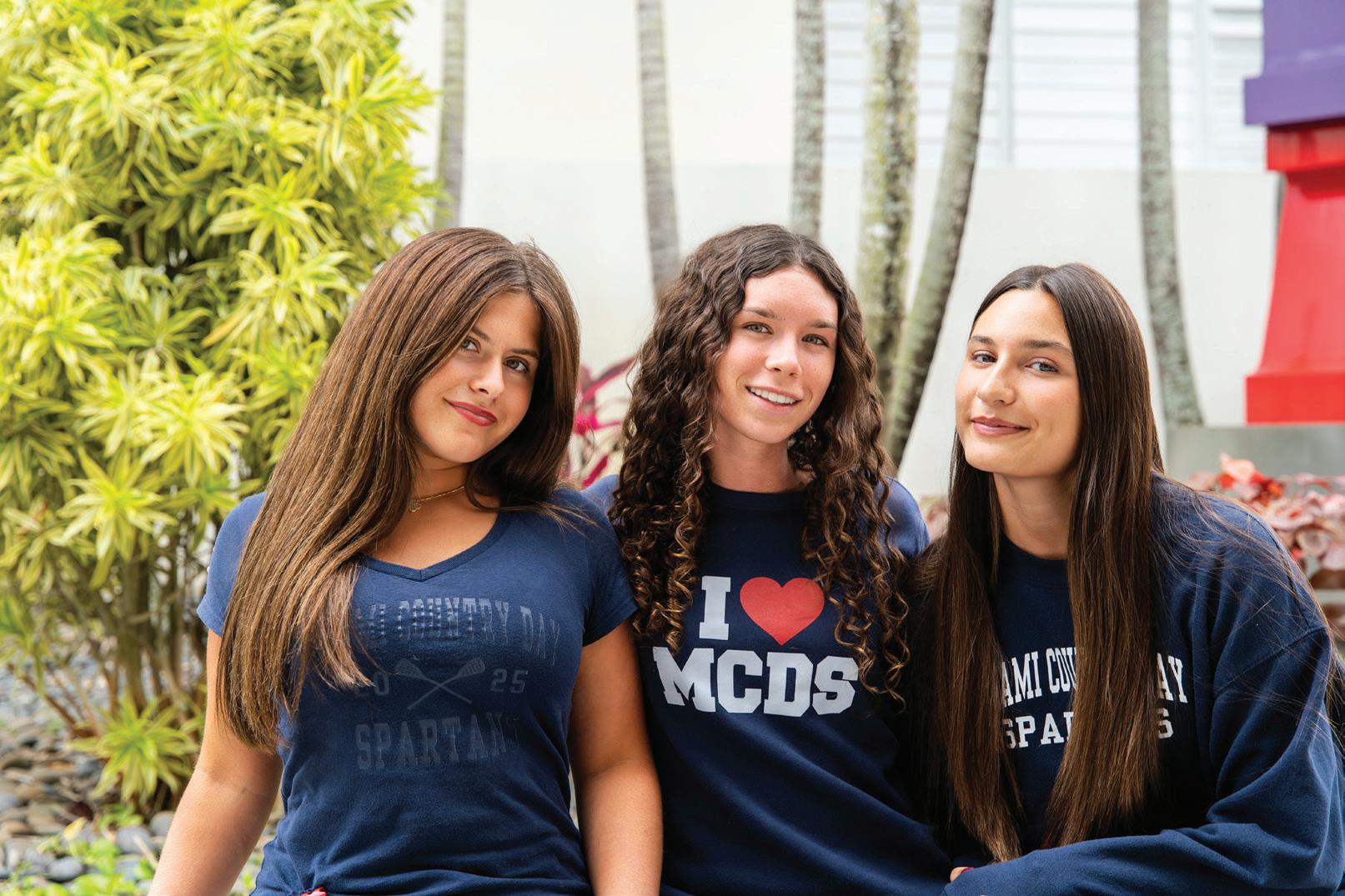
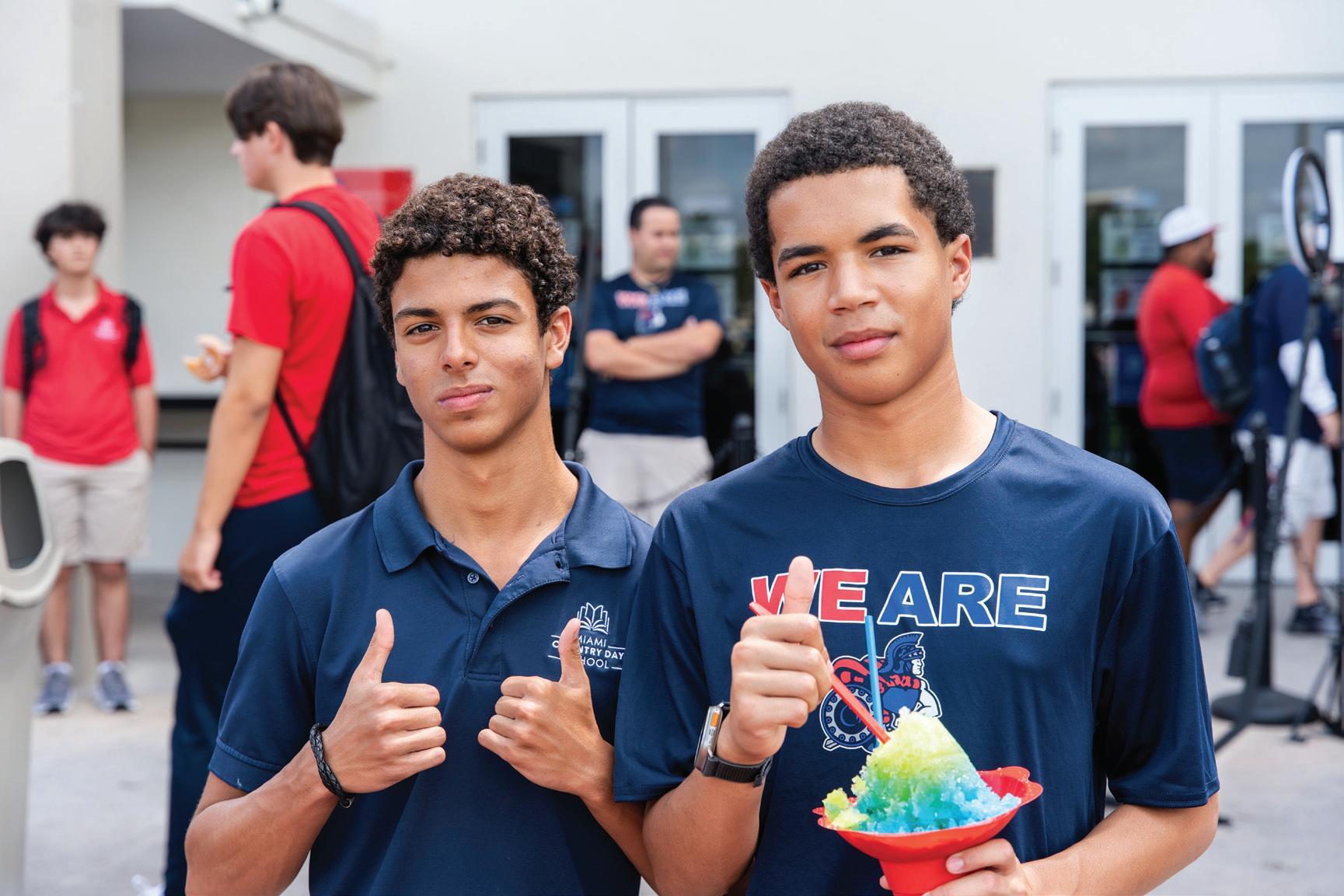
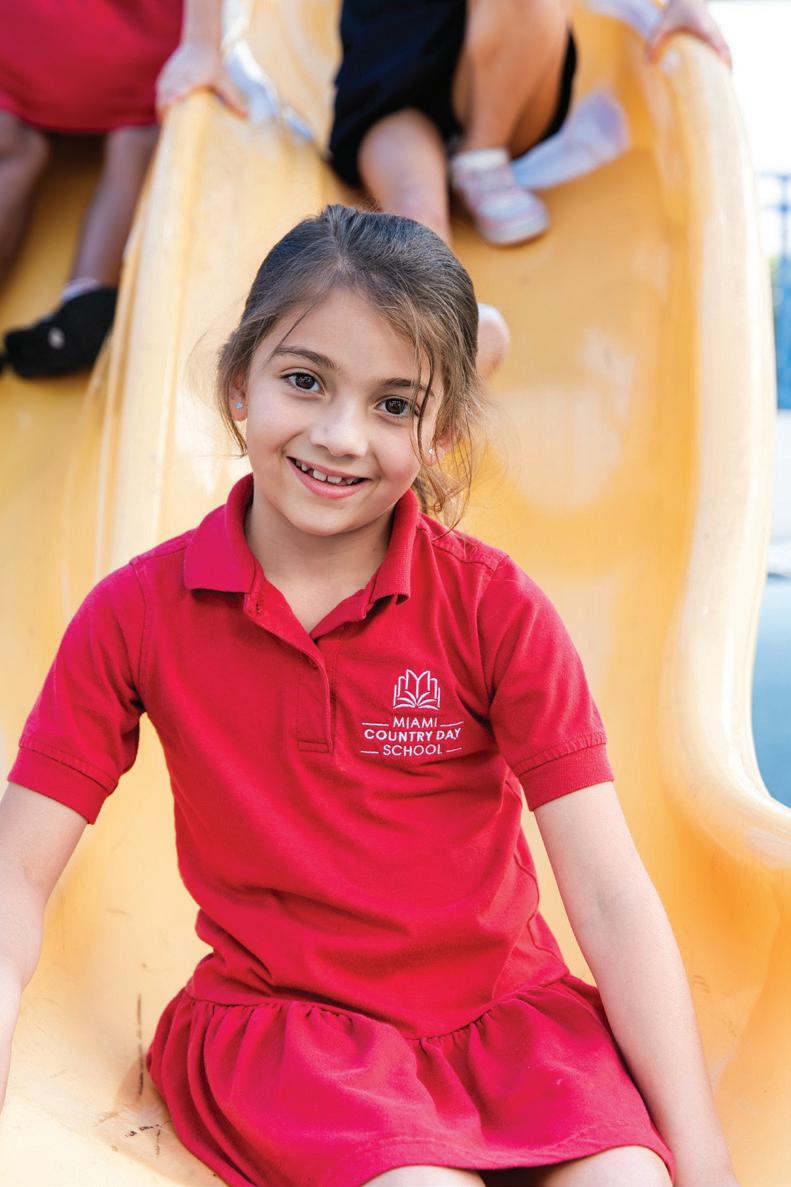

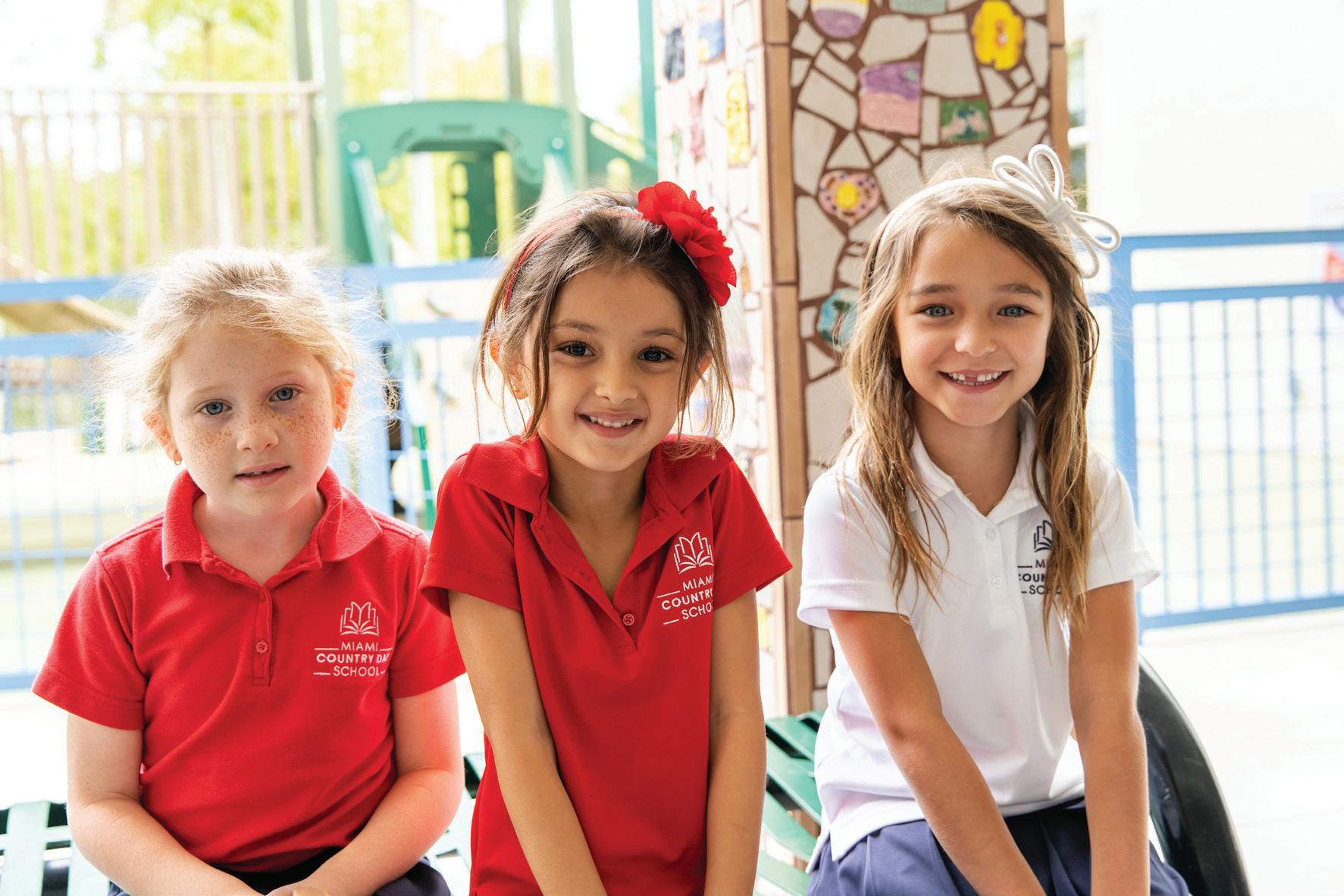
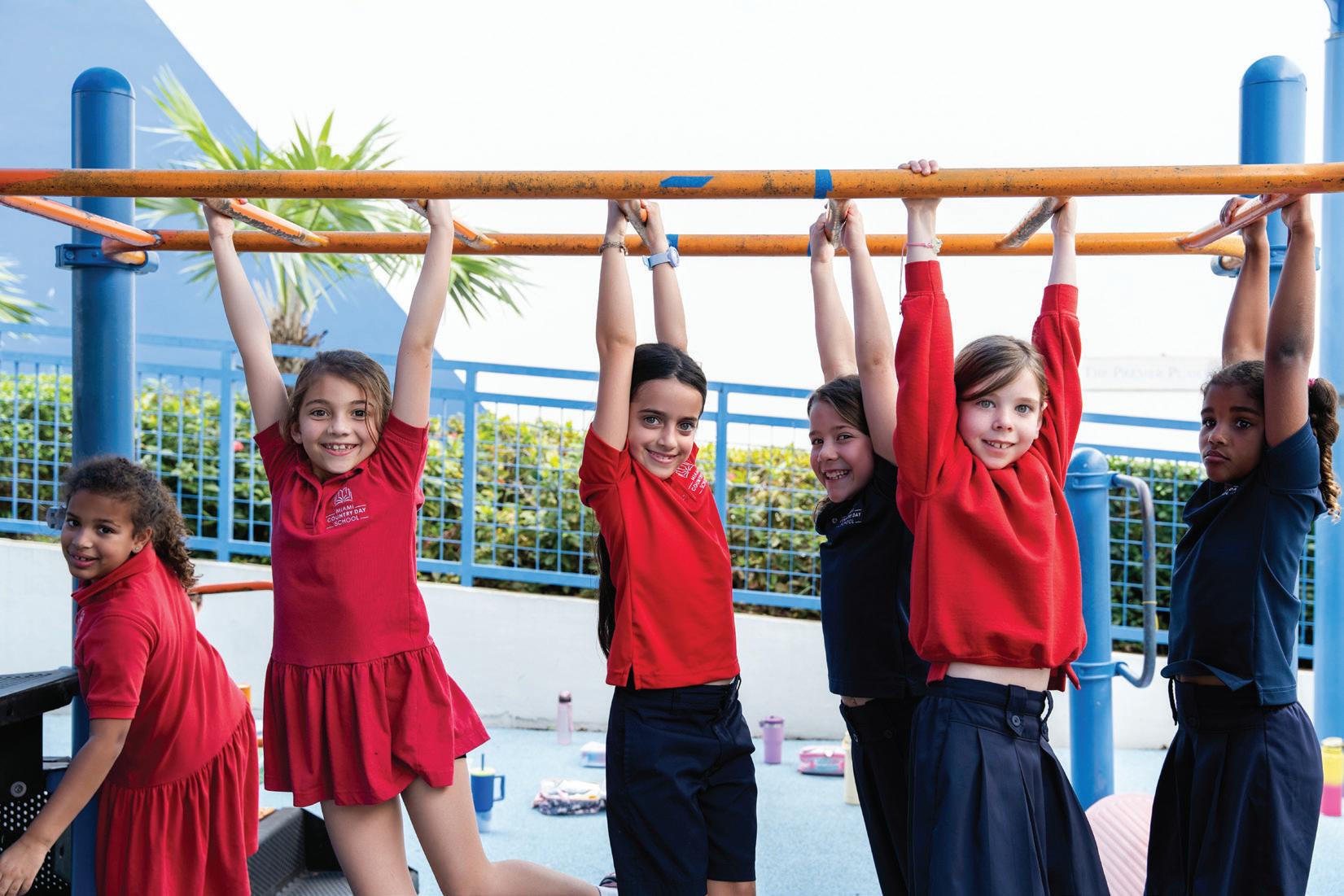
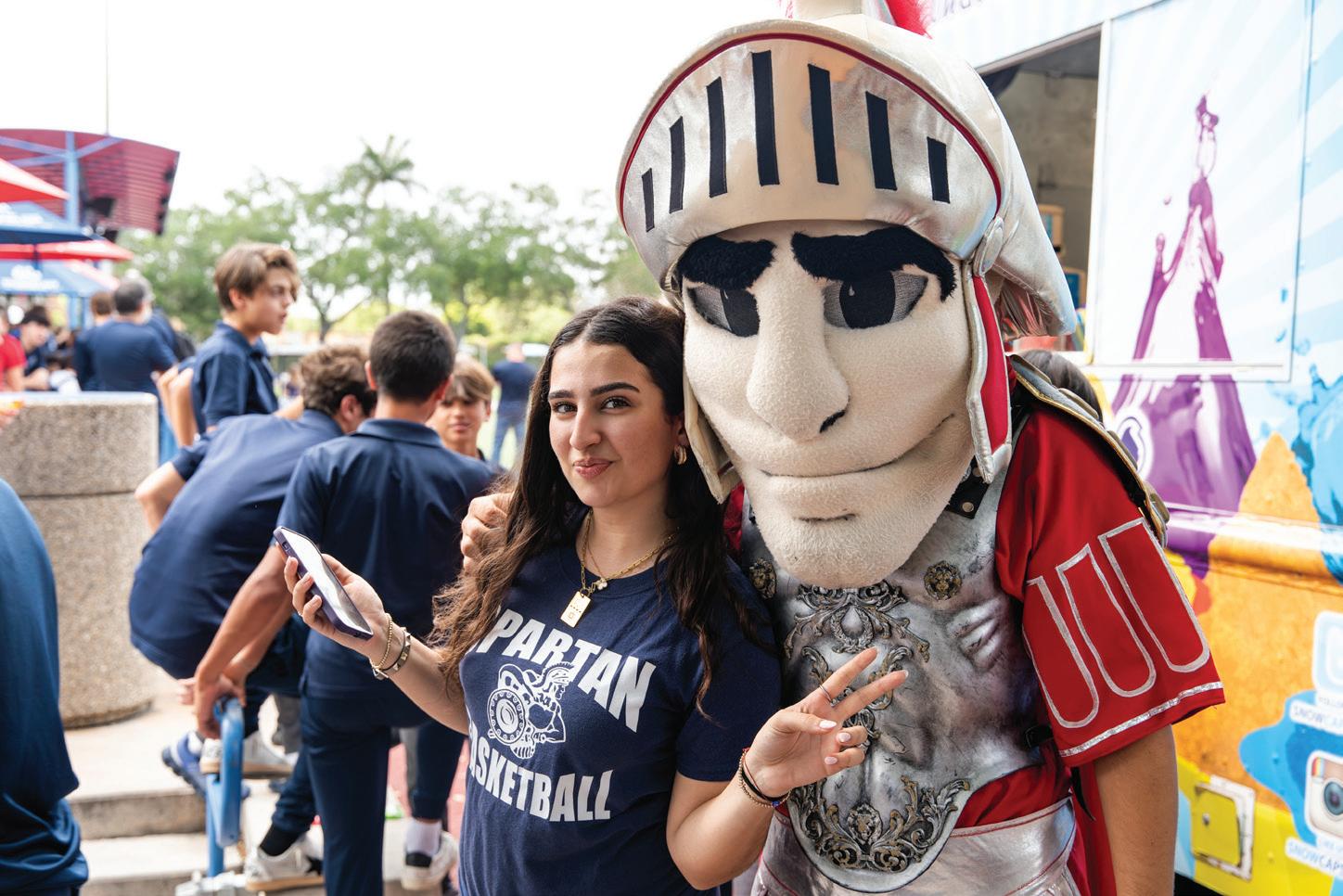
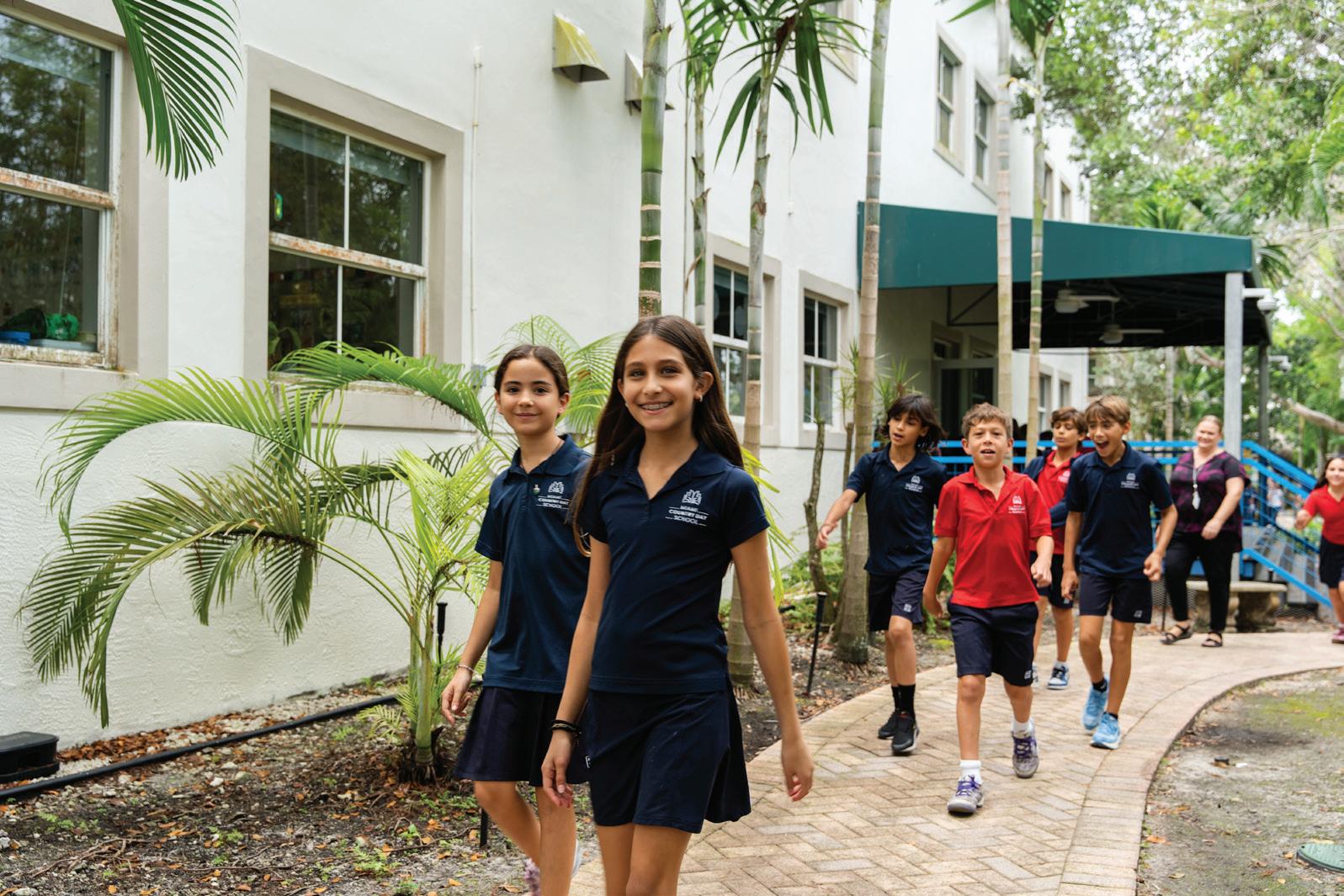
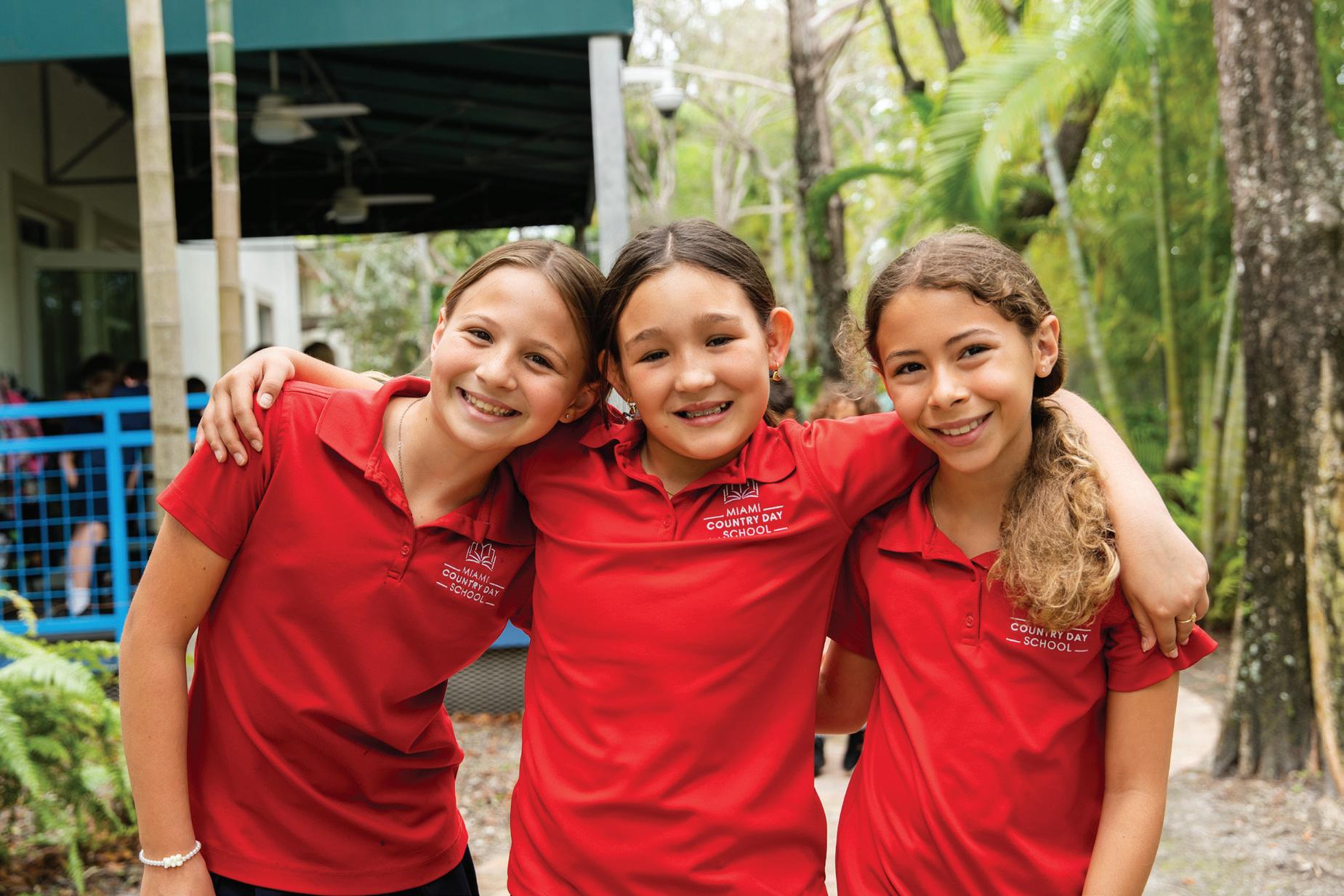

A
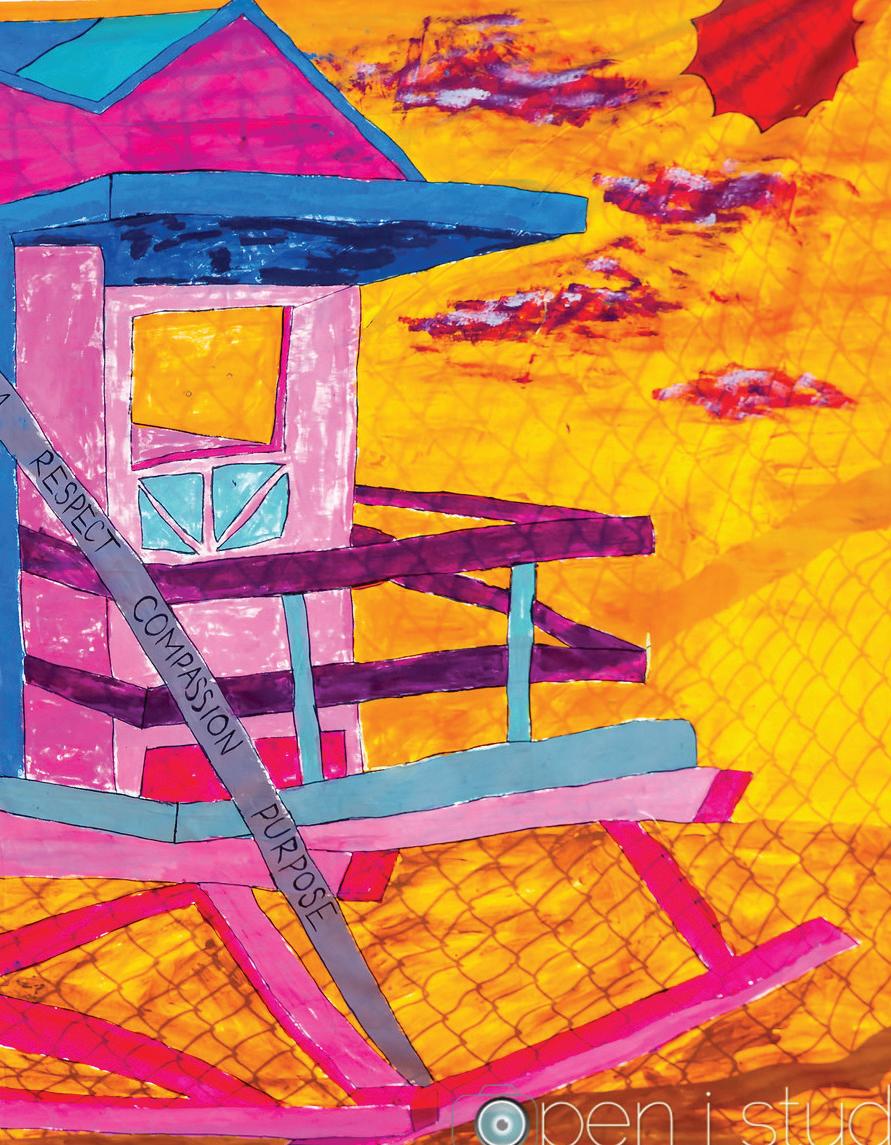
FUTURE


















A

FUTURE
President & Head of School
Welcome to the 2025 edition of The Beacon, the magazine of Miami Country Day School that for decades has informed and delighted our constituents near and far.
This year’s edition of The Beacon illuminates our journey of “Succeeding Together,” showcasing how connection and collaboration elevate us all.
Throughout this edition, you will find evidence of how accurate a description this is of our individual and collective success; every story reveals, upon reflection, a collaborative effort that led to the outcome we are celebrating in this issue.
The Connected Mind class expansion (page 15) is the remarkable result of student initiative and interest, in combination with teacher commitment to help students soar. Our trailblazing faculty who are pursuing their doctoral degrees are enjoying this opportunity in large part through our partnership with the University of Miami. Our global, robotics, leadership, and Advanced Placement programs which have given countless
opportunities to students like Francisco to thrive (page 12), are the result of years of dedicated ideating, executing, and refining by a team of committed educators who believe that nurturing globally aware leaders will build a stronger world for us all.
As you turn these pages, you’ll discover how our trustees envision our future, how our academic innovations are reshaping learning, and how partnerships extend our reach beyond campus walls.
I hope that you enjoy this edition of The Beacon - a true celebration of the Spartan spirit that makes our school, our community, the joyful place it is.
With eternal Spartan Pride,

*Mariandl Hufford* President and Head of School Miami Country Day School
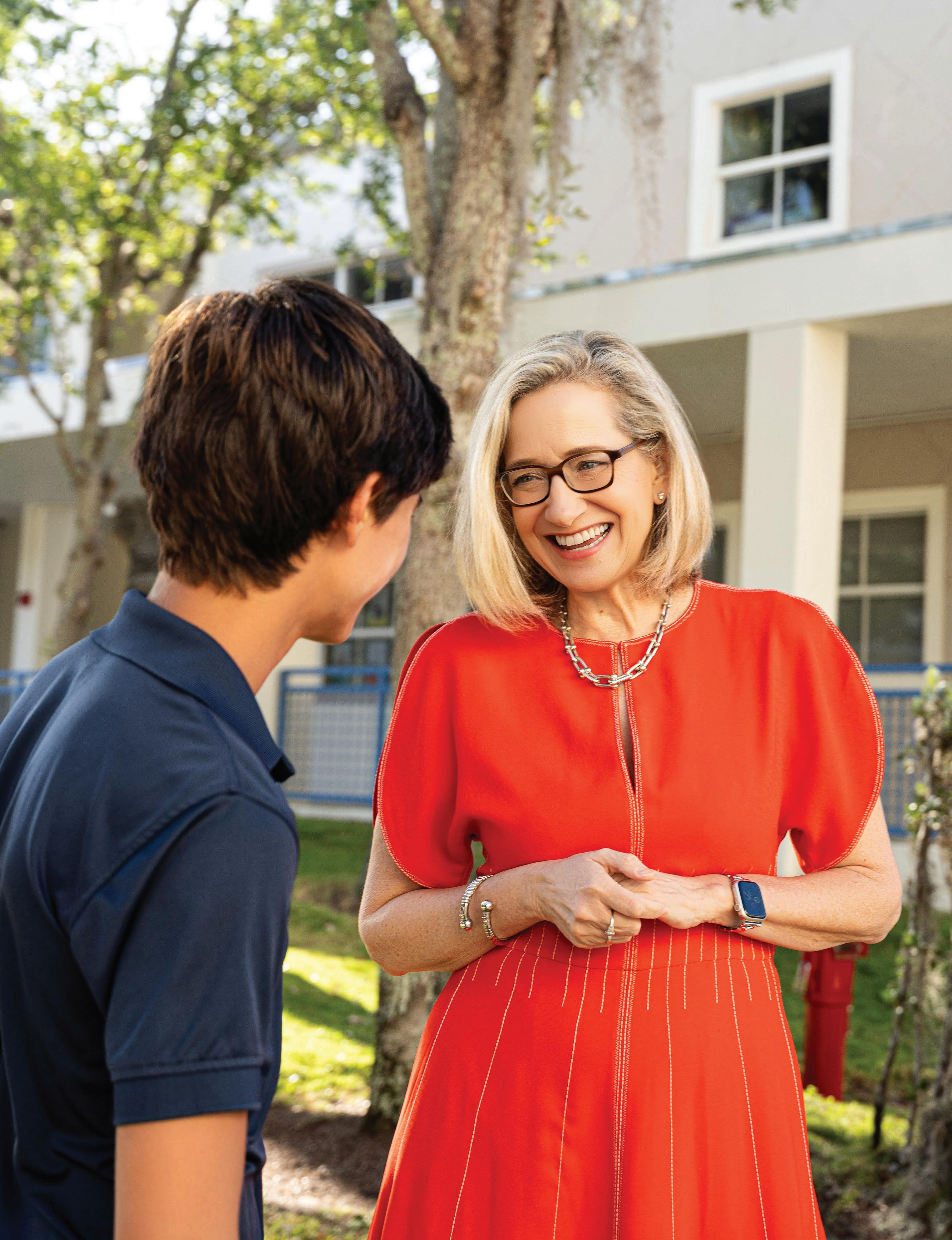
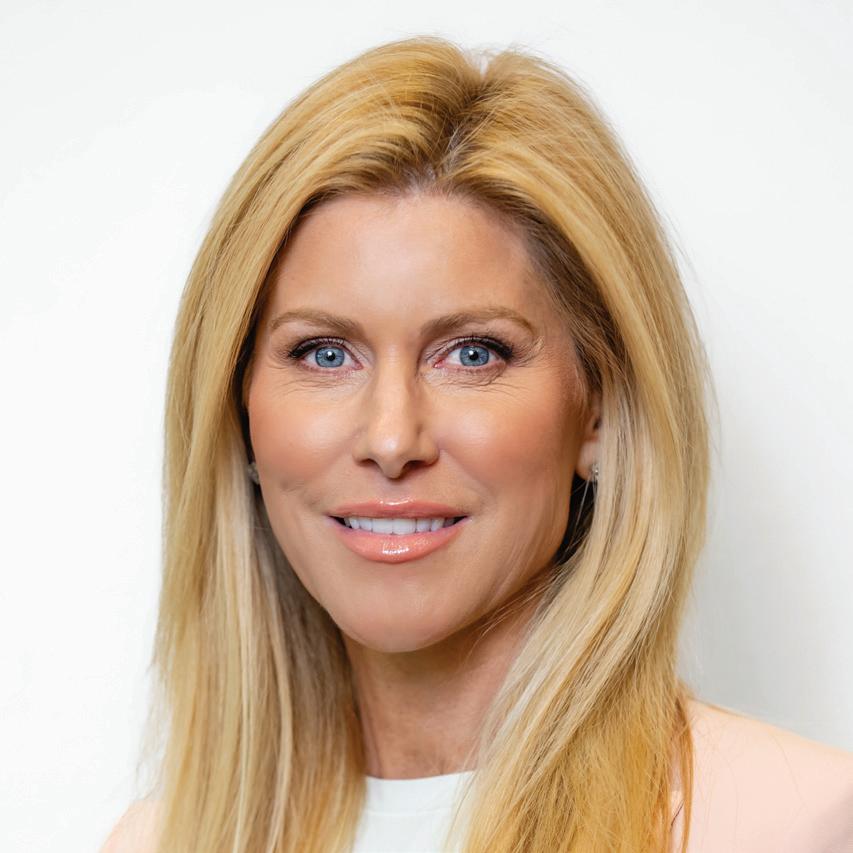
Claudia Brod President of the Board of Trustees
Upon her arrival in the fall of 2019, Mariandl set this vision in motion with the creation and implementation of the Strategic Plan. With great confidence in the future with Mariandl at the helm, the Board of Trustees adopted the Strategic Plan in the winter of 2020. Her leadership has been backed wholeheartedly by our Board, all of whom are deeply committed to Mariandl’s goals and future path for the school. Together, the board and administration have provided the strategic direction, resources and support necessary to ensure that MCDS is continually evolving, expanding, and strengthening our programming, measuring our outcomes, and enhancing our community for students and adults alike.
Mariandl’s partnership with our Board has been pivotal in helping us manage our finances with care and foresight. Attracting and retaining the highest quality educators is the highest priority for both the administration and the board and therefore, a significant portion of our budget—52%—is dedicated to faculty salaries and benefits.
Despite the challenges of Miami’s high cost of living and the national teacher shortage, Mariandl’s leadership and the Board’s steadfast support have enabled us to bring in and retain some of the best educators in the country. Through strategic professional development partnerships with renowned institutions like the Center for Transformative
Teaching and Learning, and the University of Miami, Mariandl and her team are ensuring our academic community continues to grow and thrive.
The Board also stands firmly behind Mariandl’s commitment to the safety and well-being of our Spartan Community. Under her leadership, our security budget has tripled, and we’ve introduced vital safety measures such as a K-9 unit, classroom panic buttons, and perimeter motion detection systems to ensure our campus is as secure as possible.
$2.6M is dedicated annually to campus safety and security, ensuring a safe and supportive learning environment for all our students and the adults who work on their behalf.
As we continue to move our physical campus into the next phase of world class education, we are excited about the 30,000-square-foot Woodhouse Athletic Center currently under construction. This state-of-the-art academic wellness center set to open in November 2025 and will transform the lives of all who step foot on our campus.
Academically we continue to set the standard for educating students both within and beyond the classroom walls ensuring that our graduates are prepared for success beyond our campus. Our curriculum offers students more than 30 Advanced Placement courses,and 128 electives in the upper school alone. Our internationally recognized Model UN program which recently competed at, and, was the only program in the United States to be invited to, the international program in Geneva —an incredible achievement. Our academic competition programming, which begins as early as lower school, has grown exponentially and we now have debate and robotics teams, academic decathletes, and mathletes competing for State titles with programming that enriches all aspects of the student experience,
Recognizing the changing landscape of college admissions, Mariandl, with the support of the Board, has expanded our College and Academic Counseling Team by 33%, which has allowed the team to expand their programming and launch new initiatives like the College Summit for parents of students in grades 8-11 to help families navigate this competitive landscape.
Looking ahead, we are preparing to break ground on a new Upper School building in the next 18 months. This is an essential project given that our current building, originally designed for 250 students, is now serving more than 500. This expansion, supported by the Board, reflects Mariandl’s understanding that modern education requires flexible, collaborative spaces and will allow future generations of Spartans to learn and grow in innovative ways.
Generous, record-breaking gifts from families like the Bravos, the Woodhouses, and others will help bring this vision to life, and the ongoing support from our Board ensures that these transformative opportunities will continue to shape the future of Miami Country Day School. With the Board’s full backing and Mariandl’s forward-thinking leadership, the future of MCDS is brighter than ever.
At such an exciting time in the history of the school, with new facilities emerging from the ground and new programs quickly becoming treasured milestones on the school calendar, the energy, and the ambition of the entire spartan community is palpable and from my perspective is best characterized as big bold plans becoming exciting realities.
Having recently joined the board of trustees after 6 years as a parent and proud member of the community, it’s been an honor to witness first-hand the sense of urgency for progress and continuous improvement in all aspects of the institution. It’s striking to see the alignment and shared commitment between the board of trustees, Mariandl as head of the school, faculty staff and administrators to deliver on the mission; not to mention the incredible hard work these individuals put into turning these big plans into exciting realities.
We selected MCDS for our three children because the school ethos and philosophy immediately resonated with us. We firmly believe that focusing on the ‘whole child’ through a holistic approach best allows the child to discover their true passions, nurtures their leadership skills, builds their confidence, and adds depth to their character. This seems to us to be the best way to prepare them for the future, whatever path they decide to pursue, and in my view is what sets the school apart.
We see this manifested in the signature experiences and annual events that provide the rhythm to the school year; the 4th grade triathlon, demonstrating the camaraderie and perseverance across the grade, the 5th grade show, where everyone plays their part to deliver a five star Broadway quality production, or events like the holiday sing along with the infamous rendition of ’12 days of Christmas’. The introduction of the Middle School house system is another illustration of the evolution of the programing that reinforces the sense of community, belonging, competition (go Shores house!) and, according to my 7th grader, simply make the year more fun.
Although we didn’t know it at the time, we joined MCDS years ago at an inflection point in the school’s development; under the board and Mariandl’s leadership there was a clear determination to cherish the best attributes from the schools proud 85 year history, solidify the vision and mission of the school, while developing a bold and ambitious plan the future. Year by year we have seen those plans turnings into realities, raising the academic, artistic and athletic bar. And now with the new Woodhouse Athletic center, becoming more visible by the day, another plan is becoming a reality. This gives our recently crowned state championship
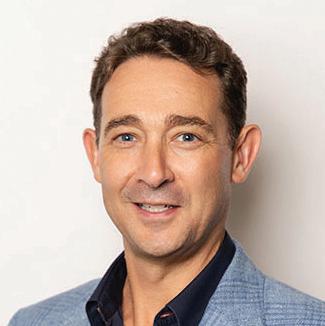
Trustee
basketball team, and the entire school community, a facility that will surely raise the bar to even greater heights.
Hot on the heels of the Woodhouse Athletic center, the plans for the new high school are nothing short of world class and transformational for the learning experience for the students and staff. For anyone like me that has been stunned by a performance in the CFA, that performance is a reflection of the environment, as a determining factor in attracting the best educators in that field, and students’ level up to match the quality of their environment. There is clear consensus as a board of trustees that a new high school facility would raise the academic experience and bar just as the CFA has raised the bar for performing arts, and that’s an extremely exciting prospect. The spirit, generosity and togetherness of the Spartan community has been illustrated by early donors who have jumped on board with the Build the Legacy campaign, including numerous historical sized commitments, to quickly get the campaign to close to 50% of its goal. Lots of work to be done, but with continued support no doubt this will be another big plan becoming an exciting step changing reality which future generations of Spartans will be most grateful for.
Our family is proud to be part of the community and know that as more big plans become exciting realities the best days of the school lie ahead for the entire MCDS community. Go Spartans!
Sincerely
Richard Tester
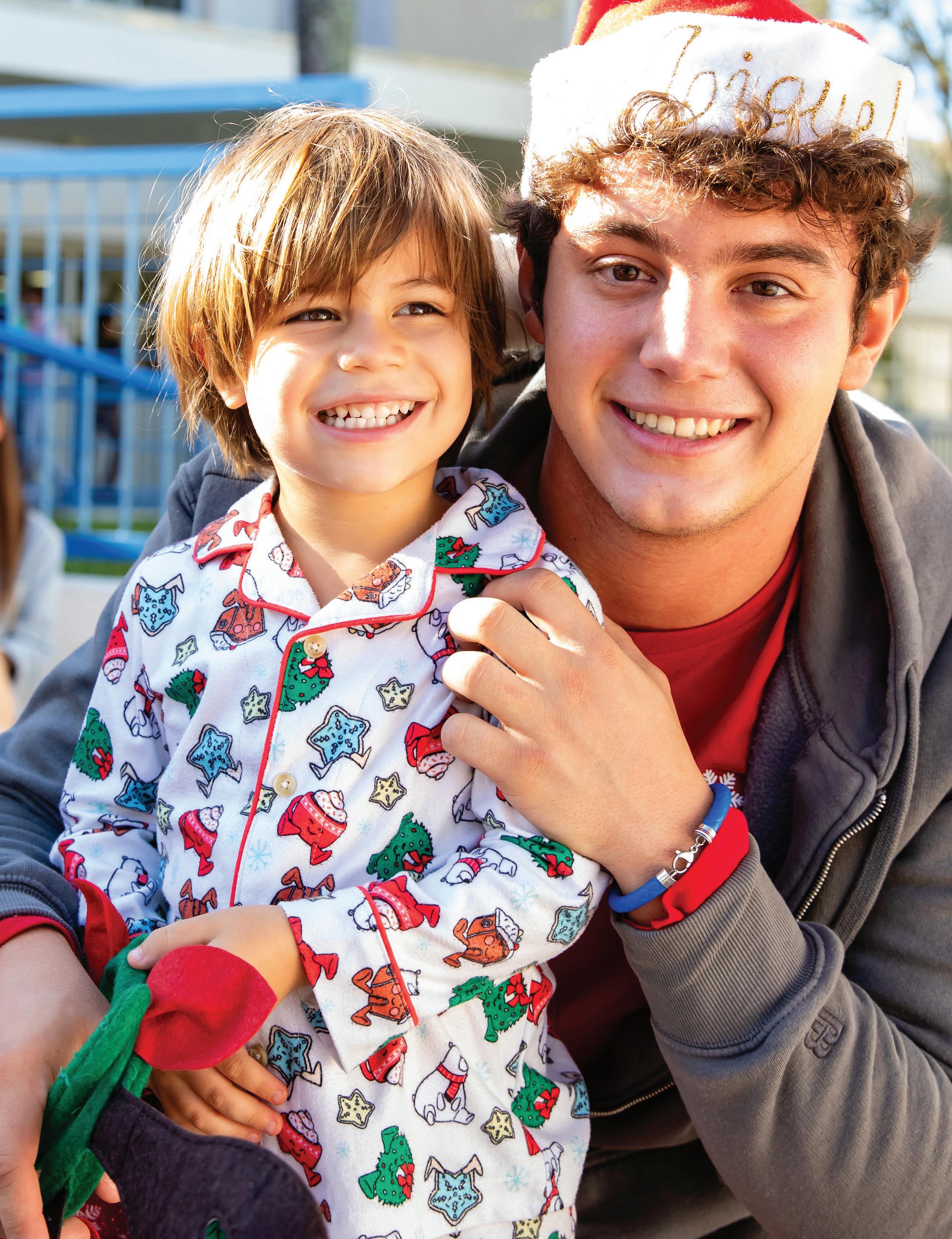
by Georgia Lindemann ’28
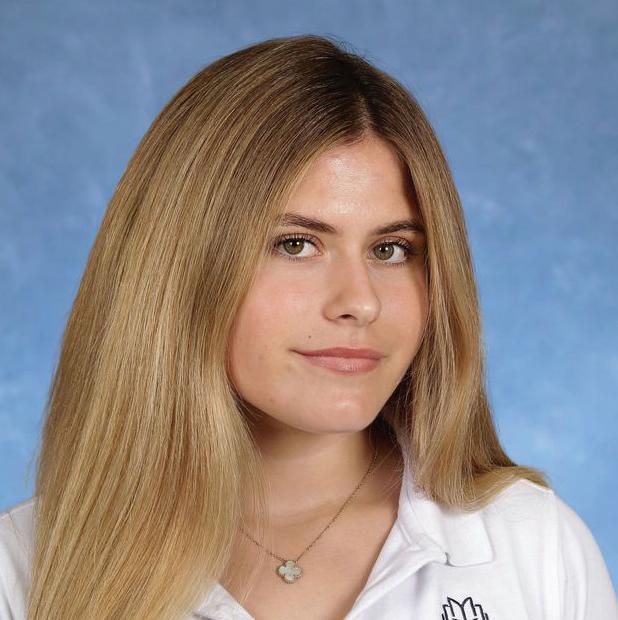
Switching to Miami Country Day School is one of the best decisions I’ve ever made. Coming from a harsh middle school environment, the focus on mental health and finding balance wasn’t always a priority in my academic experience. After three years of feeling overwhelmed by the pressures of that environment, I noticed how happy and at ease my twin brother Cody seemed after transferring to this school. His new sense of calm and joy made me consider making a similar change. While the idea also brought some uncertainty—like how to make new friends and adjust to a different academic atmosphere—I realized it was the fresh start I needed. Although I was nervous, I felt deep down that attending MCDS would offer the balance and opportunity I was looking for.
Before starting at MCDS, the prospect of forming new relationships was daunting, and I anticipated that the transition would be challenging. However, after my first week here, I realized that there was no need for concern. The students were exceptionally warm and welcoming, which made me feel completely at ease from the very beginning. For the first time, I woke up each morning eager to attend school, knowing that my day would be filled with laughter and positive interactions.
One memorable moment was the school trip to the Dude Ranch prior to the start of the school year. I had the opportunity to engage with my classmates in a relaxed setting, which helped me feel more confident and comfortable as I approached my first day. I formed an
immediate connection with a girl in my group named Zoe, another new student, which further eased my transition and provided a sense of companionship.
As the months passed, I had the privilege of building more meaningful relationships not only with students in my grade, but also with those from other grades. This allowed me to embrace my true self and empowered me to be authentic. Attending a school that fosters such a sense of community has not only contributed to my academic growth but also to my personal well-being. I now look forward to school not only as a place of learning but also as a space where I can cultivate lasting friendships.
Initially, I was also apprehensive about adjusting academically and finding a balance, but the electives at Impact Studio made me excited about school and challenged me to think creatively and critically. So far, I have been able to foster my interests in marketing and design by taking “The Impact of Fashion and Design” as well as “The Impact of Design on Visual Culture.” On top of those two electives, I am also taking a positive psychology class called “Happiness Unveiled,” which explores the science of well being. These electives are all super interesting to me and I never thought I could study them this early in my academic career. That is one of the reasons I love Miami Country Day, because it allows you to study what you are genuinely interested in and helps you develop a sense of what you want to do career-wise. I feel that this is what sets me up for a positive future, whether in marketing and design, or a new passion I find along the way. Overall, Miami Country Day offers a dynamic and enriching environment that not only allows me to explore my passions but also challenges me to grow intellectually, setting a strong foundation for my future.
Throughout the years, the journey from middle school to senior year of high school is filled with growth, challenges, and unforgettable memories. What once felt like an endless road of tests, friendships, and self-discovery has now led to this final chapter. From uncertain middle school beginnings to the pressures and triumphs of upper school, each step has shaped not only academic achievements but also personal resilience and character. Now, standing on the precipice of graduation, each student takes a moment to reflect on how far they have come and the exciting future that lies ahead
At Miami Country Day School (MCDS) every journey is unique, punctuated with passion projects, self-discovery, and unavoidable moments of doubt, but always buoyed by the support of the faculty, classmates, and the strength of the school’s partnership with every family. For Francisco Apraiz there is much to reflect on. Originally from Argentina, he and his brother moved to the United States in 2020 just before the COVID-19 pandemic. Francisco, a true Global Citizen; a citizen of Argentina, Australia, and Spain, faced this significant transition with his signature perseverance and adaptability, his most distinguishing qualities.
As an 8th grader, in a new country at a new school during the pandemic, Francisco had a lot to navigate. While he spoke basic conversational English he was now immersed in rigorous academics that demanded a deeper mastery of the language and this is where the magic that is MCDS began for Francisco. He began English as a second language (ESOL) classes with Ms. Ferro. Through guided lessons and instruction coupled with independent learning, Ms. Ferro equipped
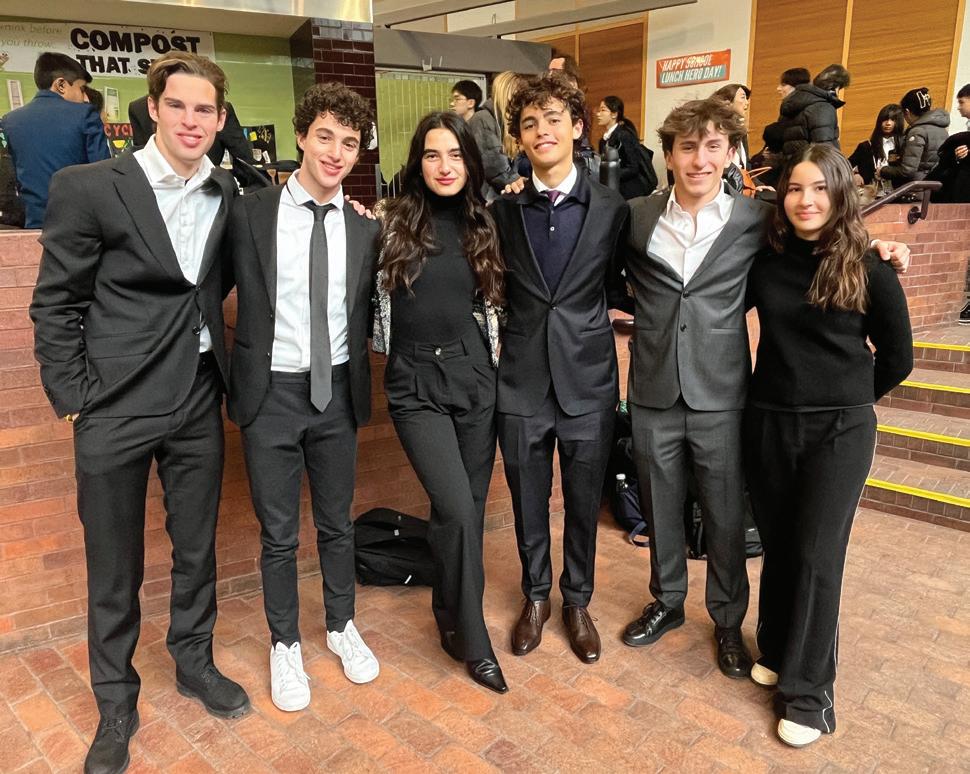

Francisco with the confidence needed to excel. These lessons served as his launchpad and allowed him to develop the life skills that continue to be instrumental in all aspects of his life.
At MCDS all life experiences come together to create each student’s unique experience. Francisco, an avid tennis player, made the team in his first year at MCDS. This allowed him to expand his social circle and make lifelong friendships. Once in Upper School, Francisco quickly made his mark as a student who leads by example and motivates others to be their best. The faculty quickly took notice and he was offered a position on the honor council where he had the opportunity to work with students and faculty alike to ensure that all at MCDS honor our core values, each of which he holds himself to each day. He used the practical skills he developed there as a founding member of the Debate Club where he displayed leadership and initiative with a maturity beyond his years. But for Francisco, this was only the beginning.
Francisco realized in his junior year that it is never too late to follow your passion. While speaking to a friend he learned about the new competitive FTC Robotics Team. With hopes of studying mechanical engineering and physics in college, he was intrigued and joined the team. In his first year, the team finished 20th out of 34 in the region. In the last match of the year the robot broke down and the entire team was disappointed, but not deterred. Francisco was determined to not let that happen again. He was named Captain of the team and spent the summer creating a code of conduct and procedures for how and when teammates would work on the robot. Throughout the summer, with the help of Ms. Haswell, he worked on the robot’s drive train, a major constant needed to be competitive. This ensured the team entered the new school year ready to compete at a high level. His hard work, under the tutelage of the MCDS Garner Center for Innovation faculty, and the dedicated mentorship of numerous MCDS parents, paid off and in only the second year, the team made it all the way to the State Championship match!
As senior year approached Francisco continued to diversify and avail himself of all the opportunities MCDS has to offer. He was chosen as captain of the varsity tennis team and
volunteered at the Maccabi Games in the MARJCC at Aventura. As a counselor for younger kids at MARJCC, he has led weekend activities and retreats, fostering community engagement and leadership among peers. He traveled to Honduras twice to work at Nuevo Paraíso group home and sought out new opportunities to help others and expand his horizons through X-terms that taught him to fish and allowed him to visit numerous college campuses.
However, it was not always easy, the more he immersed himself in all MCDS had to offer the busier he got. “The busier I am the more efficient - as I played tennis, and competed in debate and robotics while taking Advanced Placement classes, I became increasingly busier but my grades got better. I relied on those initial lessons I learned at MCDS where Ms. Ferro taught me how to accept guidance and balance that with independent learning and initiative.” Stretching himself led to great self-exploration. Francisco had never been interested in art, but after a conversation with his advisor, he decided to enroll in AP Art History. There, he discovered the ways in which art shaped culture and history and he developed a deeper understanding of the interconnected nature of all of his classes. On a family trip to New York, his mother was surprised that her previously disinterested son wanted to visit the Metropolitan Museum of Art. She was shocked to have to pry him out after four hours of examining the art.
When asked how he managed to accomplish so much, Francisco immediately credits the resources available at MCDS. He acknowledges that the extra help every faculty member provides after school each day played a large role in his success and he advises students to avail themselves of
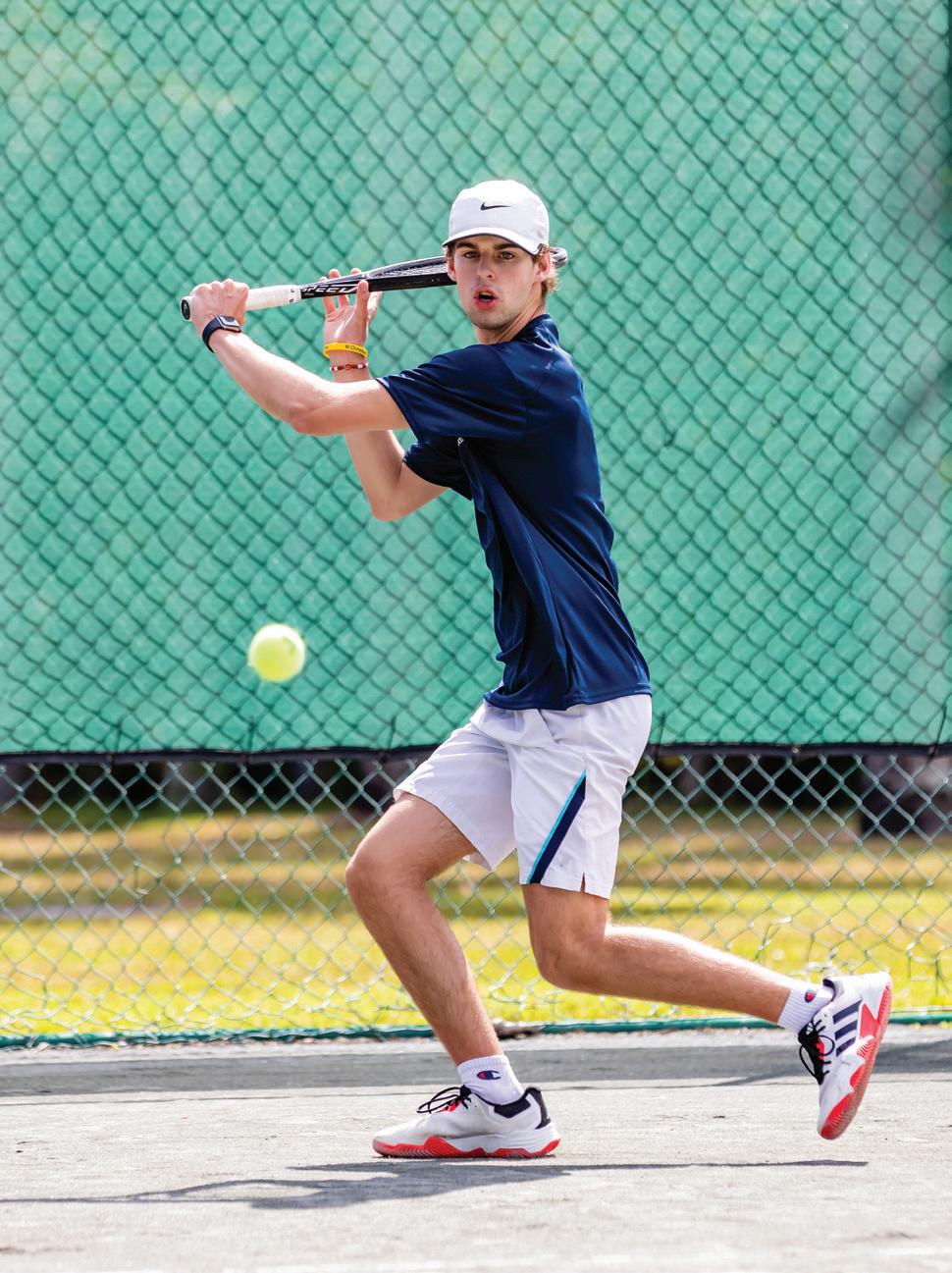
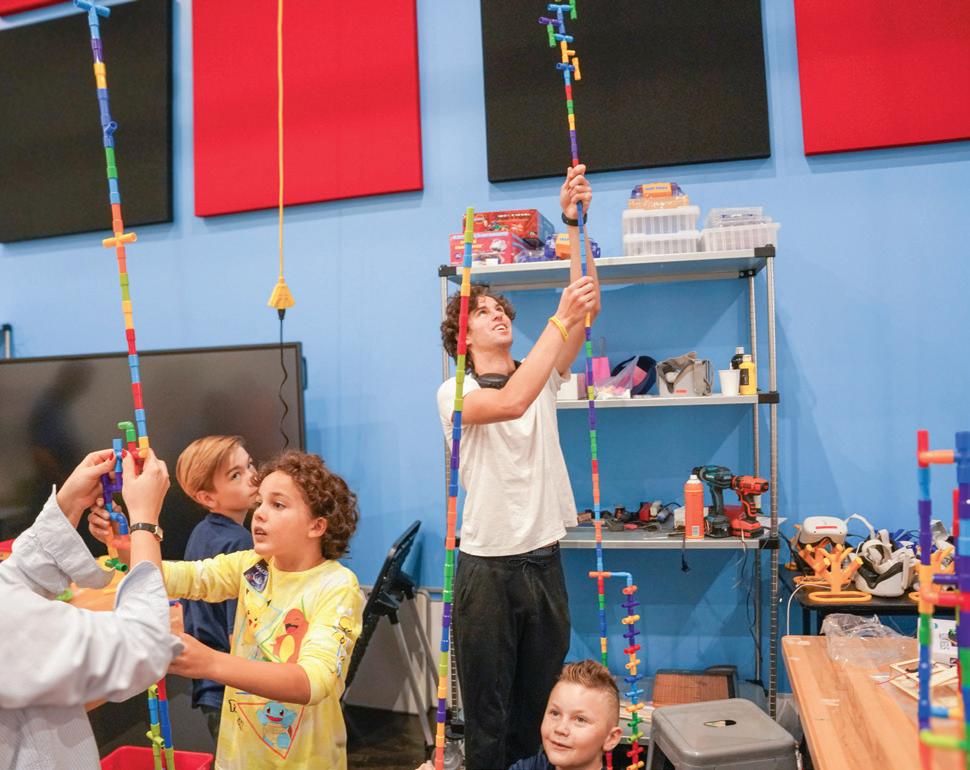
the extensive support system that is available to everyone right on campus. You can see the admiration and gratitude in his eyes as he spoke of the guidance and support received from Ms. Kelly, Mr. Spatig, Ms. Gordon, Ms. Sardina, Ms. Haswell, Mr. Fulton, Mr. Doyle, and so many other visionaries that bring unmatched opportunities and high-level learning and to every student every day at MCDS,
As he prepares to graduate and continue his studies in Philosophy and Physics through the dual degree program at Columbia University and Tel Aviv University, Francisco has become increasingly reflective of his time at MCDS. When asked what his favorite Upper School tradition was, his answer reveals who he is at his core; a Spartan. While he missed his senior brick ceremony to compete at the Robotics State Championship, he quickly noted that the brick that bares his name will always remind him of the concrete way each of his classmates made their own lasting impact and how together as the class of 2025, they are forever woven into the fabric of MCDS.
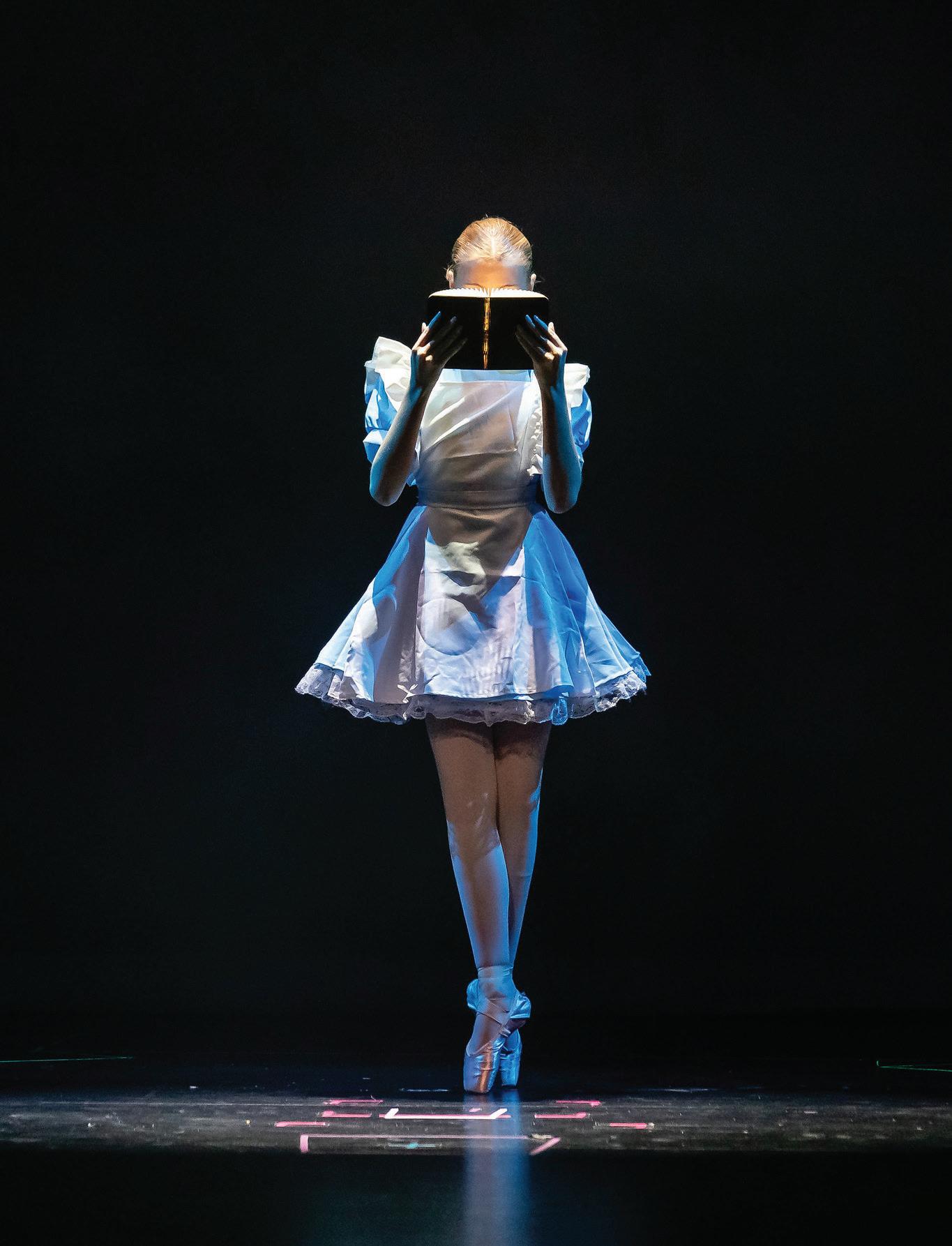
By Kelley Brill Middle School Teacher
When I was in graduate school, I read a book titled Neurotech. This was my first exposure to the science behind learning and teaching, and I was immediately hooked. My curiosity led me to pursue professional development opportunities through Miami Country Day School (MCD) to deepen my understanding of neuroscience and education. I attended multiple Learning and the Brain conferences and became involved with the Center for Transformative Teaching and Learning (CTTL), where I participated in numerous training sessions both online and in person. Seeking to further solidify my expertise in the field, I applied to Johns Hopkins University and was accepted into their certificate program in Mind, Brain, and Teaching. These experiences broadened my perspective and reinforced my commitment to applying neuroscience principles in education.
The middle school curriculum that I developed was the result of a collaborative relationship with Dr. Jim Winston, a parent at Miami Country Day School. About five years ago, Dr. Winston approached me with information about a research project he was funding through the University of North Carolina at Chapel Hill (UNC). The project, through the Winston National Center of Technology use, Brain, and Psychological Development aimed to understand the impacts of social media and technology use on adolescent brain development. Intrigued by the initiative, I joined Zoom calls with the researchers and engaged in in-depth discussions about their findings. Once I fully understood the developmental processes and the potential consequences of excessive technology use, I knew I had to act. Facts such as, adolescence is the second most import developmental time other than infancy (National Academies of Sciences, Engineering and Medicine, 2019. The Promise of Adolescence: Realizing Opportunity for All
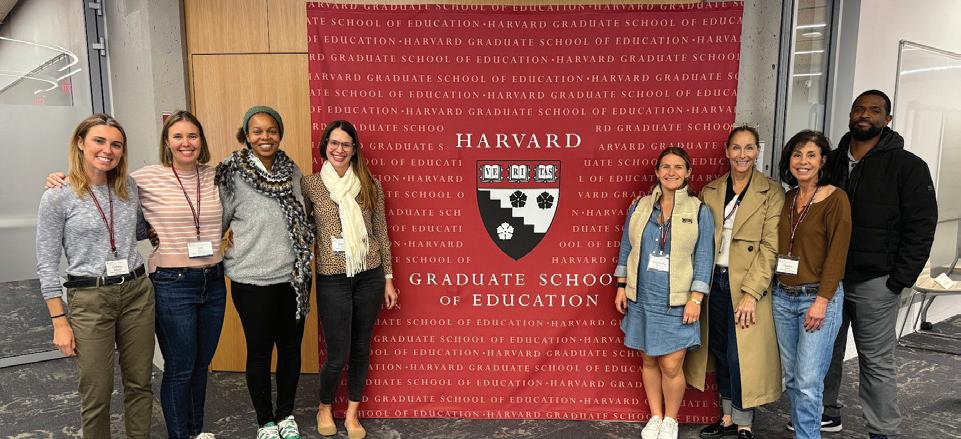
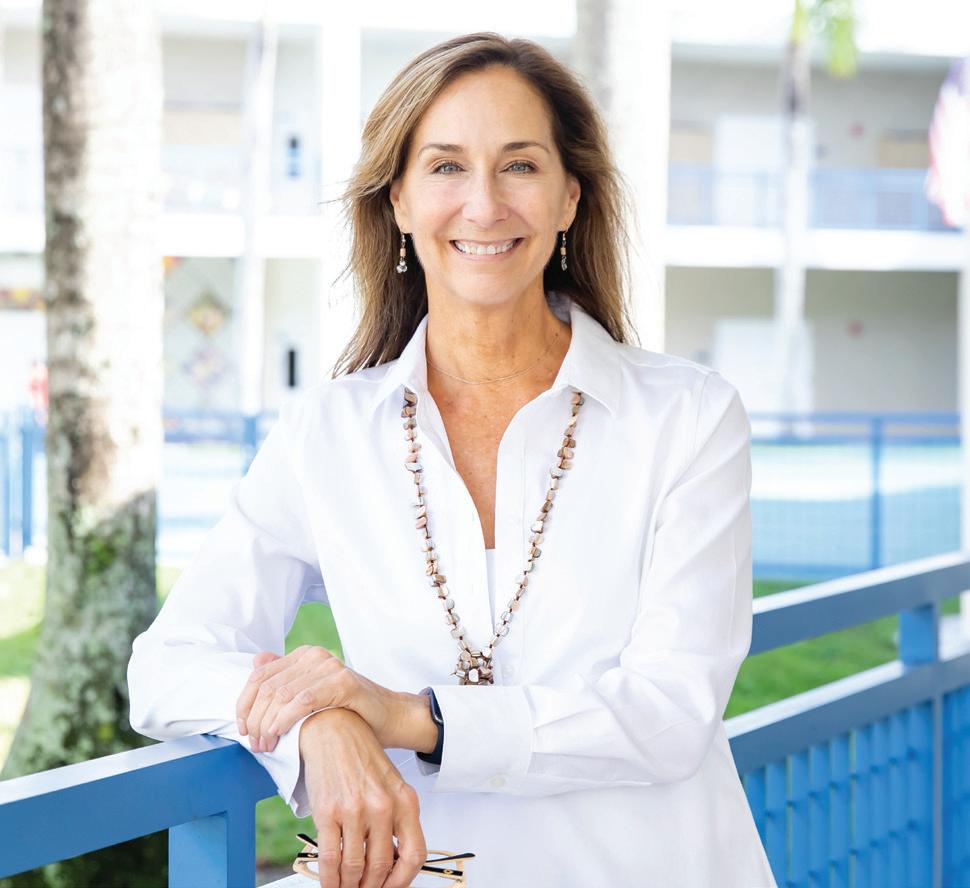
Youth) and adolescents who were more “addicted” to checking their phones, showed an increase in dopamine release over time (the brain chemical that makes us feel pleasure and stimulates our reward center, and is related to many addictive behaviors like gambling, alcohol, and drugs) ( Goldfield, G. 2024, November 6). No more FoMO: The impact of social media scrolling on brain development. Psychology Today.) To stay informed, I review articles weekly on the neurobiological effects of technology use. I use that knowledge to create lessons that address the many challenges that today’s young people face in an increasingly digital world.
UNC developed a freshman-level university course which I used as a model, I combined their course topics and my outline crafting a middle school curriculum that aligned with national health standards while incorporating neurosciencebased teaching strategies. This course became an essential, hands-on elective that educated students on the cognitive and emotional consequences of social media use. Thanks to the support of my department head and middle school director, the course has been an elective for the past five years and will remain an elective for the 2025 – 2026 school year, ensuring that students continue to receive critical education on this important topic.
Last year, I was approached by Michelle Tibadeu, an upper school educator and capstone mentor, who shared that a student named Senaya Miles had developed a deep
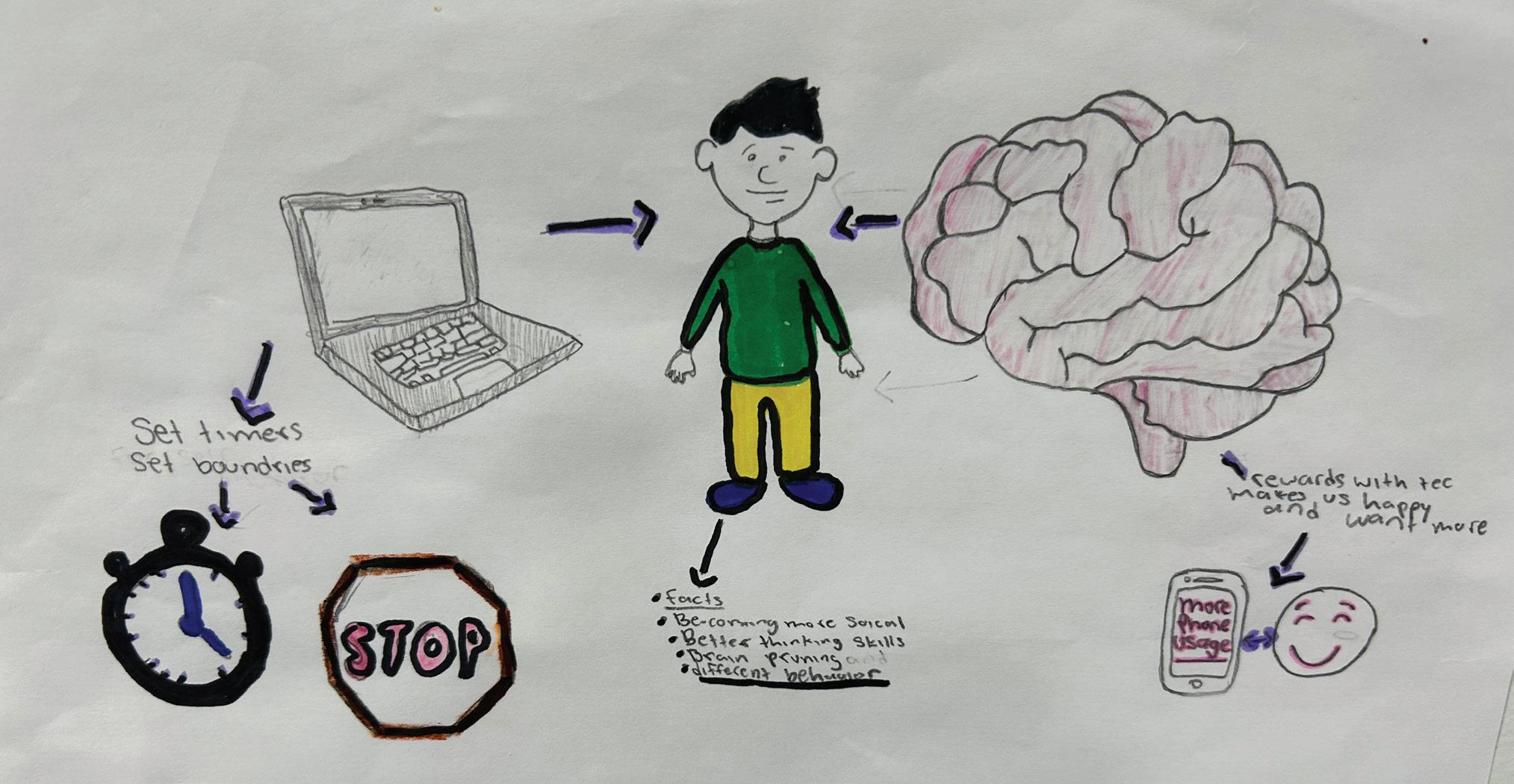
interest in this topic. Senaya was looking for research to support her project, and I was eager to help. I provided her with resources and guidance as she refined her proposal, which she later presented to the administration. At the start of this school year, the Impact Studio at MCD reached out to me regarding another student, Hudson Dresher, who shared a similar passion. Hudson and Senaya collaborated with me to expand the curriculum and develop a capstone project focused on adolescent brain development and the effects of excessive technology use. Through our discussions and curriculum modifications, we worked to align the high school program with MCD’s core values while incorporating a service-learning component. This addition will provide students with the opportunity to educate their peers and younger students on the impact of technology use on the adolescent brain.
This course explores adolescent brain development and the motivations behind technology and social media use. Students will examine both the positive and negative impacts of digital engagement and develop strategies for responsible and balanced technology use.
The impact of this initiative is two-fold. First, it empowers students through knowledge, equipping them with a deeper understanding of neuroscience and its relevance to their daily lives. Second, it challenges them to create an outward-facing campaign to educate their peers, fostering leadership and advocacy skills. By engaging in this work, students develop social-emotional competencies such as empathy, self-awareness, and responsible decision-making.
By integrating neuroscience into our educational approach, we not only enrich our students’ learning experiences but also prepare them to navigate the digital age with greater awareness and resilience. I am excited to continue refining and expanding this curriculum, ensuring that students at Miami Country Day School receive the tools they need to thrive both academically and personally.
This course explores adolescent developmental psychology and the unique vulnerabilities of the adolescent brain. Students will examine the psychological effects of technology and social media, including their impact on mental health, body image, and relationships. Through discussions and projects, students will develop strategies for fostering a healthy relationship with technology and educating others on its potential effects. Core values and community service hours are integrated into the coursework.
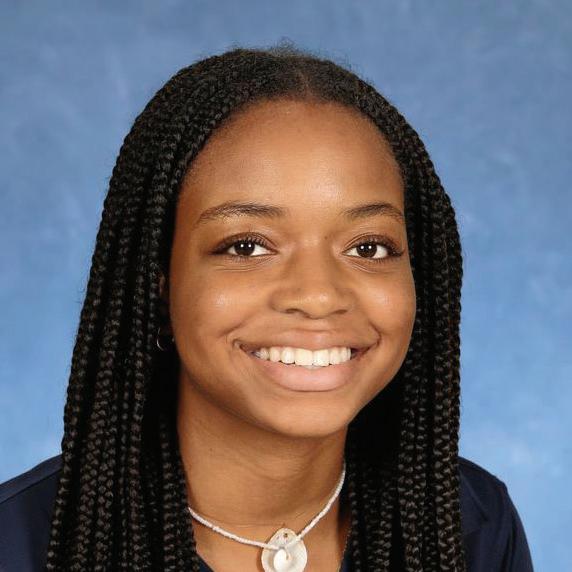
As a student and a girl growing up surrounded by technology, I have become hyper-aware of the distractions of the digital
world. Social media and excessive screen time have plagued my productivity and ability to tackle everyday tasks. When I realized that this was not only me affecting me, but also my peers, I knew that focusing my capstone project on this topic would benefit the entire community. Immediately, the idea of starting a class sparked my interest. With the partnership of Hudson and the support of Ms. Thibodeau, Ms. Brill, and Ms. Martinez, we took small but ambitious steps toward our overall goal. Dreaming big and
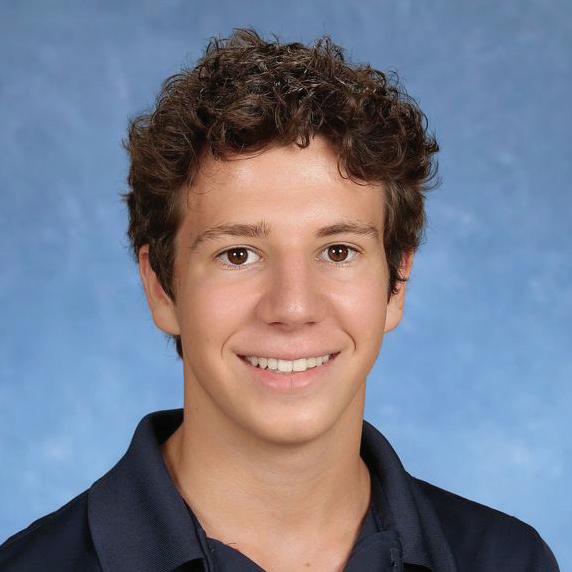
This interest of mine started in eighth grade before I came to Miami Country Day School during the peak of Covid-19 when I watched a documentary called “The Social Dilemma.” This documentary taught me how social media and technology have affected society, more specifically adolescents. When I learned that social media and technology have increased suicide and depression rates among adolescents. They have
made teens more insecure and addicted to their phones; endlessly scrolling on social media. At the time, I couldn’t do anything for my community about this ongoing issue. When I came to Miami Country Day in ninth grade, I was introduced to something called Capstone Society. I knew I wanted to help my community so the following year I took on the challenge: teaching students the dangers of and preventing students from getting addicted to social media and technology. With the help of Mr. Gatti and Impact Studio in tenth grade I did a study of the class of 2026 and saw how much time they spend on their phones and what apps. After that, Mr. Gatti connected me to Ms. Brill, the neuroscience genius, who then connected me to Senaya Miles who has the same interests as mine. As eleventh grade rolled around the corner, we
watching the whole process unfold with our hard work has been one of the most rewarding experiences. Throughout the entire process, for example, our assembly, which would require Hudson and me to speak in front of the whole upper school, I felt that I was being put out of my comfort zone but in the best way possible, which has led me to grow in ways I had not expected. Working with Ms. Brill has shown me exactly how supported I am at MCDS and how much my perspective and voice matter. She continues
to be an open ear to hear all of Hudson’s and my ideas for the class, and she has been a mentor to teach us all we need to know to be prepared for next year’s endeavors. As my senior year approaches, I am eager to see what this experience will be like and what it will teach me, and I feel more grateful than ever to be part of a community that has allowed me such opportunities.
came up with the (at the time, ambitious) idea of creating a class taught by Senaya and I (high schoolers) for other high schoolers; something that has never been done before. We worked relentlessly to create a class description and proposal for the class we made: The Digital Adolescent Brain: Neuroscience Meets Social Media. It is now February and I am a teacher assistant for Ms. Brill’s middle school “Connected Mind” class. At the same time, Senaya, Ms. Brill, and I are creating a thorough class curriculum for the class that starts next year. To advertise the class, Senaya and I went to Ms. Kelly, Ms. Thibodeau, and Ms. Martinez, and asked how we could advertise this class. Their answer was to create a campaign called “Get Screen Clean.” To participate in Get Screen Clean, high schoolers can drop off their phone as a
challenge to see how long they can live without their phone and to focus on their school work without any distractions.
This Capstone project means a lot to me because here at MCDS, I was finally given and took on the opportunity to make a change in my community. This doesn’t happen overnight but by working relentlessly and taking everything one step at a time the significance of this Capstone project is to help change my community not only limited to the Upper School at MCDS, but to the Middle & Lower School, and other schools in Miami-Dade and Broward.
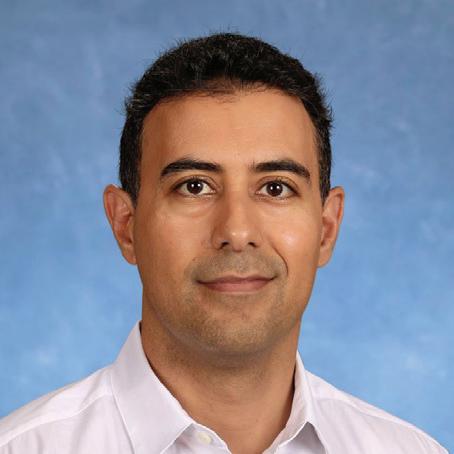
By Dr. Nima Rouhanifard, Ed.D.
The middle school community takes immense pride in celebrating the dedication and accomplishments of its educators. Teachers play a pivotal role in shaping the academic experience through their enthusiasm, subject expertise, and unwavering energy. Their commitment to excellence extends beyond the classroom, as evidenced by the pursuit of higher education among several faculty members. Currently, five teachers are engaged in doctoral studies while continuing their roles on campus, demonstrating an inspiring balance between professional growth and student engagement.
Through a valuable partnership with the University of Miami’s School of Education and Human Development, three teachers are furthering their expertise. Among them, two educators, Melody Rivera and Charlotte Phelps, are advancing their studies in the Ed.D. program focused on Applied Learning Sciences. Another faculty member is enrolled in a fully funded Ph.D. program in Teaching and Learning. Additionally, Jeniffer Cruz is pursuing a Ph.D. in Literacy at St. John’s University, and Michelle Holcman is deepening her knowledge through a Ph.D. program in Holocaust and Genocide Studies at Gratz College.
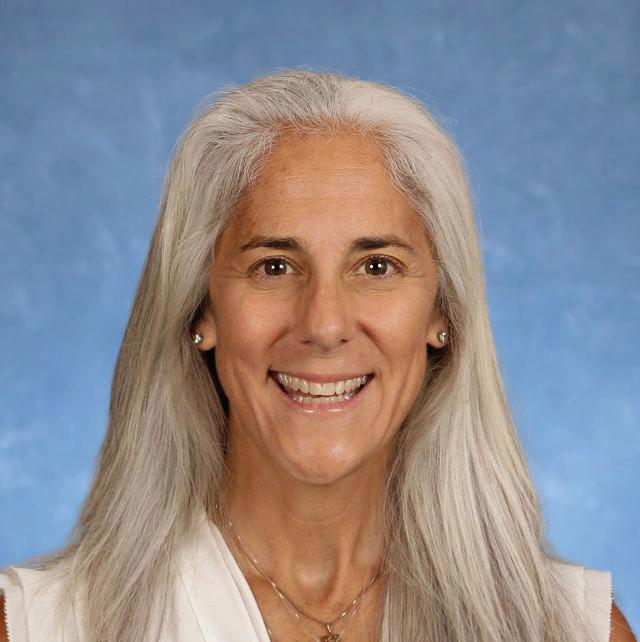
Michelle Holcman
MA. (History) – 6th grade World Geography Teacher, 8th grade Honors Civics Teacher, US Holocaust Teacher| 6th Grade Advisor| Model UN Sponsor| Design Team Member
Doctorate Pursued: Holocaust and Genocide Studies University: Gratz College
Michelle Holcman’s research delves into the historical context and contemporary significance of genocide, with a particular focus on events such as the Holocaust, Holodomor, Serbia, Rwanda, and Armenia. Her studies enhance her work in Holocaust education, equipping her with a deeper understanding of theoretical frameworks and historical narratives. By integrating current scholarship into her teaching, she ensures that students engage with meaningful and transformative content. This academic journey informs her curriculum design, fostering critical thinking and raising awareness of intolerance and injustice in today’s world. Her enrollment in the Ph.D. program at Gratz College allows her to further develop her expertise and contribute to the field of Holocaust and genocide education at a higher academic level.
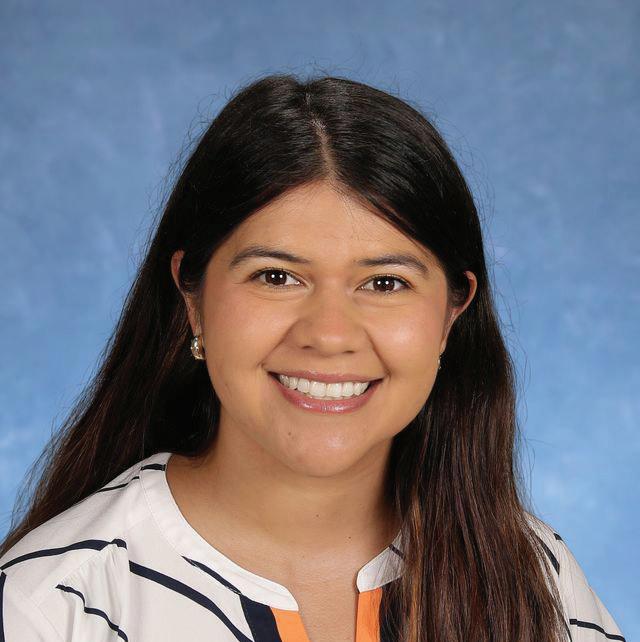
Jeniffer Cruz
MS Literacy Specialist | 6th Grade Advisor | Art Club Sponsor
Doctorate Pursued: Literacy
University: St. John’s University
Jeniffer Cruz’s doctoral work in literacy explores the historical evolution of literacy and its implications in the digital age. Her studies have provided her with an in-depth understanding of literacy theories, research methodologies, and instructional best practices. Focused on the middle school experience, she applies evidence-based strategies to support students as they transition to more complex texts and writing tasks. Her research allows her to implement differentiated instruction, promote active reading, and design interventions that encourage critical thinking and deeper engagement with literature. Through these efforts, she ensures that students develop essential skills for academic success.
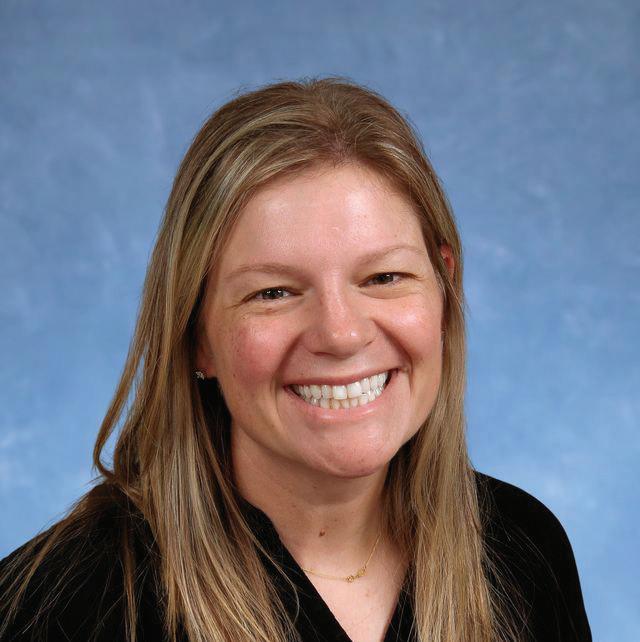
Charlotte Phelps
MS Humanities Teacher | NJHS Club Sponsor | 7th Grade Advisor
Doctorate Pursued: Applied Learning Sciences
University: University of Miami
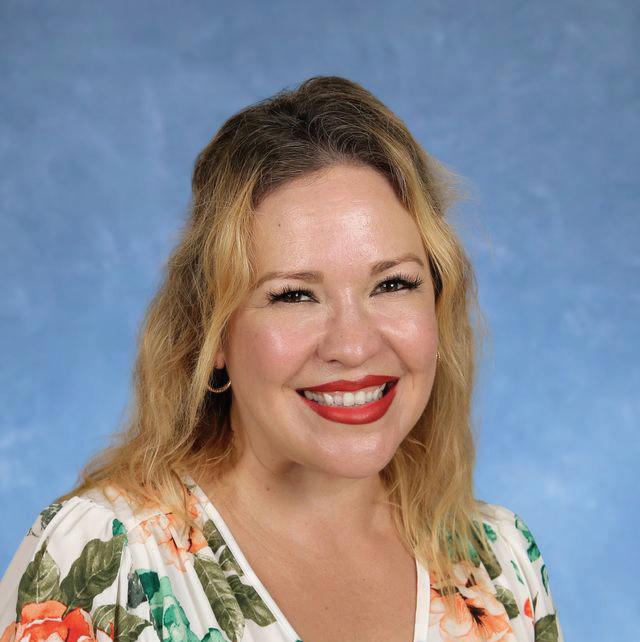
Charlotte Phelps is driven by a strong desire for professional growth and a commitment to bridging the gap between educational theory and real-world application. She is dedicated to improving educational practices by gaining a deeper understanding of how students learn and how to create effective, inclusive learning environments. Her research focuses on the applied learning sciences, an area that emphasizes evidence-based solutions to educational challenges. She is particularly interested in learning theories, inquiry-based learning, and critical thinking within the social studies discipline. By exploring how students engage with history, geography, and government through active learning and problem-solving, she aims to develop strategies that enhance student engagement. Her work also focuses on fostering inquiry-based learning, encouraging students to analyze historical events and primary sources critically. Additionally, she is committed to advancing methods that promote critical thinking about social issues and historical narratives, ensuring that students become thoughtful, informed citizens.
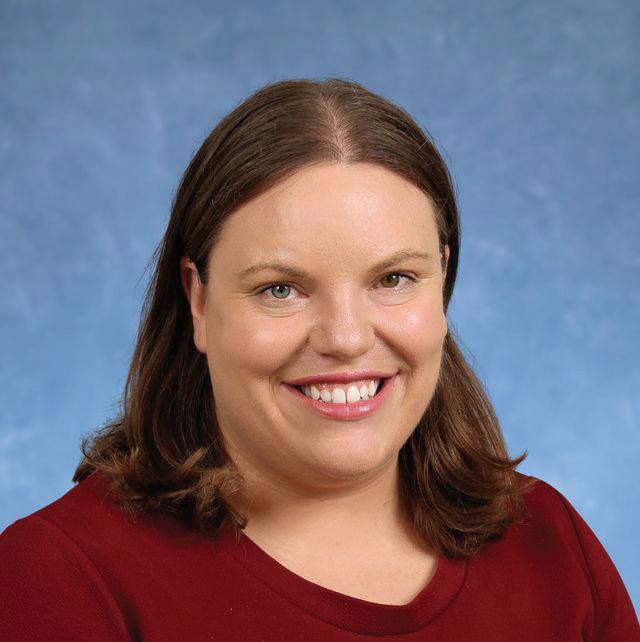
Kate Arnold
M.Ed., MBA – Middle School
Math Teacher
Doctorate Pursued: Teaching and Learning
University: University of Miami
Kate Arnold has long aspired to pursue a doctorate, and she now has the opportunity to do so while remaining dedicated to her teaching career. Her research focuses on the relationship between education and media, particularly in analyzing digital curriculums, both formal and informal. Through her studies, she examines the evolving role of media in shaping educational experiences, investigating how digital content influences student learning and engagement. Her work contributes to a broader understanding of how technology and education intersect, ensuring that students are equipped with the skills necessary to navigate an increasingly digital world.
Melody Rivera
M.Ed.8th Grade World Language Teacher |Spartans Around World |Language Teacher |8th Grade Advisor |MS GIEB Mentor | MaxBrain for Sports and Performance
Meditation Club Leader
Doctorate Pursued: Applied Learning Sciences
University: University of Miami
Melody Rivera is passionate about the intersection of neuroscience, education, online learning, and artificial intelligence. Her research aims to uncover how these domains can collectively drive innovation in educational practices and leadership. She is particularly interested in cognitive science and the role of artificial intelligence in personalized education. By exploring adaptive learning environments and neuroscience-informed teaching strategies, she seeks to enhance student engagement and skill development in digital learning spaces. Additionally, she is committed to developing leadership frameworks that bridge research and practice, ensuring that advancements in educational technology translate into meaningful classroom experiences.
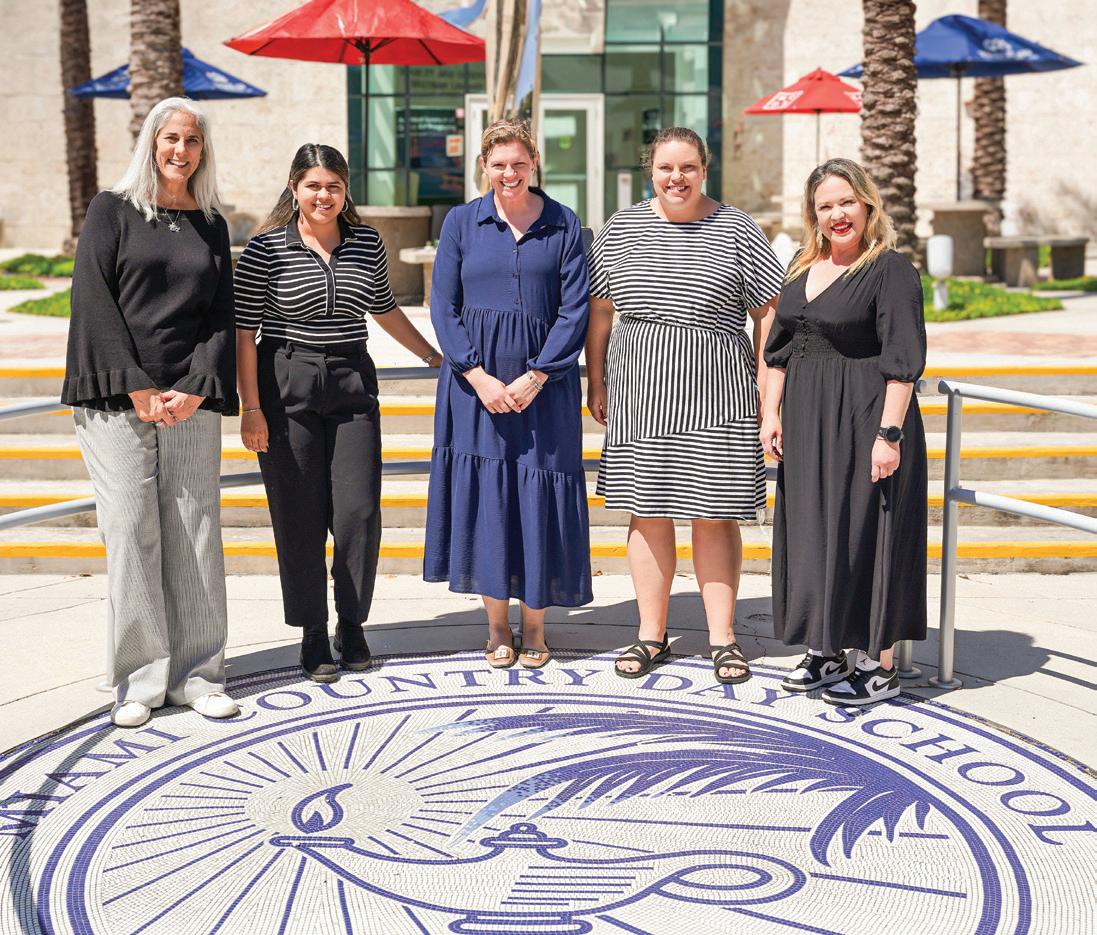
The pursuit of academic excellence is deeply ingrained in the school’s culture, and these educators exemplify the principle of continuous growth. By challenging themselves to expand their expertise while remaining committed to their students, they embody the school’s ethos of striving for improvement every day. As they push forward in their own educational journeys, they inspire students to embrace lifelong learning and intellectual curiosity. The middle school community is proud to celebrate these dedicated professionals, whose efforts not only elevate their own teaching but also enrich the educational experience for future generations.
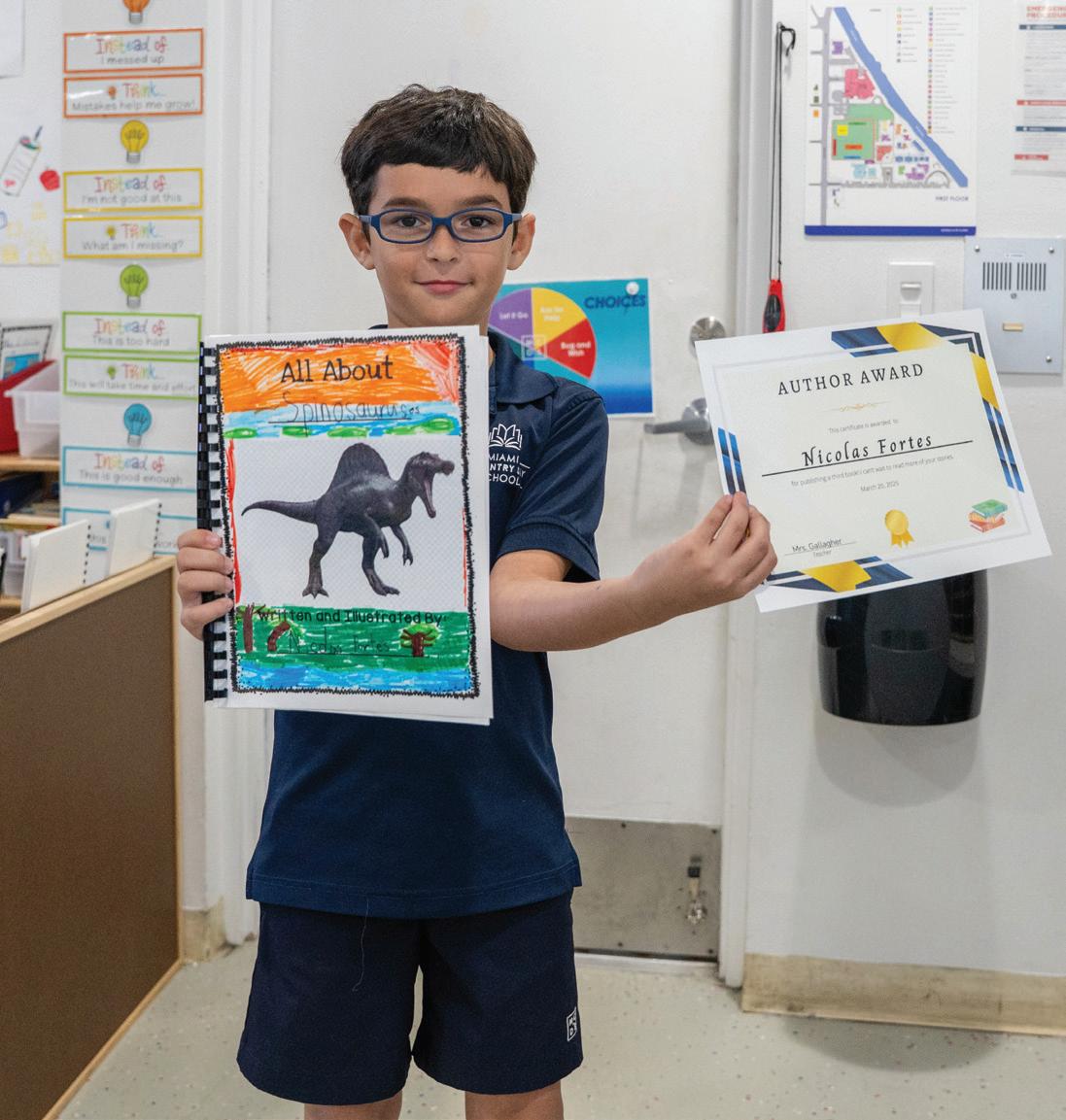
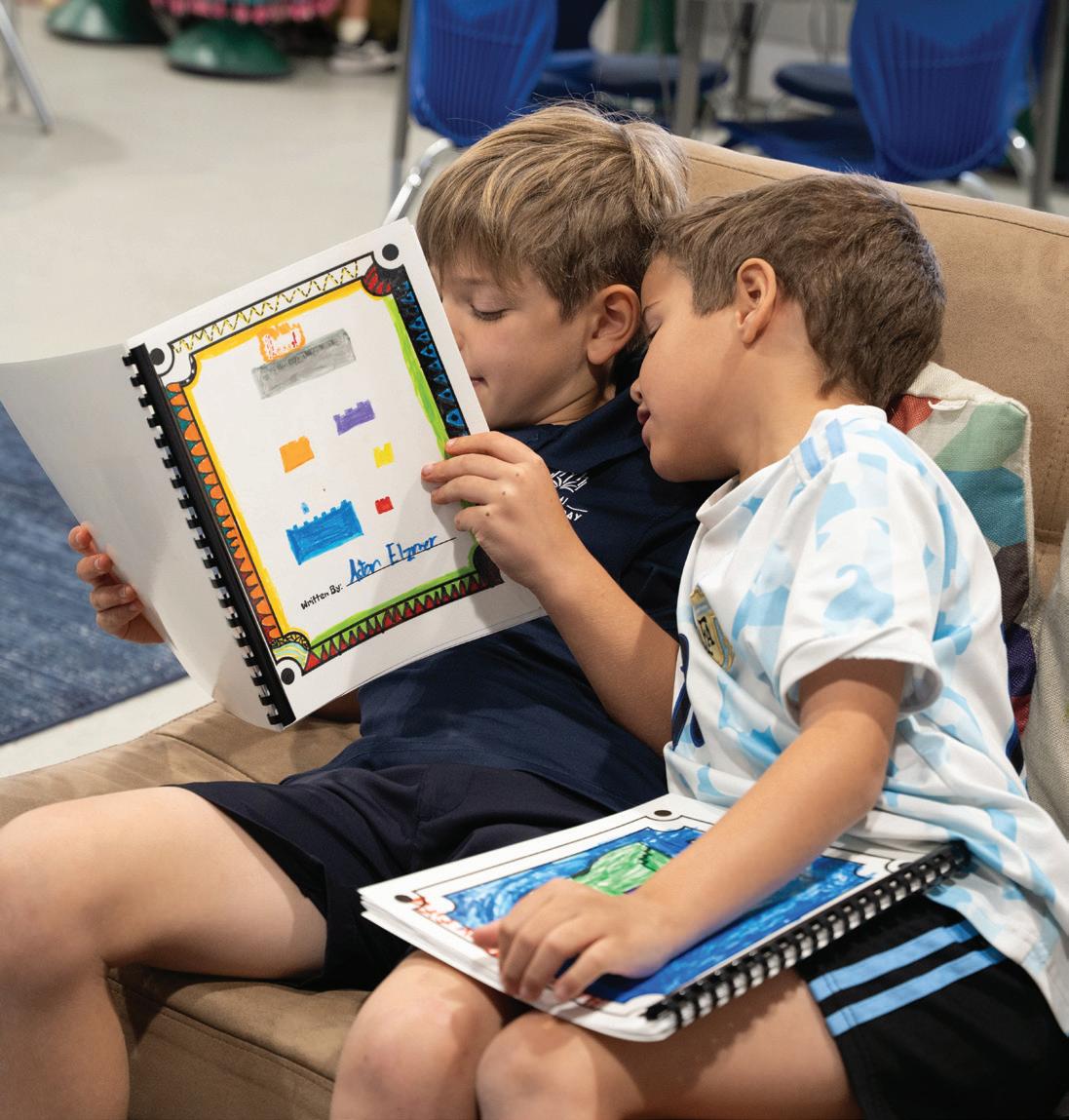
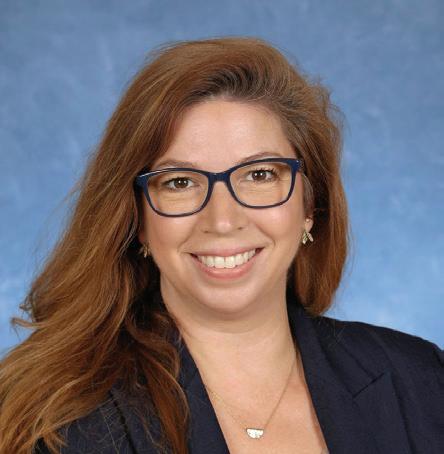
By Shana Lindsey Director of Lower School & Strategic Initiatives
In the Lower School, Literacy is more than a subject; it is a celebration. You can see this clearly in the spring of second grade when students proudly share their voices and ideas during their Informational Writing Celebrations, a hallmark of our literacy program. These culminating moments highlight the many weeks of learning, academic growth, and perseverance shown by young students who have been working hard over the lower school years to learn all the writing skills they need to become “published authors.”
Walking into a second grade classroom on the day of a Writing Celebration, you can feel the excitement and sense of purpose from the students. In their most recent Informational Writing unit, the students proudly shared their published pieces. Their books are filled with many non-fiction text features they learned about from their mentor texts. Each book had a table of contents, detailed illustrations with captions, glossaries of key terms with their own student definitions (which a great fun to read!), and lots of facts and details that taught their audience about a meaningful topic they’ve chosen. Each book is a window into a child’s world: one book explores ancient pyramids, another the joys of baking, or the always favorite-the rules of soccer. Some students are inspired by their family heritage or travel experiences and they choose to write about countries they’ve visited. The result is a class collection of nonfiction texts that reflect both high-level academic literacy skills and personal interests.
This year, Writing Celebrations grew even more meaningful when the second graders invited their PK3 Buddies to join them for their Informational Writing Celebration. The second graders were excited to share their writing with the younger students who are just
beginning their own literacy journey. Seeing students THEY know become “published authors” motivates our youngest students to practice their emerging skills and share writing with a purpose.
In PK3, our youngest students begin building this understanding through an exploration of the mail system. There is a mailbox in the classroom, and the PK3 students learn how writing letters and sharing their words and pictures can carry kind messages across the school. Our own Laura Bender, Assistant Director of the Lower School, becomes the much-anticipated “MCDS Mail Carrier” and visits the class to pick up and deliver student-created mail to and from classrooms. Ms. Bender shares, “The reaction when I walk into the PK3 room with my mailbag shows just how special the experience is for the students. They love to see if they recognize their name on their very own letter. It really gets them excited about writing and communicating through writing and gives them the confidence to keep practicing those important early literacy skills AND it really builds community between our students.”
Ms. Bender personally saw the excitement when Ms. Francis’s class of second graders wrote to their PK3 Buddies to invite them to their Informational Writing Celebration. Receiving the beautiful paper invitation marked the moment when the written word connected our emerging PK3 writers and our proud second grade “published authors.” That invitation didn’t just celebrate the second graders’ accomplishments; it inspired their youngest schoolmates to imagine their own futures as writers, too.
Learning to write across genres, from personal narratives to opinion essays to non-fiction books, is a complex and creative process. It is made possible by the careful, differentiated instruction of highly trained faculty who know just how to balance direct teaching in phonics, targeted practice in decoding and spelling, and modeling the author’s craft so that each student gets exactly what they need to reach their highest potential. Students are guided to independently choose the right punctuation for their sentences, when and what to capitalize, and how to take on the challenge of transforming a blank page into a high-quality, expressive piece of writing. Our students don’t just write to complete an assignment, they write because they’re excited to teach others about what they know, giving every student a sense of purpose and motivation to make their work the highest quality possible.
The success shown by our second graders doesn’t begin in second grade. The ability to write, revise, and self-edit is possible because
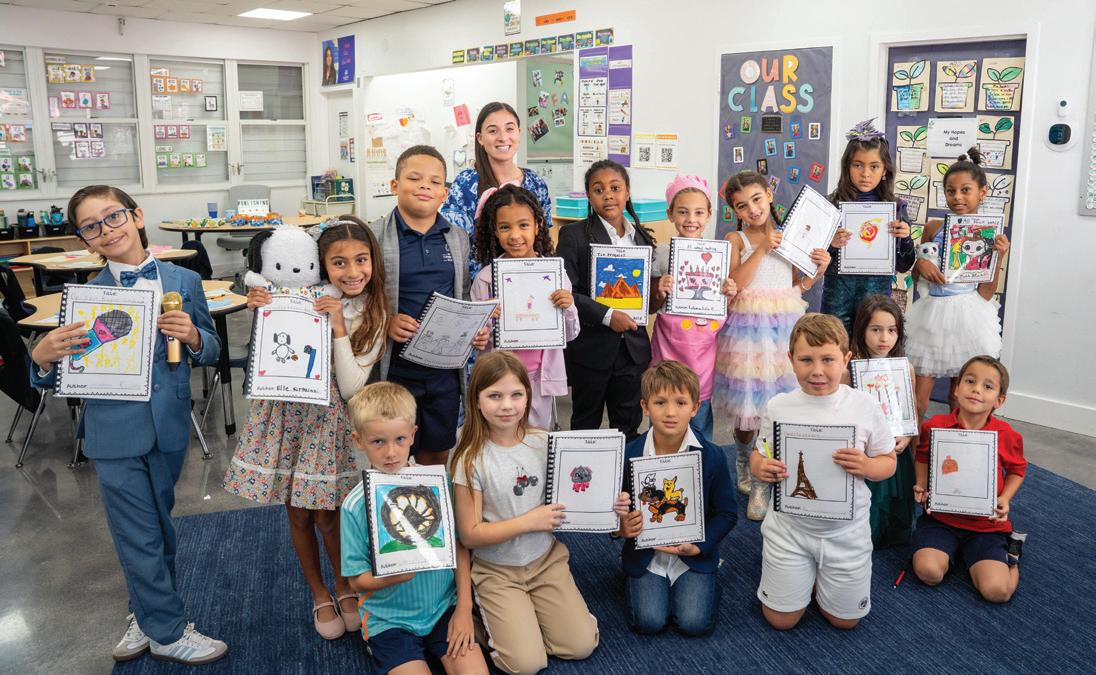
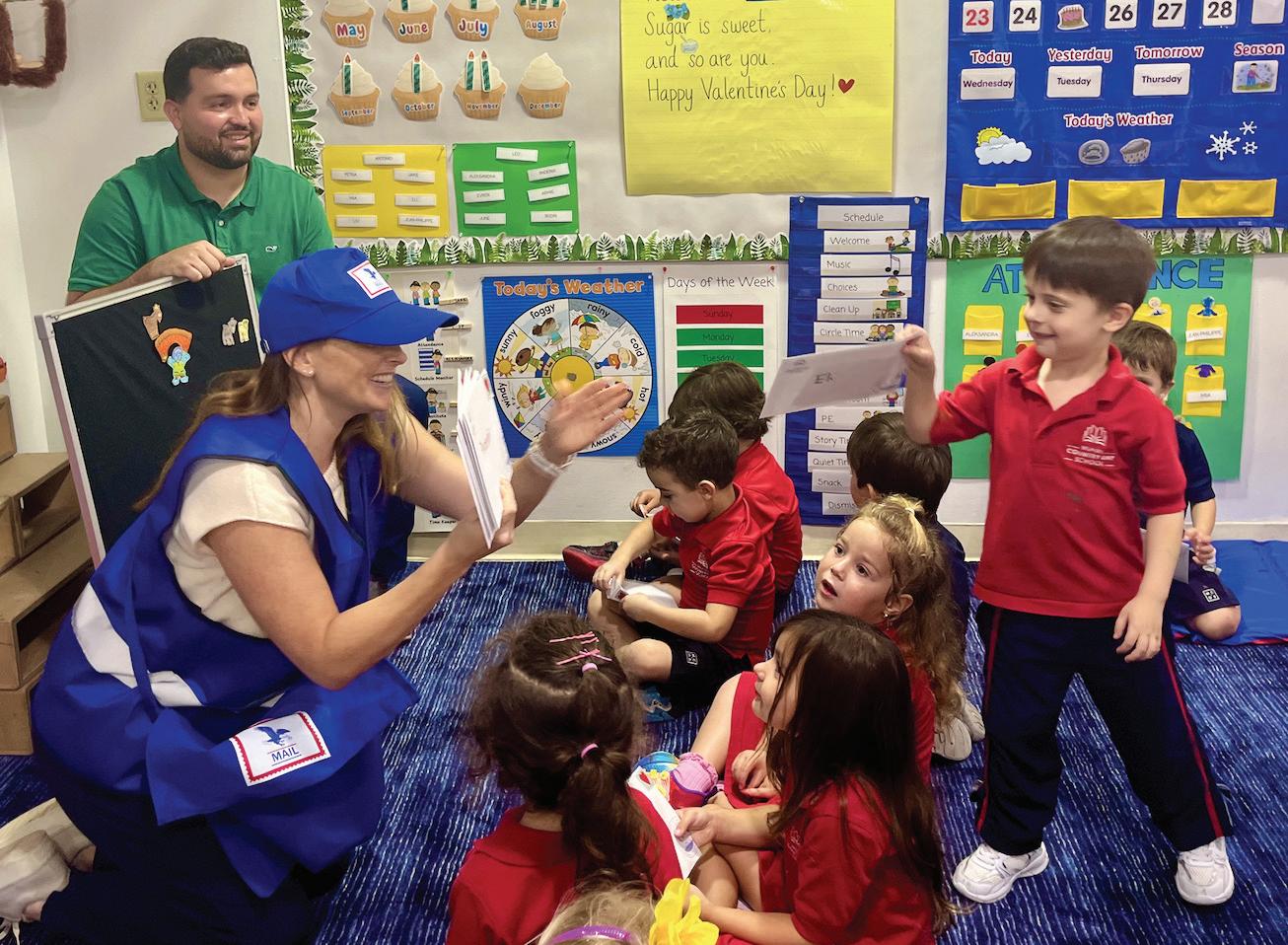
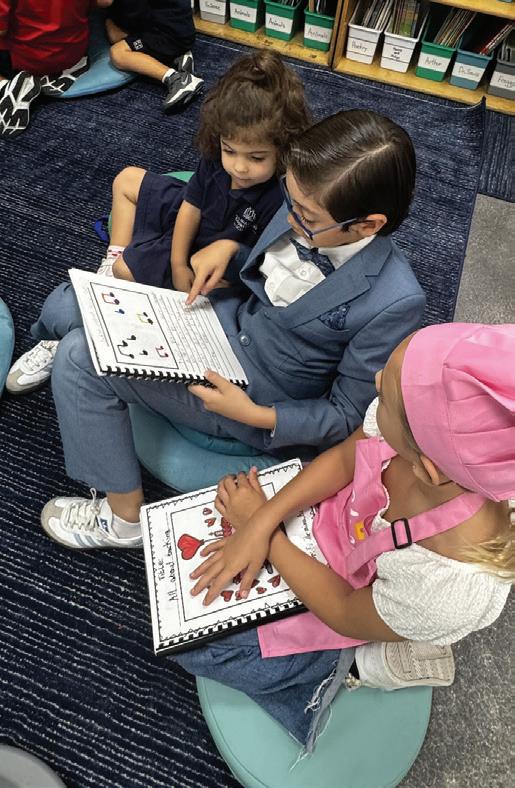
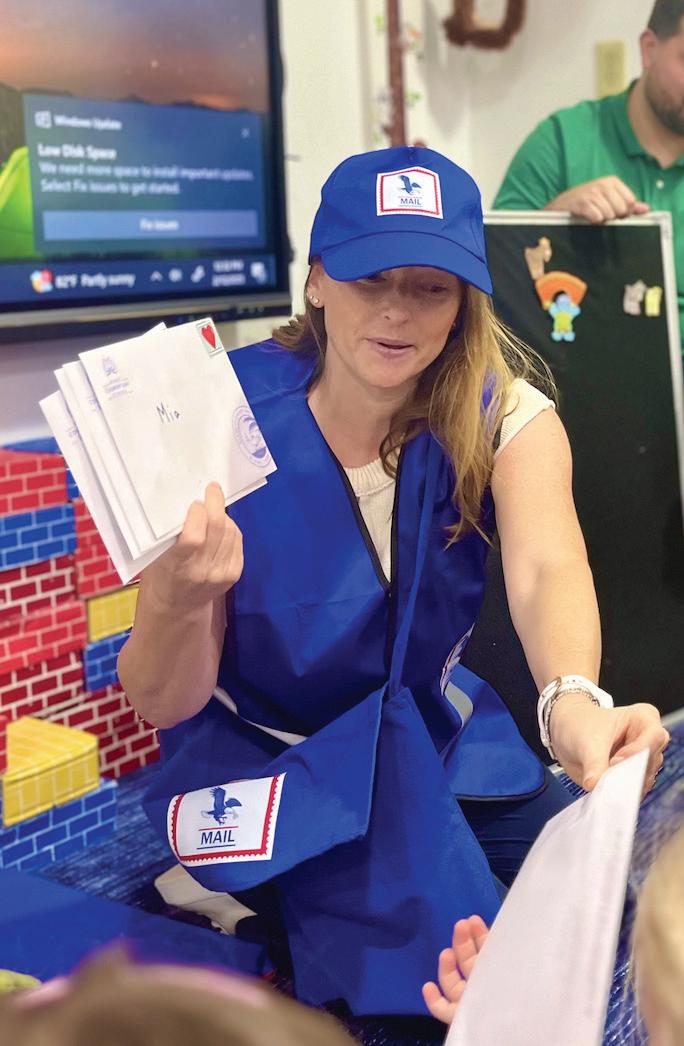
of years of foundational learning from expert educators. It begins in early childhood with the celebration of books and finding joy in language. It is seen in kindergarten and first grade as the students’ emerging literacy skills start to come together in phrases and sentences that show the students that writing is a powerful way to connect with others and share their stories.
Celebrating daily writing or having a larger Writing Celebration with Buddy classes are influential moments that reflect the MCDS commitment to celebrating the process and taking pride in academic accomplishments along every step of a Spartan’s learning journey.
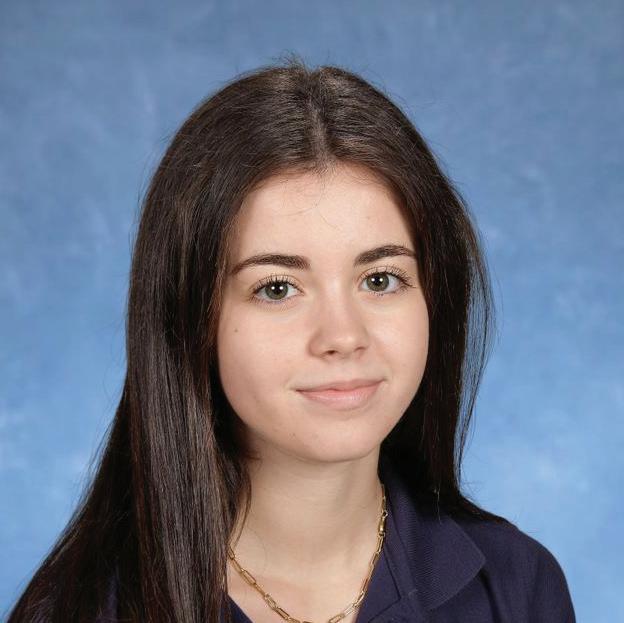
By Ioanna Chatzizisi ’25
For a child who can’t find the right words, a swirl of blue or a splash of red can say everything—because in art, emotions speak louder than words. For many children struggling with anxiety, stress, or other challenges, art therapy offers them a unique way to express themselves and allows them to release their stress in an individualized and distinctive way. “Art can be a tool of self-expression, where words don’t exist,” explains Upper School Counselor Meghan Calfee Regueira, LMHC, “There is a lot of communication in the silence of art.”
Here at Miami Country Day School (MCDS), this holistic approach to emotional growth aligns seamlessly with our Whole Child philosophy. We believe in nurturing every part of a student’s development—intellectual, emotional, social, and physical. Children learn and grow not just through academic achievement, but through emotional understanding and expression. Our robust arts program, paired with a thriving social-emotional curriculum, offers students multiple pathways to process their experiences and cultivate emotional resilience.
As students, artists, as well amateur art history scholars, Paloma Deen and I have benefited greatly from using art to destress. As a result, our Capstone highlights our desire to explore opportunities to weave curiosity with emotional expression. “In my experience, art has been a tool to cope with the pressures of school and the college process,” explains Paloma, “I envision this project as a way that we can help others realize the benefits of incorporating art into their everyday lives.”
To learn more, we spoke with Dr. Veronica Dumas, a licensed clinical psychologist with a Ph.D. in Clinical Psychology, who has worked extensively with people of all ages to help them unlock their emotions through creative expression. Moreover, as a parent at MCDS, Dr. Dumas also brings a personal perspective to her practice, understanding the challenges and opportunities of raising children within a community that prioritizes their social-emotional well-being. Her professional insights and firsthand experience align with our MCDS values as well as our own Capstone project.
“Often,
there are two types of people: ones who have trouble verbalizing their emotions, and those who have the ability to verbalize, but are unable to have self-awareness about what they’re feeling. Through art therapy, people allow themselves to come in touch with their subconscious and intuitive thoughts.”
The ability to access and transcribe emotions into words is especially critical for children in their years of development. “The sheer scale of the world and the depth of human experience often render words inadequate to express the reality of ideas like love, anger, or hope,” reflects Upper School Art Teacher Mark Runge. “Instead of direct articulation, we come to understand these powerful emotions through their aftermath, the subtle yet undeniable residue they imprint on us.”
A child feeling overwhelmed by a situation might struggle to explain the fear or sadness they are feeling in the moment. By engaging in artistic activities such as drawing, painting, or sculpting, children can find the emotions that are buried deep within them, allowing them to tap into the emotions they might not fully understand or be able to articulate yet.
A 2017 study by the American Art Therapy Association1 found that “children who participated in art therapy programs experienced reduced anxiety, enhanced emotional regulation, and increased self-esteem.” While art therapy is especially beneficial for children, it’s also proven to help adults work through deep-seated trauma and emotional wounds, offering a transformative pathway to healing.
“My first personal experience was when I did an internship at the VA hospital where I worked with war survivors, particularly Vietnam where most of them had gone through such horrible traumas where they were not able to express any of their emotions. Through art therapy, I noticed that they were finally able to communicate how they were feeling in a way that was not as threatening or overwhelming to them.”
Dr. Dumas’ first-hand experience not only highlights the importance of art therapy in a broader context but also underscores the idea that art can be for anyone. Whether a child struggling with anxiety or a veteran carrying decades of trauma, art therapy provides a nonverbal bridge to healing that is accessible to all, and beneficial to all.
“It is through art, in its myriad forms, that we can truly communicate these complex feelings and begin to process and heal from their impact,” Mr. Runge explains, “making vital connections to our shared humanity through personal visions.”
By exploring artistic expression as early as possible in a child’s life, they will be conditioned to understand their better emotions since they will have ways of knowing how to process them and express them verbally. Additionally, they will be able to face any type of problem with an open mind and a can-do attitude, since their brain will automatically be triggered to do what it knows best to solve problems.
“When one engages in the art of any type, they are engaging the part of their brain that is very creative. So, what that does to everything else in their life is it allows them to become problem solvers, by triggering the part of the brain that allows them to have more of an open mind and a can-do attitude when a problem arises.”
Inspired by the profound impact of art therapy, Paloma and I are interested in a Capstone project aimed at supporting artistic spaces around our school. We hope to offer students a powerful outlet for self-expression, emotional growth, and a deeper understanding of their own mental well-being to help them navigate the challenges of school, while learning how to create a healthy school-life balance.
“Art therapy also allows the creator to feel a great sense of confidence and a rise in their self-esteem. When a piece of art is finished and a creator is past their self-judgment phase, they are able to look at their completed art through a new perspective, and allow themselves to feel a sense of pride, and accomplishment.”
Art can equip us all with the emotional tools to navigate life’s challenges. Each brushstroke paints a path toward resilience—each color a step forward, each shape a foundation of strength.
1.Keane, Clara. “An Expert on School-Based Art Therapy Explains How Art Therapy Helps Children Make Sense of the Insensible.” American Art Therapy Association, 12 Dec. 2018, arttherapy.org/art-therapy-helps-children-makesense-of-the-insensible/.
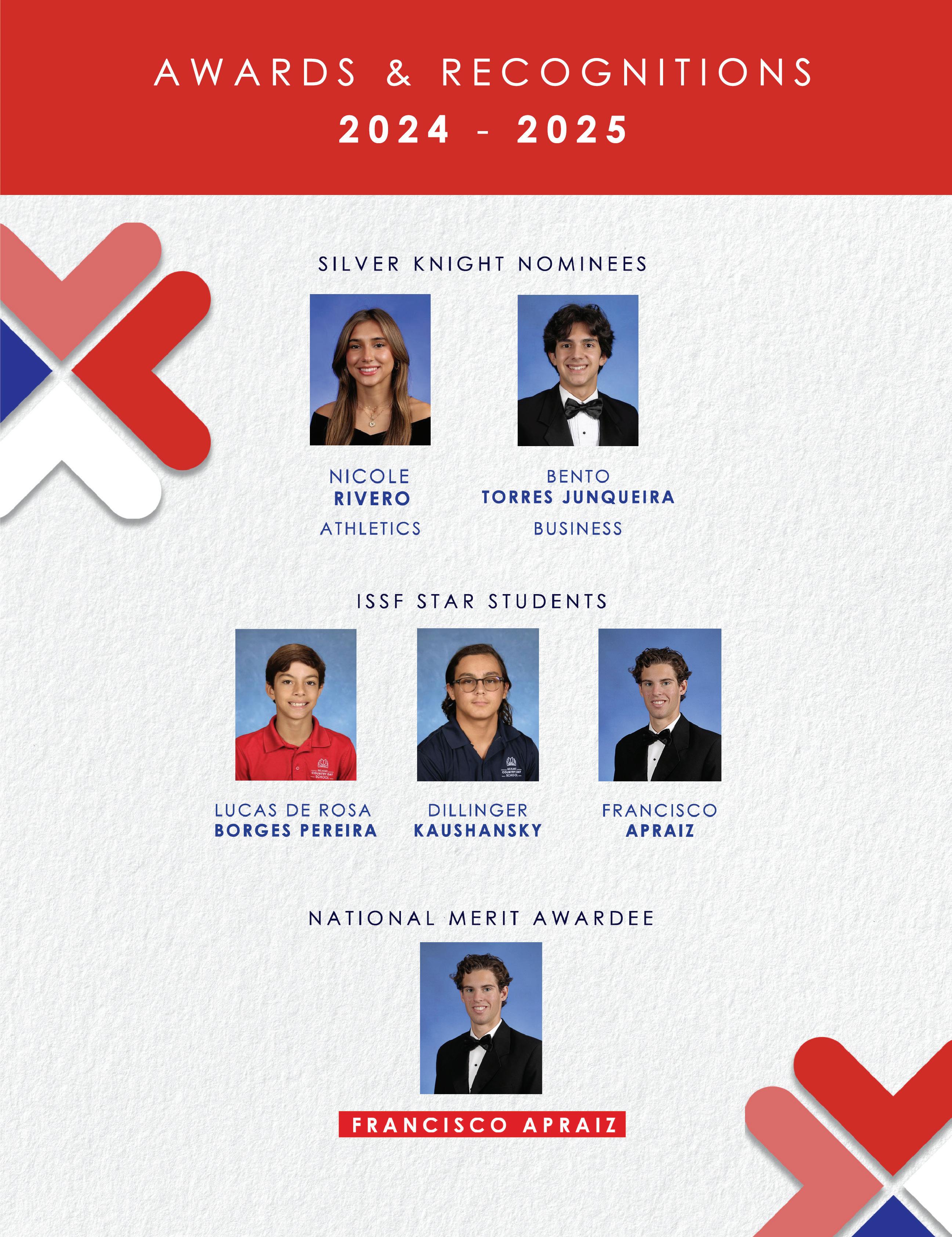
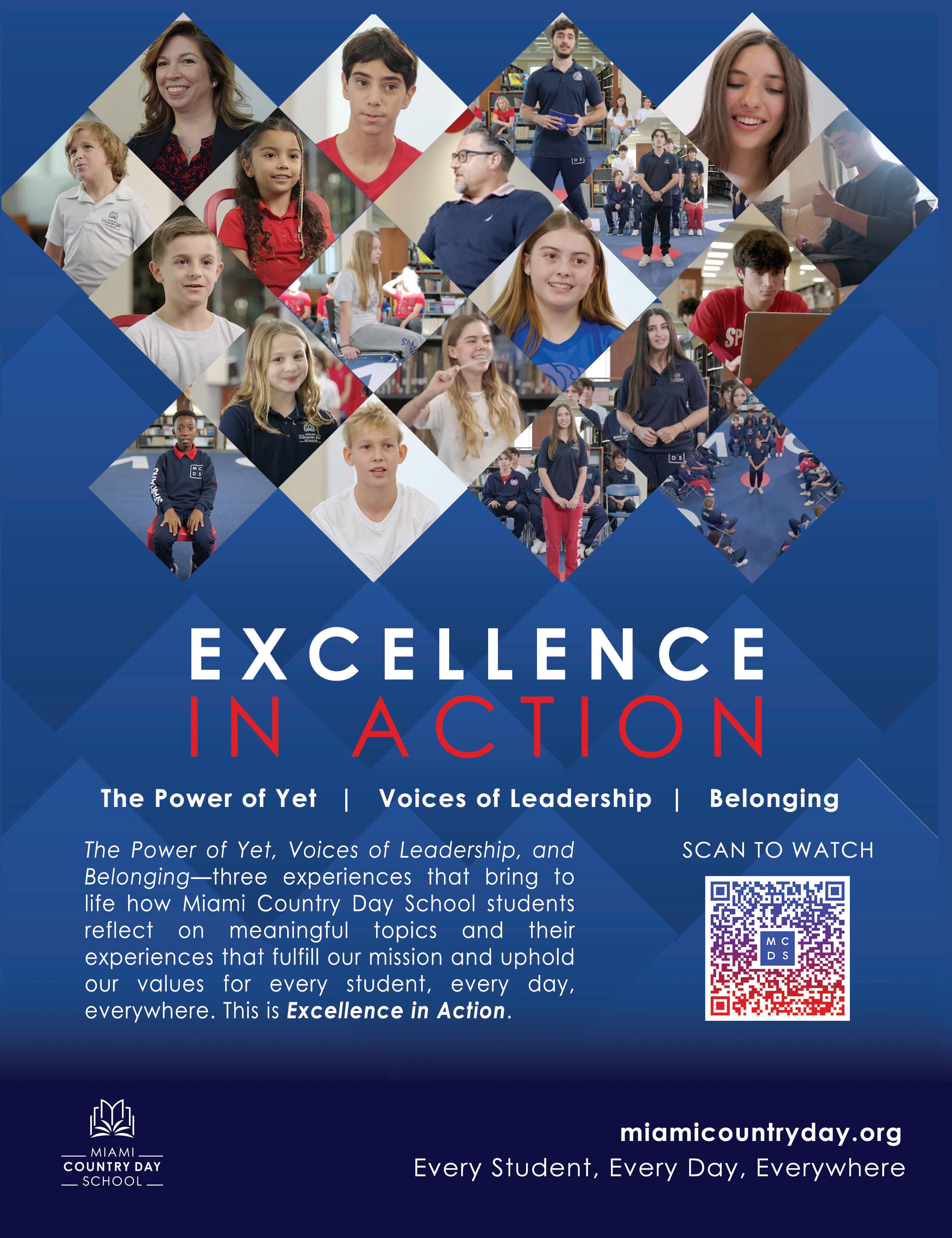
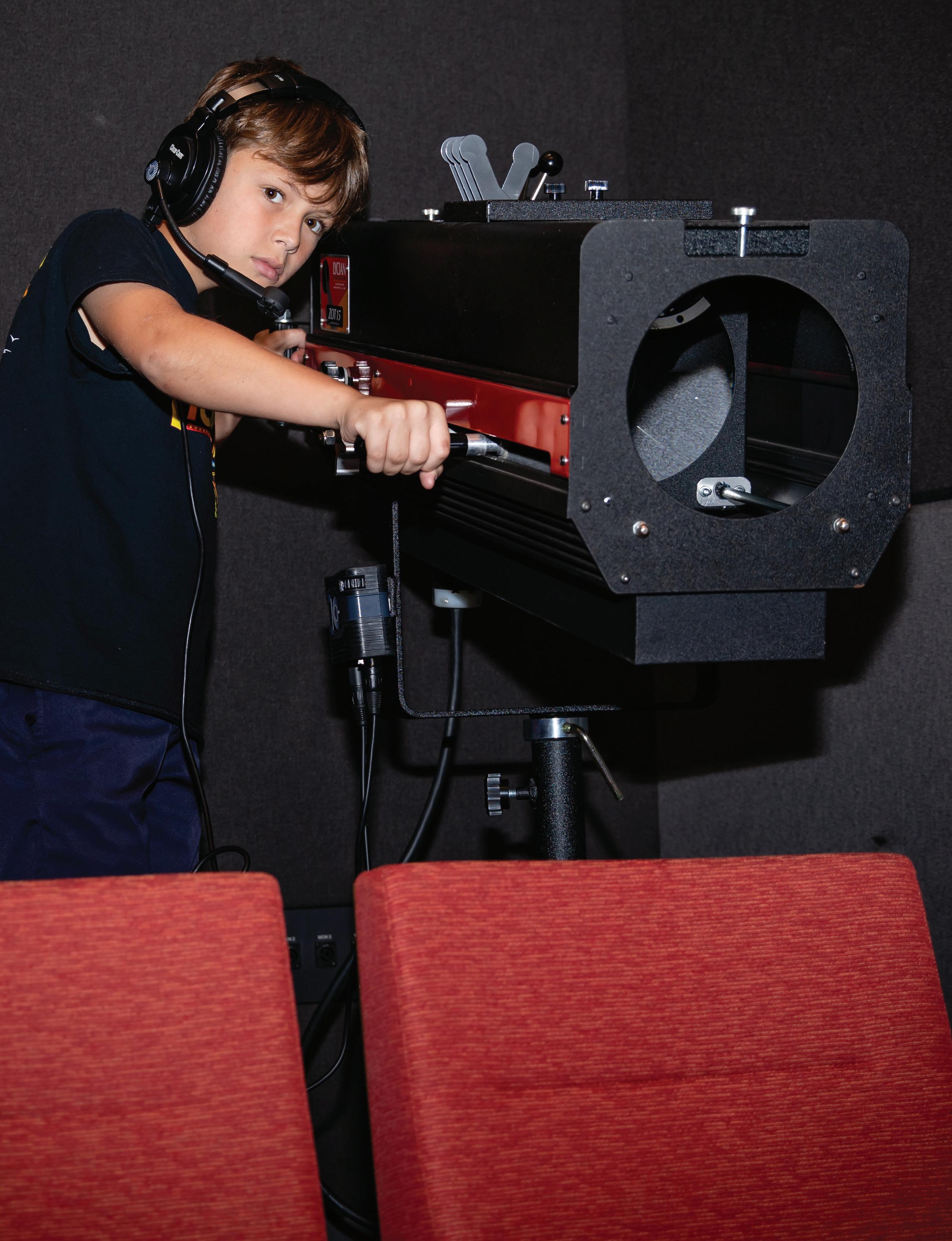
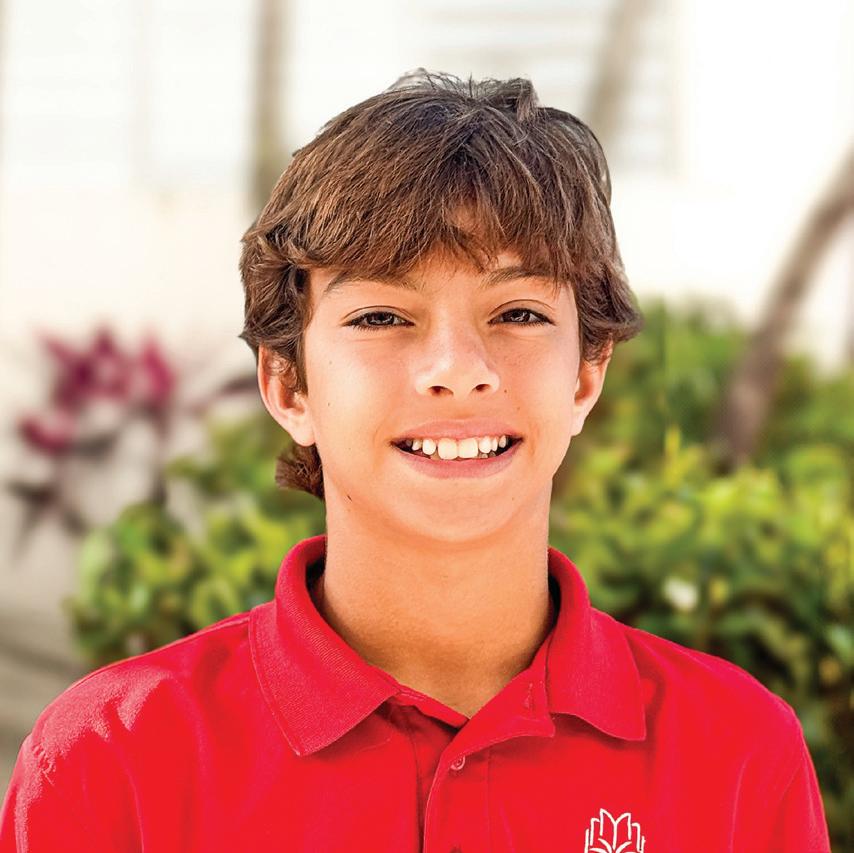
From the moment Lucas da Rosa Borges Pereira (Class of 2032) stepped onto campus as a Kindergartener, Lucas’s warmth and inclusivity were evident. His former Kindergarten teacher, now Lower School Assistant Director, Ms. Bender, shared, “Lucas created beautiful friendships with so many in our kindergarten class. He led by participating in class, setting a good example, and thinking about others.” That welcoming spirit has only grown stronger over the years. His fifth-grade teacher, Ms. Boutin, describes him as “a kind and empathetic student who makes the classroom a welcoming place for everyone.” When asked what makes him a good friend, Lucas shared, “I try to always back up my friends if they are having a problem and just be there for them.”
Beyond friendships, Lucas is a dedicated student who approaches challenges with a growth mindset. His curiosity and problem-solving skills shine in every subject. “What stands out about Lucas is his curiosity and love for learning,” says Ms. Boutin. “He’s a problem solver at heart and is always up for a challenge!” When I talked with Lucas he shared that he is particularly interested in engineering and paleontology, saying, “I’d love to build humane animal enclosures, roller coasters, or even bring extinct animals back to life, but I know that isn’t possible. I just like thinking about how things work, like the light bulb!”
Outside of academics, Lucas is a passionate athlete, playing soccer four nights a week while also making time for gaga ball, basketball, and playing tag at the Jungle during recess. He is a dedicated saxophone player and comes to school at 7:30 for Early Bird Band. This year, he stepped into the role of Banzai, the mischievous hyena, in this year’s fifth grade Signature Musical experience, The Lion King-Kids. He shared that he loved being on stage with his friends and he looks forward to continuing music in Middle School, as well as theatre.
by Shana Lindsey, Director of Lower School & Strategic Initiatives
Lucas is also incredibly proud of his Brazilian heritage. “Lucas values connections and loves sharing his culture with others,” says Ms. Boutin. When exchange students from Brazil visited the fifth grade classes, he was excited to speak Portuguese with them. He also loves visiting Brazil to surf and sail. When asked to share advice for younger lower school students, he said, “You can’t get something for free. You have to work hard to earn it.” When I asked him where he learned such an important lesson, he spoke with deep admiration about his parents and grandparents’ hard work and accomplishments, and how they inspire him to do the best he can with his education at Miami Country Day.
As Lucas moves on to Middle School, he carries with him his character of kindness, respect, and perseverance. In all my conversation with Lucas and the teachers who know him so well, I believe that Lucas is a student who leads with heart, works with purpose, and always looks out for others. He is a true role model…and he has a great sense of humor! I can’t wait to see how he continues to grow and thrive.”
Congratulations, Lucas! You are a leader, a good friend, and an inspiration to other students. We can’t wait to see all the incredible things you will accomplish next!
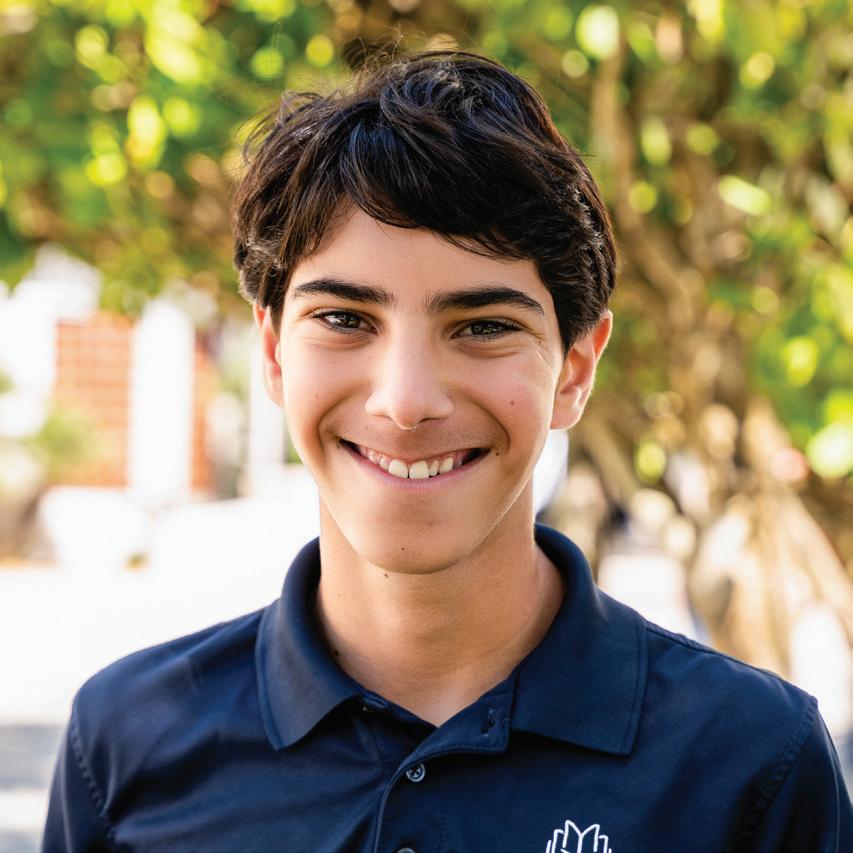
Hailing from North Beach Elementary, Jeremy Samek came to Miami Country Day School (MCDS) as a 6th grade student and has consistently exemplified academic distinction and unwavering determination. Jeremy has not only met but surpassed the rigorous academic expectations set before him, earning a coveted spot on the Head of School List every semester of middle school. This prestigious distinction is reserved for students who maintain straight A’s (90 or higher) across all subjects, a testament to Jeremy’s intellectual curiosity, disciplined work ethic, and pursuit of scholarly excellence.
Beyond the classroom, Jeremy has demonstrated a wellrounded commitment to extracurricular pursuits. His passion for knowledge and leadership has driven him to excel in Model United Nations competitions, where he has showcased his analytical thinking and diplomatic skills. His dedication to academic discourse is further reflected in his role as editor of the Spartan Chronicle, where he has helped shape the intellectual and journalistic voice of the student body. This past year, Jeremy was also inducted into the National Junior Honor Society, upholding the pillars of scholarship, service, and character.
Jeremy’s excellence is not confined to academics alone—his dedication to personal growth and perseverance is equally remarkable. A skilled athlete, Jeremy has been actively involved in swimming and baseball, balancing the demands of sports with his rigorous academic commitments. A defining moment in his journey came in 6th grade, when he faced the disappointment of not making the baseball team. Instead of succumbing to discouragement, he channeled his determination into targeted practice and self-improvement, ultimately securing a spot on the team as an 8th grader. This resilience—fueled by a mindset of perseverance and selfbetterment—is a defining characteristic that will undoubtedly serve him well in future endeavors.
By Dr. Nima Rouhanifard, Ed.D. Director of Middle School & External Partnerships
Jeremy’s impact on the MCDS community extends beyond individual achievement; he has been an influential voice in Student Leadership. As a key architect of the newly implemented House system, Jeremy has played a pivotal role in fostering a stronger culture of community and school spirit. The Student Leadership elective, composed primarily of 8th-grade students, is responsible for orchestrating schoolwide events, assemblies, and philanthropic initiatives. Jeremy has taken on an instrumental role in these efforts, confidently addressing an audience of 400 middle school students and leading initiatives with purpose and conviction.
In recognition of his embodiment of MCDS’s core values— Wisdom, Purpose, Honor, Compassion, and Respect—Jeremy was awarded the esteemed Core Values Award. This honor reflects not only his academic prowess but also his unwavering commitment to character, integrity, and service.
Jeremy Samek’s middle school journey has been defined by academic excellence, leadership, and resilience. His story is a powerful reminder that true success is forged through dedication, perseverance, and a commitment to continuous growth. As he prepares for the next chapter of his academic journey, Jeremy’s legacy of excellence will undoubtedly inspire future Spartans to strive for their absolute best.
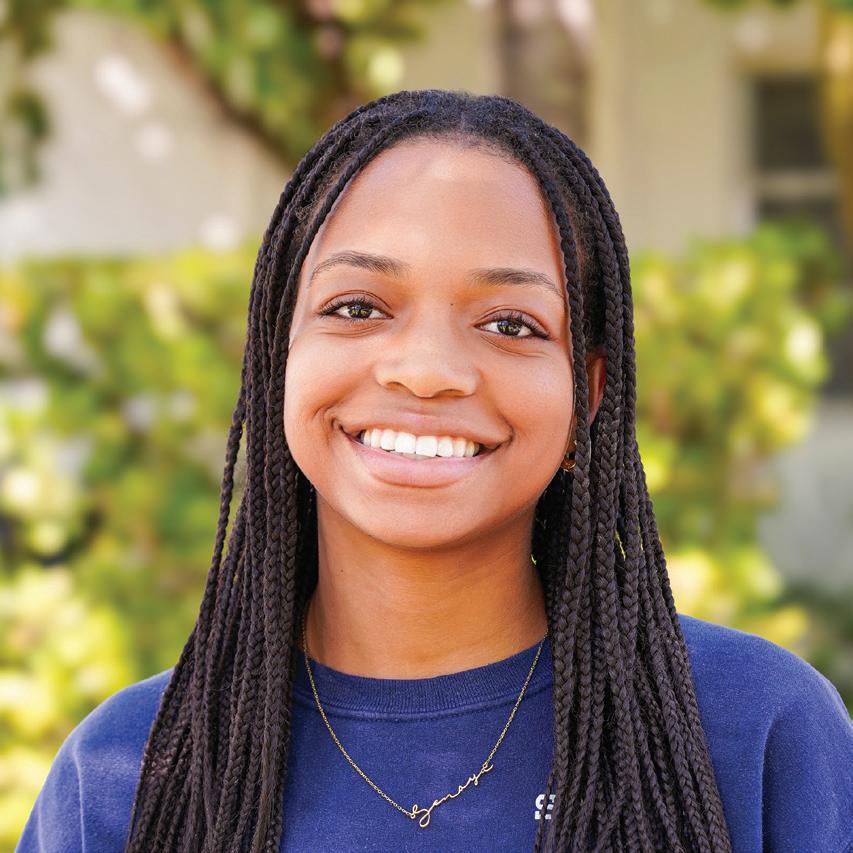
Senaya Miles is not just shaping her own future—she’s shaping the future of her school and community. Arriving at MCDS in 8th grade, Senaya watched her brother Jasai ’23 carve his own path in the upper school as a star member of the boys basketball team. This was his path, and although Senaya can always be seen supporting athletics on campus, either as a spectator or as a member of athletics support staff, she found her purpose and passion in other areas of school life. Now in her junior year, Senaya has emerged as a force for positive change. A dedicated leader and mentor, Senaya balances her time between academic excellence and making a lasting impact on her school community.
My first interaction with Senaya was last school year, when I unexpectedly became her advisor. From the moment we met, I saw a quiet and unassuming student who was also unafraid to express her opinions and appeared genuinely curious and driven to affect positive change. She balanced criticism of her school experience with suggestions for improvement. By the end of her sophomore year, it was evident that Senaya wasn’t going to be satisfied with just talking about change—she would enact it.
In her 10th grade English class, Senaya began a passion project as part of her Capstone work. As she pondered over a topic for the project, she began recognizing the consequences of her own excessive screen time, and her project was born. She started researching the impact of endless scrolling on devices, and she found an abundance of emerging research on the topic, specifically the direct correlation of social media and poor mental health in teenagers. She concluded her sophomore year by delivering a speech on the findings of her research, and she formulated a plan for future exploration.
This year, as a junior, Senaya committed herself to leadership with a desire to have a lasting positive impact on her
By Michael Culley, Director of Upper School
peers. As the Vice President of the Black Student Union, her commitment to fostering inclusivity, cultural awareness, and meaningful conversations is impressive. Senaya is also a dedicated mentor in her role as a Peer Counselor, and she embraces the chance to work closely with sixth graders to guide them through The Social Institute, a curriculum that empowers students to use technology in responsible and healthy ways. Beyond leadership, her passion for environmental sustainability shines through her involvement in the new MCDS coral preservation project, where she donates her time to support marine conservation efforts.
Senaya remains an excellent student in the classroom, and her 10th grade Capstone Project evolved this year into an exciting first-of-its-kind proposal for her and partner, Hudson Drescher, to collaborate with a MCDS faculty in teaching a term elective class, The Digital Adolescent Brain, which will explore the complexities of technology and mental health. This innovative work has attracted the interest of an MCDS partner, the Center for Transformative Teaching and Learning, and they expressed interest in learning more about the class and student involvement.
Senaya Miles embodies what it means to be a changemaker—thoughtful, passionate, and unafraid to act. Whether she’s leading discussions in the Black Student Union, mentoring younger students, preserving marine life, or reshaping how her peers understand technology’s impact on mental health, she continues to leave her mark at MCDS. As she moves into senior year, there’s no doubt that her leadership, innovation, and drive will continue to inspire those around her.
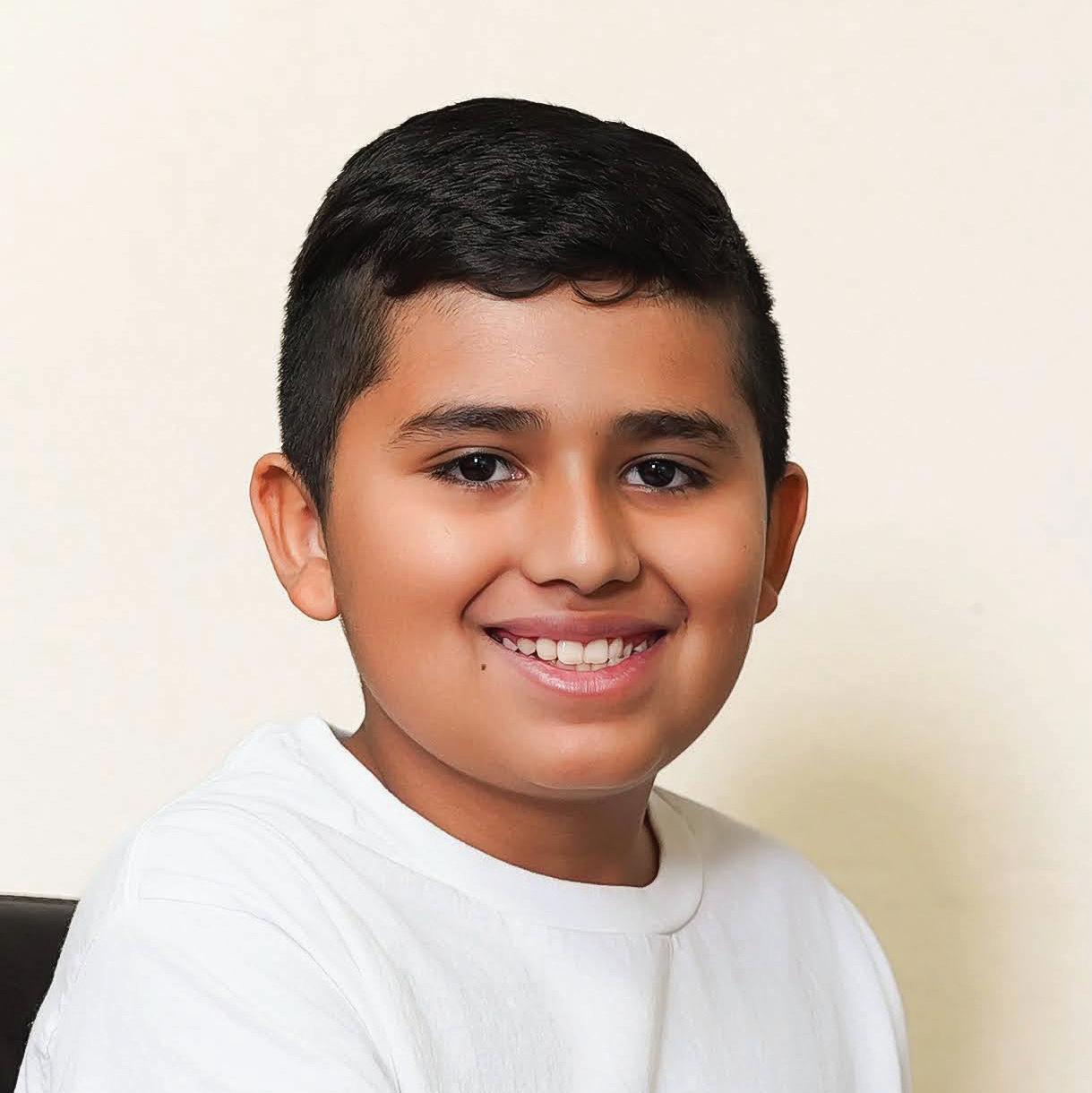
I still remember the first time I met Sebastian. As an educator and program director, I was immediately struck by his energy, positivity, and the pure joy he expressed when talking about school, learning, and life. Even as an incoming 7th-grade student, he was diving into advanced topics in science and math on his own. A model of the Miami Country Day School values of curiosity and independent learning, he had already spent two years self-studying Brazilian Portuguese— on top of karate and piano.
In an online learning community, screen presence and personality are just as important as academic ability. Sebastian had both. Just by being himself, he made me excited to welcome him into the Spartans Around program. As a fully online student, Sebastian balances a rigorous academic schedule with his passions. He takes a full middle school course load, plus electives in arts, STEM, and World Languages. He’s already working at a third-year high school level in Brazilian Portuguese and takes Chinese as well.
His Mandarin teacher, Ms. Ivy Gauler, says, “Sebastian actively approaches learning and pushes his classmates by being curious and inquisitive. In the MCDS spirit of being globally minded, he fosters rich conversations that deepen understanding and reflection.”
Eager to grow, Sebastian recently joined a global distinction course where he’s researching the historical impact of humans on the environment. His advisor and teacher, Mrs. Karin Davis, shares, “Purpose is evident in his decision to learn online. The flexible schedule allows him to pursue music and sports, showing clear direction and commitment.”
Beyond academics, it’s Sebastian’s character that stands out. Always smiling and respectful, he brings thoughtful dialogue and a playful spirit to class. Ms. Kristina Podsiadly, his Life Science teacher, says, “He has an infectious enthusiasm
By Dan Bronish Chief Academic Design Officer
and genuine curiosity. Sebastian brings meaningful conversations and ideas to our online classroom. It’s a privilege to teach him.”
His creativity shone during the Sneakers and Social Messaging workshop, where he designed “True Balance Airs” inspired by inclusivity and equality. Through color and symbolic design, he used art to share his values—showing both leadership and authenticity.
“He brings both intellect and warmth to our virtual space,” adds Mrs. Davis. “His humor makes class enjoyable, and his compassion shows in the way he supports and uplifts his peers.”
While many online students are athletes or artists pursuing outside commitments, Sebastian uses the Spartans Around program to dive deeper into learning. He isn’t limited by a traditional schedule—instead, he embraces flexibility to explore his passions and live a balanced life.
“Honor is embodied in his integrity and commitment,” Mrs. Davis reflects. “He respects the learning process and helps create a collaborative environment where everyone feels valued.”
Academic, driven, and a model of our core values, Sebastian exemplifies the next generation of learners. He’s owning his education, thriving in a program that supports learning anytime, anywhere, and proving what’s possible when passion and purpose meet opportunity.
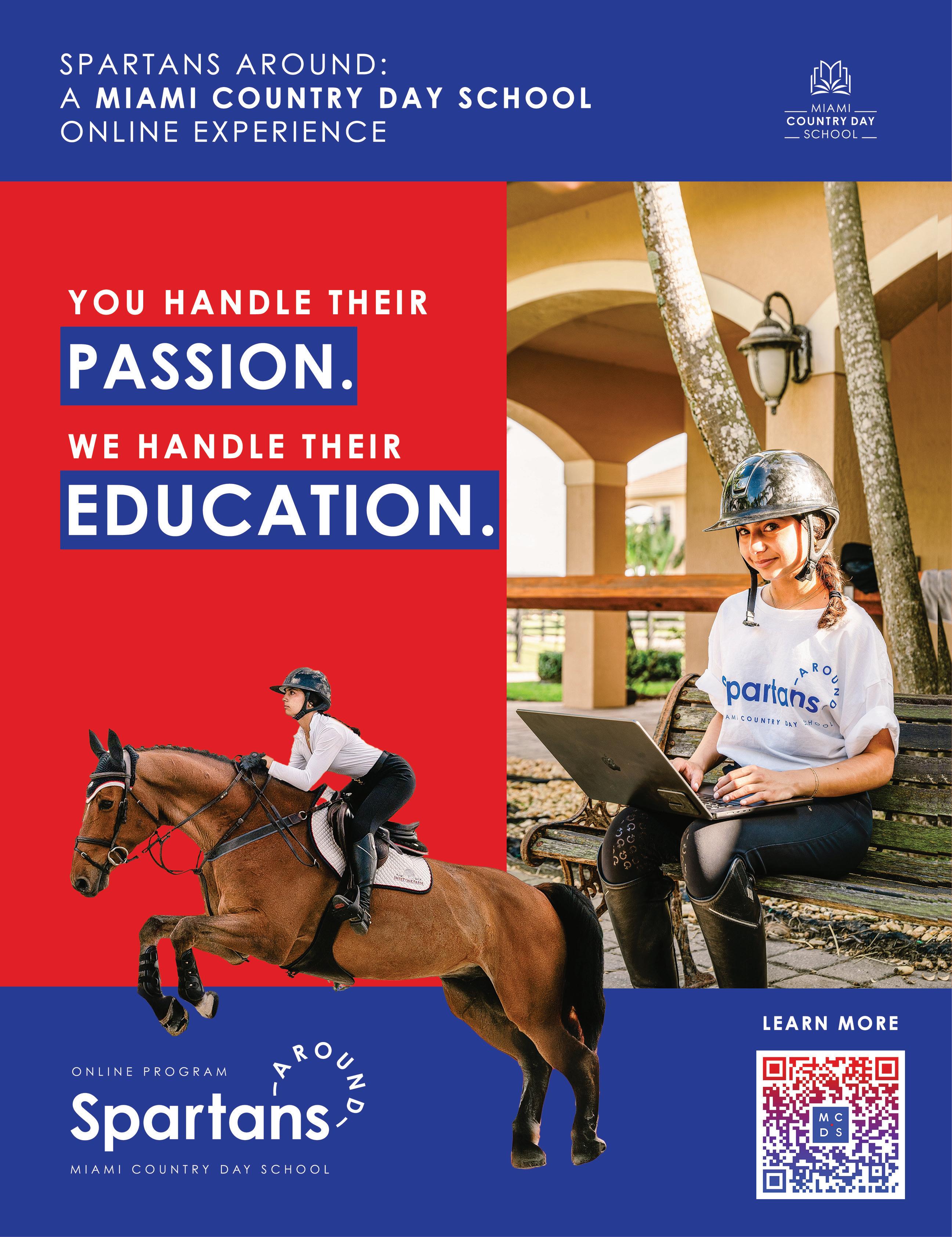
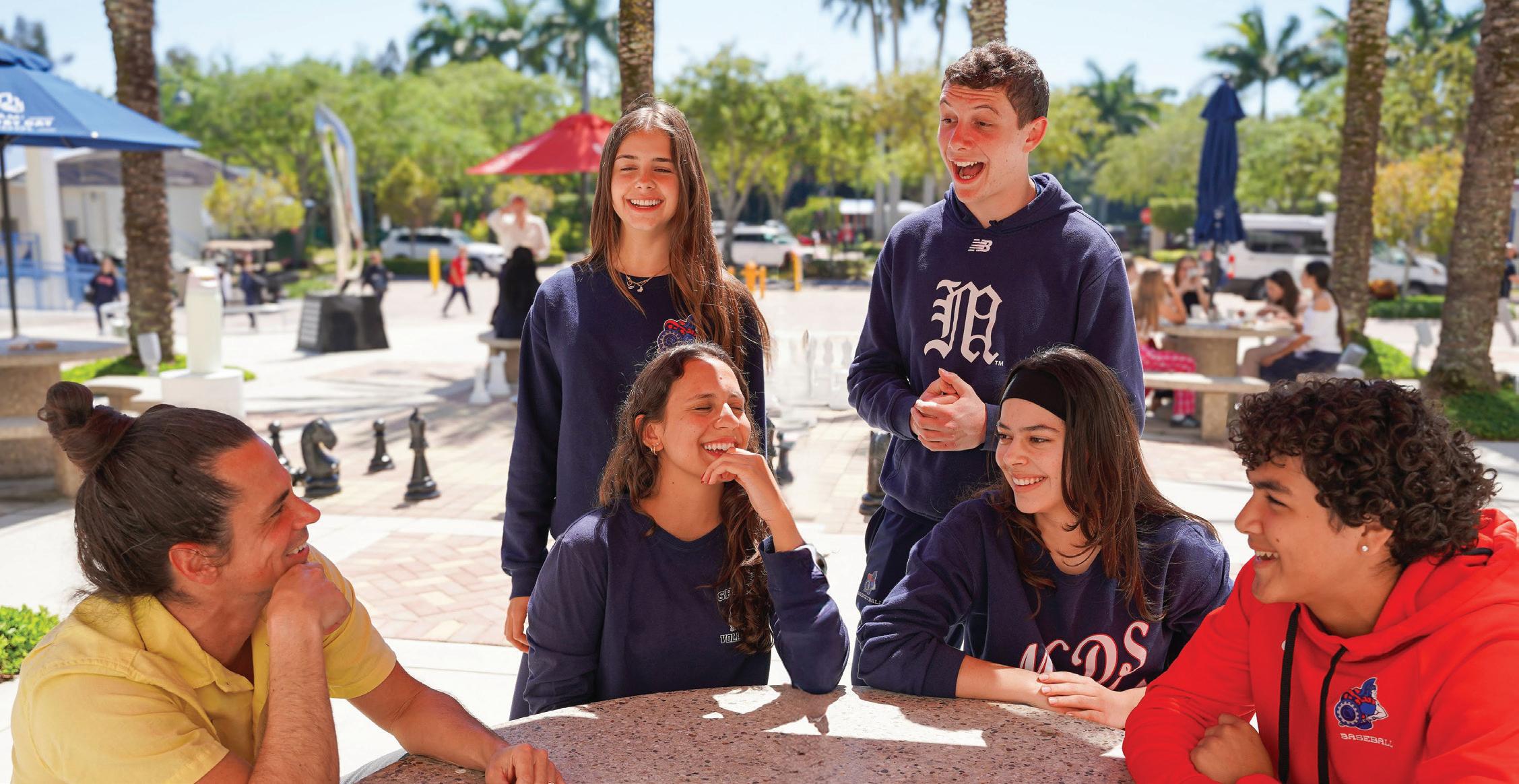
Having dedicated his career to exploring well-being, creativity, and personal transformation, John Gatti (Impact Studio Teacher and Lead Designer) has shaped the Happiness Course into a unique and impactful experience for students. In this interview, led by Jill Robert (Chief Experience Officer), we delve into the inspiration behind the course, its evolution, and its lasting influence on students’ lives.
Jill: What inspired you to create the Happiness Course, and how has it evolved since its inception?
John: When I first created the course, my understanding of happiness was different from what it is now. Looking back, I realize that happiness was always something I cultivated as a child—through authentic
connections, activities that made me feel alive, and moments of presence. Over time, external influences can cloud that intrinsic joy, making us seek happiness outside ourselves. Through personal experiences, including a health crisis in my late 20s, I started exploring neuroscience, habit formation, and the idea that
happiness is a skill that can be cultivated. This course was born out of that realization: that we can intentionally create happiness through awareness, choice, and daily practices.
Jill: How do you integrate art and meditation into your teaching, and what impact have you seen on students?
John: Art, meditation, and creative expression are ways to bring students back to themselves. When you engage in art, whether it’s visual arts, creative writing, or playing an instrument, you cultivate agency over how you feel. Meditation works similarly—it’s a practice of presence and self-regulation. In class, we start
every day with breathwork. I call it breath ‘work’ because we’re training our lung capacity, training our focus. Students complete a simple assessment before and after: How do you feel emotionally, physically, mentally? Then they compare that over time. Many of them are surprised to see patterns emerge. They begin to understand that they have the power to shift their own wellbeing.
Jill: What are some of the biggest misconceptions about happiness that you aim to challenge in your class?
John: One major misconception is that happiness is a fixed trait—you either have it or you don’t. In reality, happiness is a skill that can be developed. Another is that happiness comes from external validation: achievements, accolades, or what others think. But true happiness is about vitality— feeling fully alive. Finally, many believe that stress or negative emotions are inherently bad, but they’re part of our evolutionary design. Our brains have a negativity bias to protect us, but in today’s world, that can become overwhelming. The key is learning how to manage those responses and cultivate positive well-being despite them.
Jill: Can you share a memorable MCDS student story that illustrates the power of this course?
John: Honestly, there are so many memorable moments in class. It’s those discussions and seeing them reflect back what they’ve learned that really hits home. But the best? When they take what we’re learning and use it in their lives. Like, identifying those limiting beliefs, flipping negative thoughts, or even learning to ditch the energy vampires—that’s gold. And when they want more on well-being? That’s when I get really excited.
Last semester, I was working with an athlete and after class he asked where he can learn more about upping his mental game. I shared this big research study on visualization for basketball players. He didn’t just read it; he wanted more. I shared a few TED Talks from sports psychologists on meditation and visualization. He ate it up. He came to the next class thanking me for the material. Talked about how interesting it is. That hunger for knowledge? That’s what fuels me. When they leave class wanting to learn more, and then we talk about the resources, and it just keeps expanding their understanding.
Jill: How does the Happiness Course connect to the broader goals of Impact Studio?
John: Impact Studio is about fostering innovation, curiosity, and real-world problemsolving. The Happiness Course aligns with that by helping students develop resilience, self-awareness, and the ability to manage their own wellbeing—skills essential for any leader or innovator. If you want to create change in the world, you need the internal tools to navigate challenges, stay motivated, and collaborate meaningfully. Happiness isn’t just personal—it’s foundational to making a lasting impact.
Jill: What feedback have students shared about the course, and how has it influenced your teaching approach?
John: Many students say this is the first time they’ve been given the space to explore their own well-being in a structured way. They appreciate that the class isn’t about passive learning— it’s about discovery. Some have shared that they now notice when they’re overstimulated or disconnected and have strategies to recalibrate. Others have realized that joy isn’t something they need to earn—
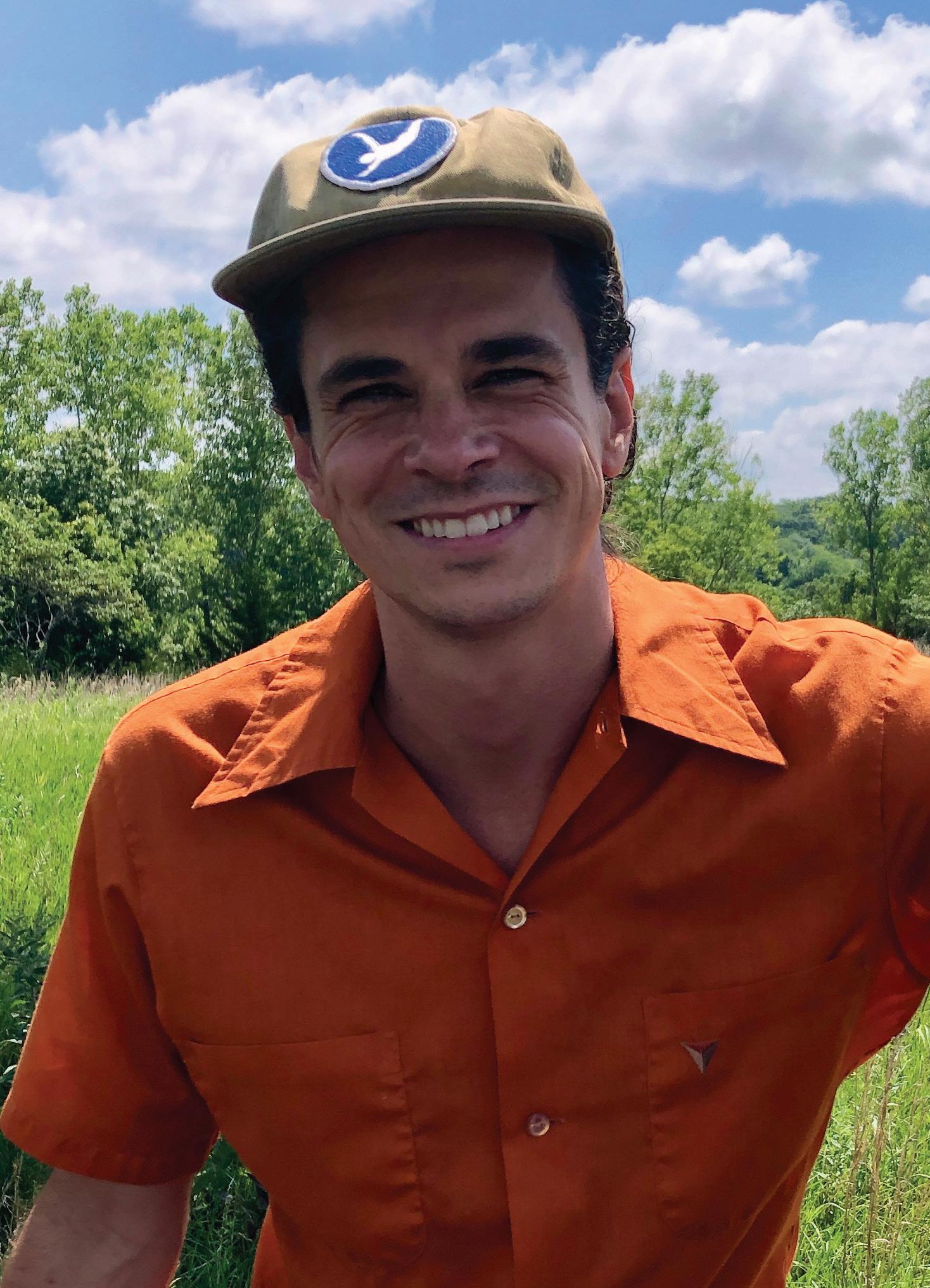
it’s something they can create. Their reflections continually shape the course, making it a living, evolving experience.
Jill: If you could design an ideal future for the Happiness Course, what would that look like?
John: I’m excited to expand on our current happiness class with ‘Up Your Game: The Impact of Meditation, Visualization, and Movement.’ This new course focuses on neuroplasticity and attention training, addressing the distractions of modern life. Students will learn practical techniques to enhance focus, understand its benefits, and gain a competitive edge.
Jill: What is one simple happiness practice that anyone could apply to their daily life?
John: Pause and check in with yourself. Before making a choice—whether it’s what to eat, how to spend your time, or how to react to a situation— ask: How did I feel before? How do I feel after? This simple awareness can lead to powerful shifts. Small, intentional actions done consistently create longterm change.
Jill: What have you learned about happiness from your students that has surprised or inspired you?
John: That joy is contagious. When students embrace play, curiosity, and connection, they remind me why this work matters. Watching them discover that they have the power to shape their own wellbeing—that’s the most inspiring part of all.
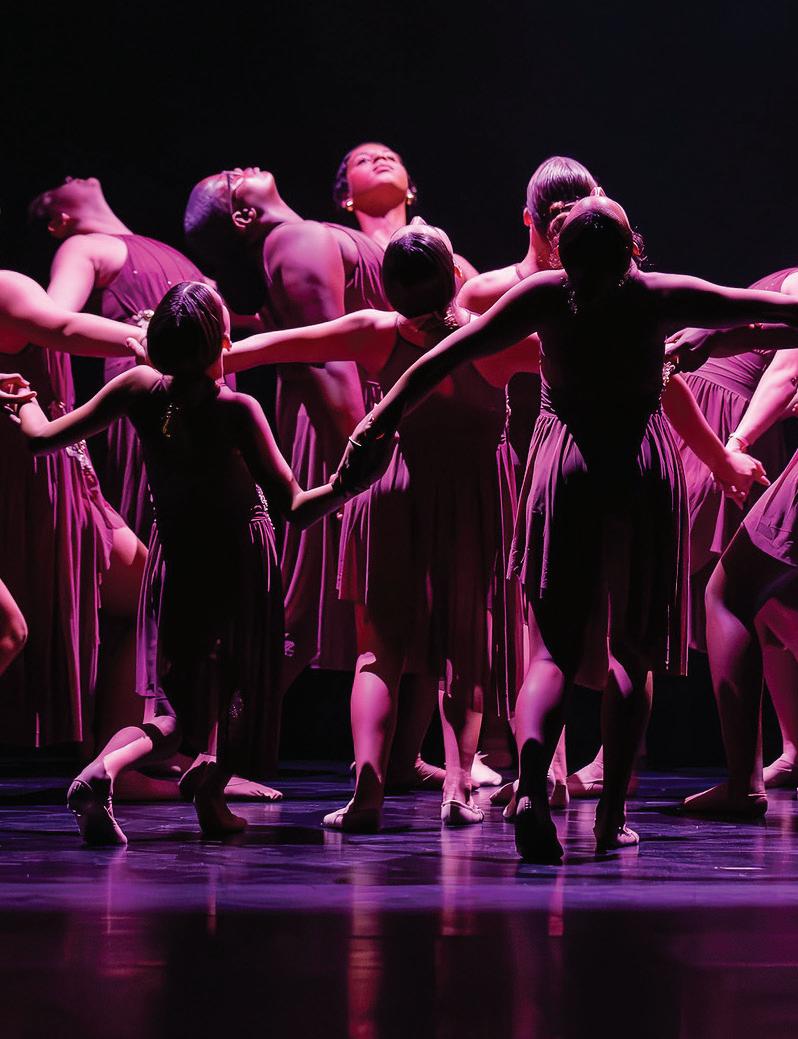
By Terry Alfonso Director of Arts Education and Program
The John Davies Cultural Art Series was launched seven years ago with the opening of the CFA at Miami Country Day School, bringing world-class performers to our community. Featuring luminaries like Sir Ken Robinson, the Preservation Hall Jazz Band, and accomplished homegrown artists, the series has enriched the school’s cultural landscape, providing students and audiences with inspiring performances and thoughtprovoking experiences from globally recognized figures.
As the series evolved, it became clear that its most impactful element was the direct interaction between MCDS Arts students and world-class professionals. What began as an initiative to introduce renowned performers to our community has grown into a dynamic platform for deeper artistic and intellectual engagement, fostering creativity and cultural appreciation among our students, through our Arts faculty.
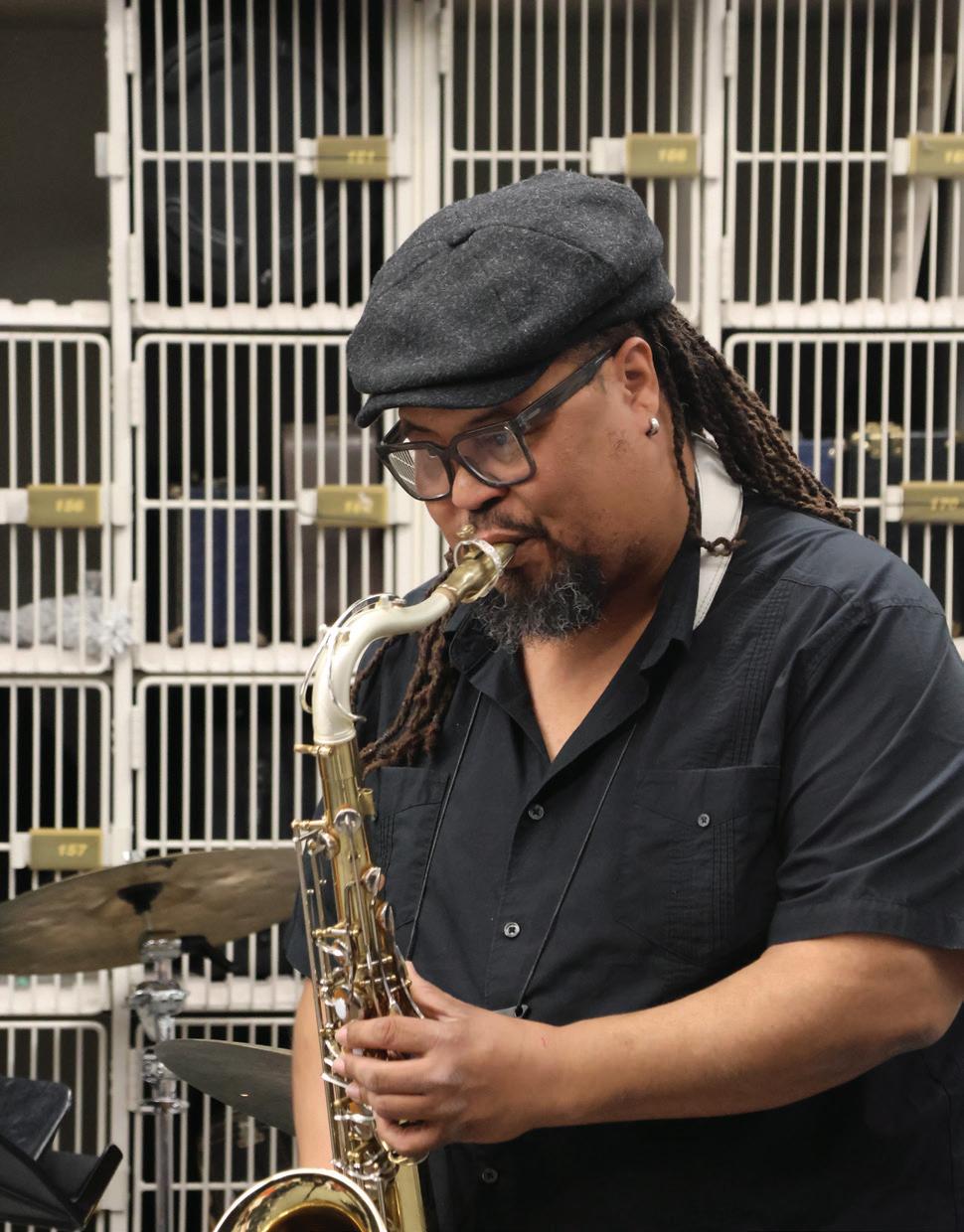
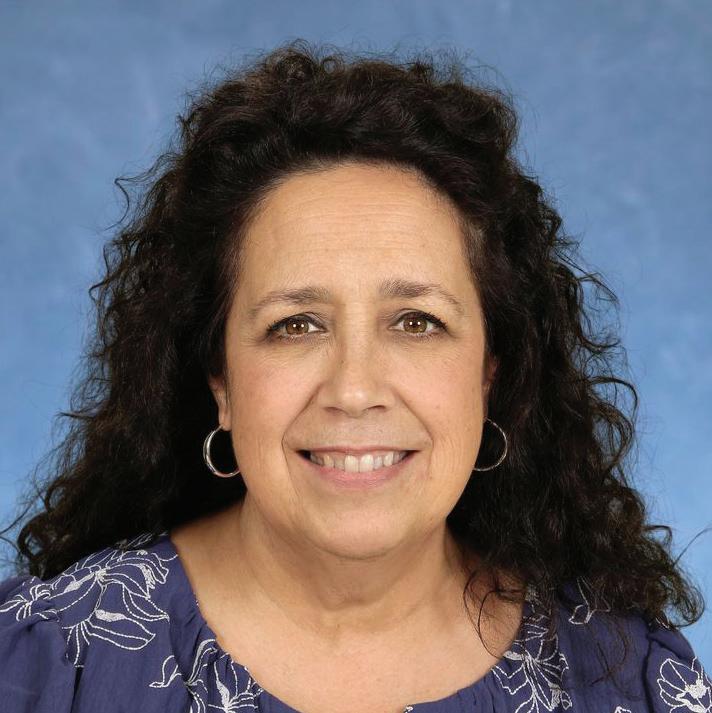
Looking ahead, we hope to expand these hands-on experiences, ensuring that young artists and thinkers have unparalleled opportunities to learn, collaborate, and grow. Since its launch in January, the John Davies Cultural Arts Master Class Series has quickly become a cornerstone of artistic enrichment at the CFA, offering students and faculty an immersive and transformative connection to the arts. MCDS Arts teachers and students are so grateful for and excited by the amazing opportunities our new series has created!
Dayna Stephens is an acclaimed saxophonist, composer, and educator, recognized as the 2019 DownBeat Critics Poll Rising Star-Tenor Saxophone winner. He has released multiple albums, including Right Now! Live at the Village Vanguard (2020) and Liberty (2020), both produced by Matt Pierson, and leads projects like Pluto Juice, an electronic jazz fusion group. His distinctive melodic style and rhythmic innovation have earned praise from NPR and other critics, and he has performed at renowned venues worldwide. Over his career, he has collaborated with jazz legends such as Kenny Barron, Herbie Hancock, Roy Hargrove, and Wayne Shorter.
Student Reflection Quote: “I thought Dayna Stevens was very personable and taught me a lot about the EWI (electronic wind instruments). He was really responsive to students in the master class. I went to his performance after and he showed me all his gear and introduced me to other epic musicians. He offered to get in touch when I start playing saxophone!”
-Jonas Janzon, Class of 2026
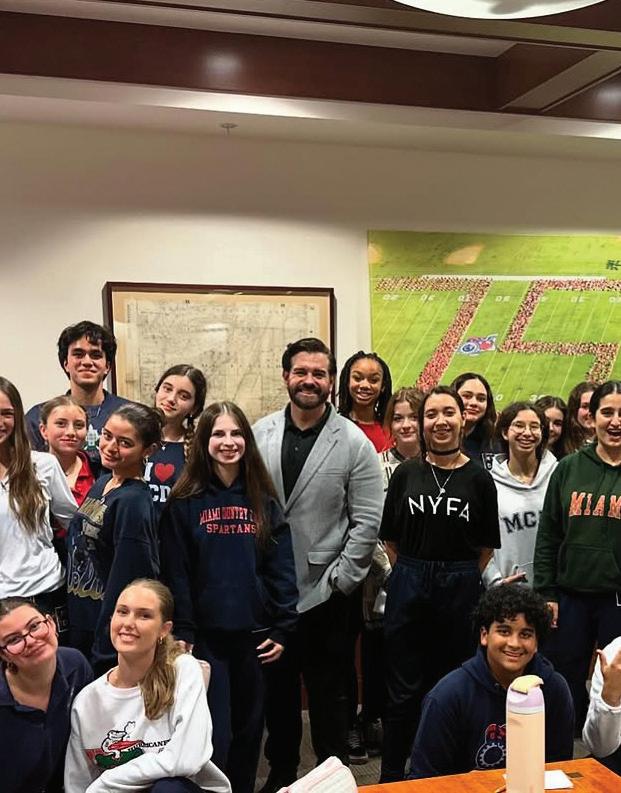
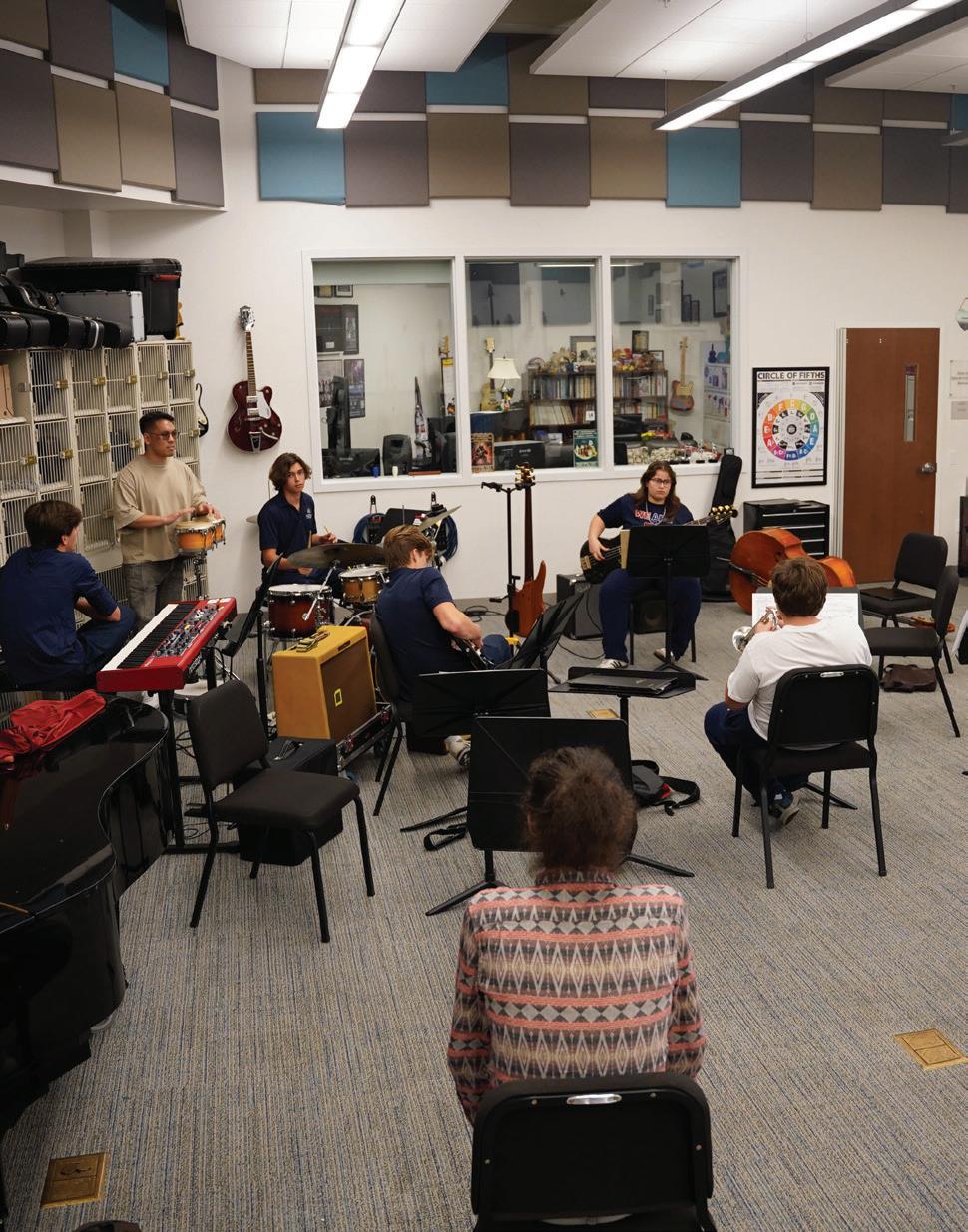
Nicholas Richberg is a Cuban-American award-winning producer, actor, and nonprofit executive, currently serving as Managing Director of Miami New Drama. Under his leadership, the company has produced numerous acclaimed productions, including 7 Deadly Sins, A Wonderful World, and The Cuban Vote. Previously, he was Managing Director of Zoetic Stage at the Adrienne Arsht Center, where he produced world premieres and awardwinning works. A Drama League and Carbonell Award winner, he has also been recognized for his acting, holds an MBA from IE University and Brown University, and has been named a Miami Leader by the Miami Foundation.
Student Reflection Quote: “Getting to speak with Nicholas Richberg about the business of theater and performance was very insightful and gave me a new perspective on what it’s like to have a career in this field. His engaging and helpful tips on work and our own lives allowed me to feel more prepared for my upcoming years in college.” - Alba Haw Class of ‘25
Anthony Fung is a Canadian-born drummer, composer, and producer based in Los Angeles, known for his performances at major jazz festivals and collaborations with legends like Herbie Hancock, Wayne Shorter, and Danilo Pérez. A graduate of the Thelonious Monk Institute and Berklee College of Music, he has released multiple acclaimed albums, including Flashpoint (2018) and What Does it Mean to be Free? (2022). He has received numerous awards, such as the Angel City Jazz Festival New Note Commission Award and the Jazz Foundation of America Grant, and his compositionshavebeenfeaturedinfilmsandTVseries
Student Reflection Quote: “It was awesome to meet him, learn from him, and make connections that will last a lifetime. I learned how to lock in with the bass and create a foundation for the band.” -Gabriel Robert, Class of 2026
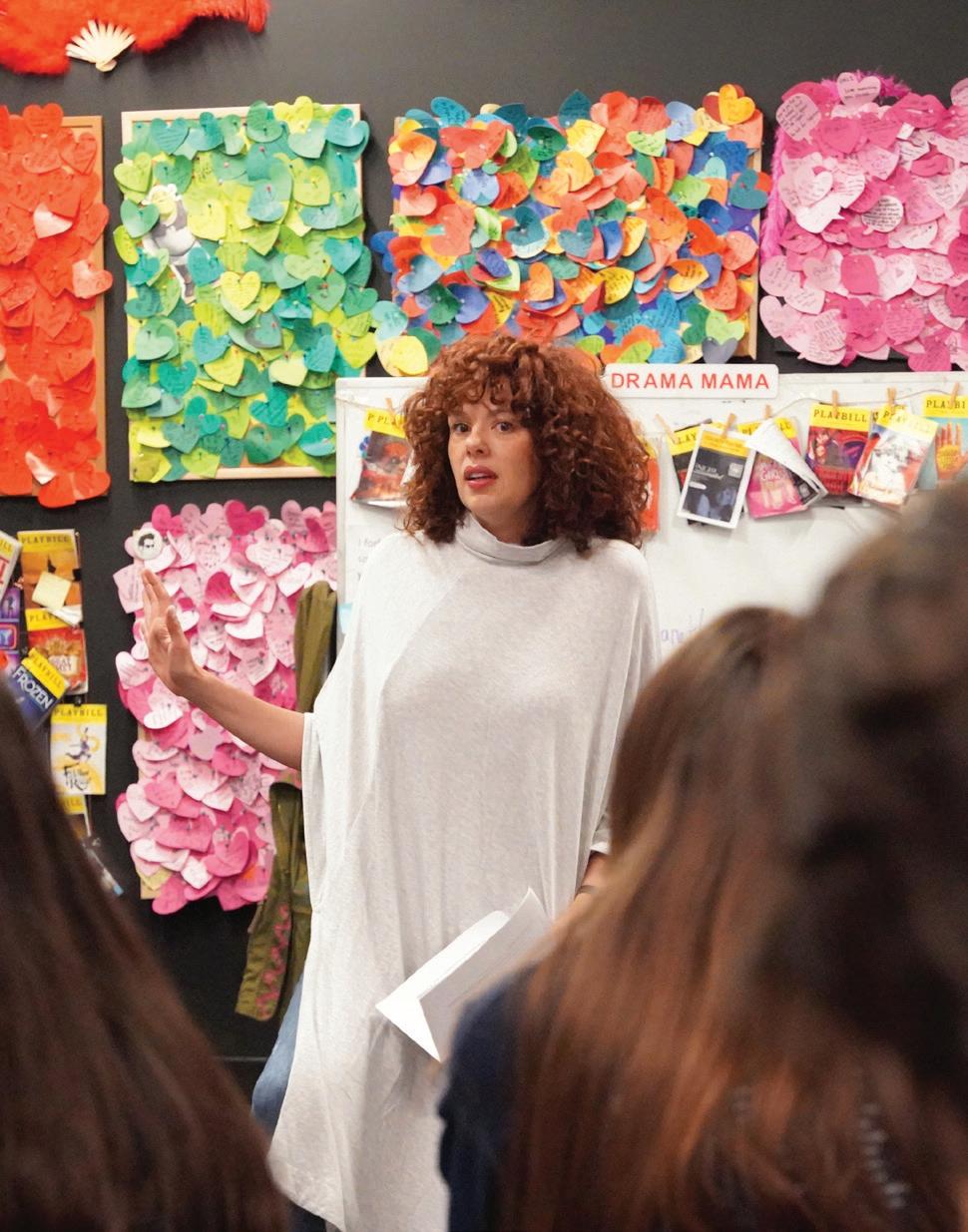
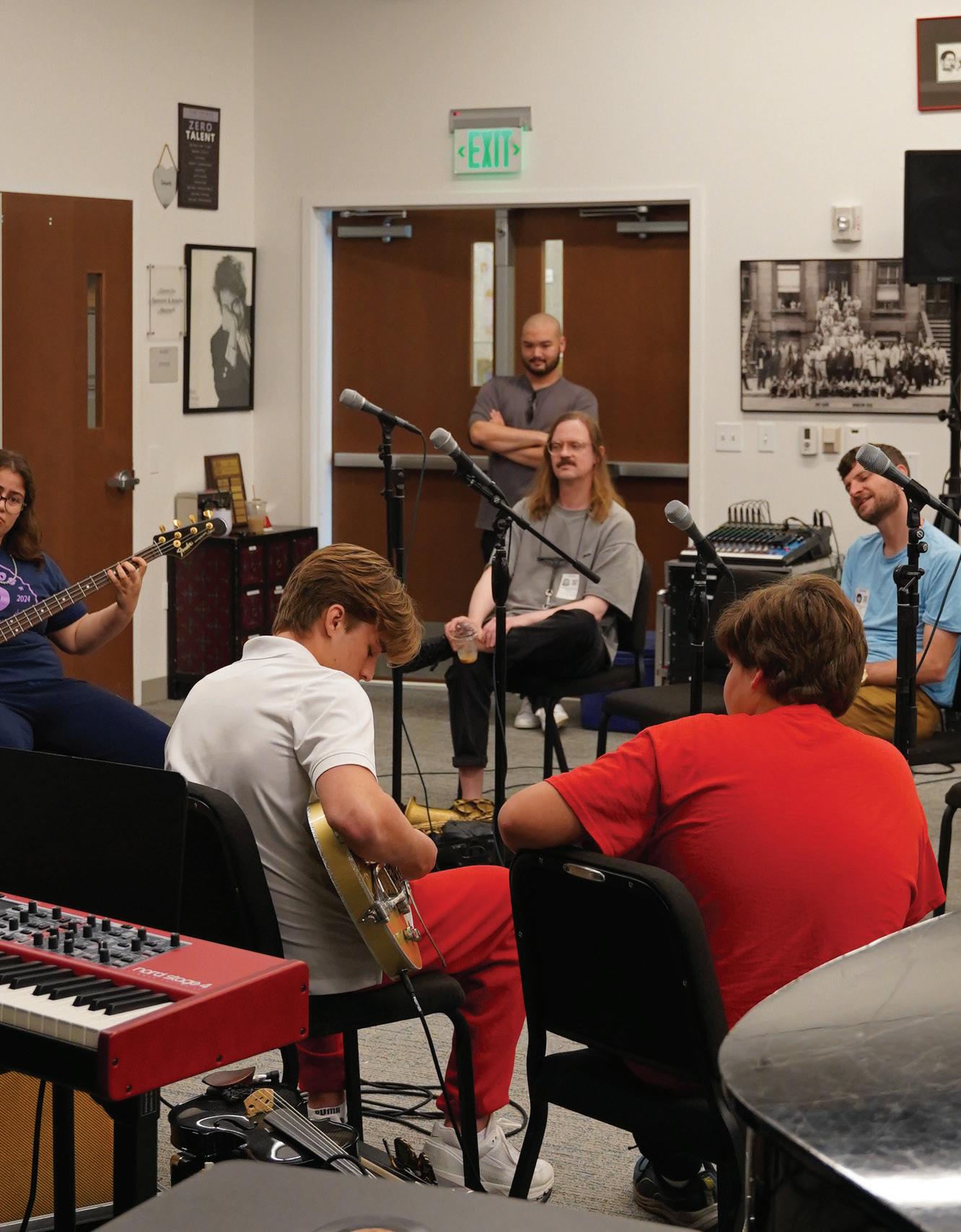
Janet Dacal is an actress and singer best known for her roles in In the Heights, where she played Nina Rosario and Carla, and for originating the role of Alice in Frank Wildhorn’s Wonderland. Born in Los Angeles to Cuban parents and later based in Miami, she began her career singing backup for Gloria Estefan before transitioning to theater. She made her Broadway debut in Good Vibrations (2005) and gained recognition in In the Heights, which won multiple Tony Awards and a Grammy. In addition to her dynamic Broadway career, she has performed in regional theater, concerts, and special events, earning a Carbonell nomination for Five Course Love.
Student Reflection Quote: “Janet Dacal carries herself through the world with compassion, and when she came to speak to us in class, her advice was meaningful, and her presence was felt. It was a privilege to work with Janet at MCDS, as she taught us insight on the theatre industry and life as an actor.”- Victoria Strauch, Class of ‘27
(Micahel League, Justin Stanton, Chris Bullock, and Zach Brock)
Snarky Puppy is a genre-defying, Grammy-winning collective founded in 2004 by bassist Michael League, blending jazz, R&B, funk, and global influences. With a rotating lineup of up to 25 musicians, they have won five Grammy Awards— Best R&B Performance (2014) and Best Contemporary Instrumental Album (2016, 2017, 2021, 2023). Many of their members have collaborated with major artists like Erykah Badu, Snoop Dogg, Kendrick Lamar, D’Angelo, Kirk Franklin, and David Crosby. They continue to push musical boundaries through their independent label, GroundUP Music.
Student Reflection Quote: “Snarky Puppy was one of the most enlightening Master Classes I’ve ever been to as a musician. It helped me learn how to intertwine the melody into my jazz solos on the guitar. The members of Snarky Puppy spoke to us in ways that were easy to understand. I felt that I grew as a musician and I continue to apply the skills I learned in my everyday playing.” -Luca Aceto, Class of 2027
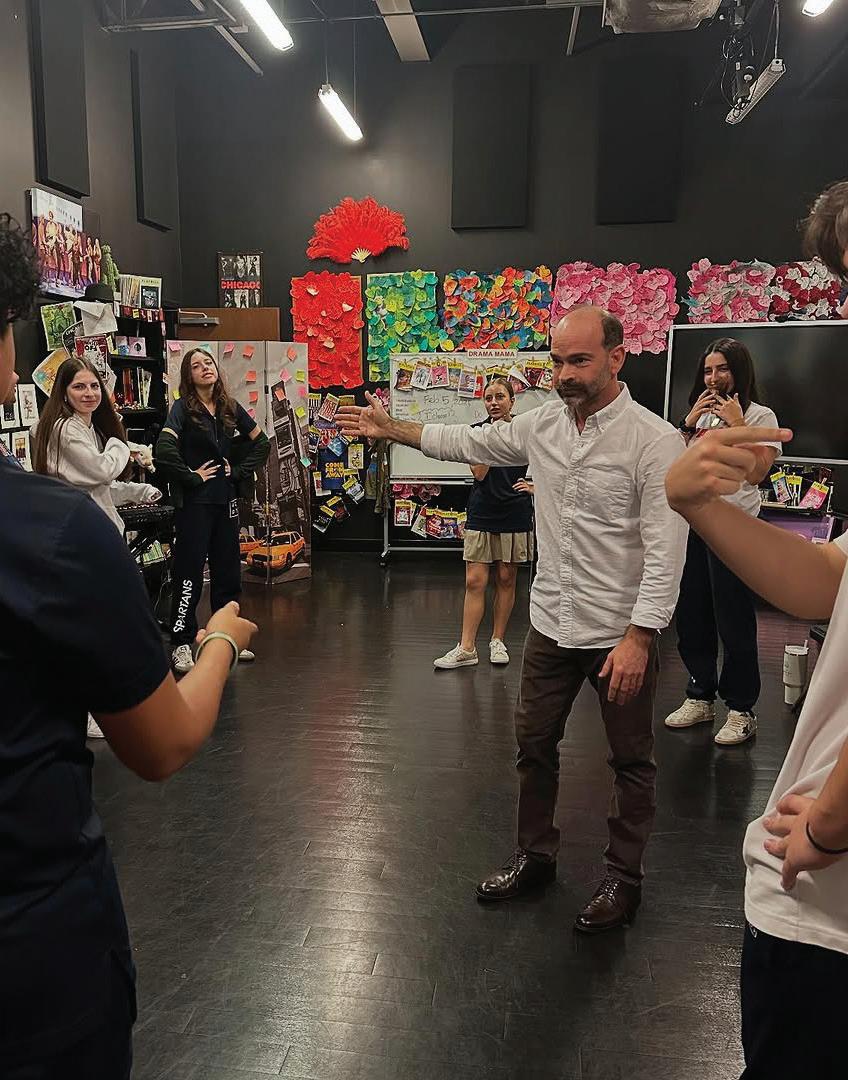
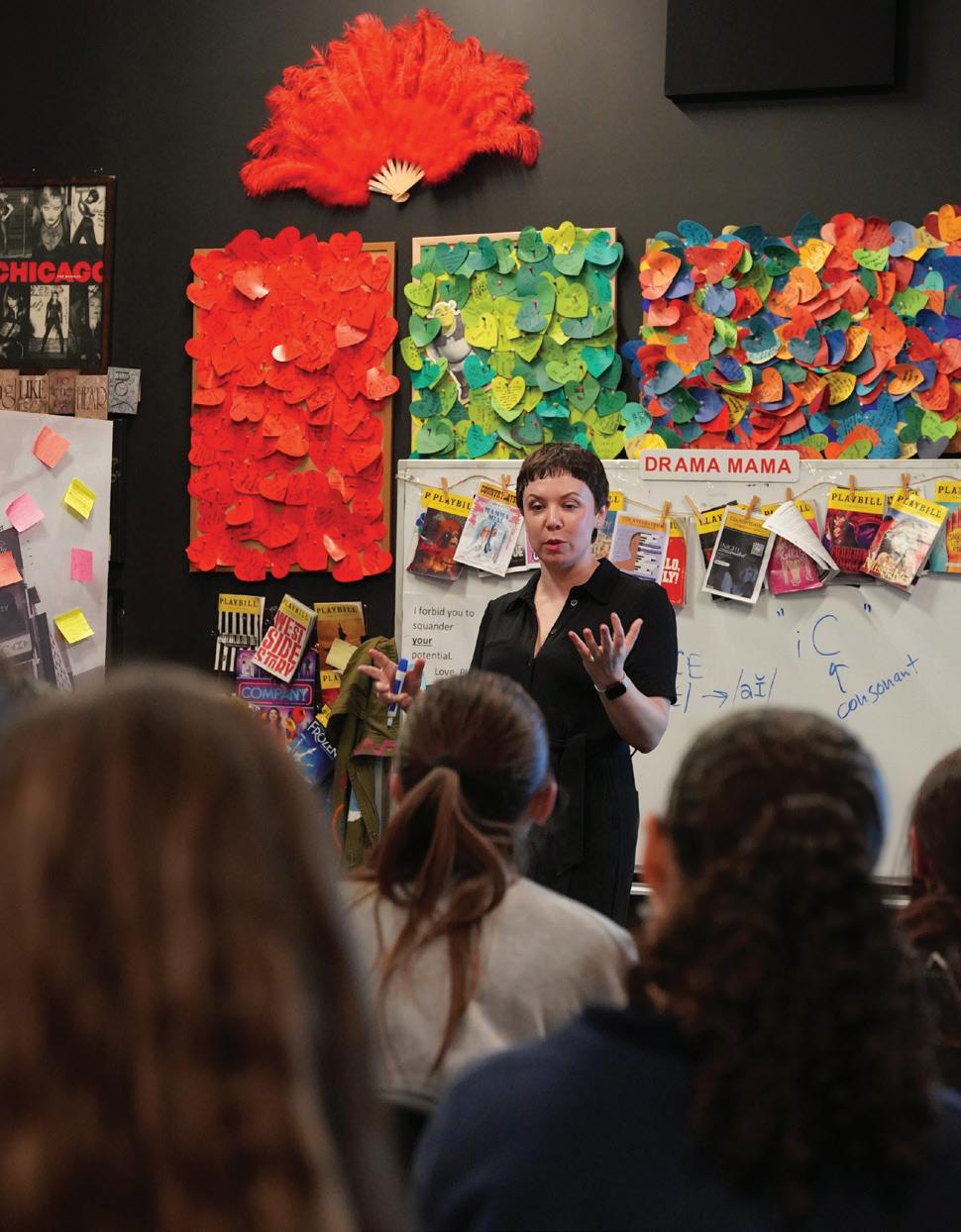
Matt is a seasoned actor, coach, and teacher with nearly three decades of experience performing on stages across the country and screens around the world alongside industry greats like Tom Cruise, Nicole Kidman, and Angela Bassett. Holding a BFA in Acting from Florida State University and an MFA from the University of Delaware’s Professional Theatre Training Program, he has trained with some of the most influential educators of his generation. His career spans theater, film, and television, including roles in 25 major motion picture and TV projects. Now based in Asheville, NC, Matt integrates acting, holistic practices, and spirituality to help aspiring performers and communities create more authentic, passionate, and purposeful lives.
Student Reflection Quote: “The experience of Matt Burke teaching us the Chekhov acting technique was amazing and really improved our idea of what it means to “be a performer”. He encouraged us to become better actors while also creating an enjoyable and encouraging atmosphere. His eagerness and support gave us the confidence to try new things pushing ourselves far beyond our comfort zones.” - Jordana Mutchnick, Class of ‘27
Melissa, known as “PK” (Professor Kollwitz), is a former theatre professor who transitioned from academia in 2020 to focus on coaching actors and artists. As a multi-hyphenate, she has extensive experience as a playwright, director, choreographer, actor, and producer, with a passion for acting and voice coaching. She developed The PK Method, a system designed to fill gaps in traditional actor training by providing practical, repeatable techniques for expressive voice and bodywork. Additionally, she offers career and mindset coaching, helping artists build resilience, overcome performance anxiety, and develop a growth mindset to show up authentically in their craft.
Student Reflection Quote: “Working with PK was an enlightening experience that truly transformed the way we approached our accents and dialects for Sweeney Todd and our one-person shows. Their insight into the intricacies of speech, voice, and character was invaluable. PK’s approach isn’t just about teaching accents—it’s about understanding the deeper connection between sound, emotion, and identity.” Salome Benitah, Class of ‘25
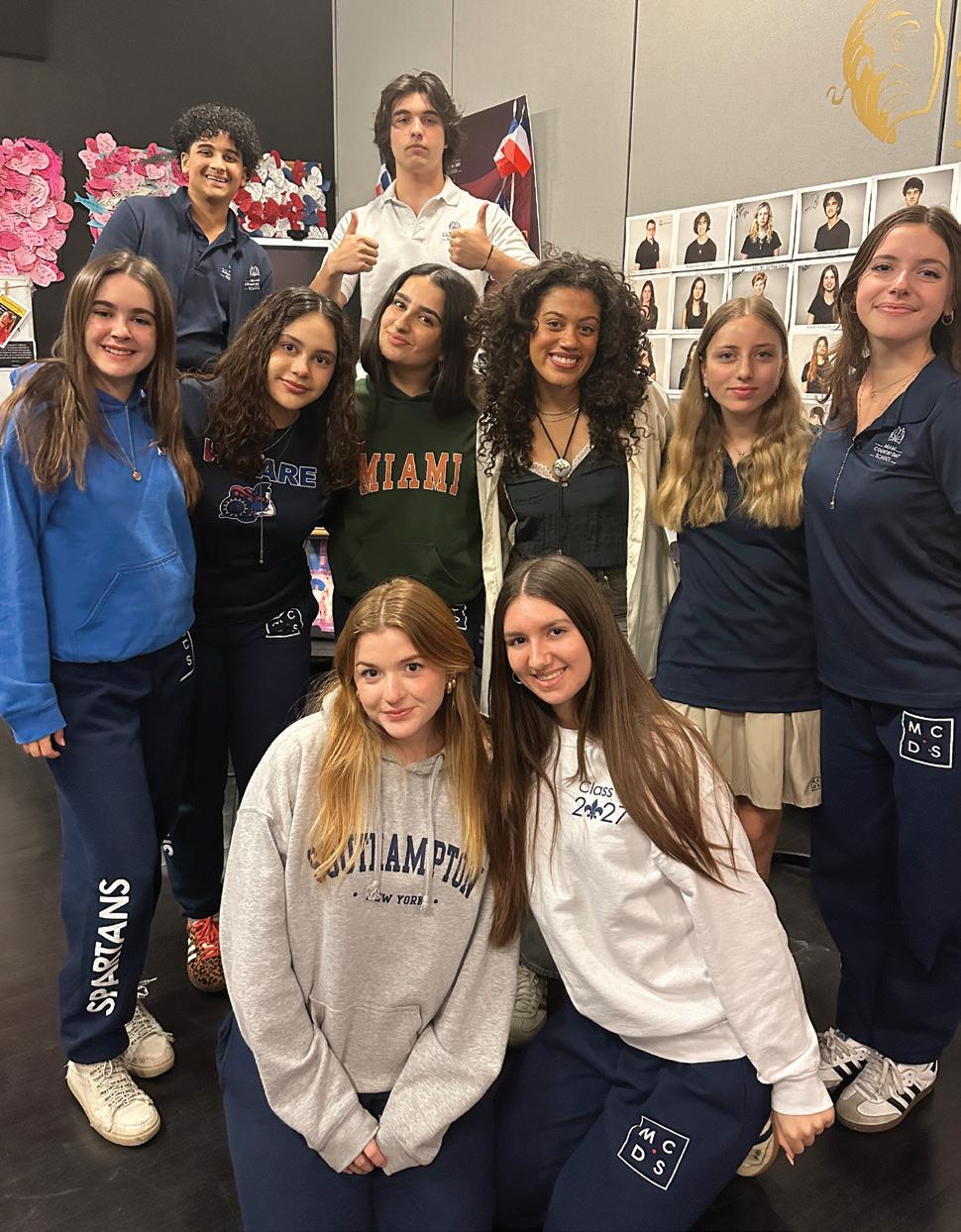
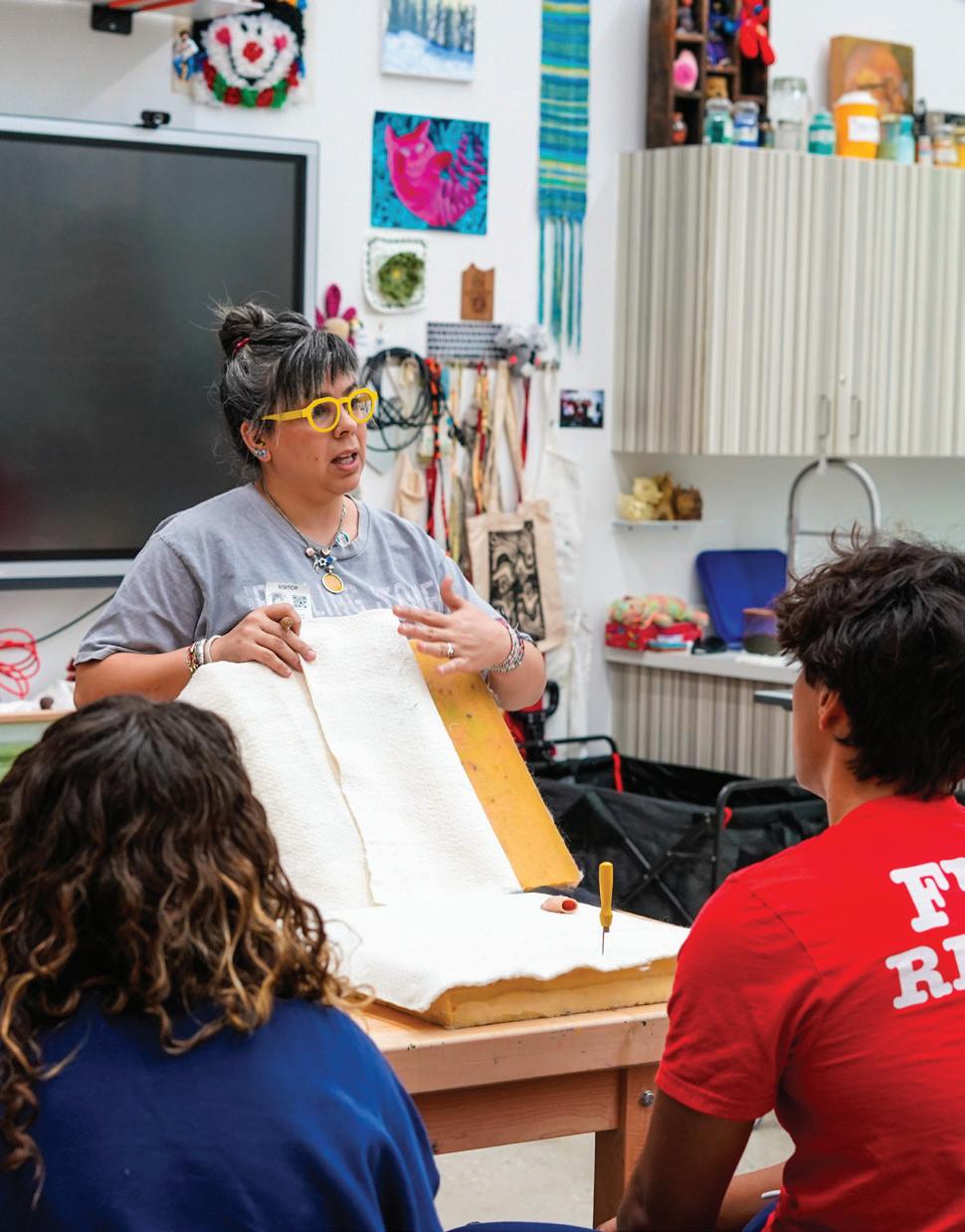
Amaris L. Rios is a singer and actor with a BFA in Musical Theatre from Emerson College. She has performed in numerous productions, including Falsettos (Charlotte), Cabaret (Fritzie), and Rent (Mimi Marquez), and was awarded Best Supporting Actor at the 2023 EVVY Awards. Trained in musical theatre dance, Linklater voice technique, and private coaching, she has honed her craft both in the U.S. and internationally. She brings versatility to her performances, along with expertise in multiple accents and dialects.
Student Reflection Quote: “Having alumni Amaris Rios come give a masterclass was truly an enriching experience. Not only was her energy infectious and positive, she helped our whole class with amazing techniques that impacted us all. Working with her allowed students to see their pieces in a new way and a lot of progress was made because of her!”
-Lea Denain, Class of ‘27
Aurora Molina is a Cuban-born, Miami-based fiber artist whose work critiques societal attitudes toward beauty, aging, and political issues. Using embroidery, sculpture, drawing, photography, and video, she explores themes of invisibility, particularly the marginalization of the elderly, and the growing disconnect in modern society. She uses fiber art as a statement on contemporary issues like political satire, climate change, and misinformation. A co-founder of Fiber Artists-Miami Association (FAMA), she is committed to advancing fiber art as a powerful medium for social commentary.
Student Reflection Quote: “Having Ms. Molina come in to teach us felting was a really cool experience as someone completely new to the medium. I probably wouldn’t have even thought to try it had I not taken Runge’s fiber studio class or Ms. Molina’s felting workshop. It was a really fun activity, and I think, an awesome way to translate concepts/ ideas into pieces of art. It was also an amazing opportunity to get to learn from and with a professional artist.” - Z Loverde, Class of ‘28
Florida Music Educators Association (FMEA) All- State (Best in state)
Elementary Orff Ensemble
Madison Guzman and Julia Fortes
High School Honors Orchestra:
Simone Levy (Double Bass) and Gabriel Robert (Cello)
MS & US MUSIC COMPETITION
Florida Bandmasters Association, District 20 Solo & Ensemble music performance assessment (MPA)
Upper School Superior Solos
Gabriel Robert – Percussion
Jack Mandel – Trumpet
Jared Martinez Molina –Trumpet
Lorenzo Lyndaker – Tenor
Saxophone
Dive Munson Mannarelli – Alto
Saxophone
Middle School Superior Solos
Ari Kleiner – Alto Saxophone
Jack King* – Alto Saxophone
Bre Puro* – Alto Saxophone
Alejandro Leal* – Alto
Saxophone
Nicolas “Nico” Feitler* – Alto
Saxophone
*Participated in 2-year sequence of Early Bird Band
Our Intermediate and Advanced Orchestra Florida Orchestra Association District
Solo and Ensemble Festival
ORCHESTRA SOLOS
SUPERIOR RATING
Emma Falconi
Sebastian Falconi
Matthew Green
Isaiah Jackson
Drake Baldwin
Simone Levy
William Kebrdle
Gabriel Robert
Chantal Gomez Ortega
Aiden Henderson
Laila Ishaq
Agustin Jaramillo
Pedro Jaramillo
Max Bovio
Olivia Pelletier
EXCELLENT RATING
Anule Puro
Adriana Lushnikov
Anarria Pinchinat
Karter Rogers
Mikayla Washington
Emma Romanik
Cameron Schoch
Audrina Dimmer
Valentina Genao
JUNIOR THESPIANS
SUPERIOR on Monologue
Dillinger Kaushansky
Keira Harwin
Zoey Campos
Nati Del Valle
Ava Alonso
SUPERIOR on Duet Acting Scene!
Nati Del Valle and Lennox
Gordon
Victoria Chaparro and Chloe Ohana (Duet Song)
Charlotte Starr and Valentina Genao (Duet Song)
Sonya Antonova earned a score of SUPERIOR on her costume design!
Victoria Chaparro earned a score of SUPERIOR on her solo song
And…
SUPERIOR on Small Group Song
Valentina Genao, Sloane Grabois, Emma Romanik, Keira Harwin, and Rebecca Schwartz
SUPERIOR on Ensemble Acting Scene!
Zoey Campos, Agustin Jaramillo, Anastasia Knyshova, Chloe Ohana, Dillinger Kaushansky, Madison Telemaque, and Daniel Rozensztroch
Excellent on a Solo Song
Chloe Ohana
Emma Falconi
Anastasia Knyshova
Rebecca Schwartz
Excellent on Duet Scene
Madison Telemaque and Emma Falconi and Agustin Jaramillo and Zoey Campos and Rocky Myers and Benji
Salanic (duet song)
Sophia Paulshock-Brown, Ava Alonso, and Charlotte Starr earned a score of Excellent on their trio song!
Dillinger Kaushansky, Sophia Paulshock-Brown, Ava Alonso, Rebecca Schwartz, Nati Del Valle, Lennox Gordon, Keira Harwin, Rocky Myers, Daniel Rozensztroch, Sloane Grabois, Valentina Genao, Charlotte Starr and Emma Romanik earned a score of Excellent on their large group song!
UPPER SCHOOL THESPIANS DISTRICTS
TOP HONORS: MonologueBianca Maria Bonetti
TOP HONORS: Costume
Design- Caterina Serrano-Bigles
TOP HONORS: Costume
Construction- Caera Charles
TOP HONORS: Costume
Design- Dagny Jerles
TOP HONORS: Duet Acting-
Bianca Maria Bonetti, Felipe Verdiquio
TOP HONORS: Makeup DesignCaera Charles
TOP HONORS: Makeup DesignLea Denain
TOP HONORS: Set DesignAntonio Restrepo
SUPERIOR: Duet Acting- Avery Morgan, Cameron Behr
SUPERIOR: Duet Acting- Bianca Maria Bonetti, Felipe Verdiquio
SUPERIOR: Monologue- Avery Morgan
SUPERIOR: Solo Musical- Miguel Escobar
SUPERIOR: Monologue- Bianca Maria Bonetti
SUPERIOR: Costume DesignDagny Jerles
SUPERIOR: Small Group
Musical-Cameron Behr, Felipe Verdiquio, Jordana Mutchnik, Joshua Morris, Lea Denain, Santino Kohen, Victoria Strauch
SUPERIOR: Large Group
Musical- Alba Haw, Ava Pumo, Cameron Behr, Emmy Shoaf, Maia Mandel, Orli Ressler, Riley Mandel, Salome Benitah
SUPERIOR: Costume DesignStella Mary Espenkotter
SUPERIOR: Costume DesignCaterina Serrano-Bigles
SUPERIOR: Costume
Construction- Caera Charles
SUPERIOR: Makeup DesignCaera Charles
SUPERIOR: Makeup Design- Lea Denain
SUPERIOR: Set Design- Antonio Restrepo
SUPERIOR: Directing- Alba Haw, Felipe Verdiqio and Jordana Mutchnik
EXCELLENT: Duet MusicalCarina Kreuter, Jordana Mutchnik
EXCELLENT: Duet MusicalAlessio Beltran, Victoria Strauch
EXCELLENT: Solo MusicalCaterina Serrano- Biggles
EXCELLENT: Solo MusicalCaera Charles
EXCELLENT: MonologueSerenity Ukegbu
EXCELLENT: Duet MusicalJared Martinez Molina, Miguel
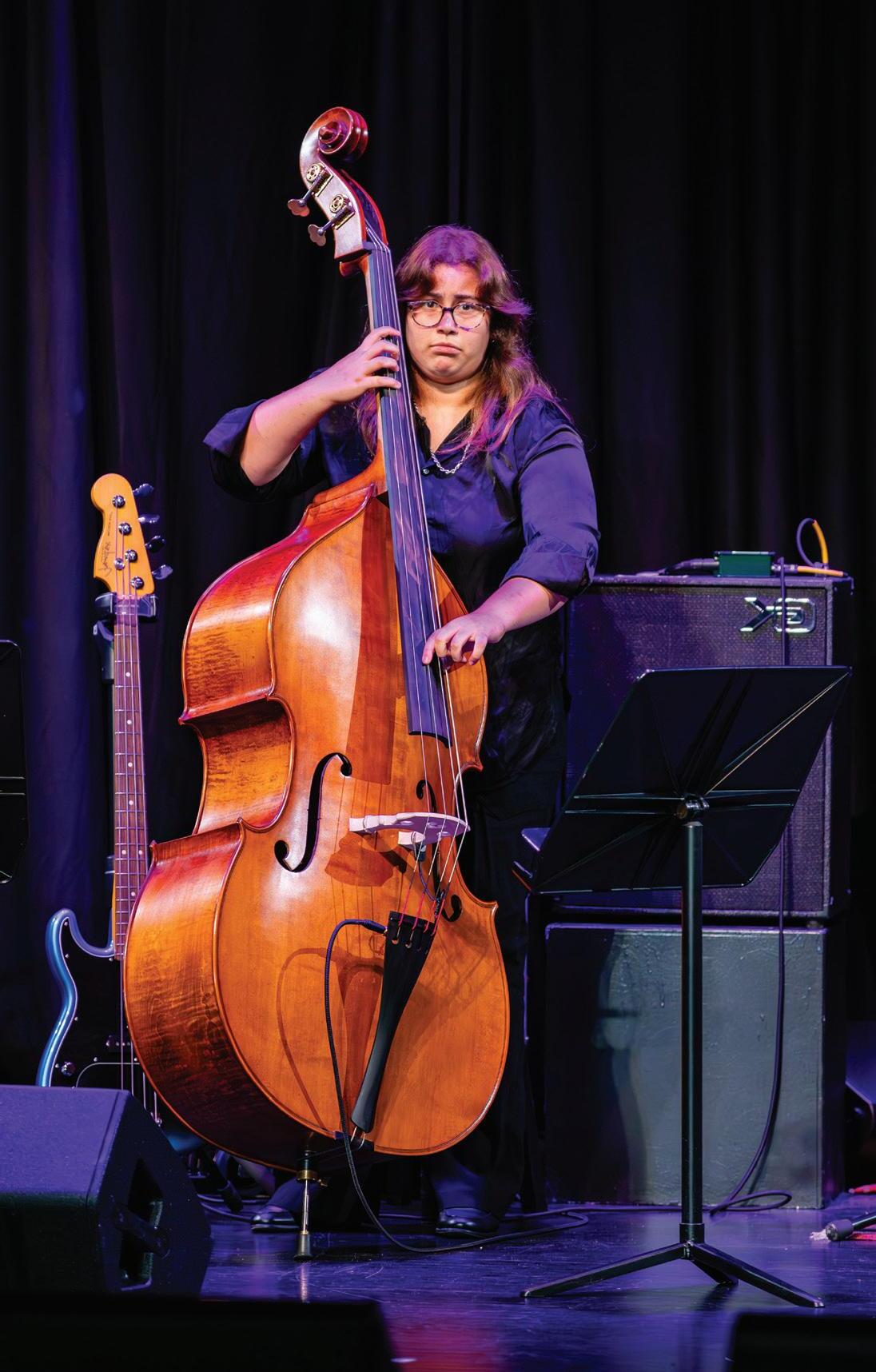
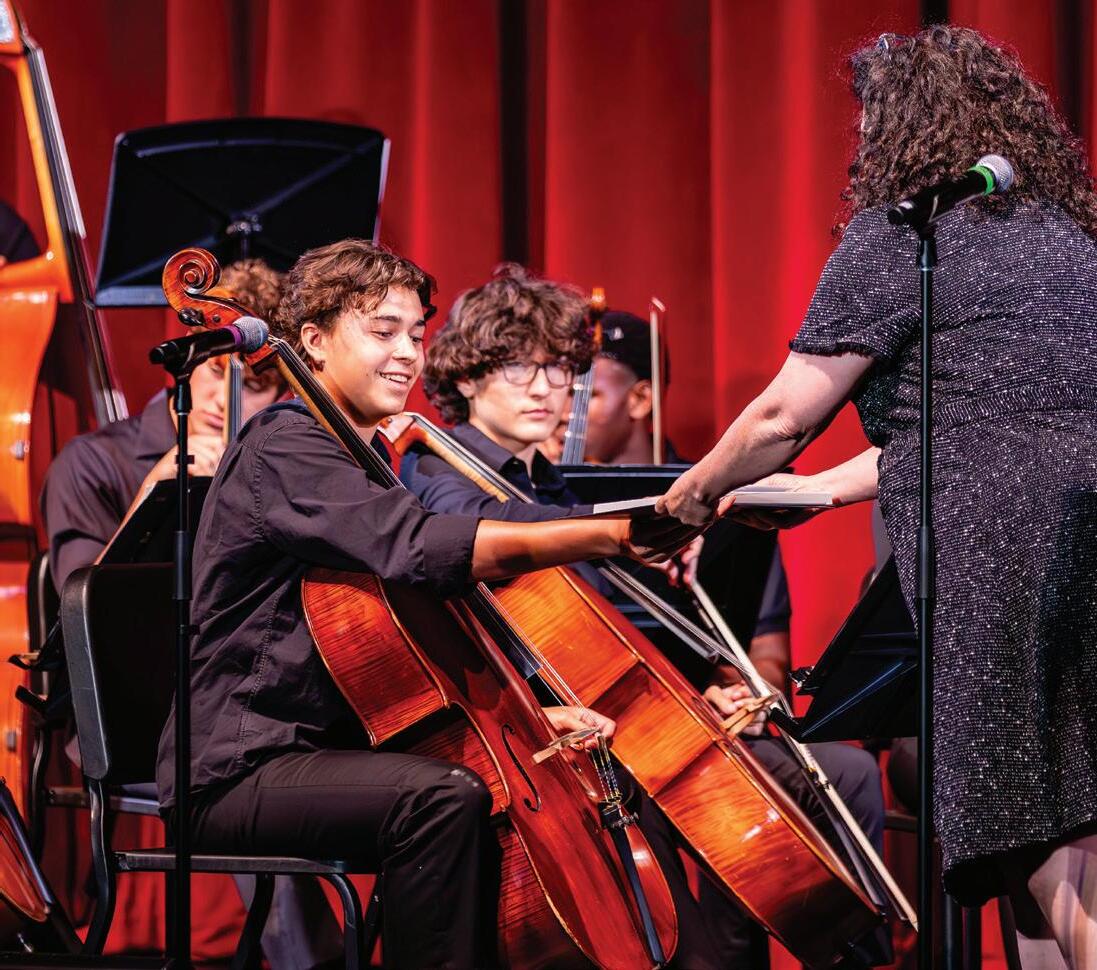
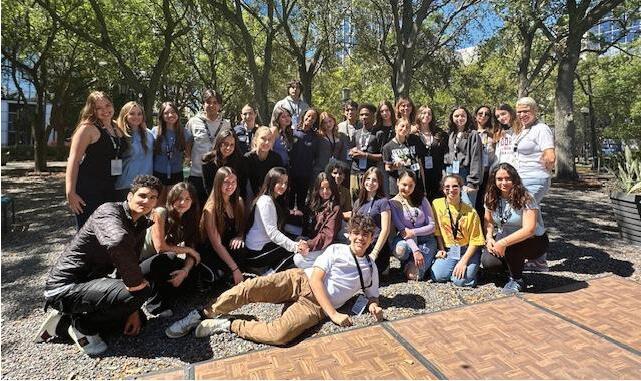
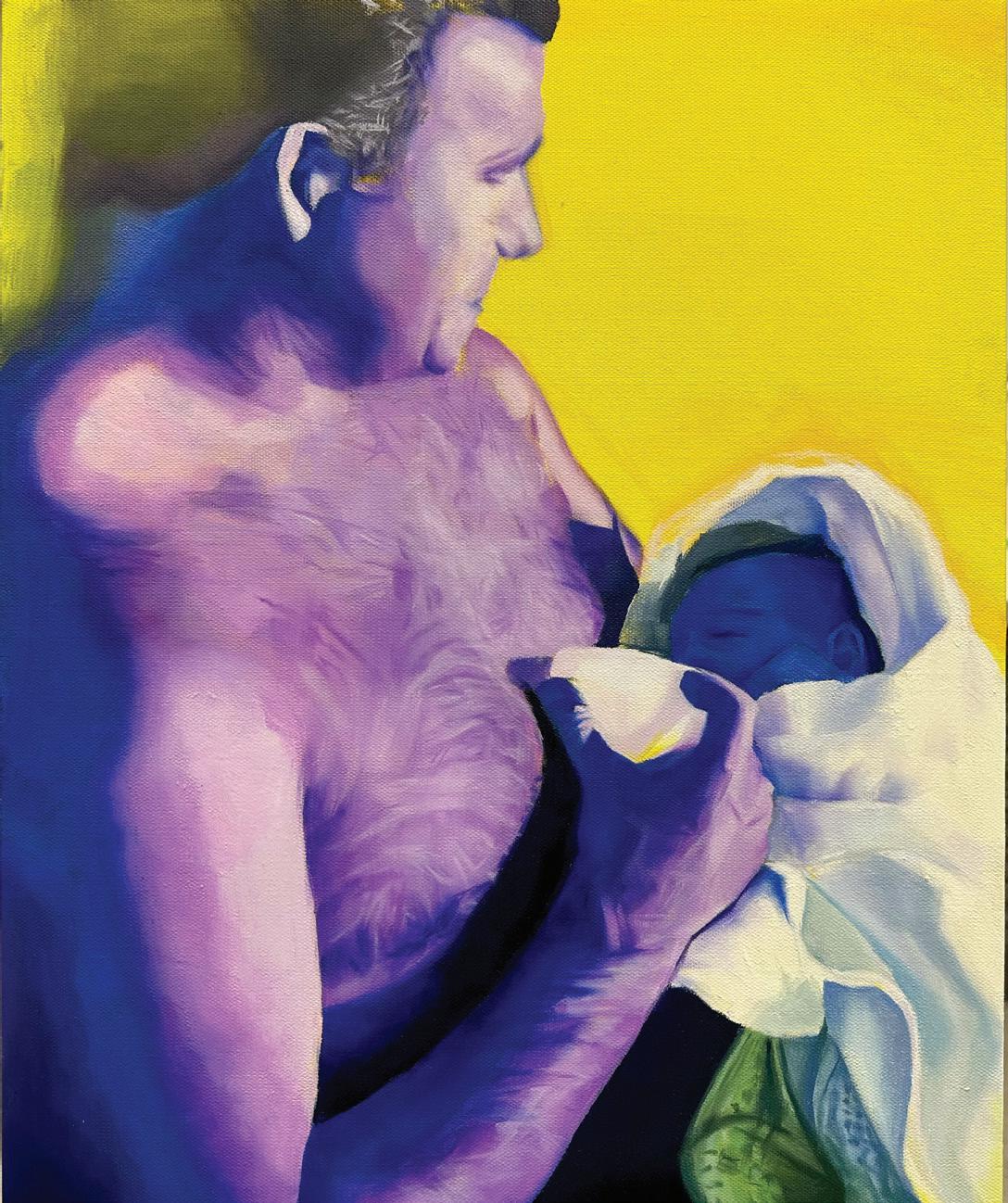
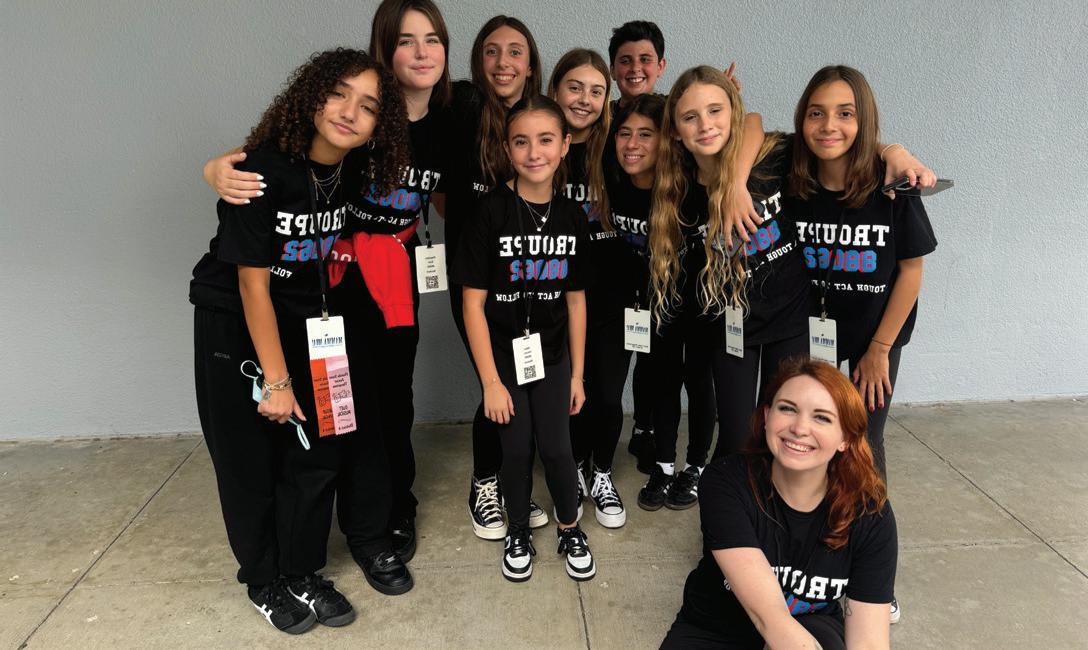
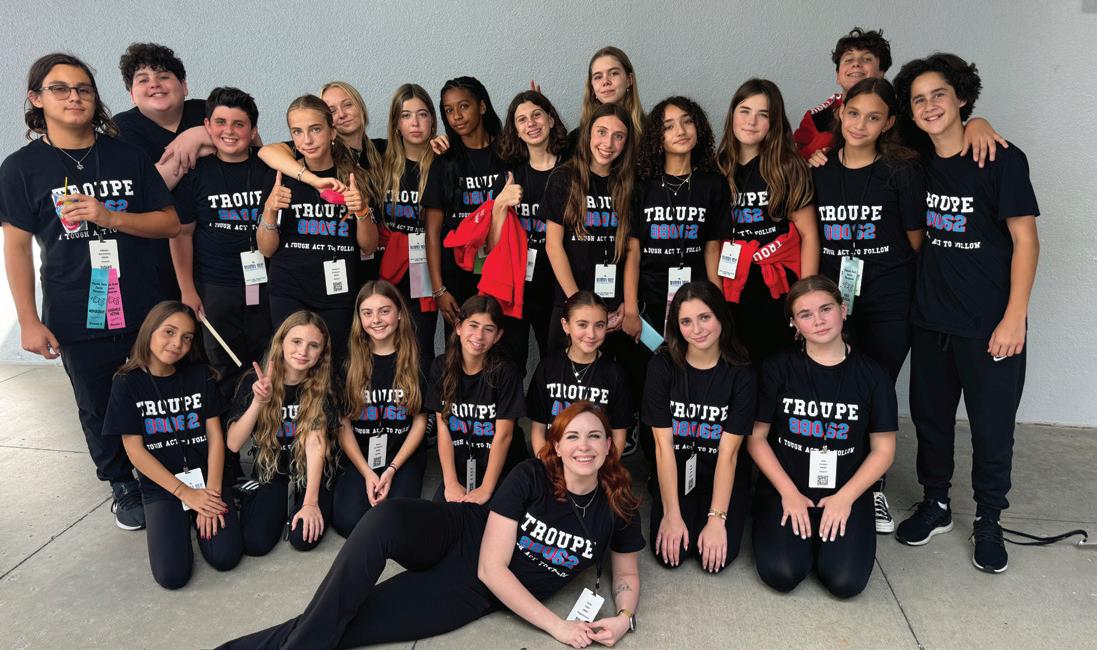
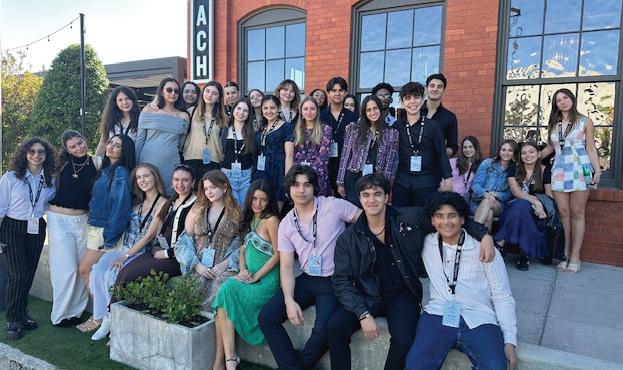
Escobar
EXCELLENT: Duet Acting- Emmy Shoaf, Joshua Morris
EXCELLENT: Ensemble ActingLaila Ishaq, Madeline Elise Buttacavoli, Maia Mandel, Valeria Alvarez
EXCELLENT: Ensemble ActingAlessio Beltran, Avery Morgan, Sophia Leonard
EXCELLENT: Choreography
Design- Alba Haw, Riley Mandel, Salome Benitah
EXCELLENT: Small Group
Musical- Alba Haw, Ava Pumo, Maia Mandel, Orli Ressler, Salome Benitah, Sophia Leonard, Z Loverde
EXCELLENT: Large Group
Musical-Alessio Beltran, Anastassia Petukhova, Antonio Restrepo, Bianca Maria Bonetti, Carina Kreuter, Felipe Verdiquio, Jared Martinez Molina, Jordana Mutchnik, Joshua Morris, Laila Ishaq, Lea Denain, Madeline Elise Buttacavoli, Sophia Leonard, Talia Kilstock, Victoria Strauch
SCHOLASTIC ART AWARDS
Honorable Mentions were won by Alessia Badia for her paintings, “Scalpel” and “Vivid Acid.” Ella Smith also earned an honorable mention for her photograph, “Roots.”
Scalpel -sending in email
Vivid Acid-sending in email
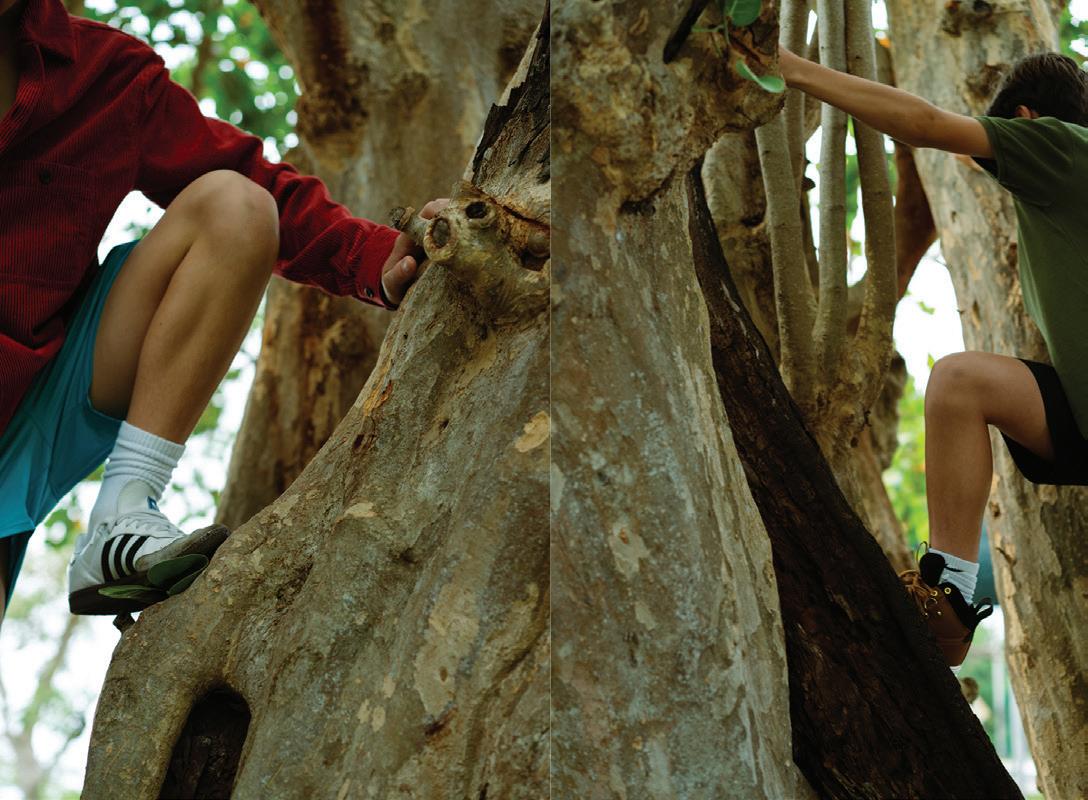
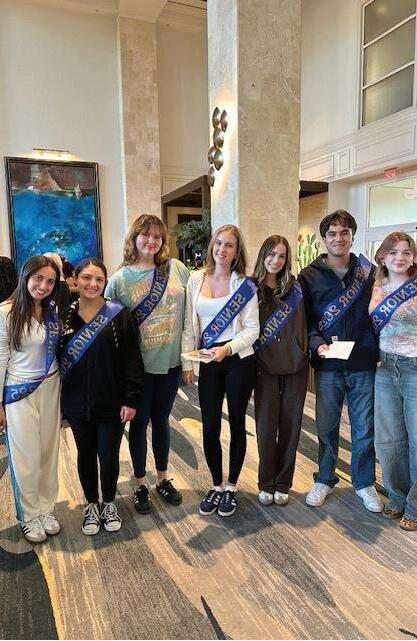
As the firstborn and eldest, and as I approach the final stretch of my high school days, it’s hard not to look back on the years that have so quickly gone by. I’m forced to look at my brother’s life in retrospect and understand the close parallels between our childhoods. Through my photography, I am exploring their childhood and how their daily activities represent their life. In combining two photos, one of each brother (11 and 14) climbing a tree, I make a comparison of their lives and how their ages separate them. Their clothes represent their personalities, the brother on the right being more vibrant than the brother on the left. In addition, their size and age are accentuated in their legs and arms. However, they parallel each other, highlighted in the perfect grouping of the two images, the right being a reflection of the left.
--Ella
For her painting, “Purple Nostalgia,” Alessia Badia earned a Silver Key, and for his photograph, “Chaos In the Hallway,” Lucas Gynell also won a Silver Key.
Purple Nostalgia-sending in email
The Silver Key winners’ work was on display at the Rubell Museum.
US THESPIAN STATE
Superior- Duet Acting: Cameron Behr and Avery Morgan
Superior- Set Design: Antonio Restrepo
Superior- Small Group Musical: Jordana Mutchnik, Victoria Strauch, Cameron Behr, Joshua Morris, Lea Denain, Santino Kohen, and Felipe Verdiquio
Excellent- Makeup Design: Caera Charles
Excellent- Duet Acting: Bianca Maria Bonetti and Felipe Verdiquio
Excellent- Large Group
Musical: Cameron Behr, Alba Haw, Salome Benitah, Emmy Shoaf, Orli Ressler, Ava Pumo, Maia Mandel, and Riley Mandel
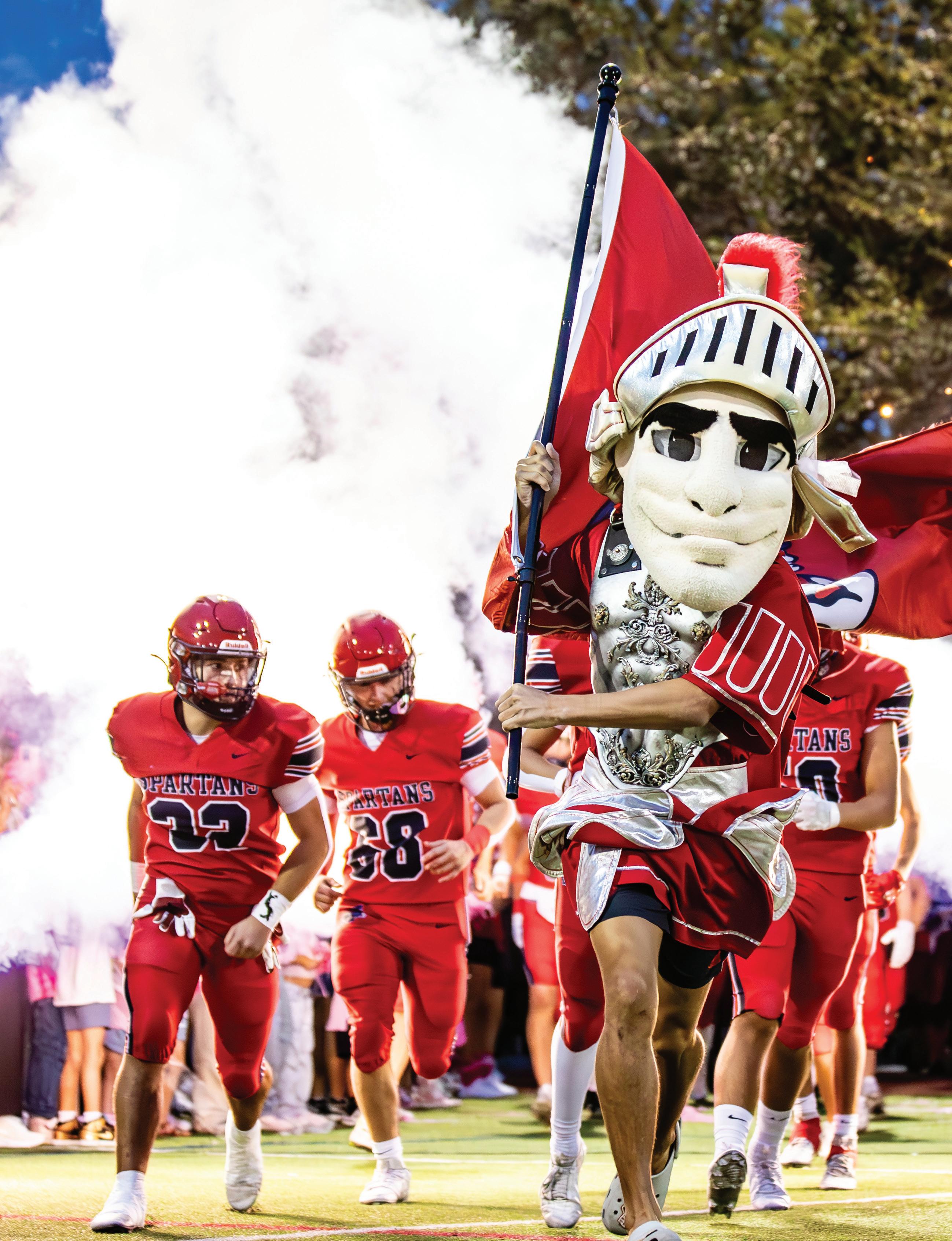
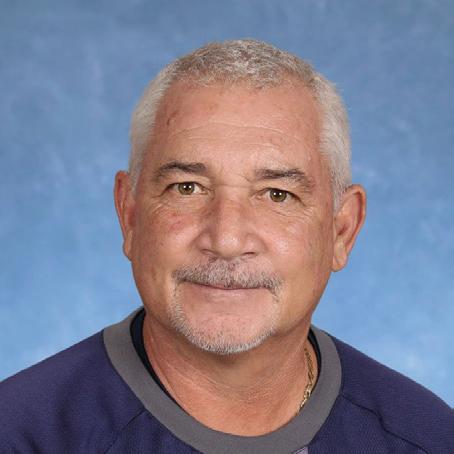
The Evolution of Swimming and Water Polo at Miami Country Day School: From Humble Beginnings to State-Level Achievements
By Charles Sennett Director of Athletics
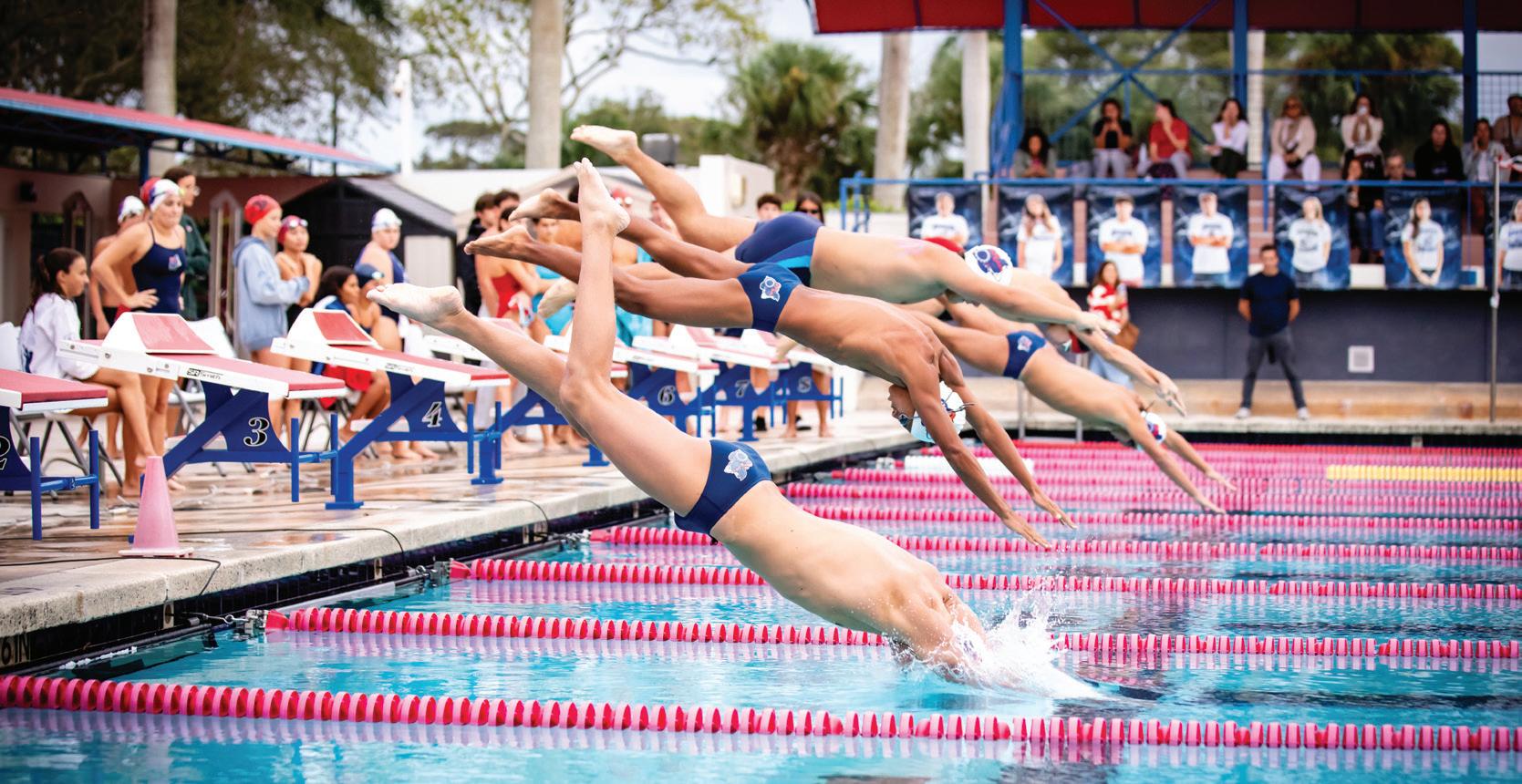
Water polo at MCDS first began in 1992, paused for a few years due to lack of interest, and was reinstated in the early 2000s, primarily as a boys’ sport, and was marked by a youthful and energetic team composed mostly of underclassmen. This success of the boys team was built on the hard work and vision of key coaches. Led the Spartan Athletic Hall of Famer, Carlos Cannon - Class of 2008 - the team made a Final Four appearance in 2008. John Turnipseed, who coached the boys’ team early on, instilled a culture of tough discipline mixed with personal growth and responsibility.
According to Assistant Coach Andrew Tripodo (Class of 2008),
Turnipseed’s leadership went beyond the pool, shaping his athletes into individuals who understood the power of selfmotivation and accountability. Tripodo recalls a specific moment during a grueling swim set when Turnipseed taught a lesson about excellence — one that not only pushed athletes physically but mentally as well, resulting in a memorable District Championship victory against the heavily favored MAST.
The game-changing moment for the girls team came in 2005 when a group of ambitious students led by Stephanie Ragheb Batcheller and Charlotte Schou took the initiative to establish the girls’
team. Their efforts led to the official formation of the MCDS Girls’ Water Polo program in 2005. Though the first season was a tough one, with many players being middle schoolers, their passion and commitment to the sport laid the foundation for years of success.
The team quickly grew stronger and in 2010, the MCDS girls’ team made their first State tournament appearance, marking the beginning of a legacy that continues today. Standout players like Ashley Hatcher (Class of 2011) and Zoe Respondek (Class of 2011) guided the team to its first taste of state-level competition, and over the years,
Miami CountryDay School (MCDS) has long been a powerhouse in the South Florida aquatics community, with both its water polo and swimming programs carving out rich histories of success. From humble beginnings to statewide recognition, the journey of these programs highlights the spirit of dedication, teamwork, and community that has fueled their rise. With each season, new athletes step onto the pool deck, pushing the boundaries of what’s possible and ensuring that the legacy of excellence continues to grow.
alumni have gone on to play water polo at the collegiate level.
Today, under the leadership of Head Coaches Oliver Lewis and Stephanie Ragheb Batcheller, the MCDS Water Polo program continues to thrive. In 2024, the boys team made it to the FHSAA Elite 8, and the girls team advanced to the Final 4. Coaches Lewis and Ragheb, as well as all of our assistant coaches, have played a pivotal role in the program’s continued growth, elevating the team’s performance and guiding athletes who go on to compete at prestigious levels, including Junior Olympics and collegiate water polo.
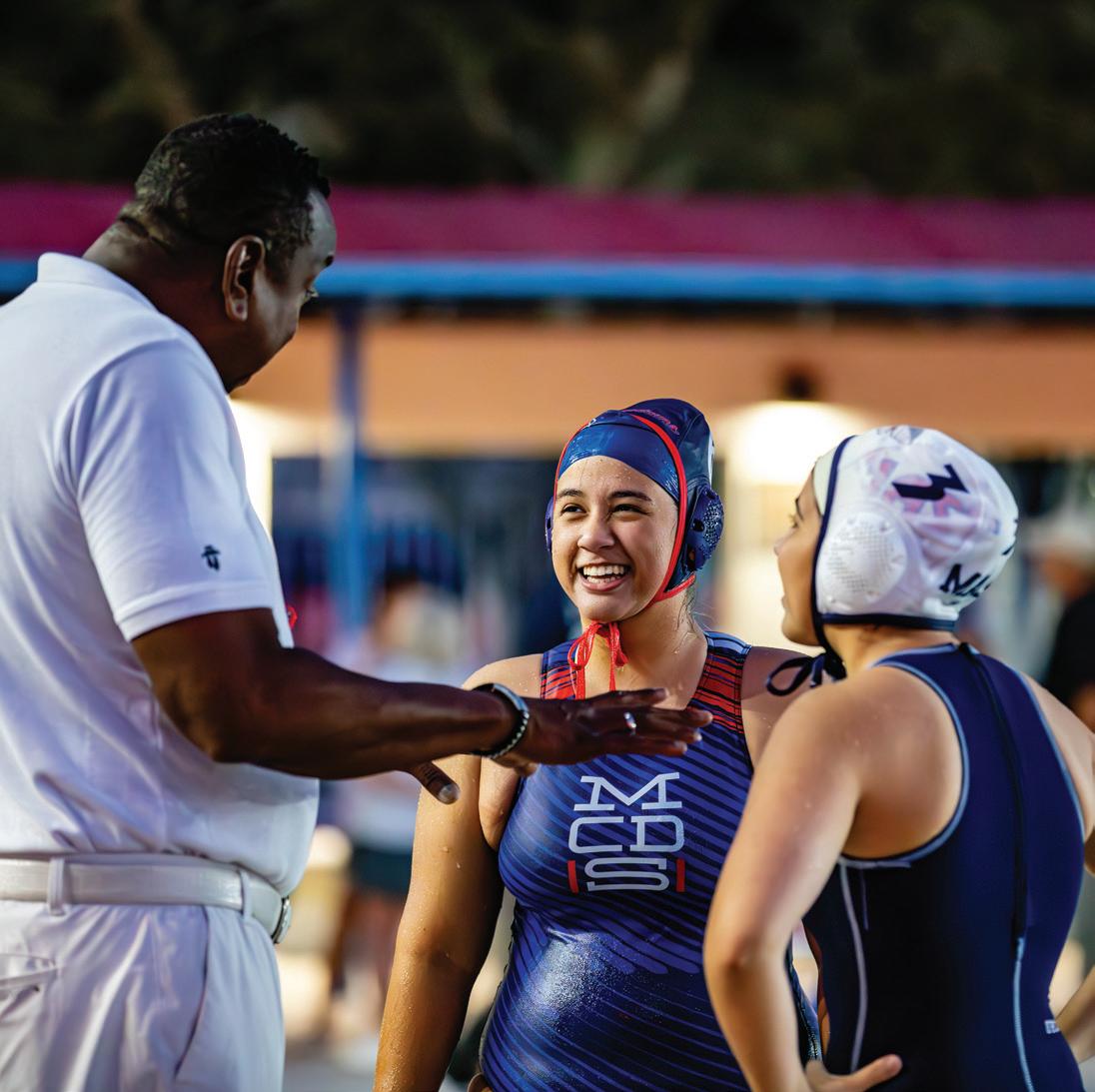
Just as water polo at MCDS has grown into a regional powerhouse, the school’s swimming program has cultivated a similar tradition of excellence. Founded in 1978, the MCDS Varsity Swimming program has built a reputation for producing elite athletes who compete at the highest levels. Under the leadership of Aquatics Director Eric Scheingoltz, the program has flourished, winning four District Championships and producing numerous individual State Champions, including Jen Weir (1995) and Dylan Smiley (2023). Since 2015, the MCDS swimming program has experienced significant growth, breaking 35 varsity records, securing 24 individual District titles, and capturing two Regional championships. One of the most notable achievements in recent years was the team’s
victory in both the boys’ and girls’ District Championships in 2024, the latter of which was their first since 1996.
The program’s success is a direct result of the strong culture of accountability, teamwork, and resilience that has been fostered within the team. MCDS swimmers are not only encouraged to push themselves in the water but are also taught the values of perseverance and mutual support, which extend far beyond their athletic careers. This emphasis on collective achievement has helped the team evolve into one of the most competitive programs in South Florida.
The success of MCDS’s aquatics programs is rooted in the continued involvement of alumni who return to the school to help guide and mentor the next generation. Water polo alumni like Stephanie Ragheb Batcheller, Charlotte Schou, Isabella Stripling Serrano, and Andrew Tripodo, have come full circle, now coaching the athletes they once competed alongside. Their return ensures that the program’s culture of excellence is passed down, with each generation playing an essential role in shaping the future of MCDS water polo.
In addition to the alumni coaches, the broader support of the school community plays a vital role in the success of the program. From the athletic department to the families of athletes, the MCDS water polo program is a true community effort. The bonds formed through water polo extend beyond the pool, creating a network of support that is integral to the program’s continued success.
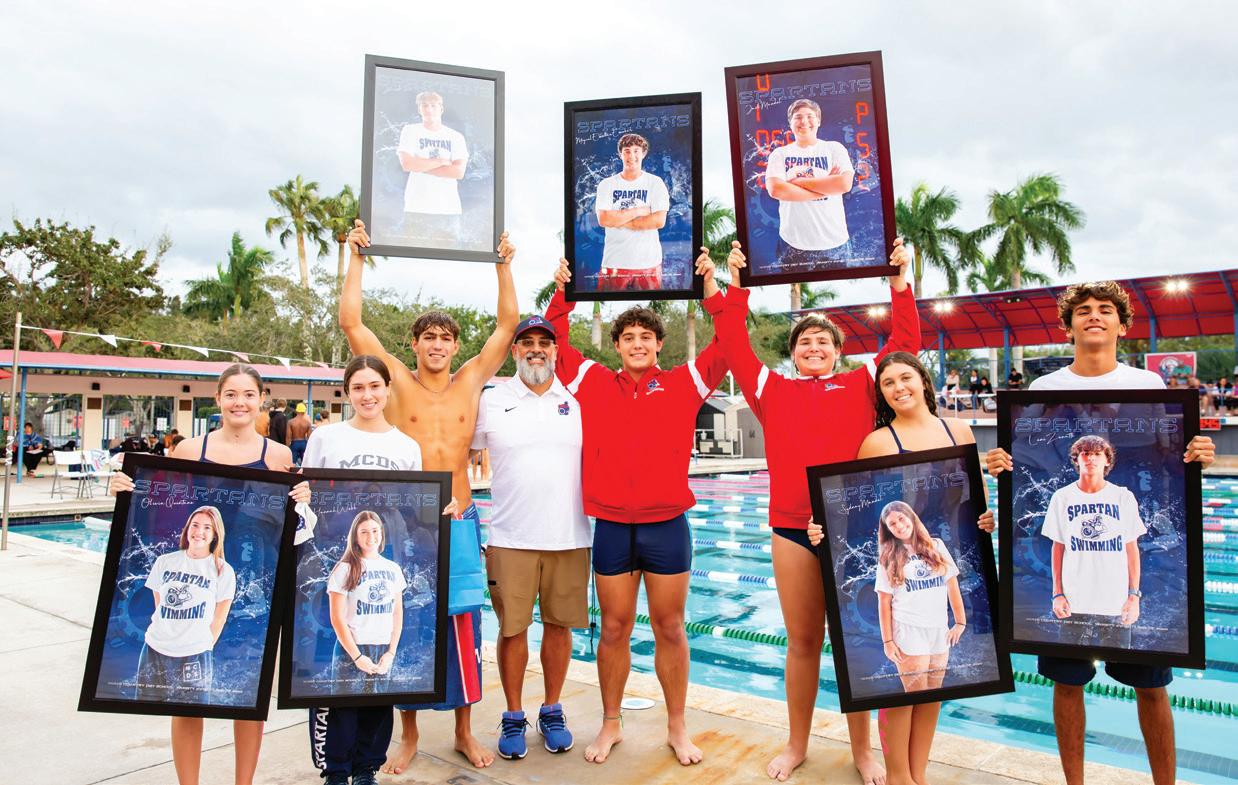
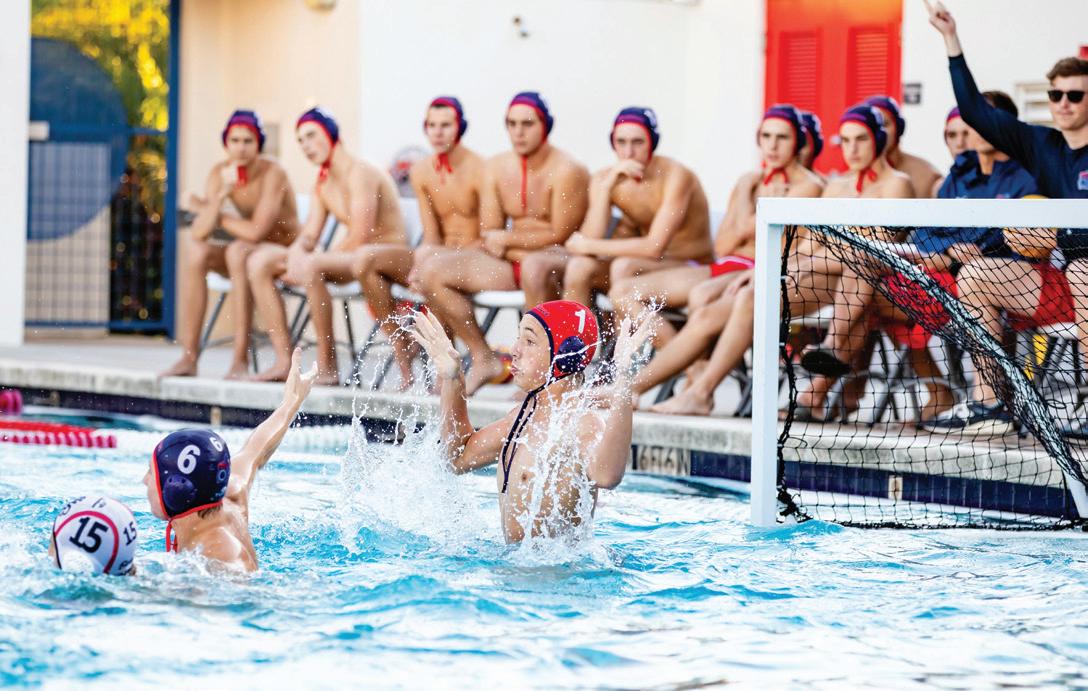
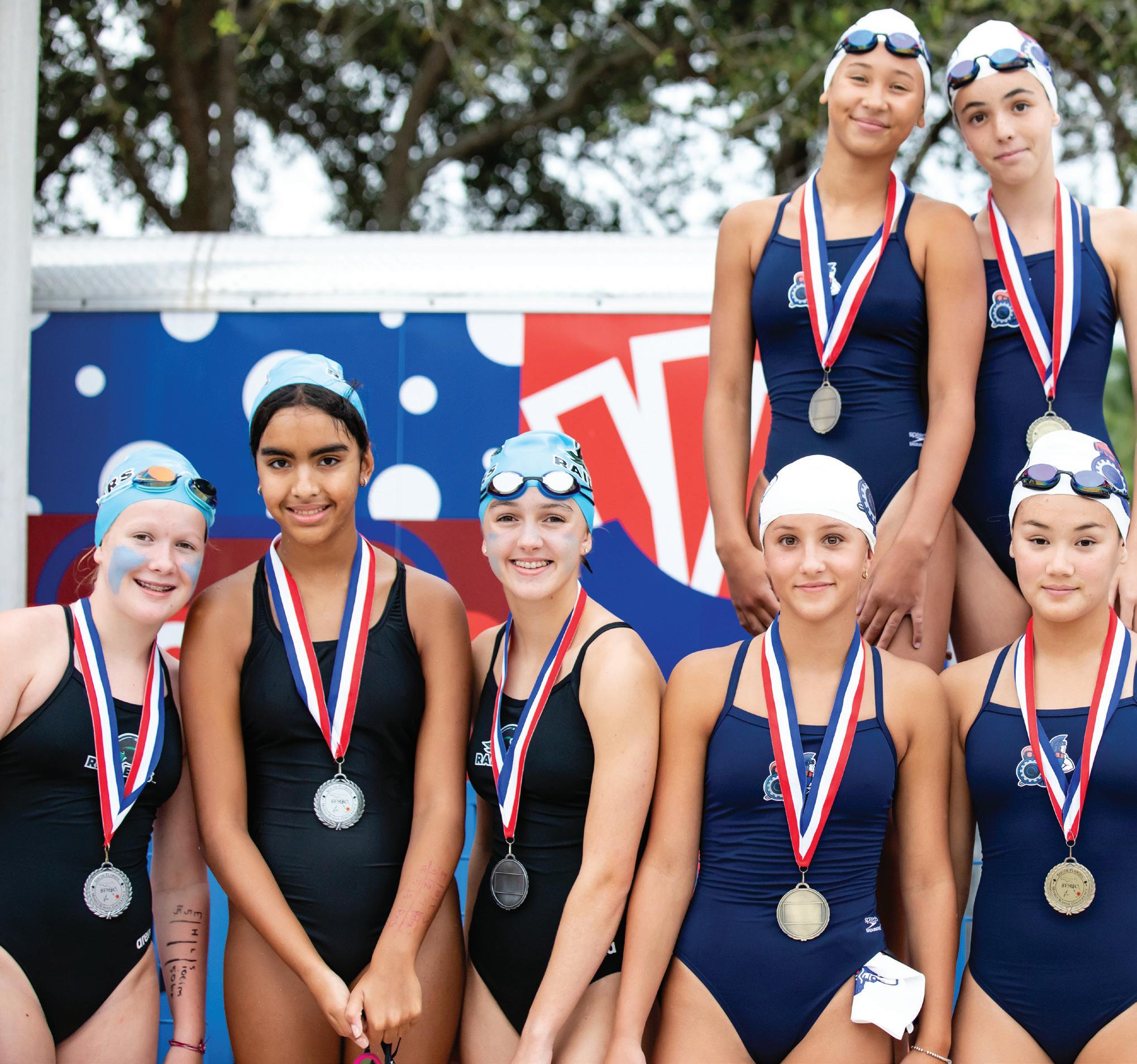
Like the water polo program, the swimming program at MCDS has greatly benefited from the involvement of former athletes who return to coach. Alumni such as Demetri Spiliotis, have returned to the coaching staff, helping to guide the next generation of swimmers. Their leadership and mentorship have been pivotal in shaping the program and ensuring its continued success.
The broader MCDS community, including families and local supporters, has also played a crucial role in fostering a culture of excellence. The collaborative effort of coaches, athletes, and the school’s administration has created an environment where students thrive both in and out of the pool.
Looking forward, both the water polo and swimming programs at MCDS are poised for even greater success. With a steady stream of talented athletes coming up through the ranks, including middle schoolers showing strong potential, the future of these programs is incredibly promising. In recent years, the boys’ water polo team advanced to the Regional Finals for the third time in program history, and the girls’ varsity team made it to the Final Four for the fourth time. In swimming, the program’s remarkable rise continues with the MCDS swimmers not only setting new records but also competing at the highest levels in prestigious competitions. The MCDS aquatics program is now home to a thriving USA Club Swim Team, which has seen significant growth since its founding in 2012, producing top-level athletes who have gone on to compete in national competitions and earn spots in top universities.
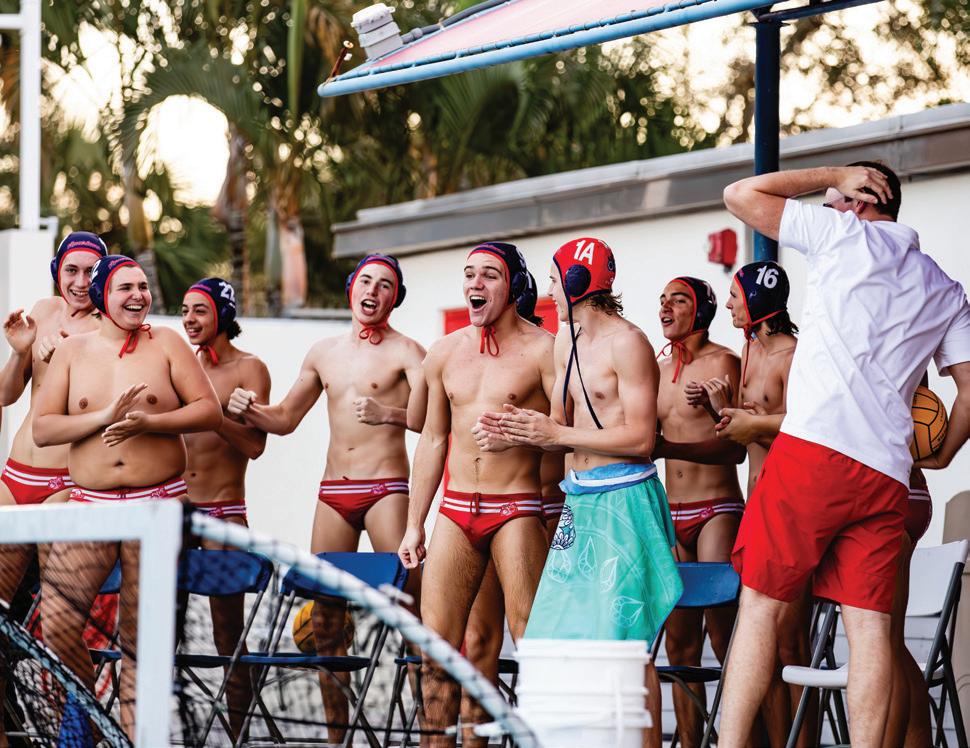
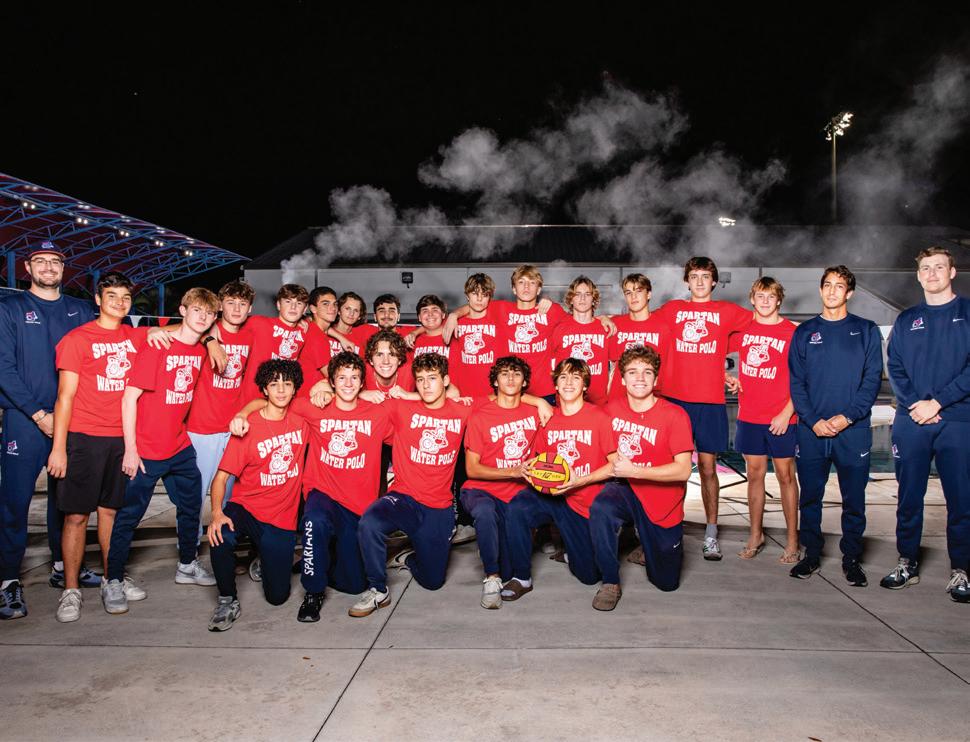
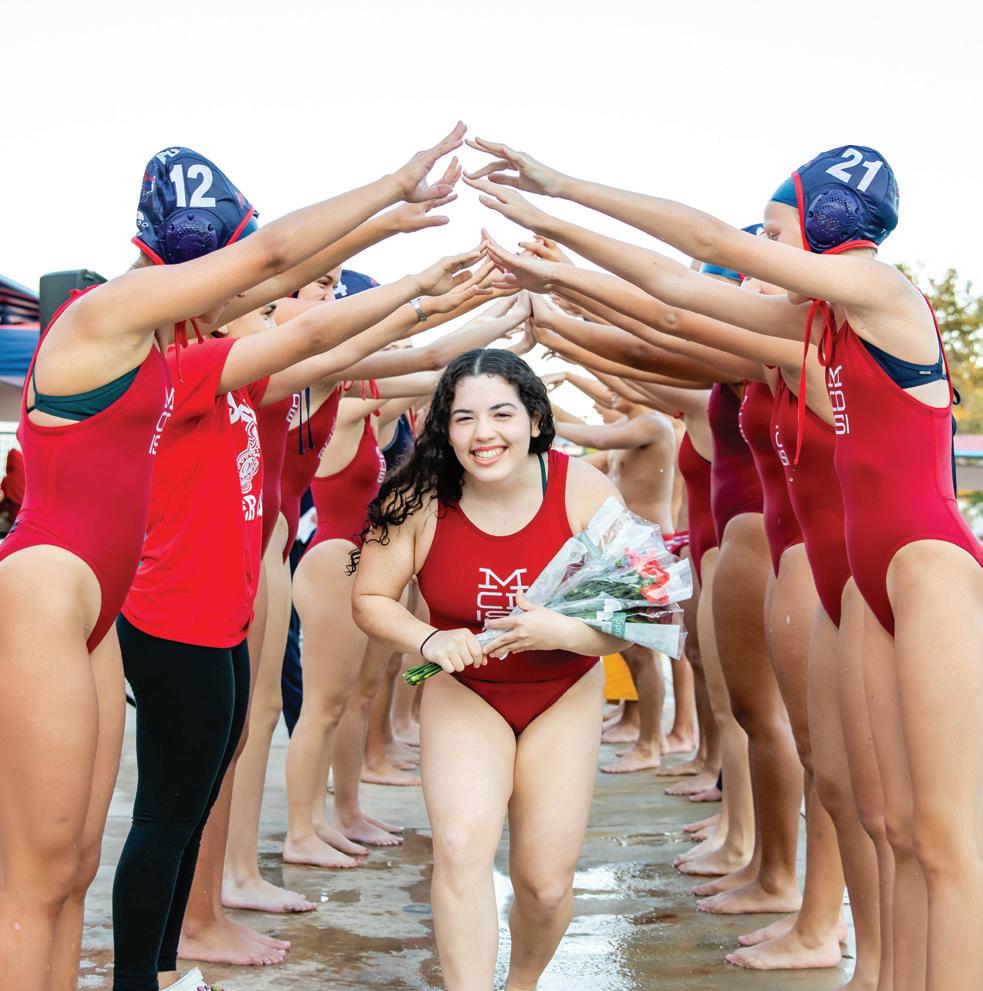
The Tradition of Excellence in the water polo and swimming programs is evident in the numerous student-athletes recognized on the Miami Herald All-County First Teams. Honorees include Kim Denton, Robert Denton, Alex Jelinek, Scarlett Ray, Olympia DeCastro, Albert Bedenbaugh-Cortes, Michael Rice, David Harari, Dylan Smiley, Hannah Webb, Zacchary Kappos, Giovanni Cragnotti, Chloe Cartledge, Sabrina Morata, Valeria Villanueva, and Spartan Athletic Hall of Famers Dara Rose, Jennifer Weir, Zoe Respondek, Ashley Hatcher. The success of these programs owes much to the coaches who have mentored and trained these student-athletes: Denyse Pichardo, John Turnipseed, Paul Lovejoy, Michael Fallik, Alain Guillen, Eric Scheingoltz, Oliver Lewis, and alumni Stephanie Ragheb Batcheller, Charlotte Schou, and Andrew Tripodo. Thanks to their leadership, the future success of these programs is limitless, and we eagerly anticipate exciting moments still to come this season and beyond.
The MCDS aquatics program is not just about winning — it’s about creating champions, both in the pool and in life. With the continued commitment of its athletes, coaches, and community, the best is yet to come. From its early days as a fledgling program to its current standing as a powerhouse in South Florida, the history of water polo and swimming at MCDS is one of perseverance, success, and community. Both programs have evolved through the hard work of talented athletes, dedicated coaches, and the unwavering support of alumni and families. As the MCDS aquatics programs continue to thrive, the future is bright for these teams, ensuring that the tradition of excellence will continue to inspire future generations of Spartans.
2024-2025
(1) Our Boys Varsity Swimming team won the District Championship for the first time in our school’s history.
(2) Our Girls Varsity Swimming team celebrated their first District Championship since 1995.
(3) The Girls Varsity Volleyball team brought home their first District Championship since 2018.
(4) Our Middle School teams are building dynasties of their own: the Girls Middle School Swimming team won their second consecutive conference championship, and the Boys Middle School Swimming team claimed their fifth in a row.
(5) Boys Middle School (Varsity) Basketball Team went 17-0 and won their first South Florida Middle School Conference Championship in School history.
(6) The Girls Varsity Soccer won their 10th District Championship in 12 years
(7) The Boys Varsity Basketball won their 4th District Championship in 6 years, and advanced to the Regional Finals for the third time in program history.
(8) The Girls Varsity Basketball Team won their 14th District Championship in 15 years, 11th Regional Championship in 12 years, and 10th State title in 12 years.
Water Polo
Luca Aceto, Rafael Blaya, Evan Miller, Thiago Ometto, Max Possin, Sienna Kozlovski, Briana Dunn. They were selected to
represent Team USA on their zone team (Southeast) in the Super Regionals Water Polo Championships on January 7-19 in Dallas, Texas. This team makes up the national team pipeline for the Olympic Development Program (ODP). These athletes were selected out of thousands of athletes who entered ODP.
INDIVIDUAL ACCOMPLISHMENTS
FIRST TEAM ALL-COUNTYSTUDENT-ATHLETES
Grayson Richards
2024-25 Athletics Award Winners
Fall Sports Awards
Boys Cross Country
Most Valuable Runner Award –Aven Bergman Coaches Award – Brady Lubetsky
Most Improved Runner Award – Agustin Duque
Spartan Award – Samuel Minski Spirit Award - Maurice Yammine
Girls Cross Country
Most Valuable Runner Award –Erika Ramirez
Coaches Award – Stella
Espenkotter
Most Improved Runner Award – Mia Zapata-Herrera
Spartan Award – Dagney Jerles Spirit Award – Maria Carstensen
Junior Varsity Volleyball
Most Valuable Player Award –
Kendall Fugate
Most Improved Player Award –Ines Gorham
Varsity Volleyball
Offensive Player of the Year –
Rachael Luis
Defensive Player of the Year –
Ashley Geller
Most Improved Player Award –
Angelina Del Guercio-Moran
Coaches Award – Isabella Durango
Boys Golf
Best Average Award – William
Grayson Richards
Most Improved Golfer Award –
Andrew Ajmani
Coaches Award – Frederick Stromeyer
Boys Varsity Swimming
Most Valuable Swimmer Award
– Julius Reus
Most Improved Swimmer Award – Max Possin
Spartan Award – Jack Mandel
Rookie of the Year Award –Adrian Sanchez
Girls Varsity Swimming
Most Valuable Swimmer Award – Sienna Kozlovski
Most Improved Swimmer Award – Briana Dunn
Spartan Award – Rio Ballesteros
Rookie of the Year Award –Emma Troncoso
Varsity Football
Offensive Player of the Year –
Marcus Papunen
Defensive Player of the Year –
Matthew Scemla
Iron Man Award – Julian Mellado
Coaches Award – Preston
Boucher
Leadership Award – Massimo
Vega
4-year plaques
Natalya Beltran – Cross Country
William Dean – Cross Country
Andrew Savysky – Cross
Country
Miguel Escobar – Swimming
Jack Mandel – Swimming
Nicolas Bond – Golf
Sydney Mandel – Swimming
Olivia Quintane – Swimming
John Alwine – Football
Preston Boucher – Football
Jack Eaton – Football
Julian Mellado – Football
Marcus Papunen – Football
Matthew Scemla - Football
5-year medal
Brady Lubetsky – Cross Country
6 –year pen set
Hannah Webb – Swimming
FALL SENIORS
Swimming
(1) Ananya Carrafelli (2) Miguel Escobar (3) Jack Mandel (4) Sydney Mandel (5) Olivia Quintane (6) Julius Reus (7) Hannah Webb (8) Leni Zenatti
Varsity Football
(1) Emily Diaz - Manager (2) Maggie Houser - Manager (3) John Alwine (4) Preston Boucher (5) Jack Eaton (6) David Frenkel (7) Julian Mellado (8) Marcus Papunen (9) Benjamin Rosas (10) Noah Huy Tran (11) Massimo Vega
Volleyball
(1) Sharleah Lapaix –Manager (2) Angie Del Guercio-Moran (3) Victoria Hotze-Martinez (4) Colette Perazzo (5) Ella Smith
Golf
(1) Jay Benitah (2) Frederick Stromeyer
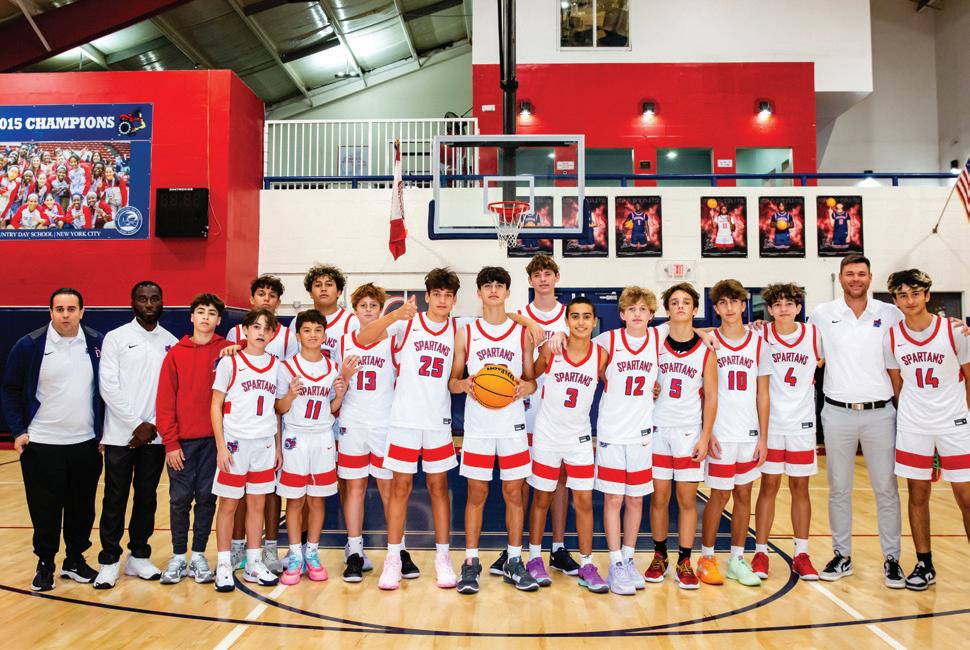
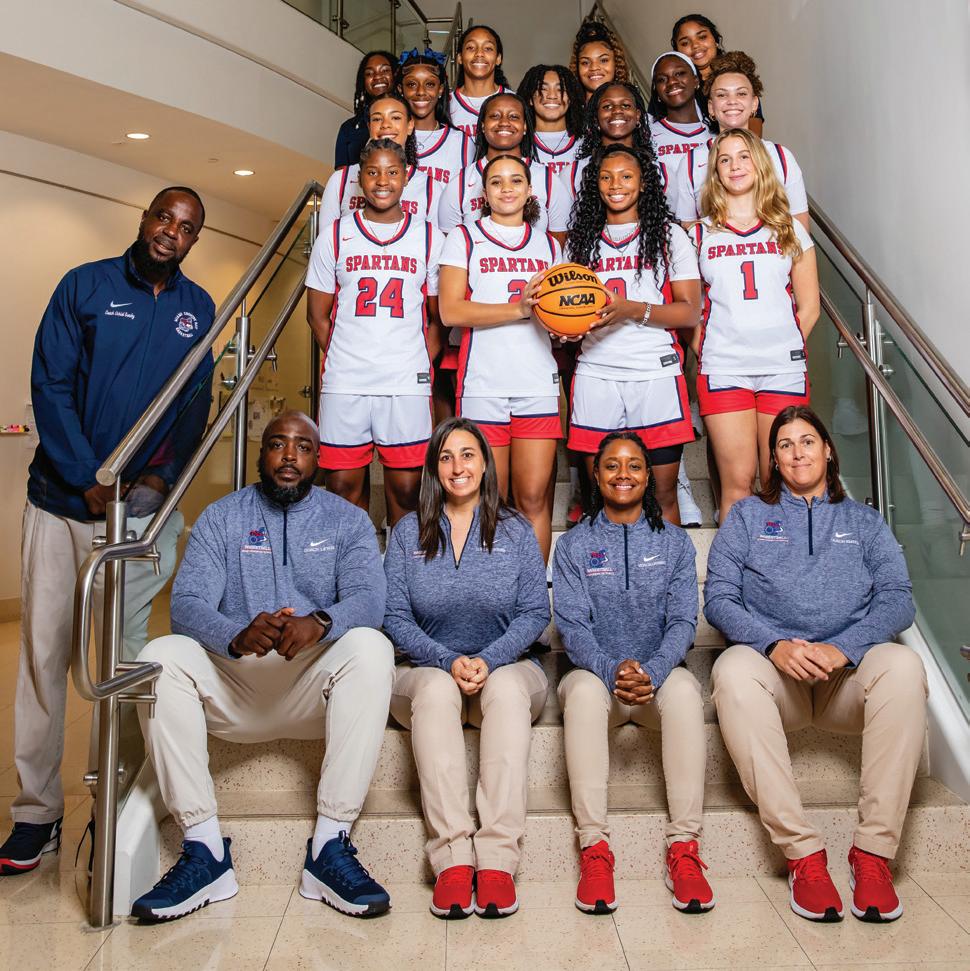
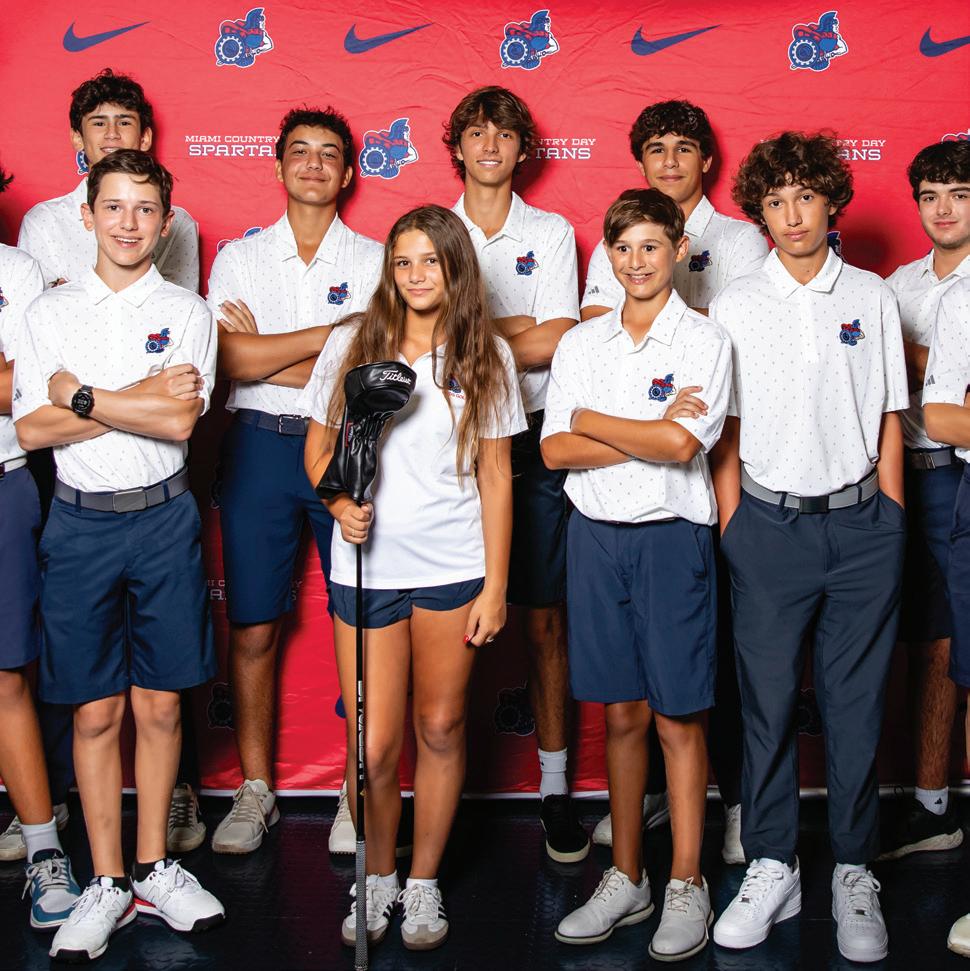
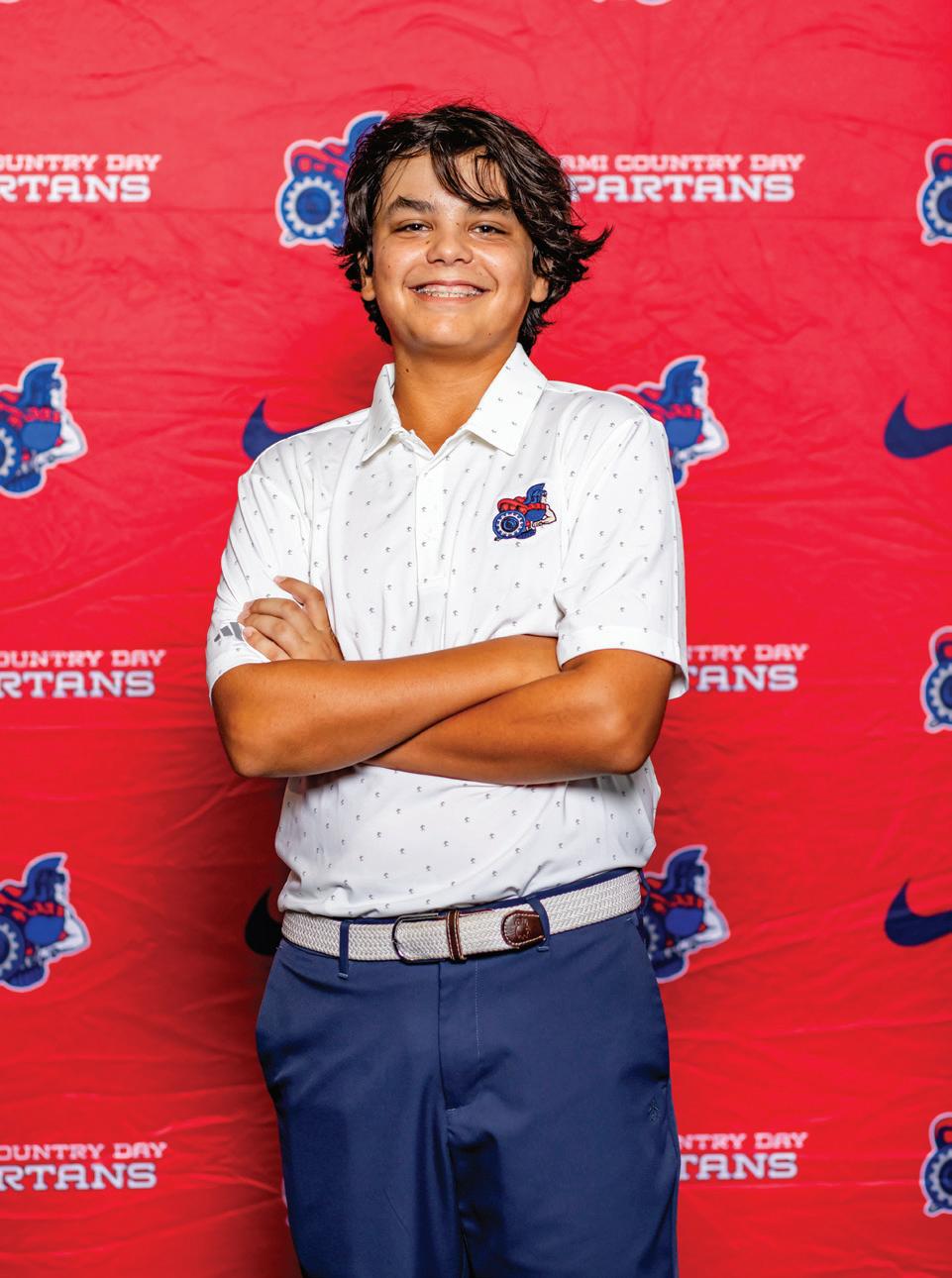
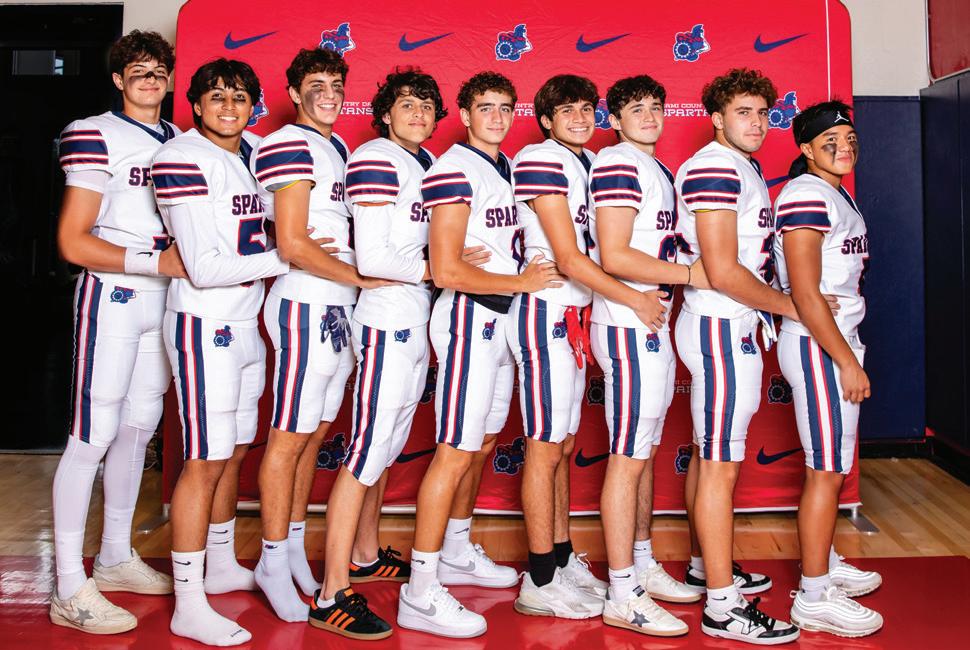
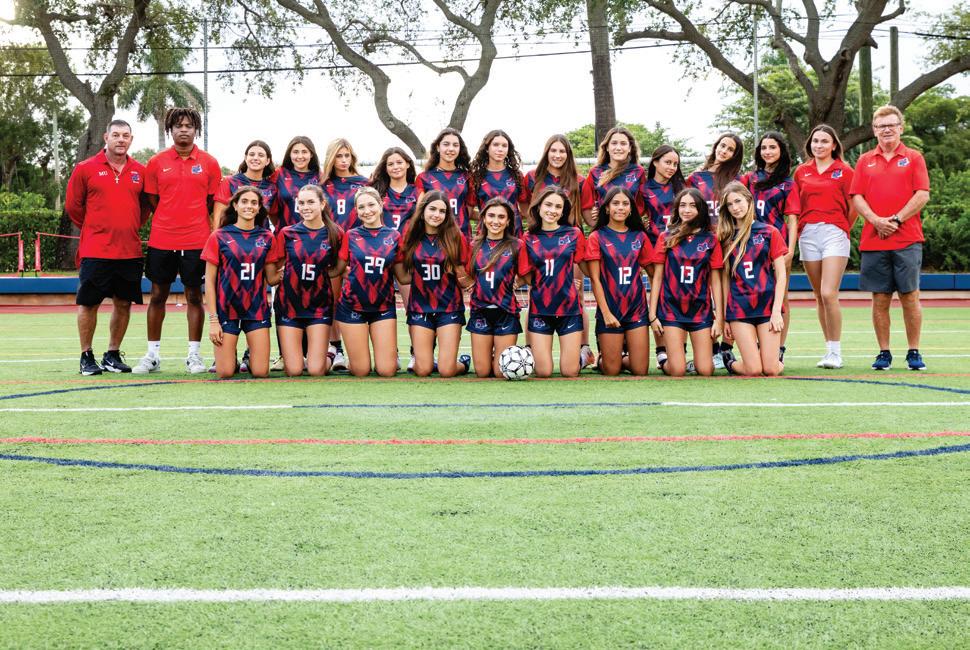
Cross Country
(1) Maya Bassan - manager
(2) Sasha Guetta - manager
(3) Natalya Beltran - manager
(4) Ana Carolina Castillomanager
(5) Lana Zeini - manager
(6) Ava Pumo – manager
(7) Erika Ramirez
(8) Sofia Rotundo
(9) Erika Ramirez
(10) Mia Zapata-Herrera
(11) AJ Savysky
Winter Sports Awards
GIRLS VARSITY SOCCER
Most Valuable Player Award –Lucia Arcila
Offensive Player of the Year –Amelia Ziolkowski
Defensive Player of the Year –Sofia Gonzalez-Vega
Spartan Award – Angelina Del Guercio-Moran
Coaches Award – Kayla Kilstock
BOYS VARSITY SOCCER
Most Valuable Player Award –Ross Watson
Offensive Player of the Year –Brad Flick
Defensive Player of the Year –Manuel Apraiz
Spartan Award – Jack Manhire
Coaches Award – Julius Reus
GIRLS MIDDLE SCHOOL
SOCCER
Most Valuable Player Award –Athena Tolles
Spartan Award – Olivia Dull
Offensive Player of the Year Award – Mila Reus
Defensive Player of the Year Award – Sonya Antonova
Golden Glove Award – Eden Harris
BOYS MIDDLE SCHOOL
SOCCER
Performance Award – Kenzo Fadigan
Coaches Award – Julian Berzosa
Most Valuable Player Award –Cody Mitchell
Offensive Player of the Year Award – Baltazar Kaplan
Spartan Award – Mauricio Molina –Montiel
BOYS JUNIOR VARSITY
BASKETBALL
Most Valuable Player Award –Jose Medina
Most Improved Player Award –Michael Murdocco Coaches Award – Mason Lawrence
GIRLS MIDDLE SCHOOL
BASKETBALL
Offensive Player of the Year Award – Elle Goldstein
Defensive Player of the Year Award – Willow Traster
Most Valuable Player Award –Kendall Fugate
Most Improved Player Award –Avery Culley
BOYS MIDDLE SCHOOL (JV)
BASKETBALL
Offensive Player of the Year Award – Andres Spiegel
Defensive Player of the Year Award – Maurice Nahmad
Most Valuable Player Award –Andres Spiegel
Most Improved Player Award –Benjamin Gomez
BOYS MIDDLE SCHOOL (VARSITY) BASKETBALL
Offensive Player of the Year Award – Ari Allaei
Defensive Player of the Year Award – Christopher Cabrera
Most Valuable Player Award –Jaxon Kessler
Most Improved Player Award –Enzo Porchetto
BOYS VARSITY BASKETBALL
Most Valuable Player AwardChaim Galbut
Most Improved Player AwardMiguel Orbe
Newcome Award - Fernando Romero
Coaches Award - Ashton Reid
Girls Varsity Basketball
Most Valuable Player AwardJalynn Belton, Kamie Ellis
Coaches Award - Cori Edge
Spartan Award - Arianna Robinson
4-year plaques
(1) Oliver Shiff – Soccer
(2) Oscar Bergier – Soccer
(3) David Frenkel – Soccer
(4) Julius Reus – Soccer
(5) Nicole Rivero – Soccer
(6) Jalynn Belton – Basketball
(7) Arianna RobinsonBasketball
5-year medal
(1) Aiden Reid – Basketball
(2) Jada Johnson – Basketball (3) Kayla Kilstock – Soccer
6-year pen set
(1) Mila Crespo – Soccer
Winter Seniors
BOYS SOCCER
(1) Patrick Soares – Manager
(2) Oscar Bergier
(3) David Frenkel
(4) Pedro Henrique Periera (5) Julius Reus
(6) Diego Rodriguez Aldrey
(7) Bento Torres Junqueira (8) Ross Watson
GIRLS SOCCER
(1) Angelina Del GuercioMoran
(2) Kayla Kilstock
(3) Nicole Rivero
Boys Basketball
(1) Chaim Galbut
(2) Carson Goodman (3) Aiden Reid
(4) Ashton Reid (5) Daltyn Simon
Girls Basketball
(1) Sharleah Lapaix –Manager
(2) Jada Johnson
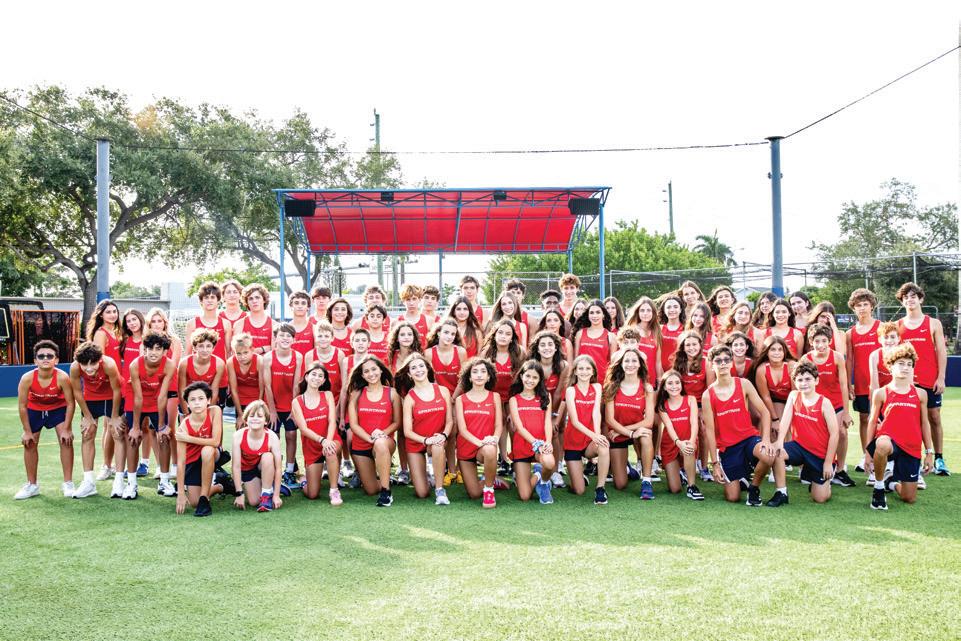

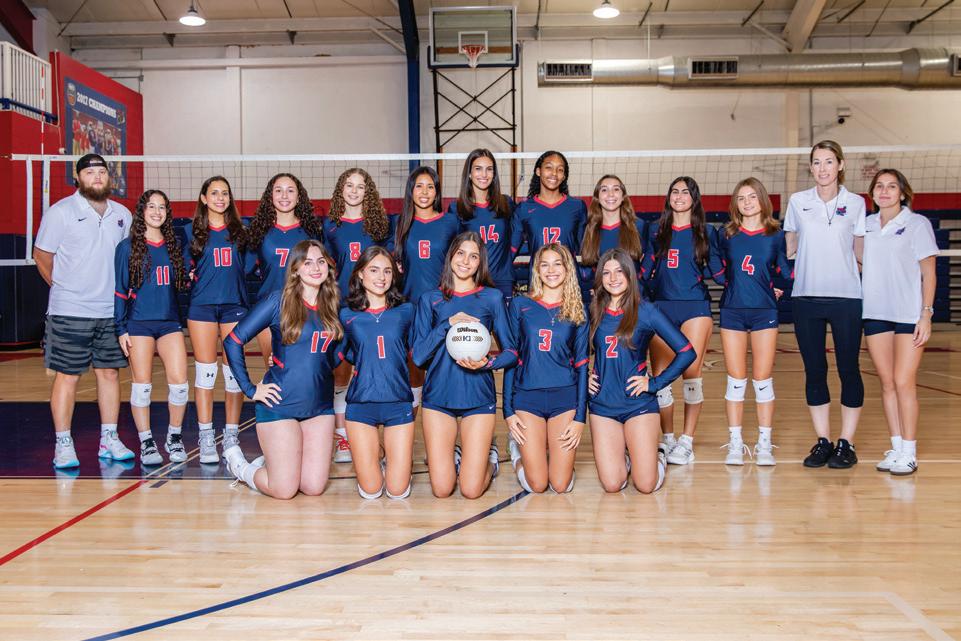
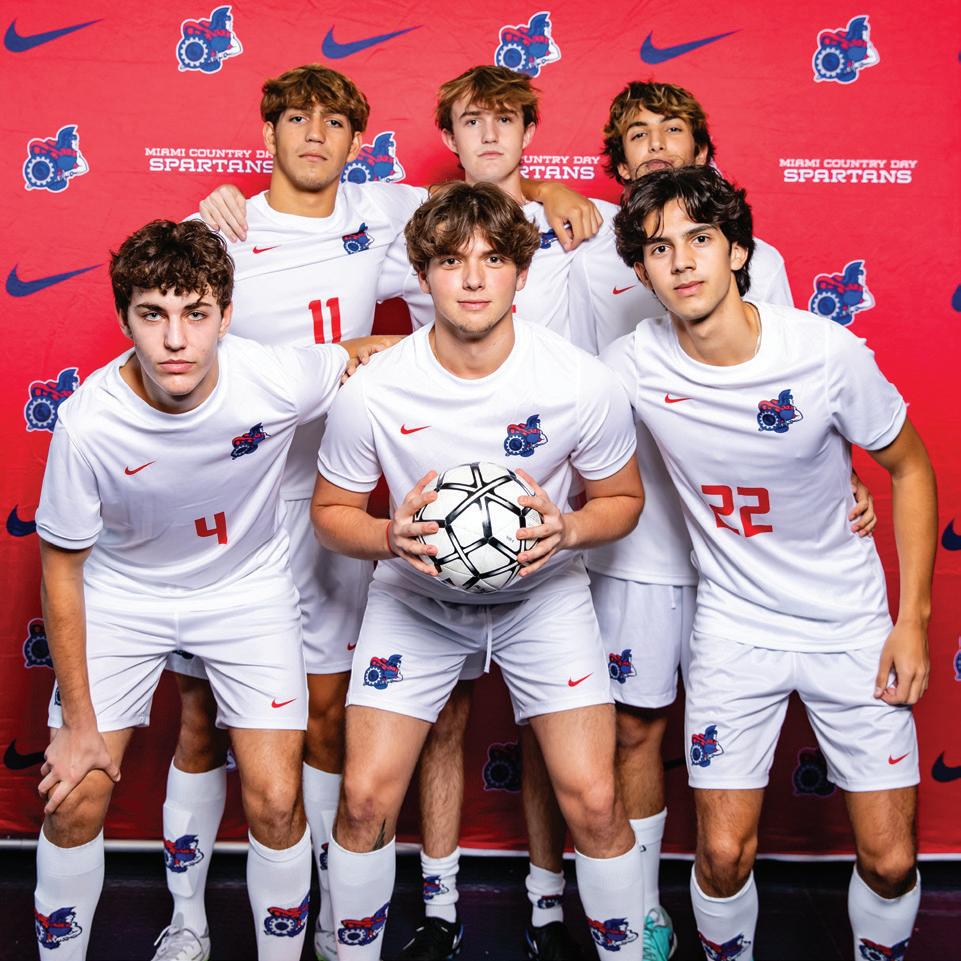
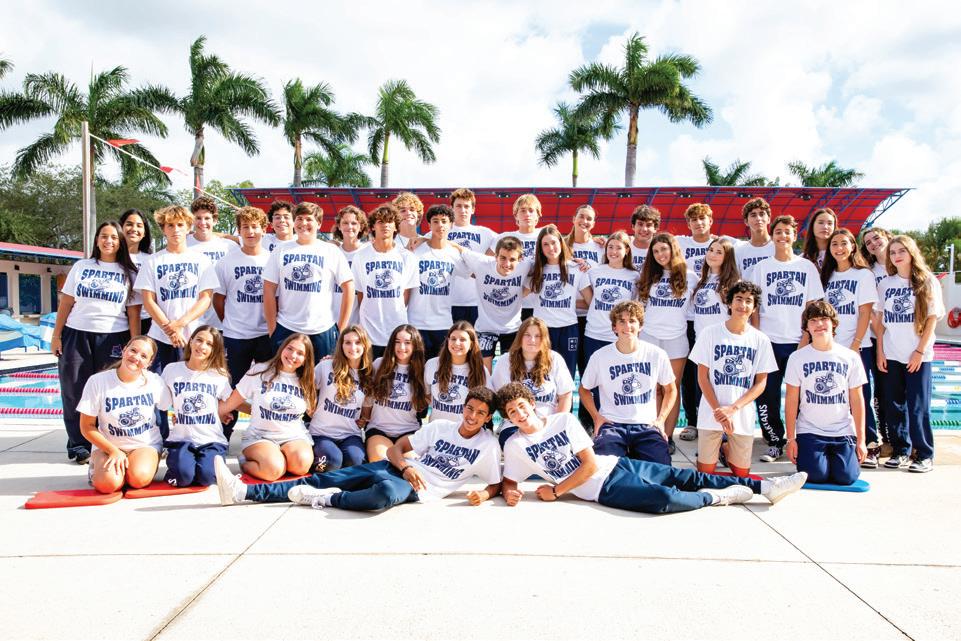
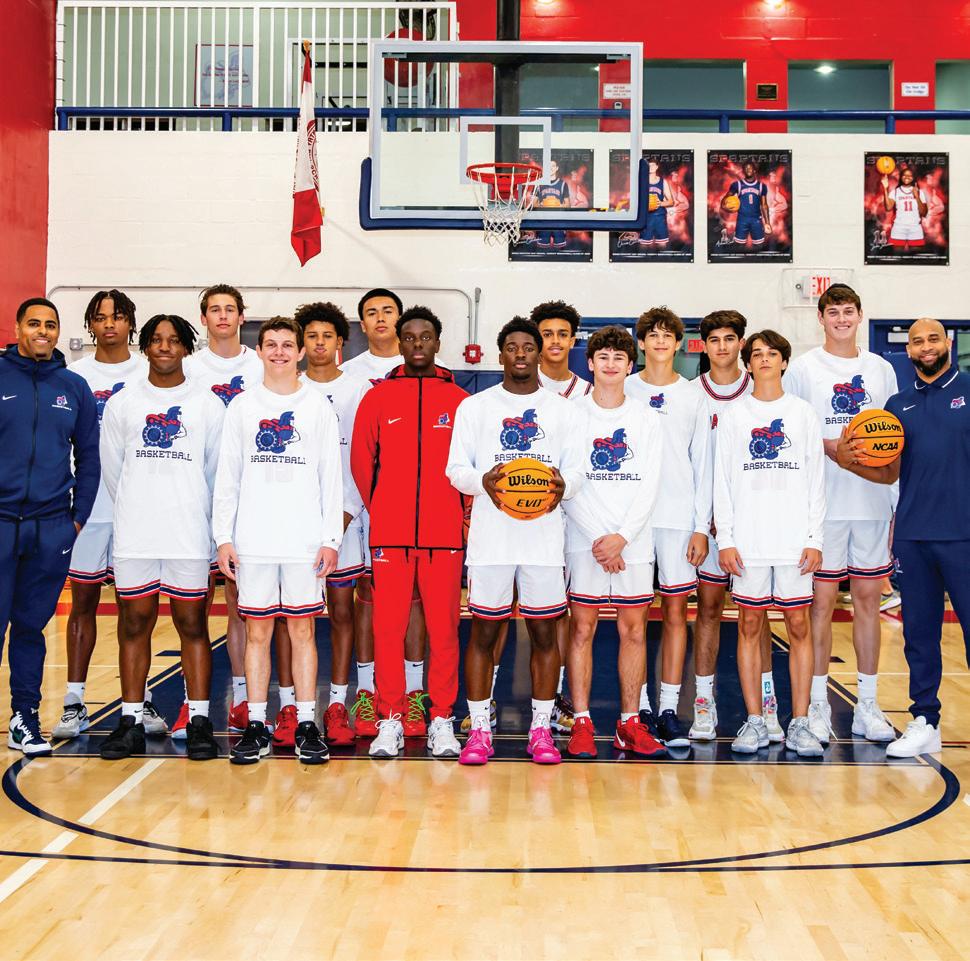
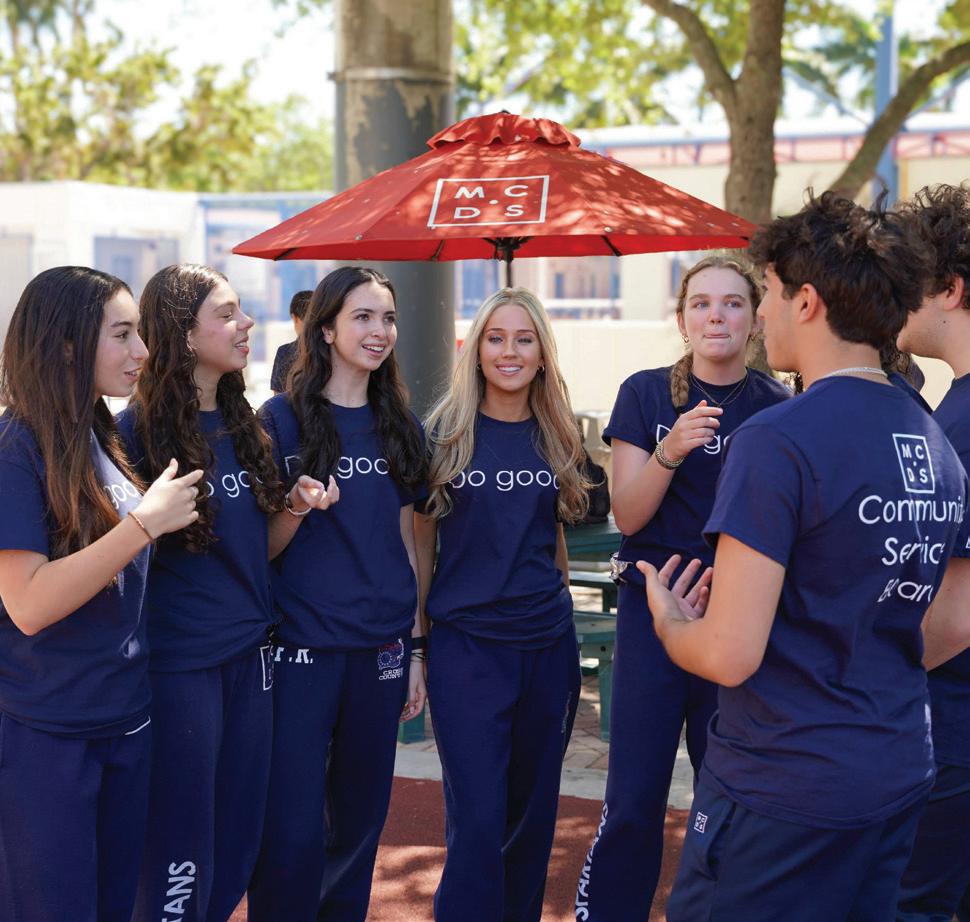
Together, we are all part of the Community Service Board, united by a shared commitment to make a difference in the world. Whether through environmental advocacy, animal rights, or supporting those in need, each of us has learned valuable lessons in leadership, compassion, and the power of giving back. These experiences have shaped our paths and continue to guide us as we work toward a future where we can all contribute to a better, more inclusive world.
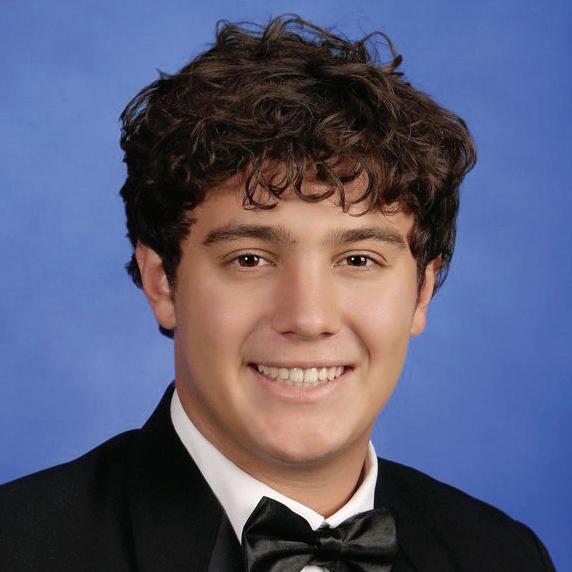
By Miguel Escobar ’25
When I moved to Miami from Colombia at the age of twelve, I found myself struggling to hold on to my cultural identity while trying to adjust to my new life in America. I felt pulled in two directions—one toward my heritage and one toward my new home. It wasn’t until my sophomore year, when I read stories by immigrants in my American Literature class, that I began to feel seen and understood. Inspired by those stories, I decided to share the untold narratives of people like my school’s maintenance staff, many of whom had their own stories of migration and resilience. My friends and I interviewed the staff, transcribed their stories in both English and their native languages, and displayed them in a gallery at our school. The project fostered empathy and respect among students and faculty, with many recognizing the maintenance staff by name afterward. It was a pivotal moment for me, as I realized the power of storytelling in shaping community perceptions. This project also helped me embrace my identity and sparked my interest in continuing to highlight cultural stories through music and art. I hope to keep pushing for cultural awareness in my future work, through both my one-man musical show and educational initiatives on world music.
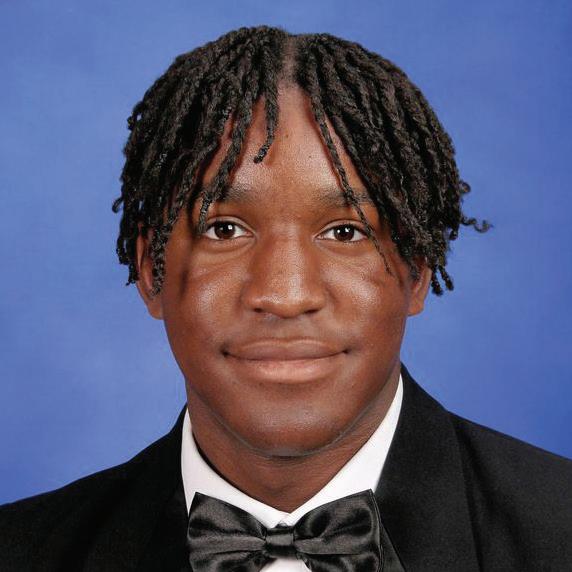
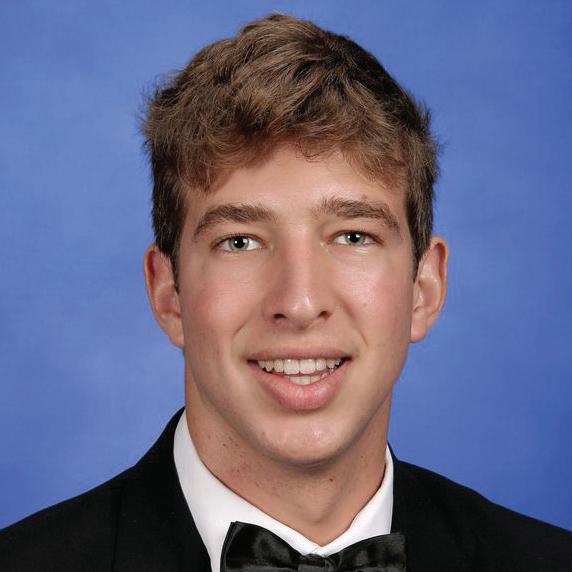
By Ashton Reid ’25
One of my most fulfilling community service experiences has been my work as Lead Student Volunteer for Broward Cares at Broward College. I’ve had the privilege of organizing food drives that provide essential supplies to over a hundred faculty and staff members each month. Collaborating with organizations like Lifenet4families, I’ve been able to help others who are in need of basic necessities such as food, water, and toiletries. This experience has been a true learning opportunity, teaching me leadership, organization, and the importance of community support. It also sparked my interest in public health. I’ve always been passionate about helping others, and now I see the potential to do so in a more profound way by providing healthcare services. Through Broward Cares, I’ve seen how small acts of service can create a ripple effect of positive change. I look forward to continuing to serve my community, using the lessons I’ve learned to make a broader impact in public health.
By Julian Erez ’25
Growing up in Miami Beach, I was always troubled by the sight of litter on the beaches I loved. It wasn’t until my tenth-grade English class project, where I wrote about the environmental impact of litter, that I took my first step toward action. Encouraged by the research, I organized my first beach cleanup and partnered with the Surfrider Foundation to bring more awareness to the issue. Through this collaboration, I learned how to organize events, advertise on social media, and educate participants on the long-term environmental effects of pollution. What started as a small cleanup quickly grew into a larger movement, attracting more participants and sponsors. Through these cleanups, I’ve seen firsthand the positive changes a community can make when it comes together for a cause. I plan to continue these efforts as I move on to college and work to create an even bigger impact on environmental sustainability, inspiring future generations to protect our beaches and oceans.
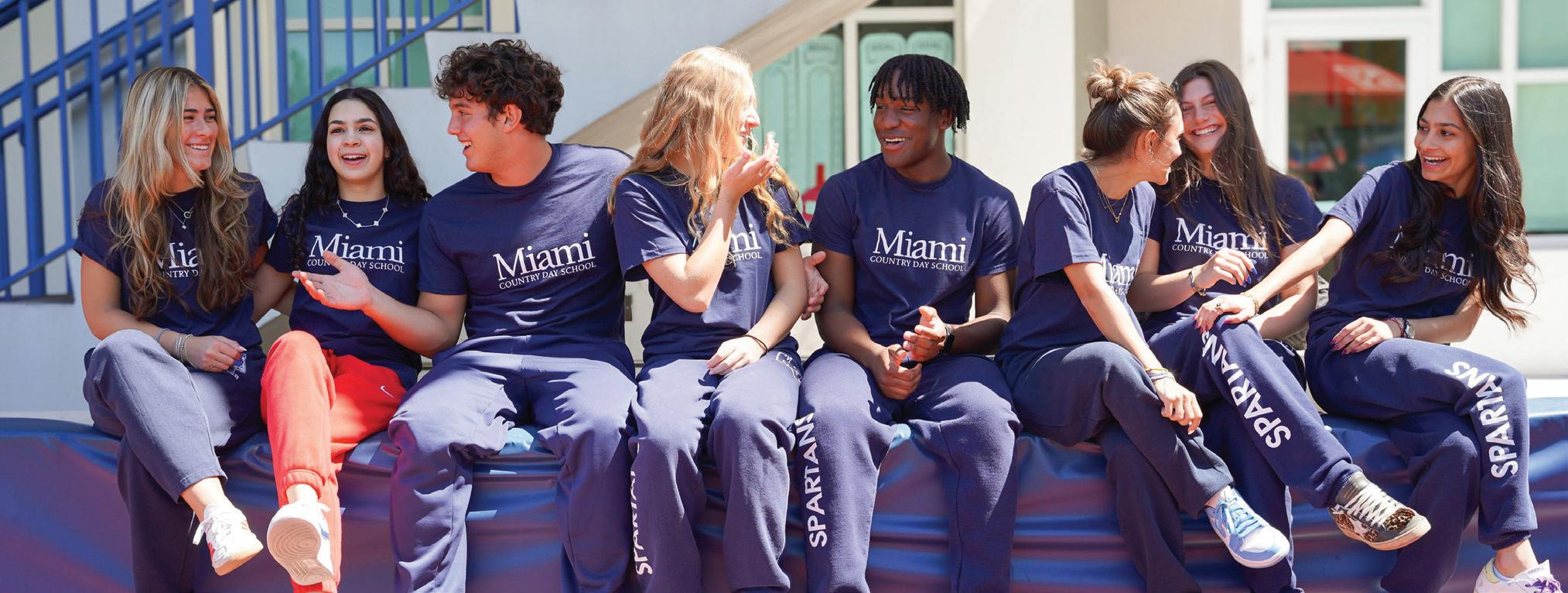
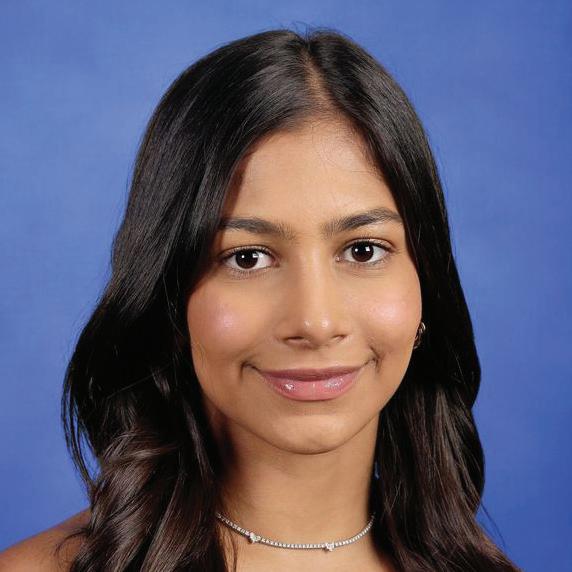
By Ava Patel ’25
During my visit to Brazil, I was struck by the sight of children walking barefoot on the streets, vulnerable to diseases and injury. This sparked my decision to join the Hope Box Club, a nonprofit that provides basic necessities like shoes, underwear, and hygiene products to children in need. As the Vice President of the club, I oversee everything from organizing packaging events to ensuring the delivery of these care packages to children in Africa. I’ve been able to witness the powerful impact of this initiative, sending nearly 6,000 boxes over the past three years. The highlight of the year is our packaging party, where members gather to fill boxes with essentials, and the energy and enthusiasm in the room are contagious. Through this experience, I’ve found a sense of belonging in a community of like-minded people who are passionate about making a difference. My work with Hope Box has reinforced my commitment to service and inspired me to continue advocating for underserved children around the world.
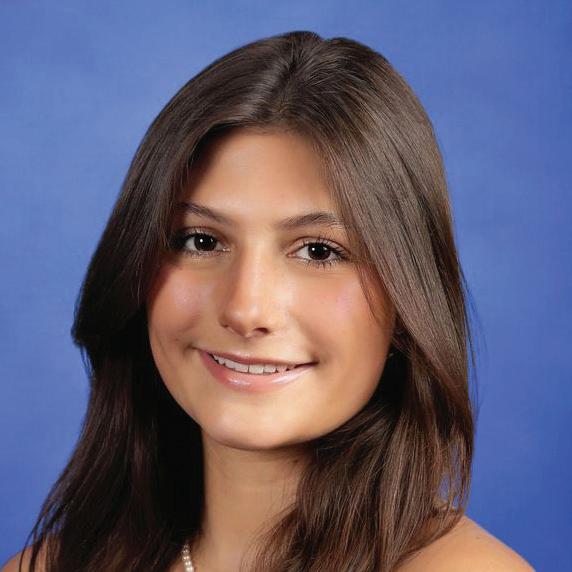
By Ella Smith ’25
The day my family rescued Wrigley, a scruffy dog from a hoarding situation, changed my perspective on animal rights. Wrigley, despite his rough appearance, was full of love and expression, and this experience sparked my desire to advocate for animals in need. As a board member of my school’s Animal Rights Foundation, I’ve had the opportunity to combine my love for photography with my passion for animal advocacy. I take portraits of rescue dogs and use social media to help them find their forever homes. Over the past two years, I’ve seen the difference that visibility and awareness can make in increasing adoptions. This experience has not only deepened my love for animals but has also taught me the power of storytelling in giving a voice to the voiceless. I’m committed to continuing my advocacy and using my platform to help animals find the loving homes they deserve.
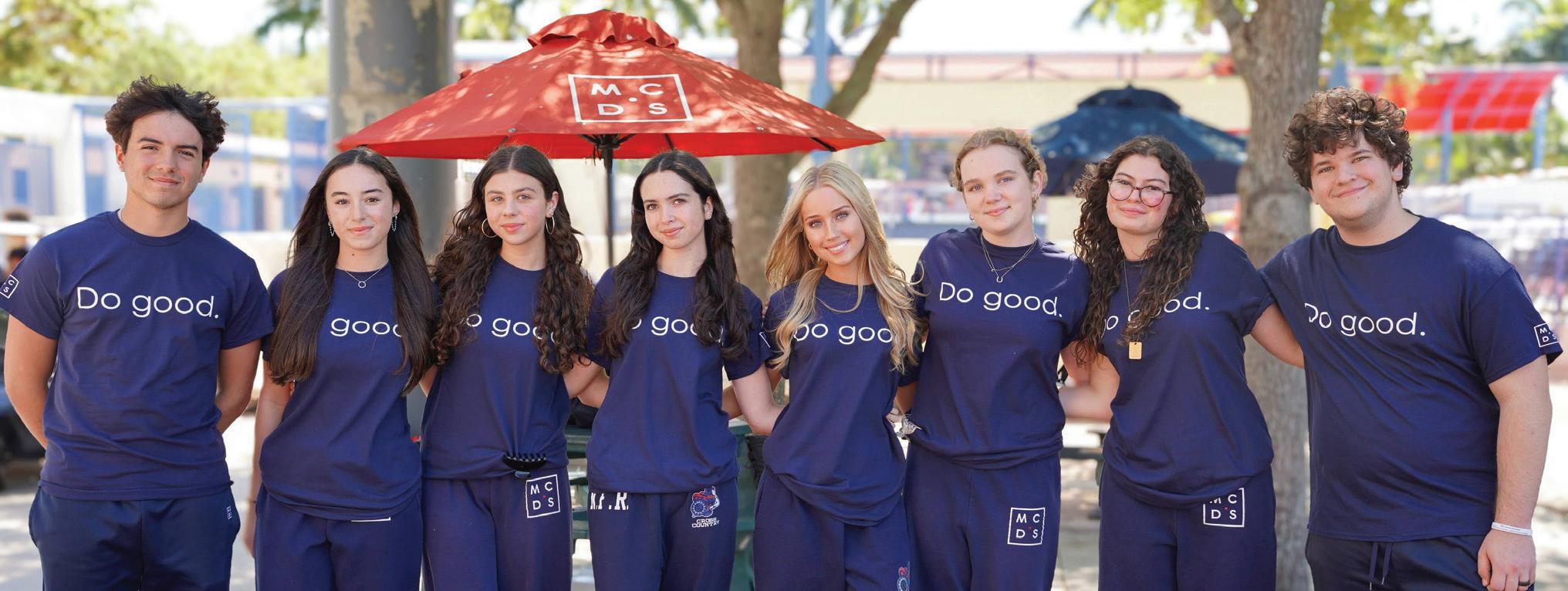
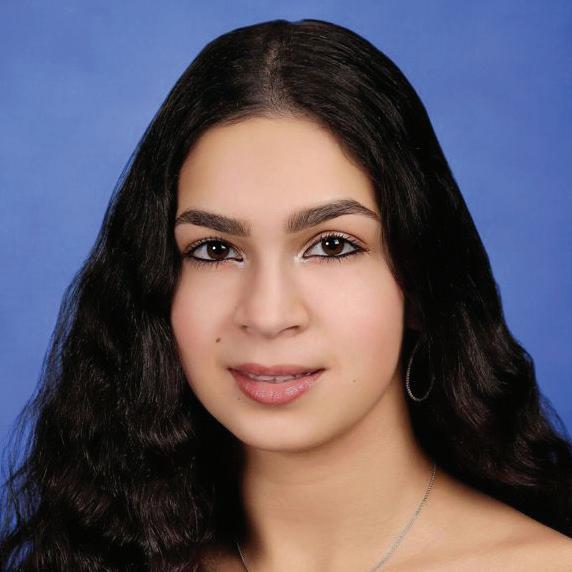
By Erika Ramirez ’25
As the Head of Marketing and Event Planning for my school’s Walk for Purpose Club, I’ve been able to make a significant impact in raising money for cancer research. Each year, we organize a 5K walk and carnival to raise funds, which has brought our community together to support this cause. One of the most memorable experiences I had was organizing an Easter egg hunt for pediatric patients at Joe DiMaggio Children’s Hospital. I worked with patients to hide eggs for a friend who couldn’t join because of chemotherapy. The joy on her face when she arrived and found the hidden eggs was priceless, and it reaffirmed for me the power of small acts of kindness. I’ve learned that every gesture, no matter how small, has the potential to bring joy to others. This experience has further fueled my passion for service and has shown me how important it is to continue giving back, whether through cancer research or simply brightening someone’s day.
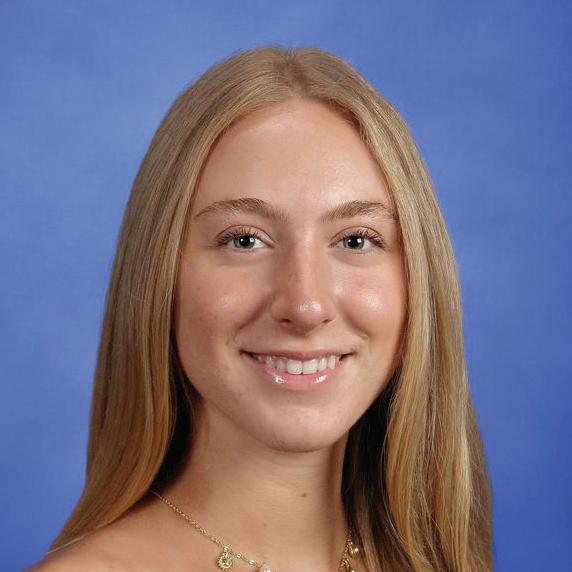
By Rachel Maloy ’25
As a volunteer and board member with Achieve Miami, I’ve had the opportunity to work with elementary school children who need extra support with their reading and writing. Many of these students come from families where English is not the first language, and they often struggle with their academic work due to a lack of resources. Through Achieve Miami’s after-school and summer programs, I’ve been able to help these children build confidence and improve their academic skills. In addition to tutoring, I’ve also helped organize fundraising events and music drives, which have provided even more opportunities for these children to grow and succeed. Being a part of Achieve Miami has taught me the importance of community and the power of education to transform lives. I’m committed to continuing my work with Achieve Miami and hope to use my experiences to empower future generations of students.
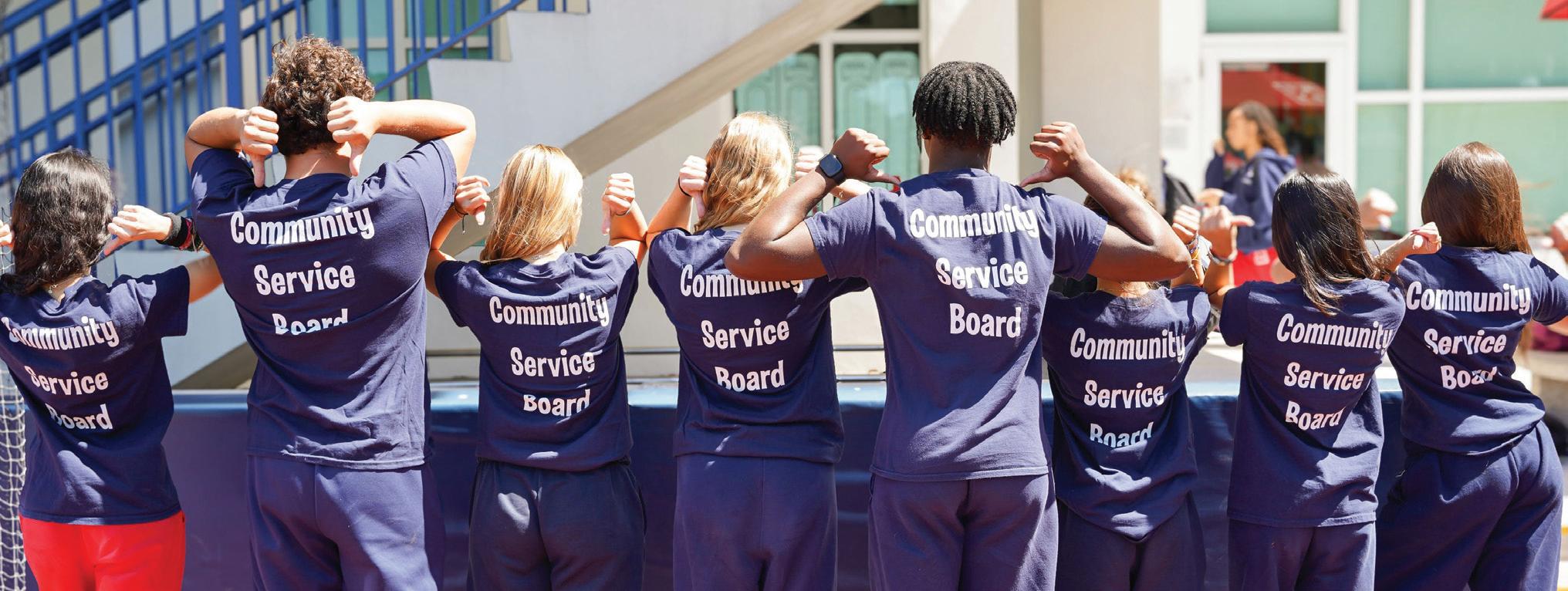
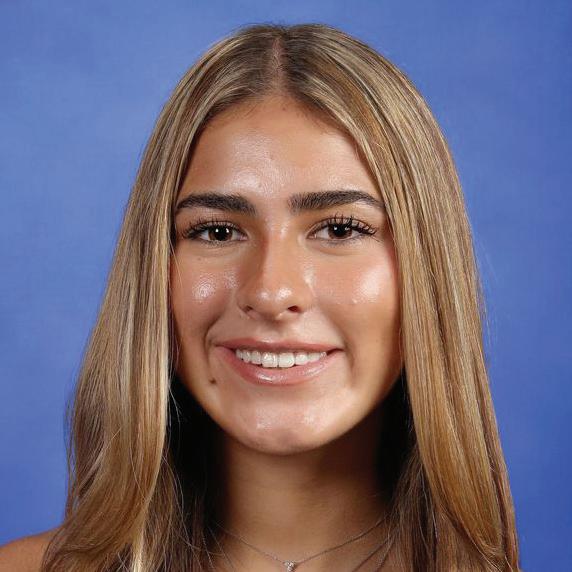
By Ariel Aranha Carvajal ’25
During a mission trip to Honduras in 10th grade, I had the opportunity to serve in a community where many families were living in poverty. I helped build homes, taught English to orphaned children, and connected with many people who were facing challenges far beyond my comprehension. One of the most memorable moments was meeting Genesis, a 17-year-old girl who dreamed of opening a restaurant in Italy despite the hardships she faced. Before I left, Genesis handed me a letter and a piece of aluminum foil containing pancakes she had made for me, inviting me to her restaurant when it opened. Her unwavering belief in herself and her dreams left a lasting impression on me. This experience reaffirmed my commitment to service and deepened my understanding of the power of human connection. I learned valuable lessons in empathy, resilience, and the importance of supporting others in their dreams. I plan to continue making a positive impact on the lives of others, just as Genesis did for me.
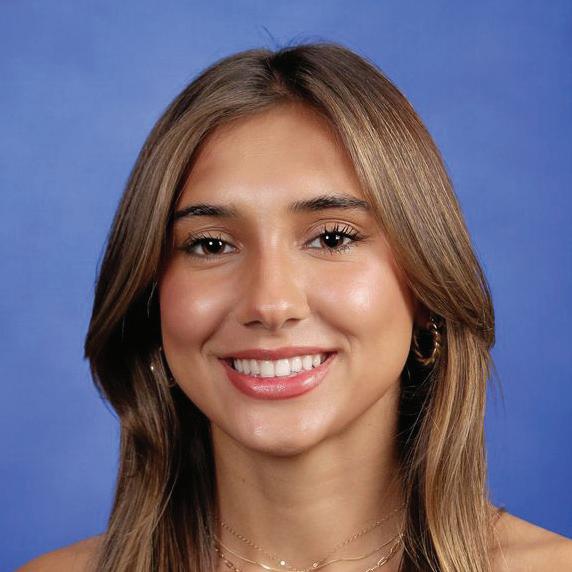
By Nicole Rivero ’25
As an athlete and the captain of the lacrosse team at my school, I understand firsthand the pressures and challenges that sports can have on a student’s mental health. To address this, I initiated conversations about mental health in athletics on my campus, raising awareness among both students and faculty. Inside this initiative, I created smaller projects, like Give Back with Lax, a lacrosse field day for a local elementary school, which inspired my drive to engage in ongoing community awareness efforts regarding mental health.
My work with the Kennedy Kids Foundation (KKF)—a Miami-based nonprofit focused on suicide prevention— has allowed me to extend my impact beyond campus. By managing KKF’s social media presence, I’ve reached a broader audience, sharing critical information about mental health on platforms like Instagram. The key element in my initiative is The Weight of Gold: Mental Health and the Hidden Pressures of the Olympic Dream, a research presentation discussing the world of sports, how it affects mental illness, and how different cultures respond to these challenges.
These undertakings fall under my overall umbrella of Mental Health Awareness in Athletics and have allowed me to make an impact on different communities. With Give Back with Lax, I was able to add a new territory of impact by discussing mental health in sports culture with a younger generation, raising awareness about the mental health crisis in sports. With KKF, I specifically connected with a Miami audience, using social media to share facts about mental health. Through Kennedy Kids and bringing my work on campus, I have felt the willingness of students to learn more about these issues and their desire to work with me to help complete my goal of mental health awareness.
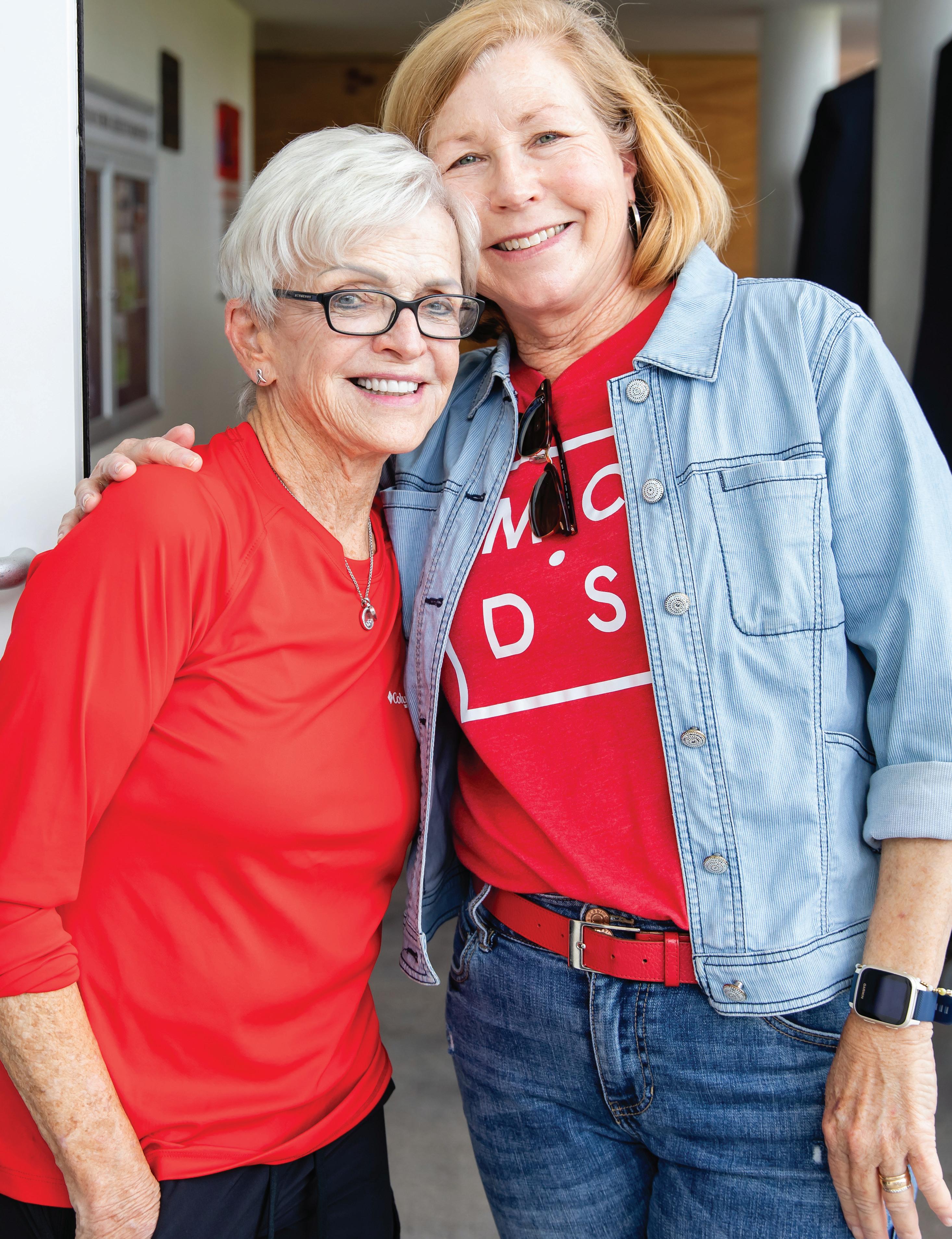
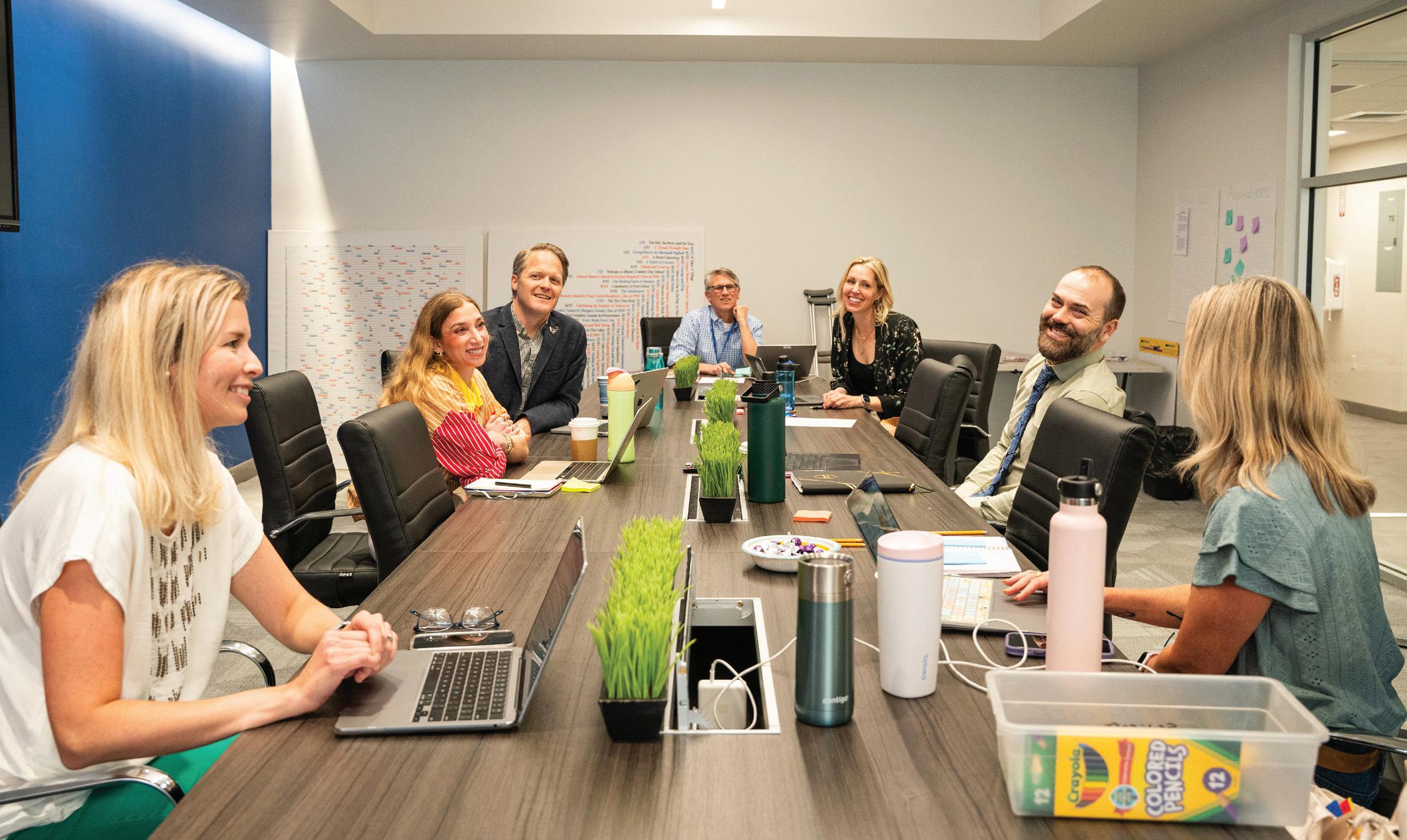
Working together, Miami Country Day School and the Constellation Learning Institute expand student experiences.
For Miami Country Day School, education is much more than what goes on within the walls of a classroom. It’s a dynamic journey. A learning adventure that adapts and expands to reach students wherever they are, bringing to life the school’s mission: Every student, every day, everywhere.
Over the past decade, through an innovative partnership with Constellation Learning Institute (CLI), MCDS has developed a fully online learning program
that not only complements campus life but magnifies it. What began as an initiative to offer select online courses has evolved into Spartans Around, a dedicated, human-centered learning experience that embodies the MCDS spirit— curiosity, connection, and excellence.
“We weren’t looking only for online classes,” says Dan Bronish, Chief Academic Officer at MCDS. “We were looking for a way to expand
our learning environment without compromising the deep relationships and high standards that make MCDS unique. Constellation Learning Institute understood that from the start. Together, we built a program that goes beyond content delivery to create a truly dynamic and engaging educational experience.”
Sarah Hofstra, Co-Founder of CLI, shares the same vision: “We believe that online learning should be more than a digital
space to take classes. It should be an opportunity for students to feel known, challenged, and connected.” She has seen how the initial daring concept of Spartans Around has encouraged students to flourish. “The partnership with MCDS has permitted us to build something extraordinary—a program where students aren’t just logging in to complete assignments, but to become part of a vibrant academic community that supports their passions and personal growth.”
The collaboration between MCDS and CLI is a model of independent school innovation. Rather than outsourcing online learning to a packaged, static vendor, MCDS chose to partner closely with CLI in creating a program tailored specifically to its students.
CLI, a nonprofit organization accredited by Cognia, has worked for years at the forefront of research-based, human-centered online learning. Through their research-based strategies for organizations such as the New York State Association of Independent Schools (NYSAIS) and the Aurora Institute (formerly iNACOL), CLI helped shape best practices for online education nationwide. The MCDSCLI partnership, however, is unique. Every course, every interaction, and every opportunity in Spartans Around has been purposefully designed to align with the school’s curriculum, mission, and culture.
“From the very beginning, we wanted Spartans Around to be a natural extension of MCDS, not an add-on,” Bronish explains. “It was essential that the program reflect the same values and academic rigor that define our school. Working with CLI has allowed us to do that while also pushing the boundaries of what’s possible in education.”
Hofstra confirms that sentiment. “MCDS has always been forwardthinking, willing to innovate without losing sight of its core values,” she says. “That’s what makes this partnership so special. Together, we are constantly evolving and improving to respond to the needs of MCDS students, while staying true to the mission of the school.”
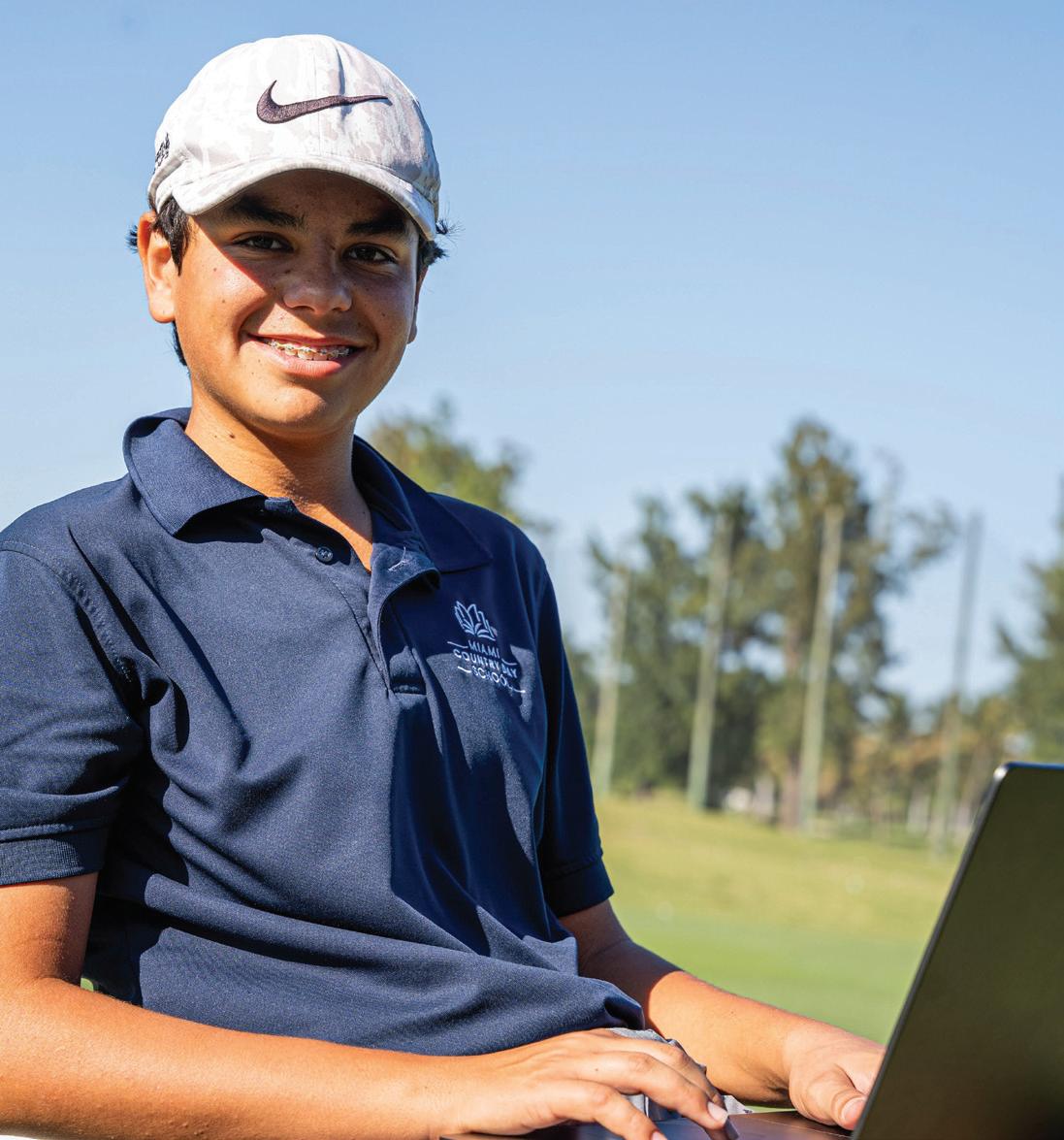
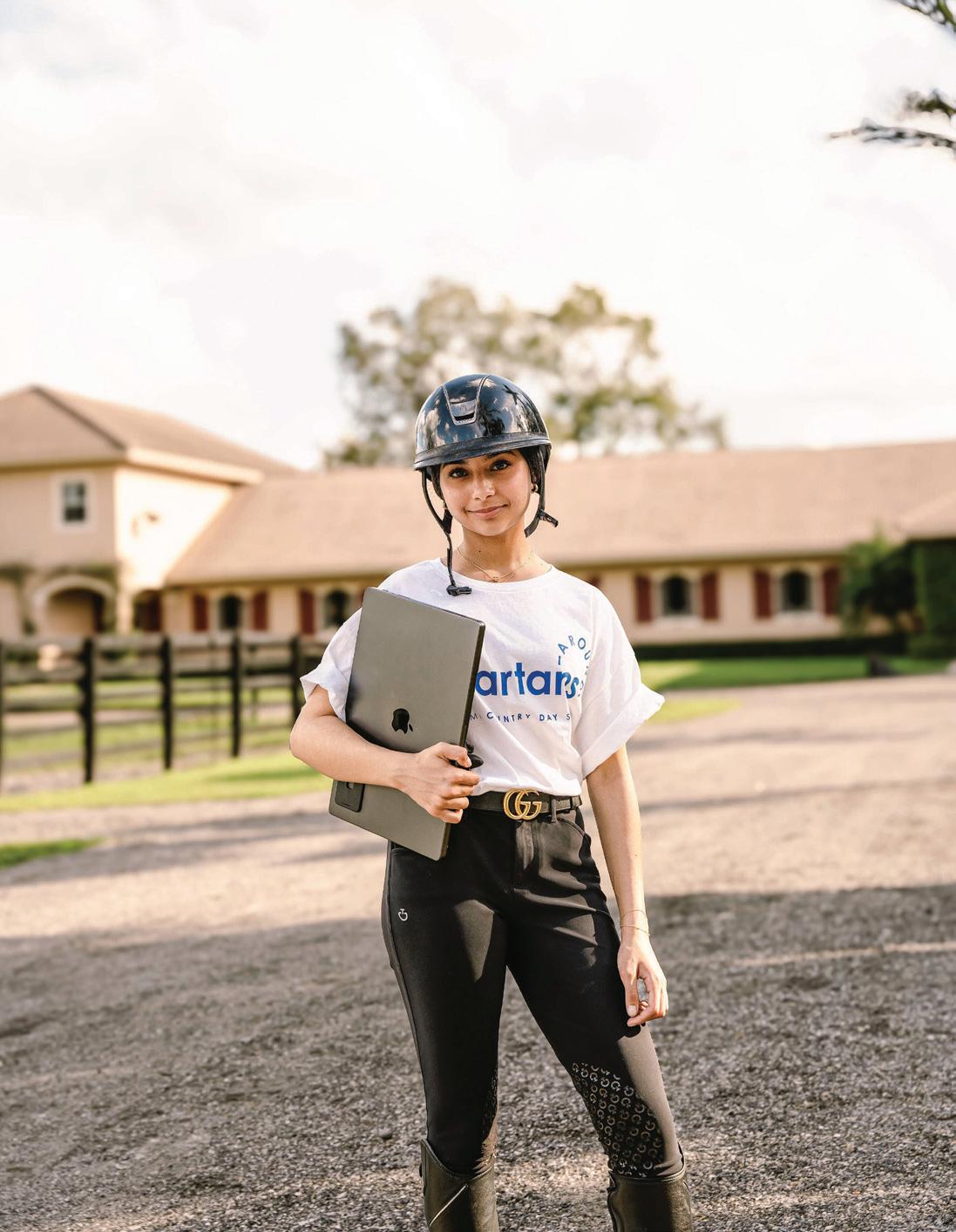
The roots of Spartans Around can be traced back to Spartans Select, a CLI built program begun 10 years ago that allows MCDS students to enroll in individual online courses to complement their on-campus studies. Whether a student is seeking an advanced elective, a specialized subject, or additional schedule flexibility, Spartans Select provides new possibilities for academic exploration. In the past decade, the program has grown steadily, with more students enrolled annually and more courses developed to meet their needs. Spartans Select currently counts an average of 200 MCDS enrollments each year.
When the time came to expand beyond single-course enrollments, the MCDS-CLI partnership evolved again. What emerged was Spartans Around, a fully online program designed to serve students in grades 6 through 12 who need a flexible, yet rigorous, academic path.
“We built this program because we recognized the changing landscape of education and wanted to offer students something truly exceptional,” Bronish says. “Spartans Around is a natural progression of our commitment to meeting students where they are—both academically and geographically.”

For many students and their families, Spartans Around has been a transformational experience. It has provided opportunities for students who need an adaptable schedule, without sacrificing academic rigor or personal connections. Parents express the relief of not having constraints on their children required to choose between academics and the time and discipline they need to follow a dream.
For example, Sebastian V.’s parents say, “Spartans Around has truly been a gift for our son, offering him the flexibility to follow his passions for soccer, piano, digital animation, Portuguese, and karate, while ensuring a solid academic foundation with his incredible teachers. It’s been so rewarding to watch him thrive and grow in all these areas, never having to choose between one passion and another. We are beyond grateful for this opportunity that supports his dreams and development as a well-rounded young man.”
Students, such as Cat, an aspiring musician, have embraced the program, pursuing a wide range of interests and talents. According to Cat’s mother, “The Spartans Around program has given my daughter the flexibility that she needed to pursue her music career while maintaining a strong academic foundation. Cat is excelling in
Today, Spartans Around offers students the ability to receive the full benefits of an MCDS education from anywhere in the world. The program is structured to provide both stability and flexibility, ensuring that students remain engaged, challenged, and connected to their MCDS learning community, no matter where school days find them.
Classes are intentionally small, with a maximum 12:1 student-toteacher ratio, allowing personalized instruction and meaningful interaction. A blend of live Zoom classes and asynchronous coursework creates a balance between structured engagement and independent learning. Course offerings guarantee students access to a diverse and enriching curriculum, with courses that range from core academic subjects to specialized electives, such as Financial Literacy for Athletes, Understanding Artificial Intelligence, and Digital Filmmaking.
“Our students are doing much more than participating in online classes,” Dr. Christopher Mullis, CoFounder of CLI, explains. “They are engaging in a thoughtfully designed learning environment that allows them to thrive. Whether they are student-athletes training at an elite level, artists traveling internationally, or students whose families are living abroad, each one receives the same high-quality education and community support as any campus-based MCDS student.”
both, without having to choose one over the other. It’s a relief that such an amazing, well-organized program exists.”
Spartans Around accommodates the demanding training and travel schedules elite levels of music, arts, and sports require. Skylar G.reflects on her experience, “I can pursue my passion for ice skating while still being able to focus on my academics. I am so grateful for Spartans Around.” Vlad I. says, “I am able to balance both my academics and gymnastics, and I can be great at both!”
Students celebrate the Spartans Around connections and quality of teaching . Yannick A. says, “The teachers are really forthcoming in wanting to help you.” And Sebastian V explains, “Being a Spartans Around student has given me access to an extraordinary education, while allowing me the time to learn from incredible teachers and piano coaches. It’s been a privilege to grow academically and musically, surrounded by mentors who inspire and challenge me to reach my full potential.”
As the demand for flexible, high-quality education continues to grow, MCDS and CLI are committed to expanding Spartans Around. Future plans include broadening course offerings, increasing integration between online and on-campus experiences, and extending the reach of the program beyond the Miami-Dade area to enrich class connections with talented and capable students in more geographic areas.
“We’re just getting started,” Bronish says. “The world of education is evolving, and together we are leading that evolution. The future of Spartans Around is about creating even more opportunities for students to learn in ways that work best for them.”
Hofstra agrees. “This partnership has already accomplished so much, but the potential is limitless. We are continuously innovating, always looking for new ways to support students and provide an education that is excellent and also deeply personal.”
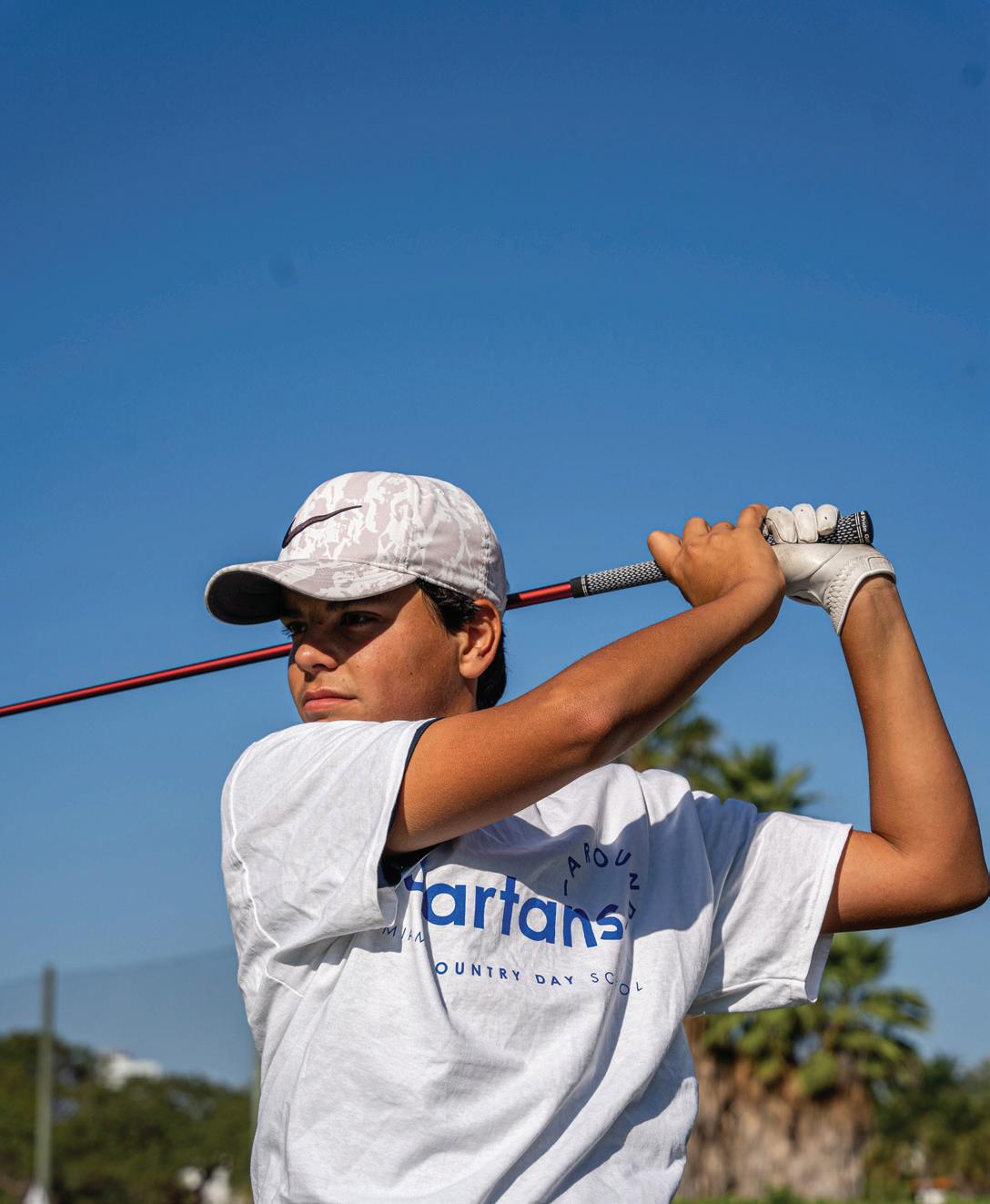
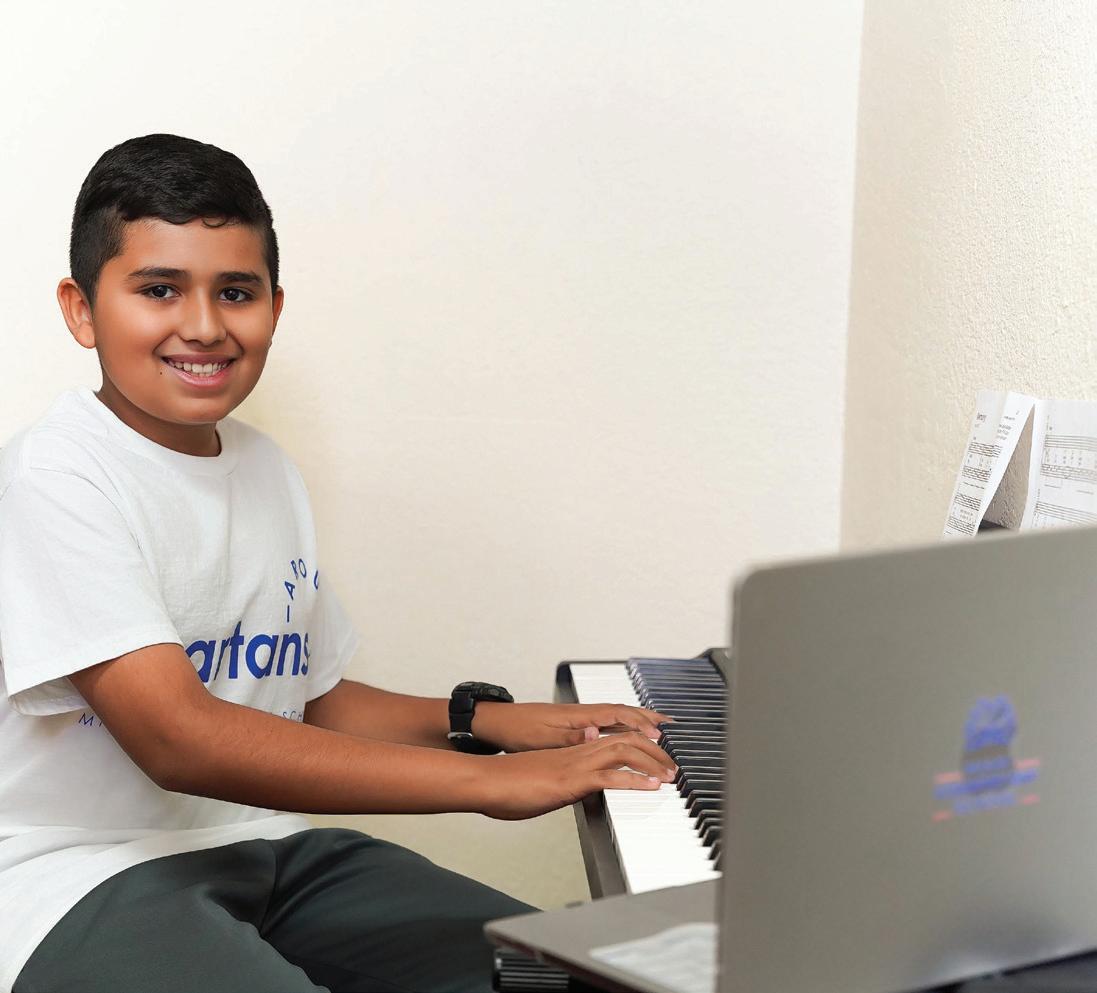
Spartans Around exemplifies what can be achieved when a school dares to innovate while staying true to its mission. The partnership between MCDS and CLI has set a new standard for online learning, proving that education without borders can still be personal, connected, and inspiring.
That is the power of the MCDS-CLI partnership– it’s more than simply an online program. It’s an extension of the best of MCDS.
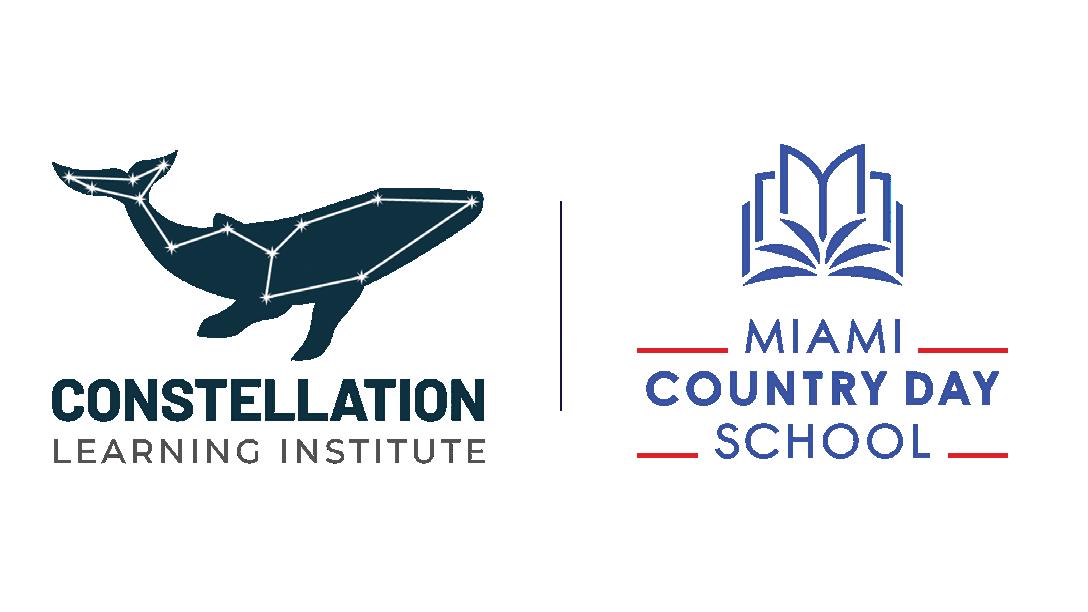
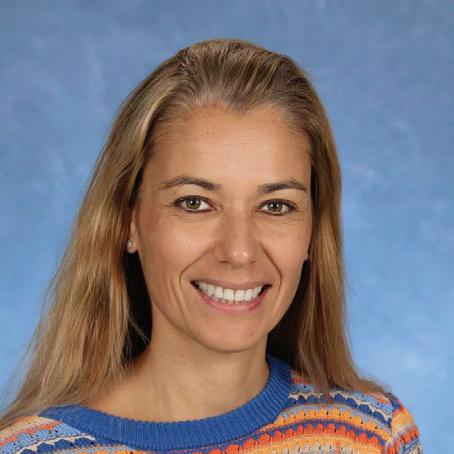
By Laura Gomez
Grade Teacher
For the past three years, I have had the privilege of mentoring Stella Krelstein and Margaux Giraud, two upper school students who have immersed themselves in the teaching world. When I first met them, they were eager yet uncertain, excited yet hesitant. Over time, they have grown into capable, confident young educators, finding joy in supporting younger students and improving their understanding of teaching and learning.
It all started when these students, as part of their X-term experience in 9th grade, came into my second-grade classroom. I did not know what to expect, and let’s be honest, I was a bit nervous because upper schoolers can be full of surprises, if you know what I mean. They started with simple observations, watching how I structured lessons, managed behavior, and created a warm and engaging learning environment. They helped me with simple day-today tasks at first and participated in our daily routines. Soon, X-term was over, and I thought it had been wonderful getting to know them. I knew my students had also enjoyed their young presence in the classroom, but that was that. To my surprise, while we were saying our goodbyes, they took me aback with a question. They asked if it was okay for them to continue coming during their free time. “What? It is no longer required of you, and you want to continue coming?” I asked. Right there and then, I knew these two students were unique. Stella and Margaux continued coming, giving up their free time to support my students; it meant the world to me and to my students as well.
Slowly, they took on more responsibilities, helping with small groups, guiding students through differentiated activities, and even stepping in to lead lessons of their own. I watched as they navigated the balance between instruction and connection, learning to meet students where they were and supporting them in meaningful ways. They quickly learned that teaching is not just about delivering content but also about fostering
relationships, resolving social conflicts, helping students build confidence, and most of all, building trust; and that is exactly what they did. They built that trust with my students as they were there at recess, mediating small disputes, encouraging teamwork, and making sure every child felt included. In the classroom, they adapted their language and strategies to support young learners, always stepping in with patience and care. Meanwhile, second graders welcomed them with hugs and cheers every time they saw them walk in. I knew this was not only a wonderful opportunity and experience for Stella and Margaux, but it was also an opportunity for my second graders to connect with older students whom they look up to and admire. It was a definite win-win.
This experience transferred over to a second year as Margaux and Stella once again reached out and asked if they could be a part of my classroom community during their X-Term experience, and of course, I was more than thrilled. It was a new group of students, and I wanted to give them the same experience my previous second-graders had gotten; so, once again, Stella and Margaux spent time with us for a week as part of their X-term requirement but extended their experience for the entire year during their free time. At this point, they knew me well, my style, my approach, and my expectations, so it became more organic for them while in the classroom. When the year was coming to an end, I was informed that I would be transitioning to fifth grade. I shared the news with both of them, and they seemed more excited than me.
The year started out, and I had no idea what fifth grade was going to be like for me. It brought new challenges, and the transition was a definite shift and adjustment for me. Fifth graders are a “whole other ball game” with unique needs and expectations. What worked for seven-year-olds would not necessarily work for ten- and eleven-year-olds, and I knew this was not going to be easy. When Stella and Margaux reached out to me wanting to continue my mentorship, I was transparently honest with them and told them this year would be a very different experience considering the age group. Without hesitation, they voiced their excitement and immediately saw this as an opportunity to learn new things. We talked about how I have had to rethink my approach, refine my communication, adjust my engagement strategies, and find new ways to connect with fifth-grade students who are developing more independence and deeper critical thinking skills. I shared with them the “big picture” differences between the two grade levels, such going from guiding early readers in second grade to facilitating deeper discussions;

from helping students learn how to share to helping them navigate more complex peer dynamics; from sitting on the rug reading picture books, to leading fifth-grade small group discussions on novels, encouraging students to analyze themes and characters; from guiding second graders through simple math centers, to challenging fifth graders to explain their reasoning and problem-solve collaboratively. Both Stella and Margaux have sat back and listened attentively in our meetings with openness from their part and curiosity. Both are eager to learn and have embraced this change as a way to immerse themselves in the full experience of what it’s like to be an educator, having to adapt to change quickly, and they have done it with open-mindedness and interest. When they come into our classroom, they, too, have shifted their approach with my fifth graders and have started with that trust component I so much talk to them about. They know they have to first gain that trust and make those connections that are incredibly important when teaching young students, and they have been doing a wonderful job thus far, so much so that I have to also say the benefits of this mentorship extend far beyond just Stella and Margaux. My younger students have also gained from their presence in the past and this year already. They look up to them as older role models, often connecting with their guidance in ways that sometimes even surpass my instruction. Seeing Margaux and Stella engage with their learning provides my students with motivation and an aspirational example of where their educational journeys might lead. Furthermore, Margaux and Stella, at times, have a unique ability to bridge the gap, explaining concepts in ways that resonate with younger minds, reinforcing learning in a different and sometimes more relatable way. They share with me personal experiences they had when in fifth grade and the struggles and fears they faced, and this has allowed them to connect and relate to my younger students in many ways. As an example of their dedication, this year, they have taken a keen interest in helping my fifth graders prepare for their transition to middle school, not just academically but on a social-emotional level as well. After observing classroom conversations and sensing students’ anxieties about the next step in their education, they took the initiative to organize a special session to answer questions and share their own experiences to ease some of the nervousness that many students feel. Having two upper schoolers offer firsthand insights, practical tips, and reassurance will go a long way
in helping these young students feel more confident and prepared for the road ahead. What makes this even more special is that it was entirely their idea, born from genuine care and awareness of my students’ needs, highlighting just how remarkable and compassionate Margaux and Stella are.
Watching their growth has been one of the most rewarding experiences of my teaching career. I have seen them develop confidence, leadership, and a true passion. They are no longer just helpers in the classroom; they are role models, mentors, and a bridge between the Upper and Lower School communities. They have built relationships with students across multiple grades, demonstrating the impact that crossdivisional collaboration can have in strengthening a school’s sense of unity and purpose. Additionally, this mentorship has been a two-way street. While I have guided these students, I have also learned from them, their fresh perspectives, their willingness to step outside their comfort zones, and their genuine desire to make a difference. They have reminded me why I became a teacher in the first place: to inspire and be inspired.
As they move forward, whether into education or other fields, I know that the lessons they have learned in my classroom will stay with them. The ability to adapt, communicate, mentor, and lead are skills that will serve them for a lifetime. And for the students they have worked with, they will remain unforgettable figures, proof that learning is not confined to a single classroom or a single moment, but is instead a shared journey that connects us all.
Stella and Margaux’s story is not just about two upper school students spending time in a lower school classroom. It is about the power of mentorship, the magic of cross-divisional collaboration, and the profound impact that one person can have on another’s learning experience. It is a testament to what is possible when we open our classrooms and our hearts, to the potential of those willing to learn, grow, and inspire the next generation.
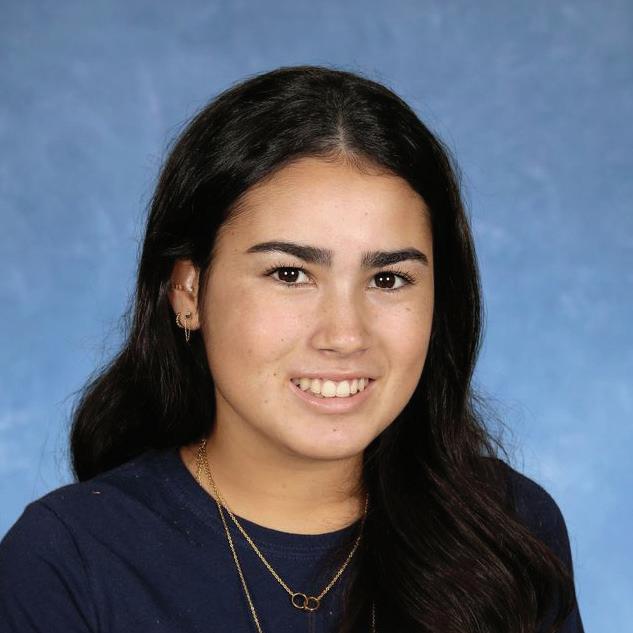
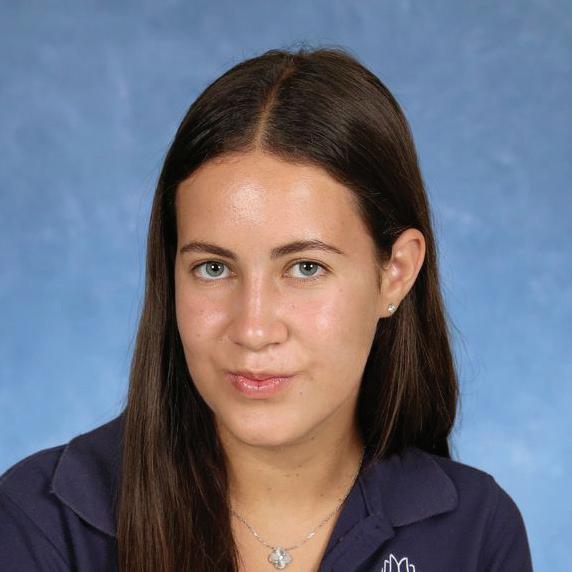
Working with Ms. Gomez has had one of the biggest impacts on my high school experience. From the first time I walked into her classroom during my freshman year, up until the frequent classroom visits I still make, she radiates nothing but positive energy.
Working with Ms. Gomez started as a required X-term in my freshmen year, but very quickly grew into something I love.
About once a week I get the privilege to go to Ms. Gomez’s classroom and help out with anything needed. It could be anything from working with my partner Stella and coteaching some of her lessons, helping the kids get ready for their 5th grade play, assisting any lessons/activities, or more. No matter the task, I always manage to have a blast.
Every year the kids greet me with open arms and are just as excited to see me as I am them. The connection to Ms. Gomez and the kids is truly something I cherish. I’m beyond grateful to have had the opportunity to learn from such a unique experience.
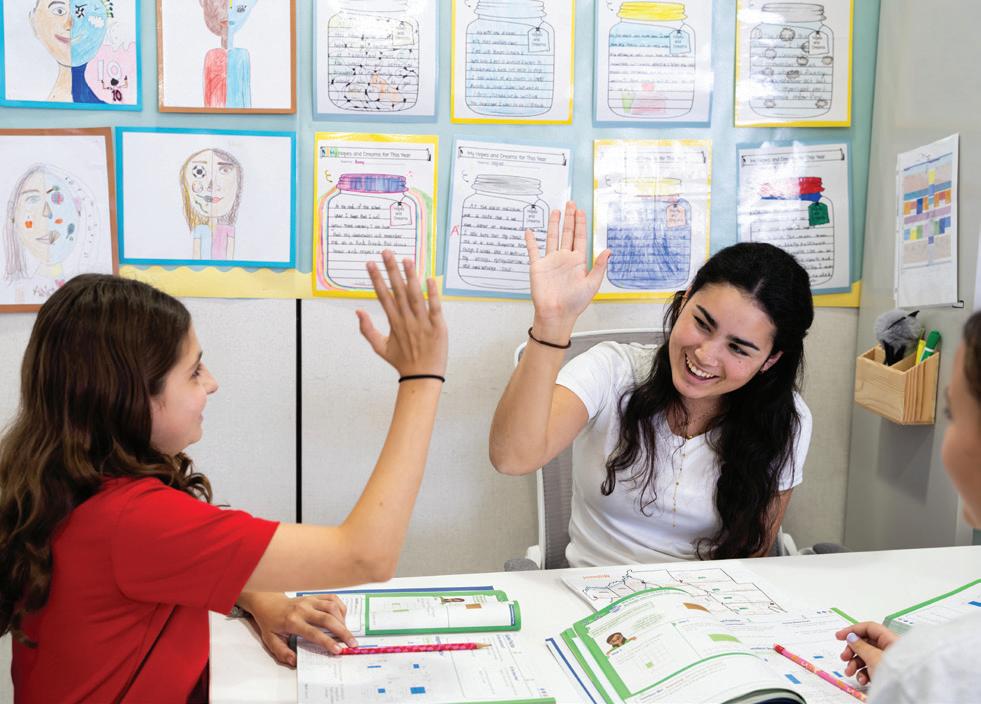
I started working with Ms. Gomez during X-Term in ninth grade when I was paired with her second grade classroom along with my partner Margaux. Margaux and I helped around the classroom with whatever we could and by the end of the week we even began to teach some lessons individually. The experience quickly turned into something I loved and I began going back to her second grade classroom whenever I could during both ninth and tenth grade. This year, Ms. Gomez teaches fifth grade and I still go into her classroom whenever I can, though with the immense support of Ms. Gomez, I have begun to work in her classroom with a more specific focus, implementing my capstone which works to empower the next generation of leaders and specifically girls in business. As part of this, I have thus far facilitated four lessons in her classroom focused on self-worth, stereotypes, failure, and visions for the future. Being in her classroom is always a joy, no matter what I am doing.
The relationships and bonds I have formed with both Ms. Gomez and her students mean so much to me and I cannot imagine what my high school experience would be like if I never participated in the Lower School Teaching internship in ninth grade. I value all that I have been able to learn from Ms. Gomez and her students and I truly look forward to going into her classroom.
Ms. Gomez is one of the most emphatic, patient, and kindhearted people I know. She is an amazing teacher and I truly admire how she really cares for each one of her students. I am always welcomed into her classroom with open arms and a kind greeting from her students, something that brightens my day no matter what and immediately makes me feel at home in her classroom. Ms. Gomez inspires me to get out of my comfort zone, whether it be grading work or teaching lessons, I know she is always there to support me without judgment. I am forever grateful to have had the experience of working with a mentor like Ms. Gomez and a welcoming classroom like hers.

A year in which we succeeded together
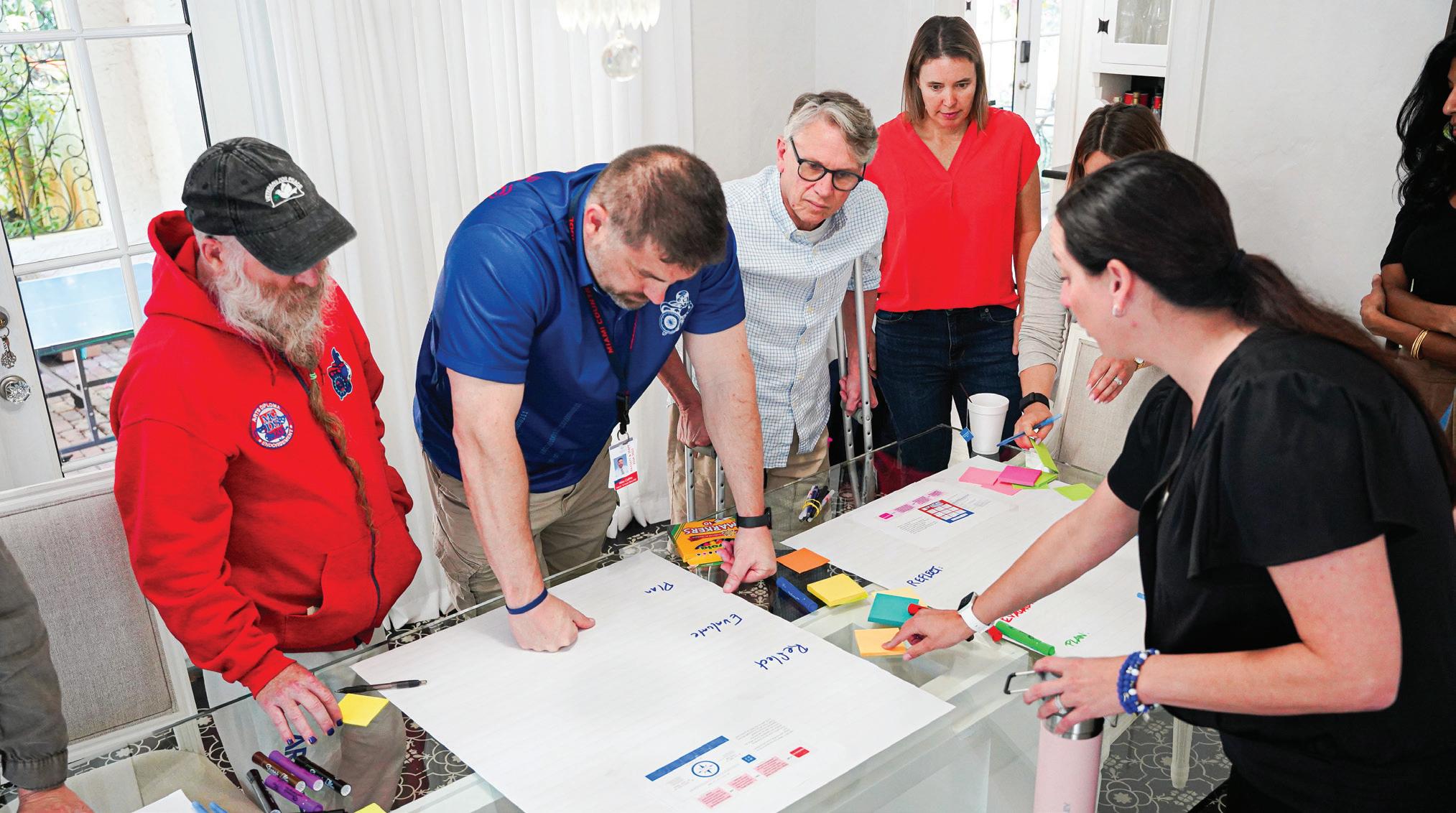
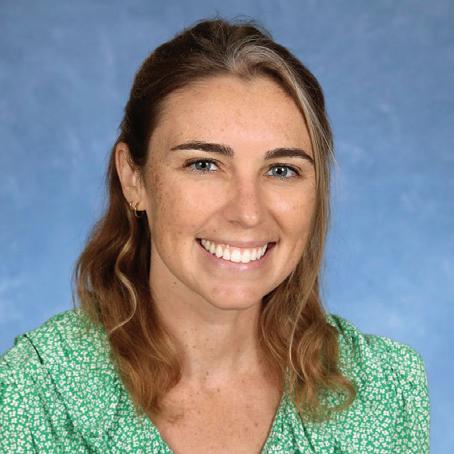
By Gabrielle Schreffler Upper School Teacher
At the close of the first term of the 2023-24 school year, Mariandl extended an invitation to all faculty members to join a Think Tank. In January, we came together as a diverse group representing multiple divisions, departments, experiences, and backgrounds. After a day filled with thoughtful discussions and reflection, it became clear that MCDS was seeking to strengthen a culture of learning and growth among its faculty so that we can continuously improve our craft to better serve our students.
In the following months, Jill Robert connected with Meghan Cureton, leading to the formation of the Design Team— comprising Jill Robert, Dan Bronish, Shana Lindsey, Nima Rouhanifard, Mike Culley, Preethi Raghu, Michelle Holcman, Samantha Stanton, Mark Runge, and myself. Our team brings together both administration and representatives from every division and various areas.
We reconvened at the end of the school year to establish norms, clarify our purpose, and set intentions for the work ahead. This enthusiasm carried us into the summer, eagerly anticipating our August kickoff. On September 13, we held our first full-day retreat, during which we analyzed a comprehensive system map outlining the various elements of growth and development within the MCDS community— from team meetings and classroom observations to financial support for individualized professional learning. Through in-depth exploration and rich discussion, we formulated our guiding purpose, our “why”:
“Our commitment to learning extends beyond the classroom, encompassing personal and professional growth. Just as students are encouraged to reflect and grow, faculty and staff engage in continuous self-reflection and learning, evolving their practices to meet the needs of a diverse, dynamic student body in an ever-changing world. This includes staying responsive to emerging technologies like AI, and adapting our methods to ensure that both educators and students are prepared for the opportunities and challenges of the future.”
If you’re going to sell a product, it is best practice to test it repeatedly to ensure the results are consistently in line with your intentions. As teachers on the Design Team, we did just that: we spent the next few weeks visiting the classrooms of our peers. When we gathered again as a team, we discussed our experiences. Mark Runge compared his visits to “opening a textbook in real time” and commented: “I left each visit with a new tool in my teaching toolkit and a renewed appreciation for the dedication of my colleagues.” We took these experiences to share with our respective divisions; it is not “about judging,” but about “observing, absorbing, and ultimately, refining [our own] craft.”
At MCDS, our mission serves as our North Star—a guiding light supported by our vision, values, and learning principles. Through this framework, we are dedicated to cultivating a culture of continuous growth, with peer visits and meaningful conversations as key drivers. This commitment guided our work during our second retreat on November 14. Throughout the day, we explored how best to invite our colleagues to join in this collective journey of learning and growth. By 4:00 p.m., the Spartan Scramble was born. Launched upon our return from Winter Break, the Spartan Scramble encouraged faculty to engage in brief peer visits,
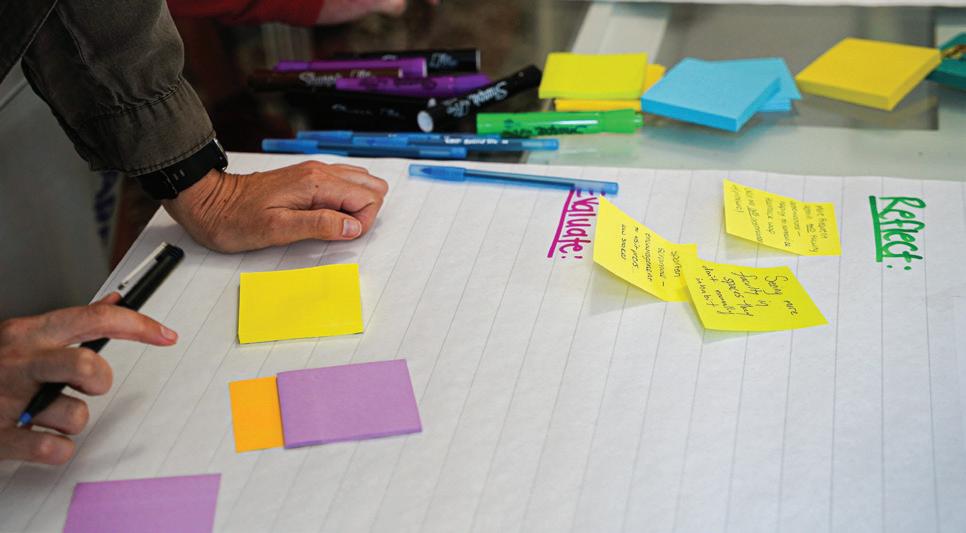
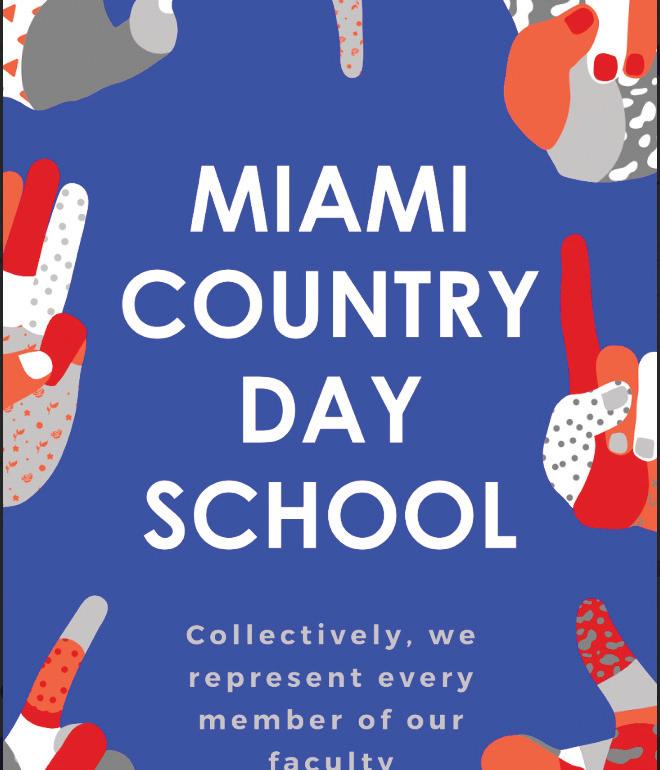
debriefs, and pedagogical conversations centered on our learning principles. Yamelete Rosa, the first to complete the Spartan Scramble, shared, “I loved seeing the different levels of student engagement and how they tackled different subjects differently. Experiencing different teaching styles was refreshing and opened a window of possibilities I could try in my own classes.”
After about two months of this BINGO-like competition, one key takeaway emerged: we already engage in so many of these practices. From division to department and team meetings, we are constantly discussing our practices. What we’re missing, however, is a structured feedback cycle. As a professional institution, the connection between observation and evaluation is deeply ingrained in us. Separating the two can be challenging, though establishing a clear feedback loop is imperative, as it allows us to share insights and improve collectively. With a diverse faculty rich in backgrounds, talents, experiences, and ideas, we have so much to offer one another.
This work is invigorating, exciting, and promising. Samantha Stanton commented that she is already seeing how the Design Team’s efforts are “creating a culture of continuous growth and learning in our school community.” At MCDS, we strive to create lifelong learners among our students— so why shouldn’t our faculty embark on the same journey of continuous growth? By modeling a love for learning, committing to continuous improvement, and seeking feedback from one another, we are not only strengthening our teaching community but also reinforcing the very values we hope to instill in our students. While the Design Team is a 2024-25 initiative, our work is helping to shape the future of our classrooms, our students, and their success.
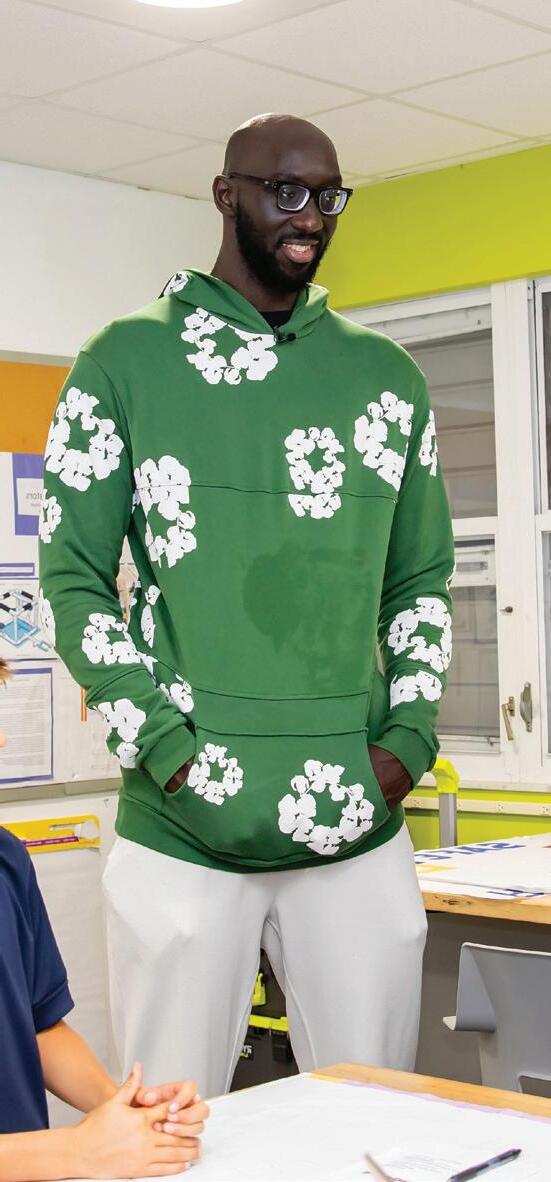
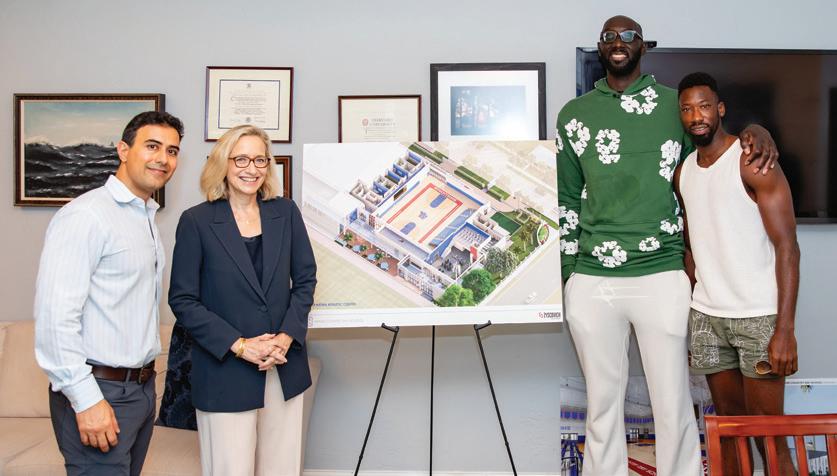
September 12th, 2024
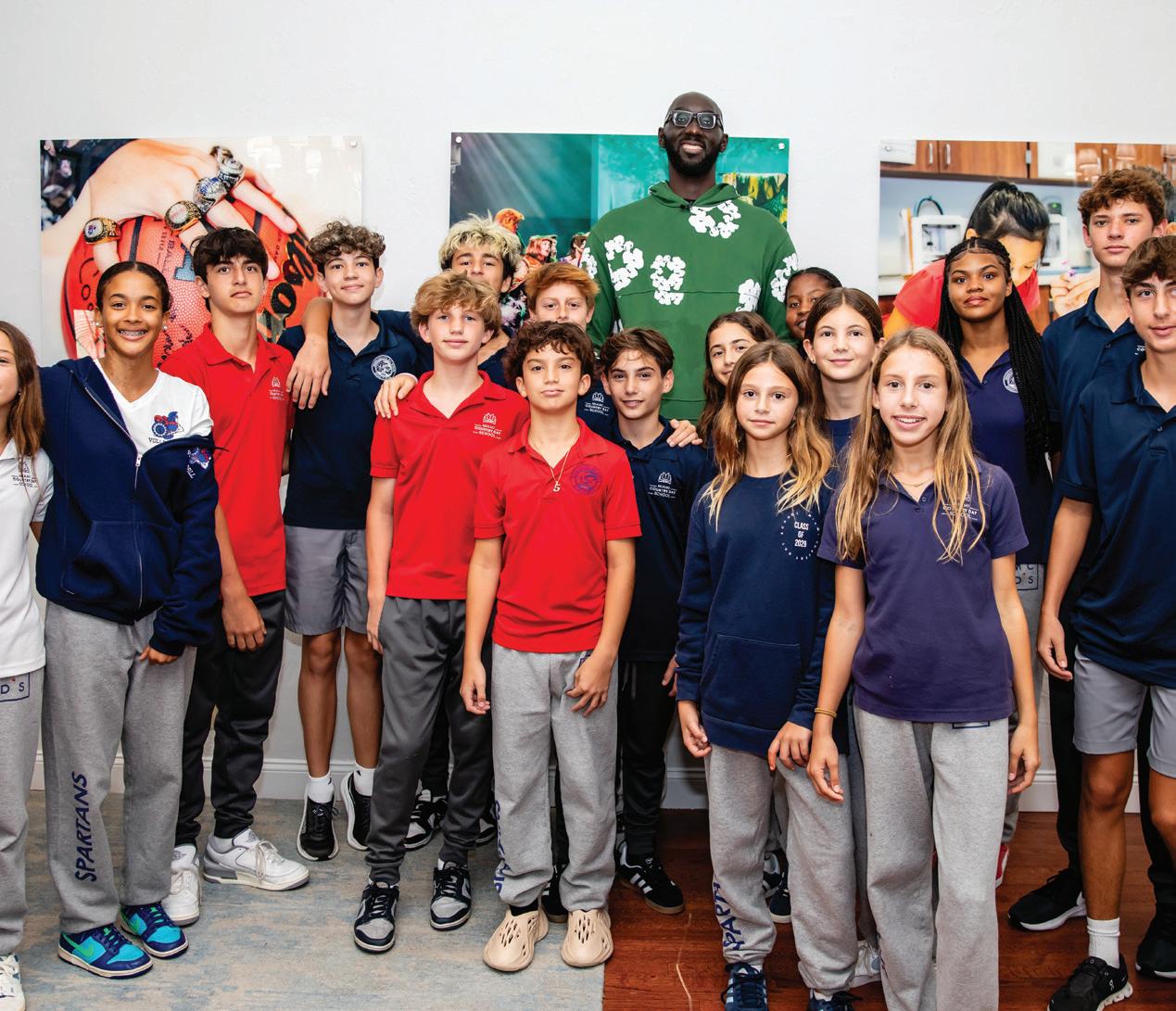

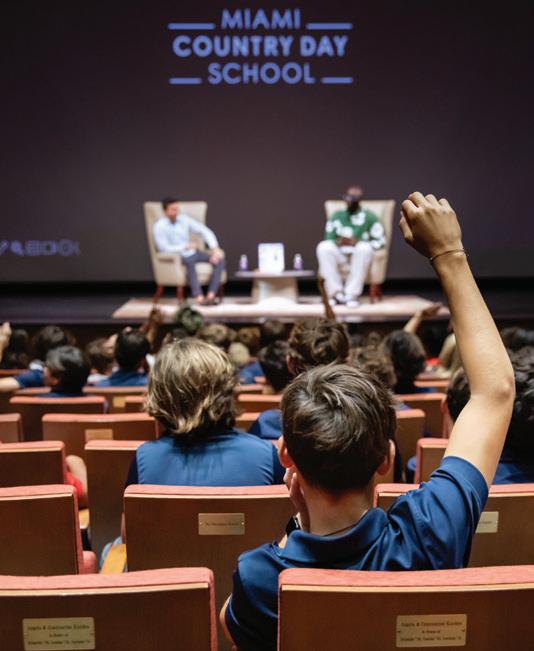

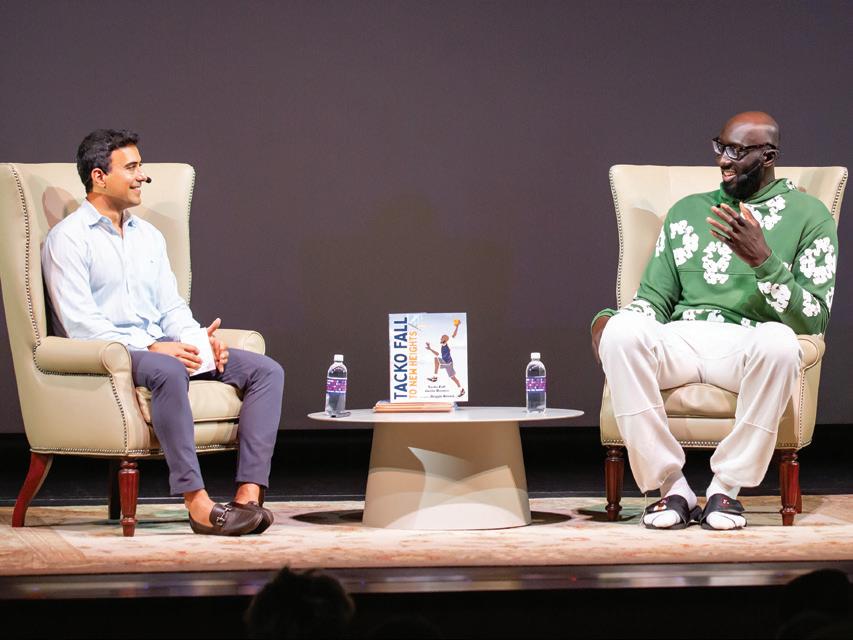
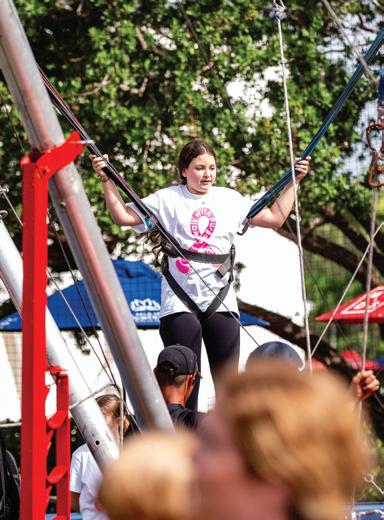
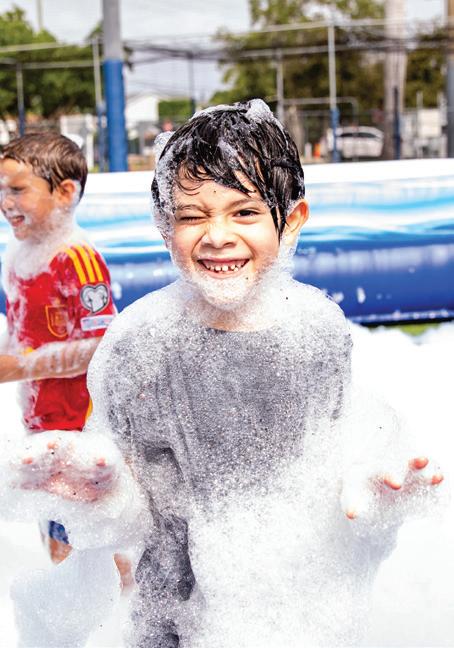
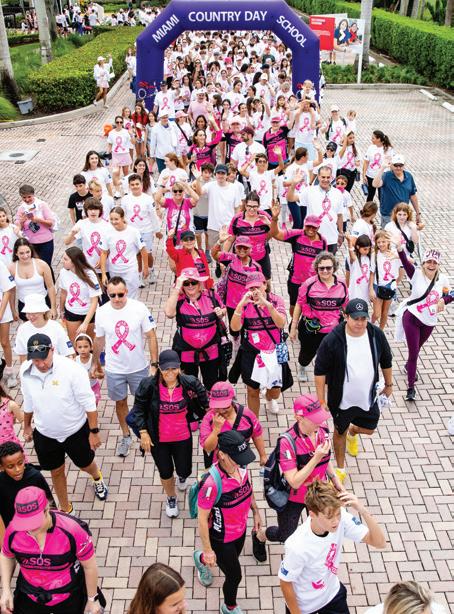
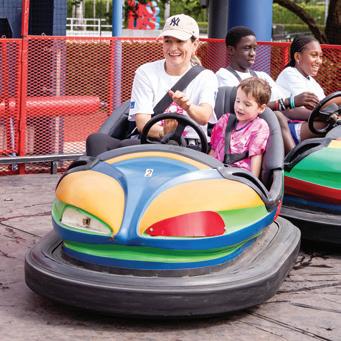
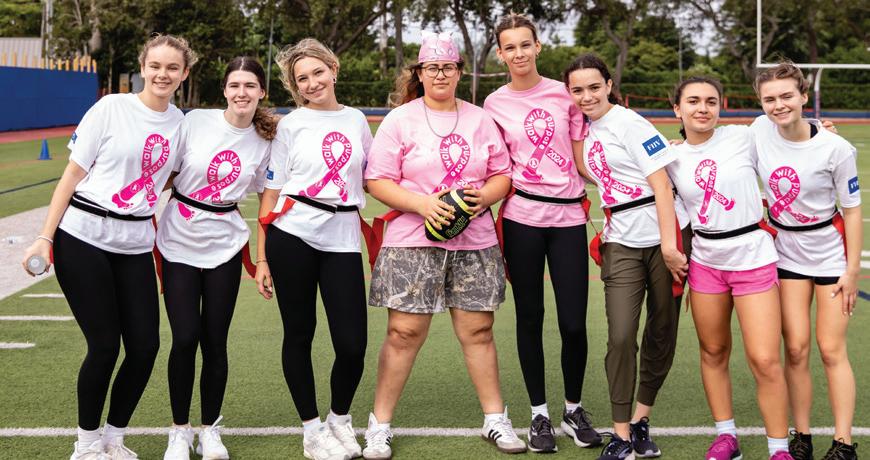

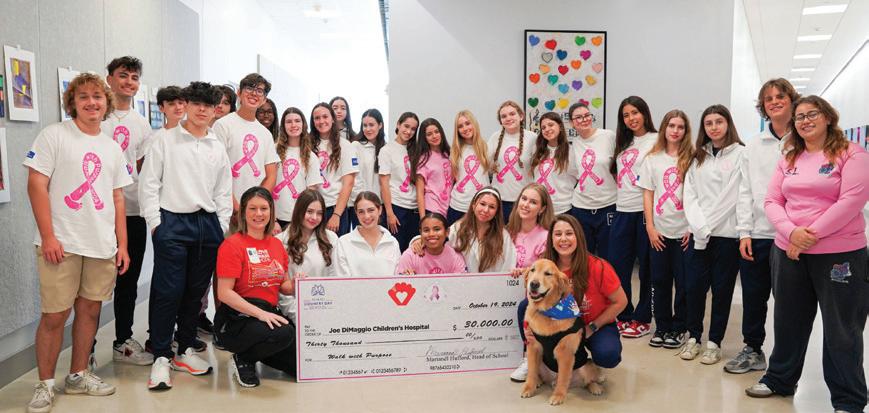

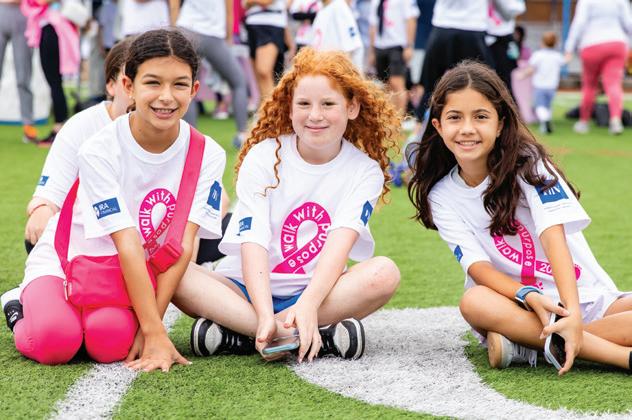
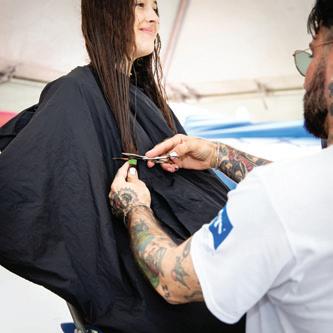
October 19th, 2024
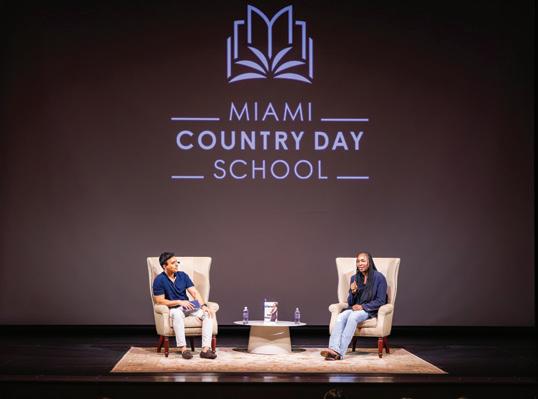

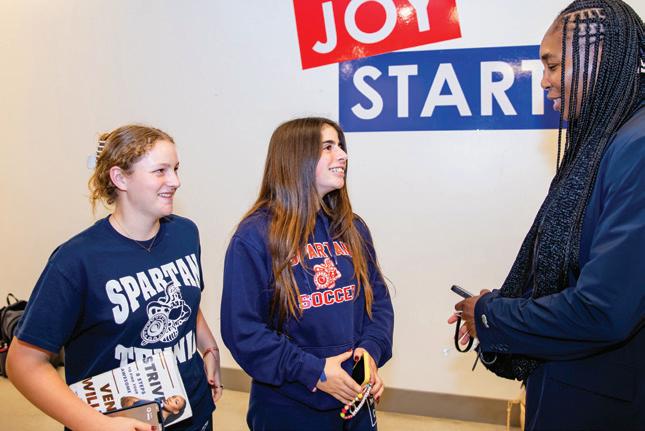

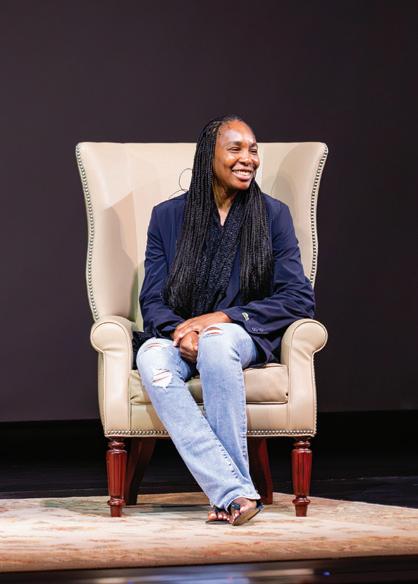
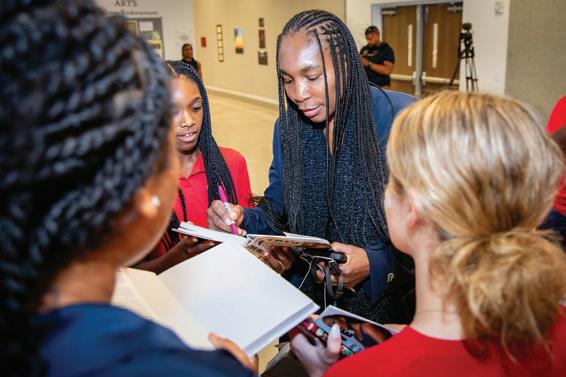
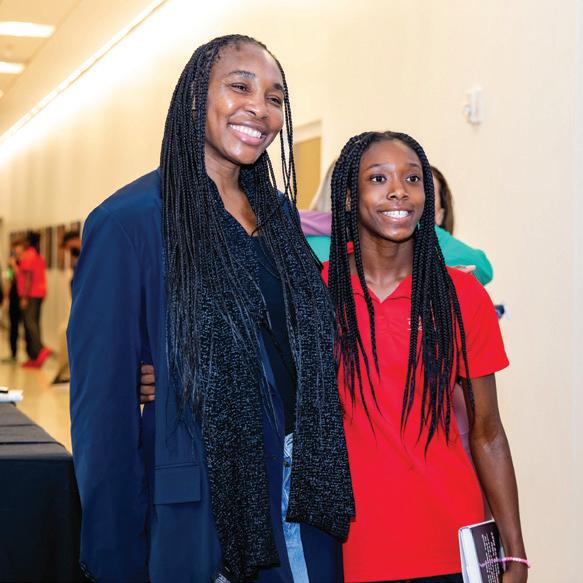
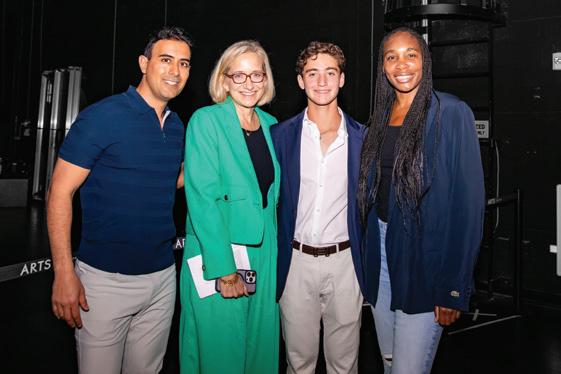
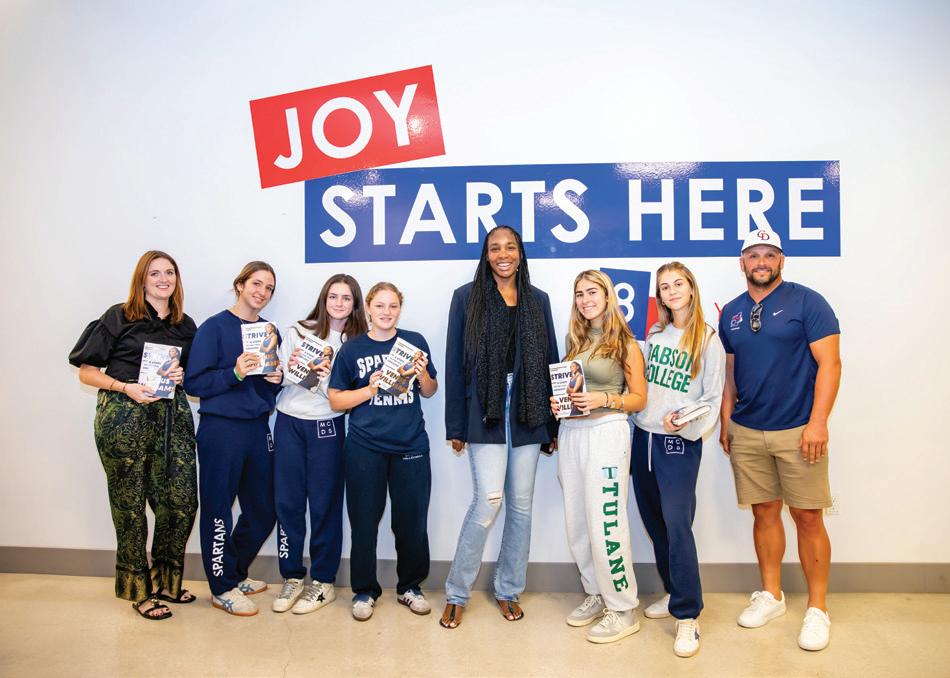


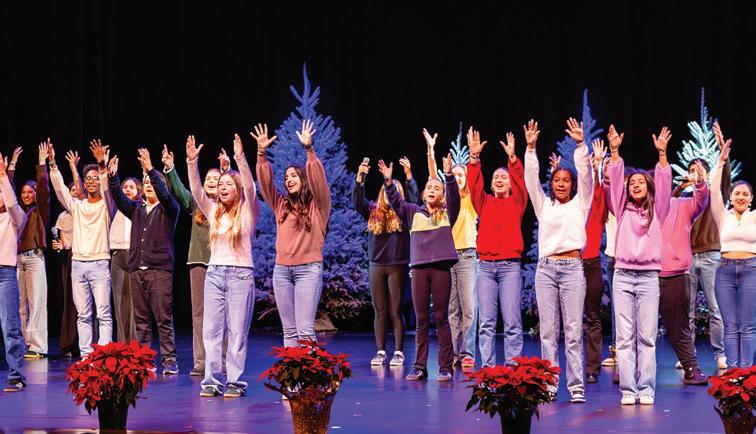
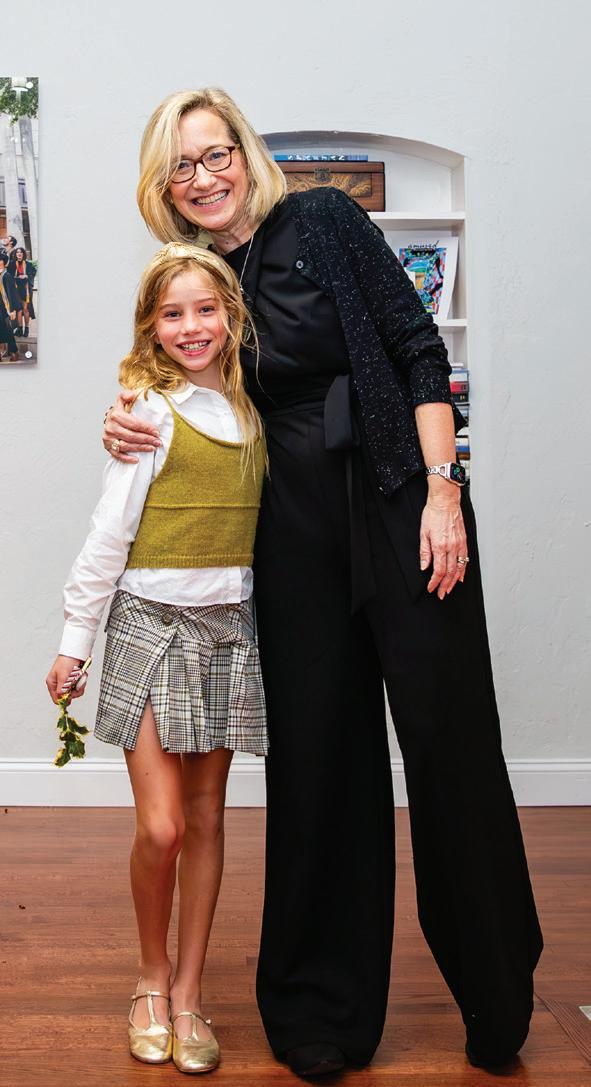

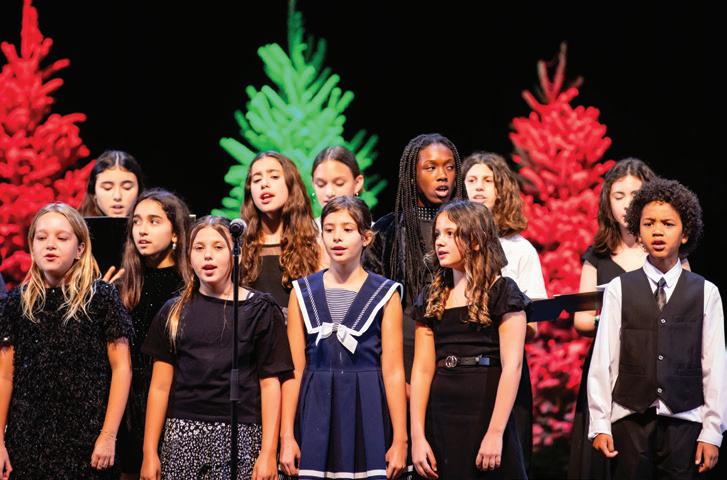
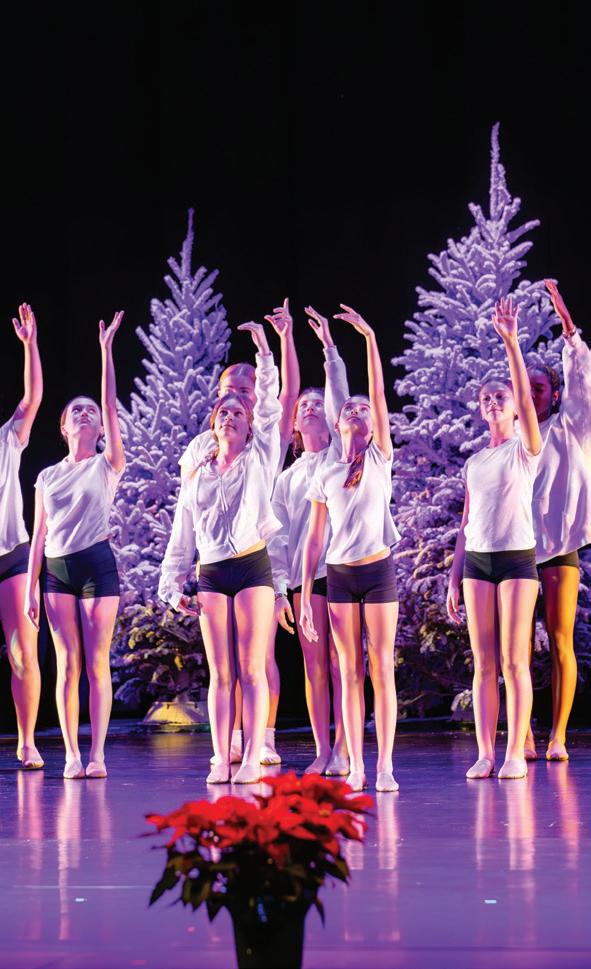
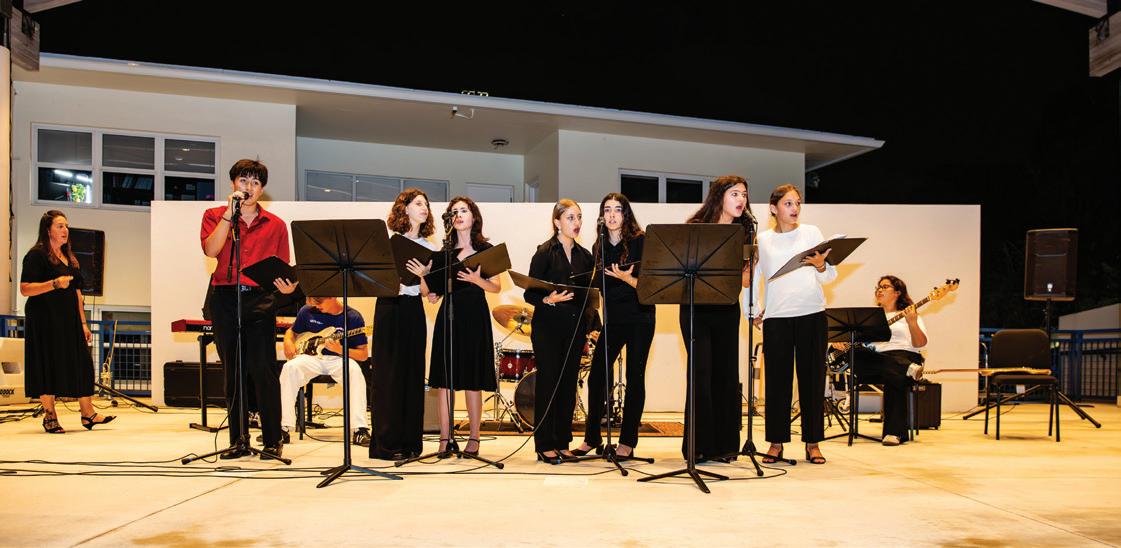
December 17th,2024

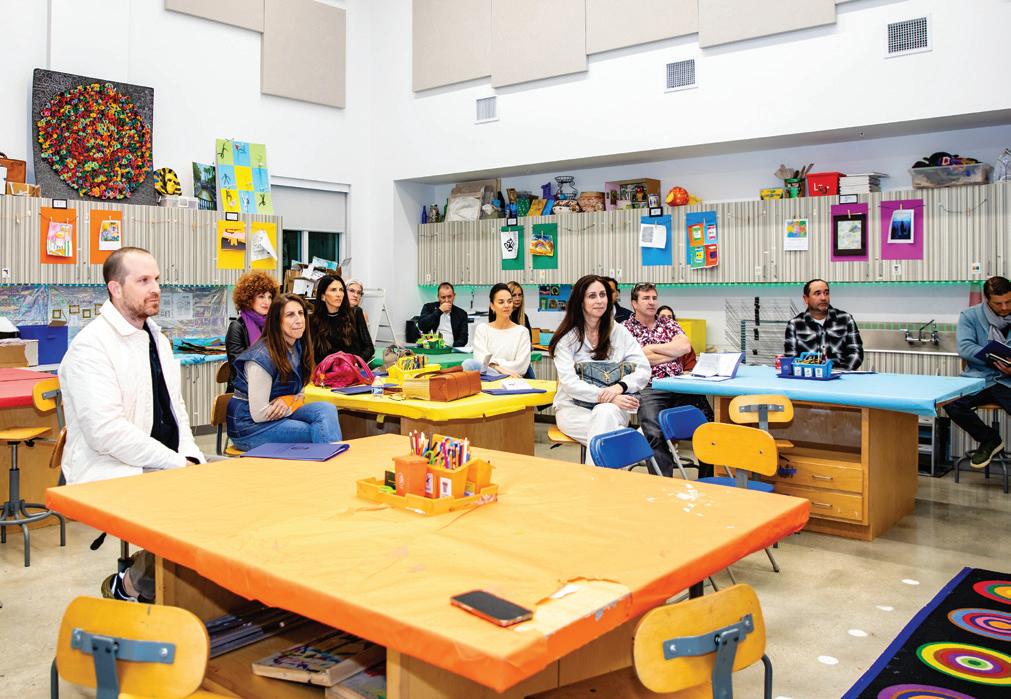
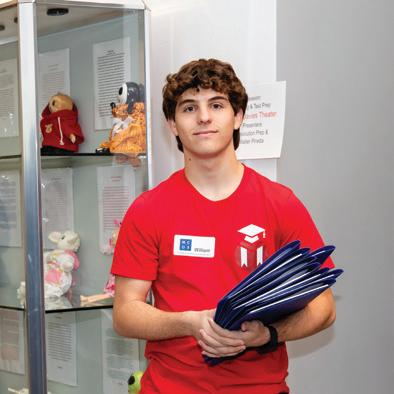
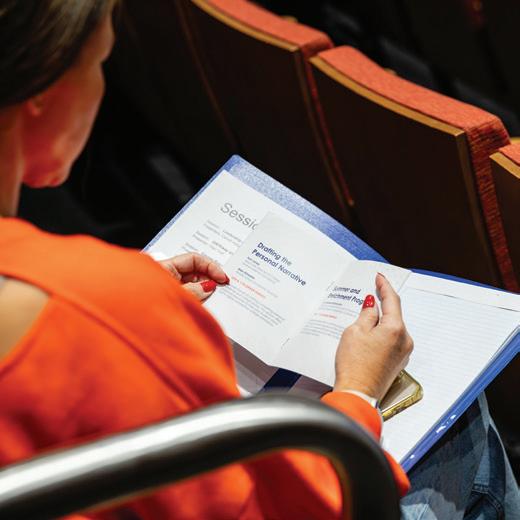
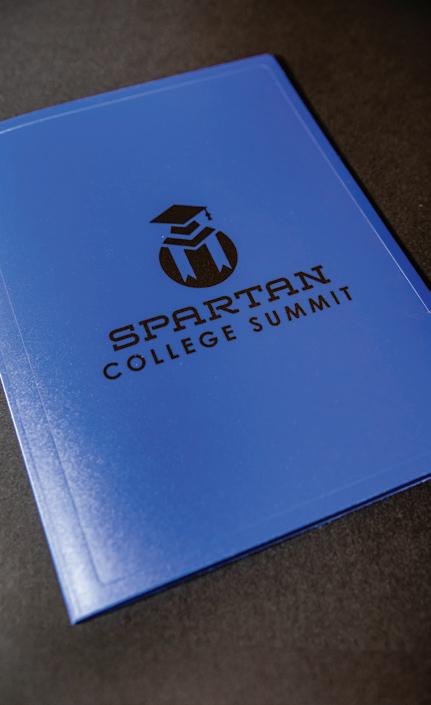

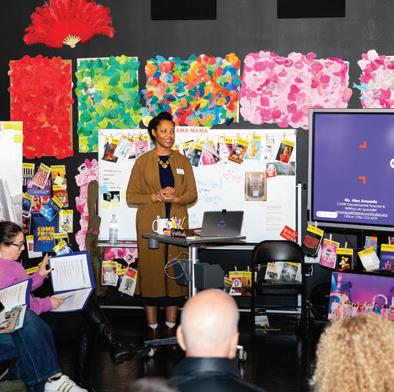
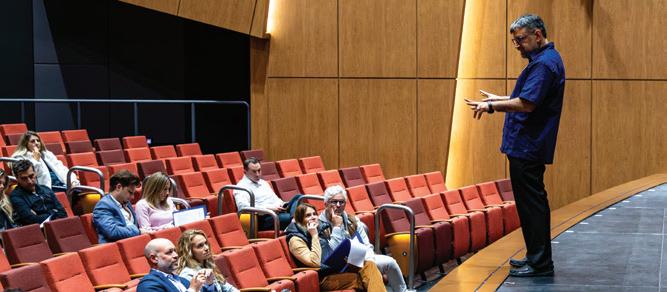
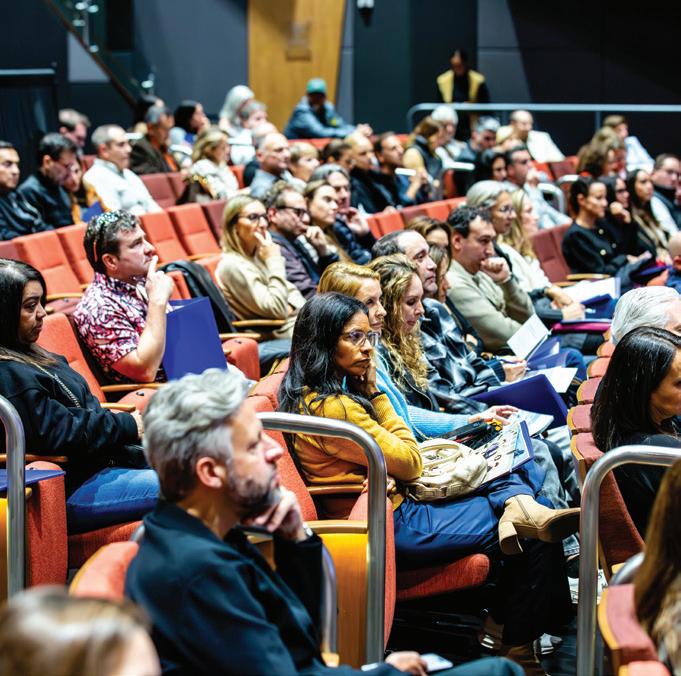
January 9th,2025
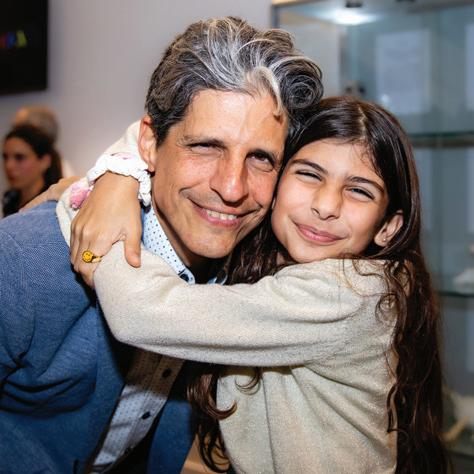
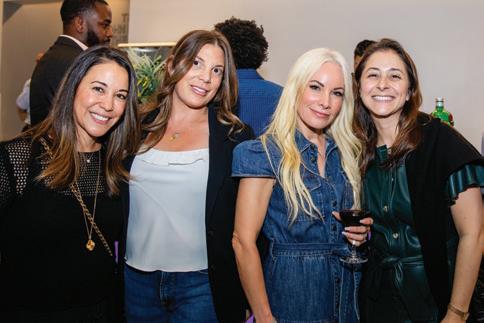
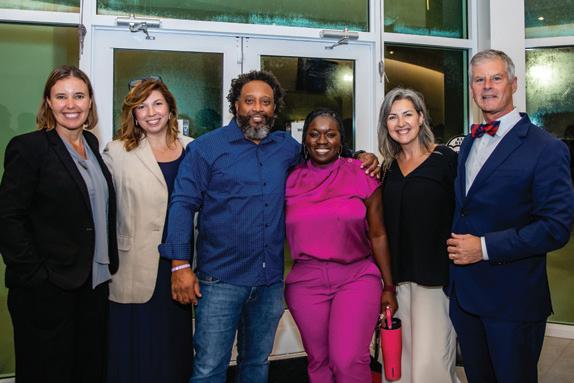
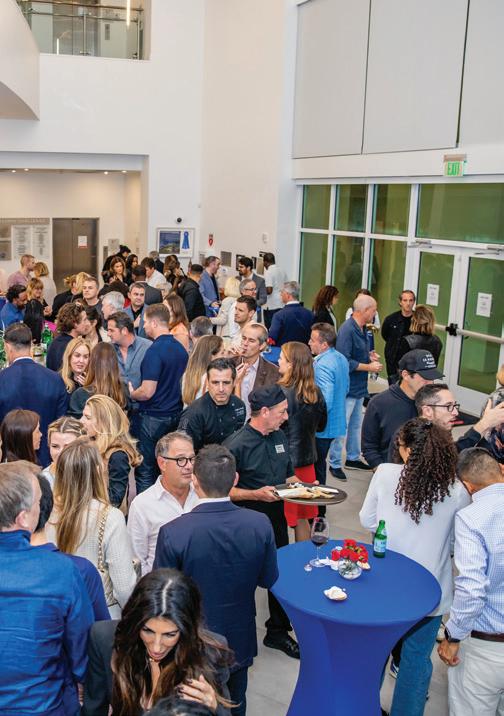
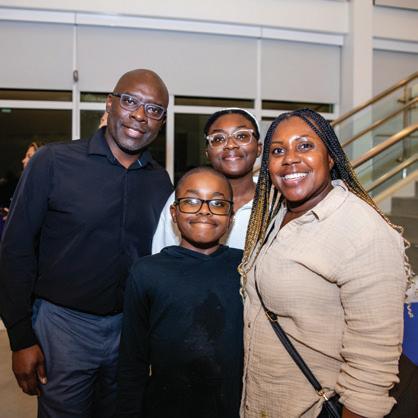
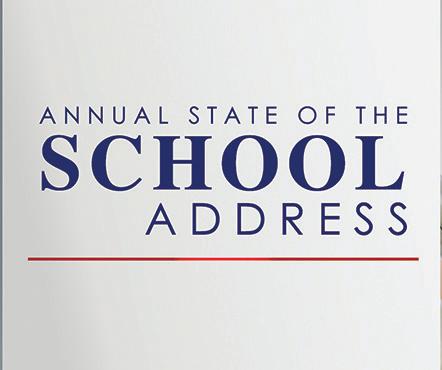

January 21st,2025
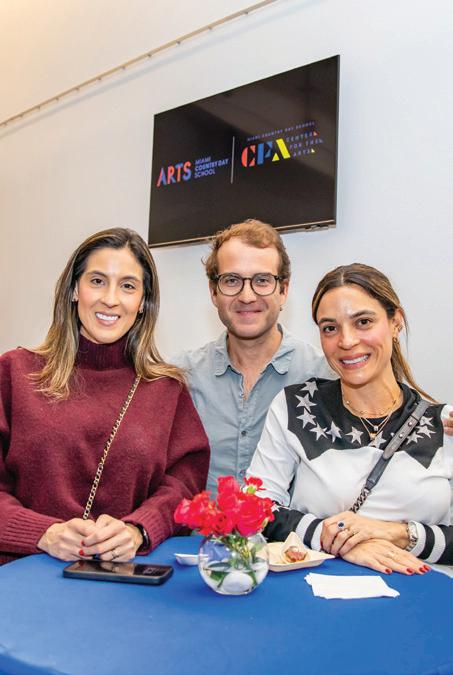
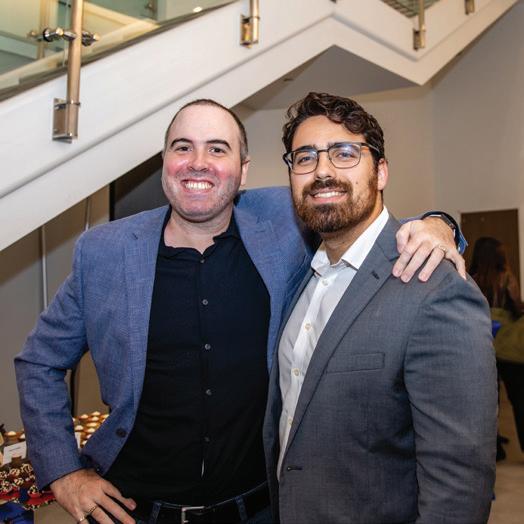
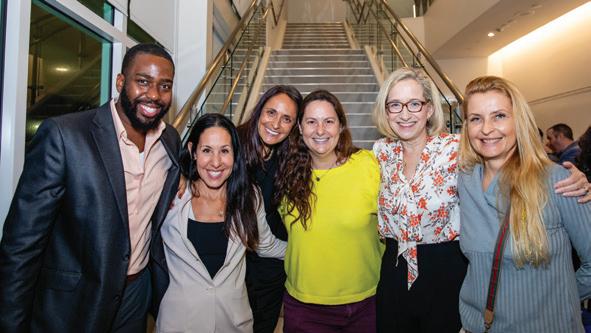
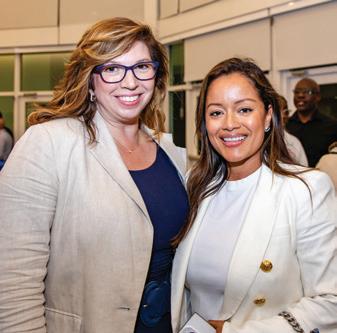
February 21st,2025
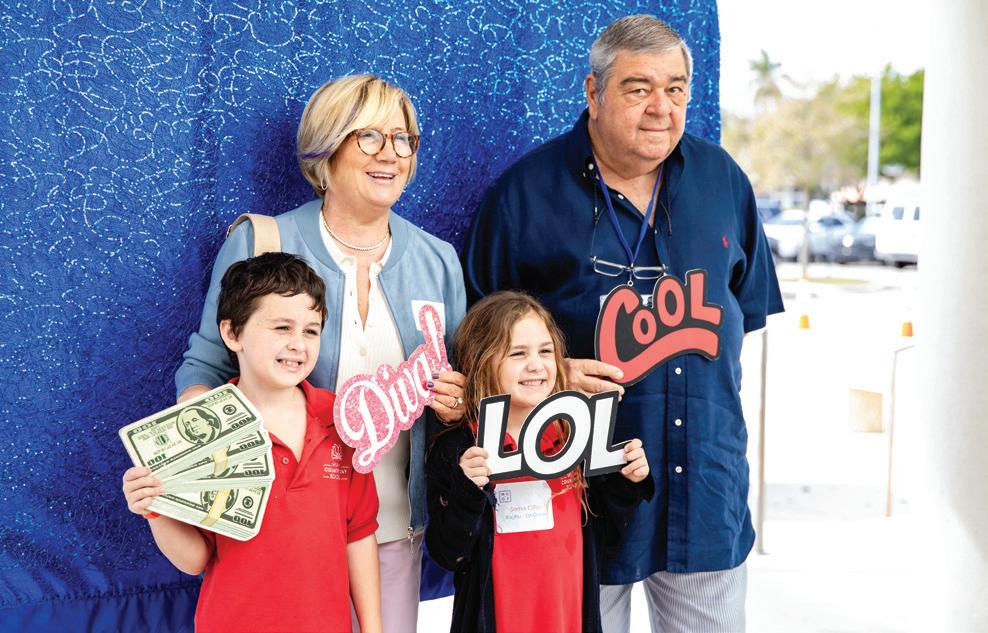
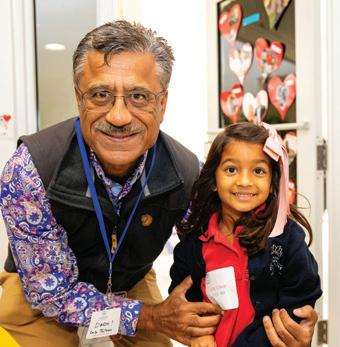
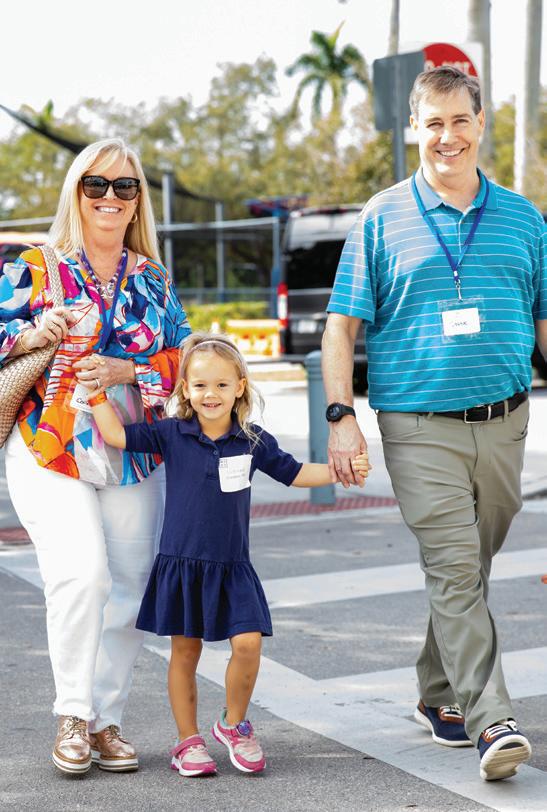
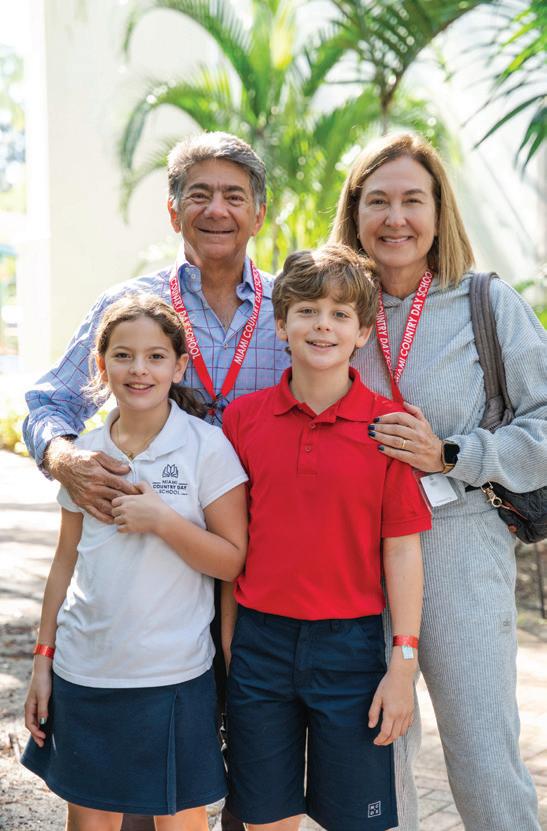
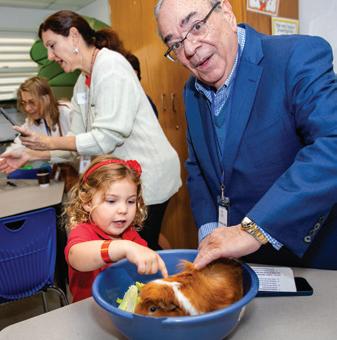
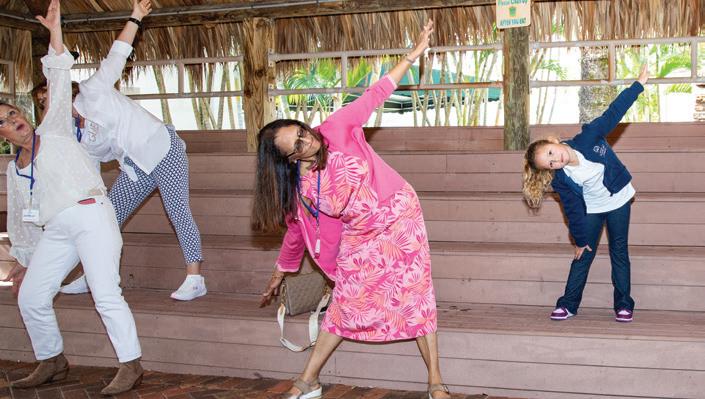
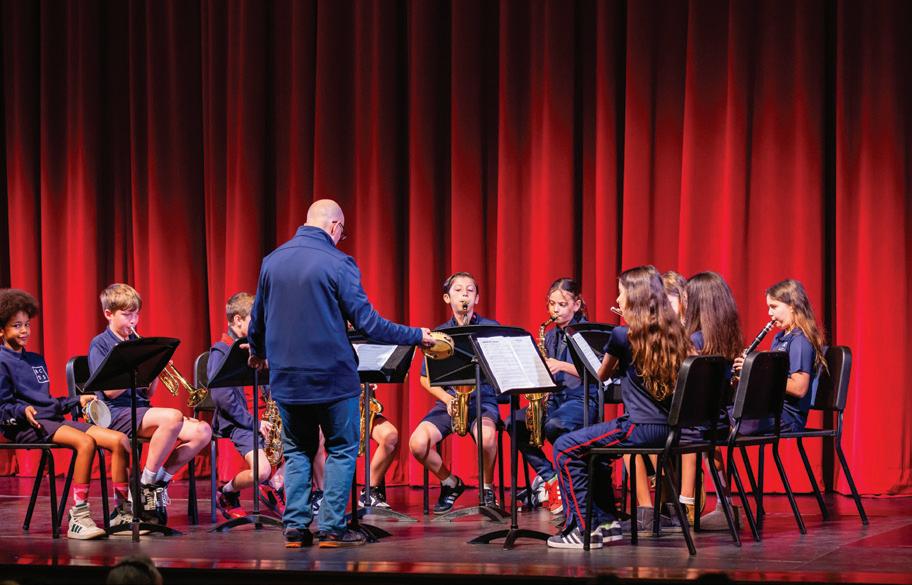
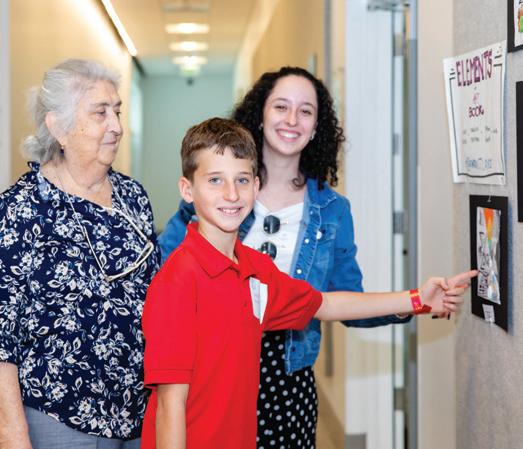
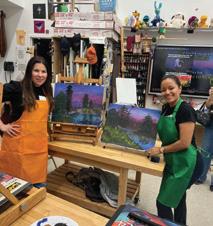
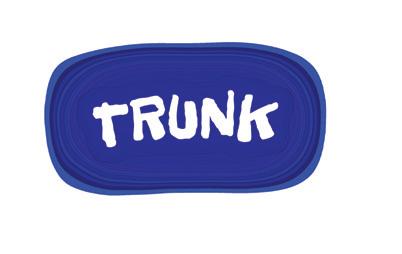

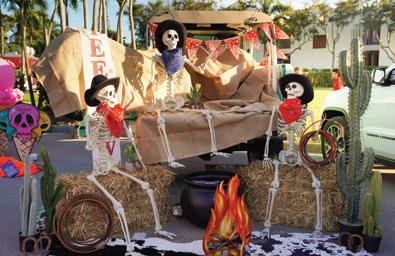
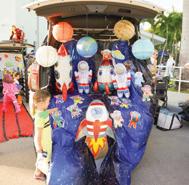

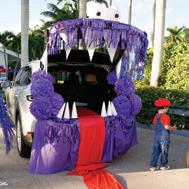

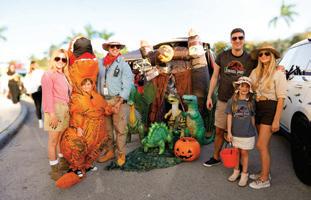
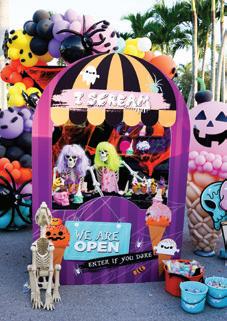

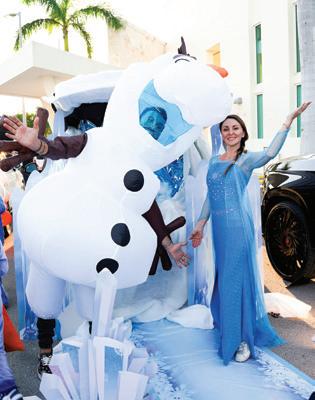
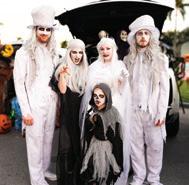
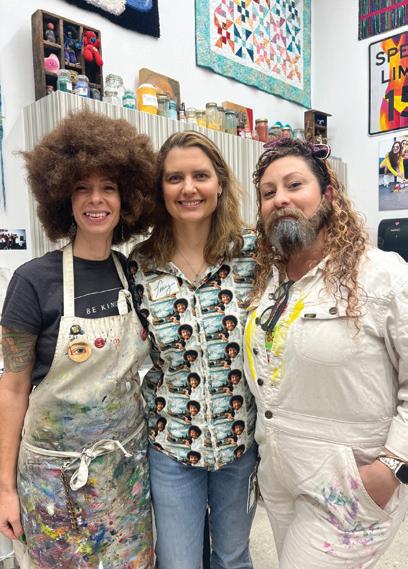

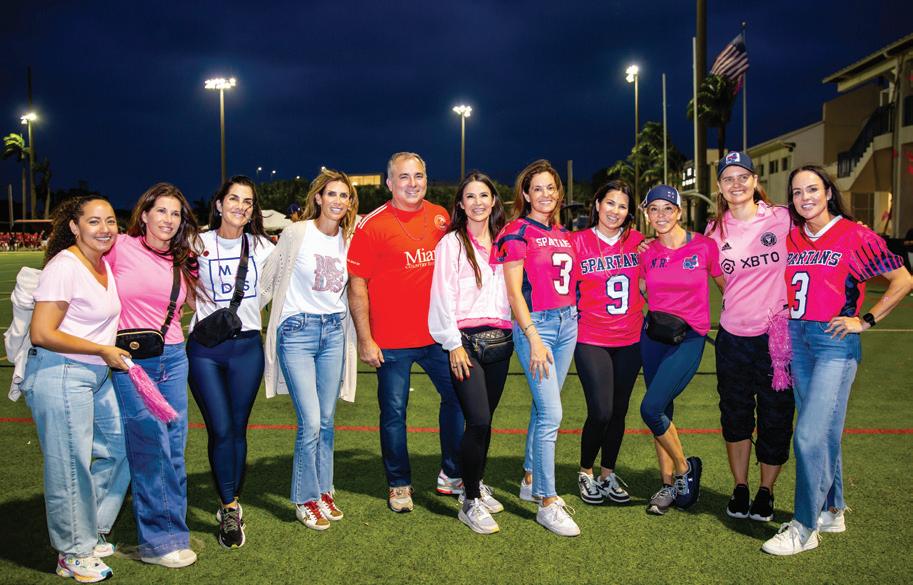

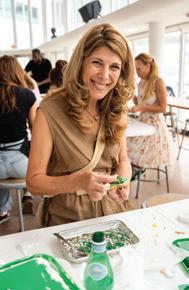

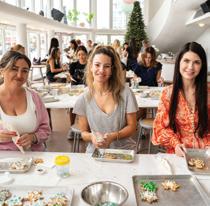
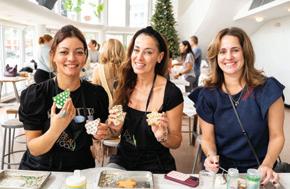
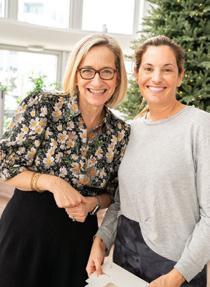
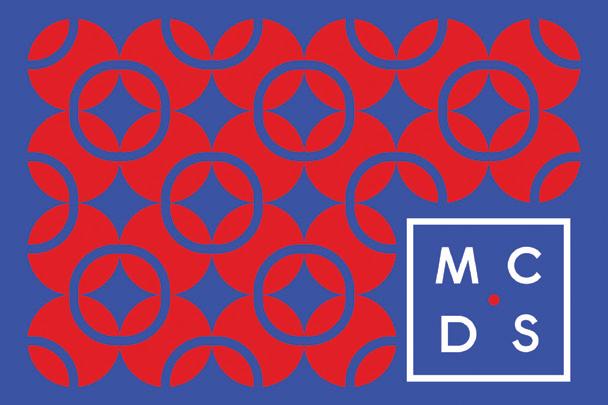
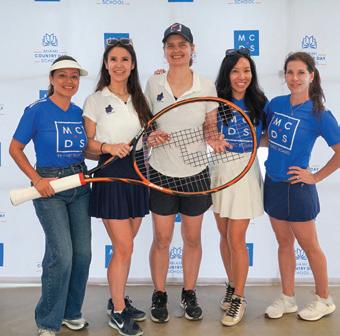

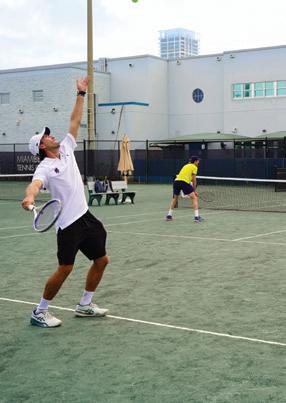
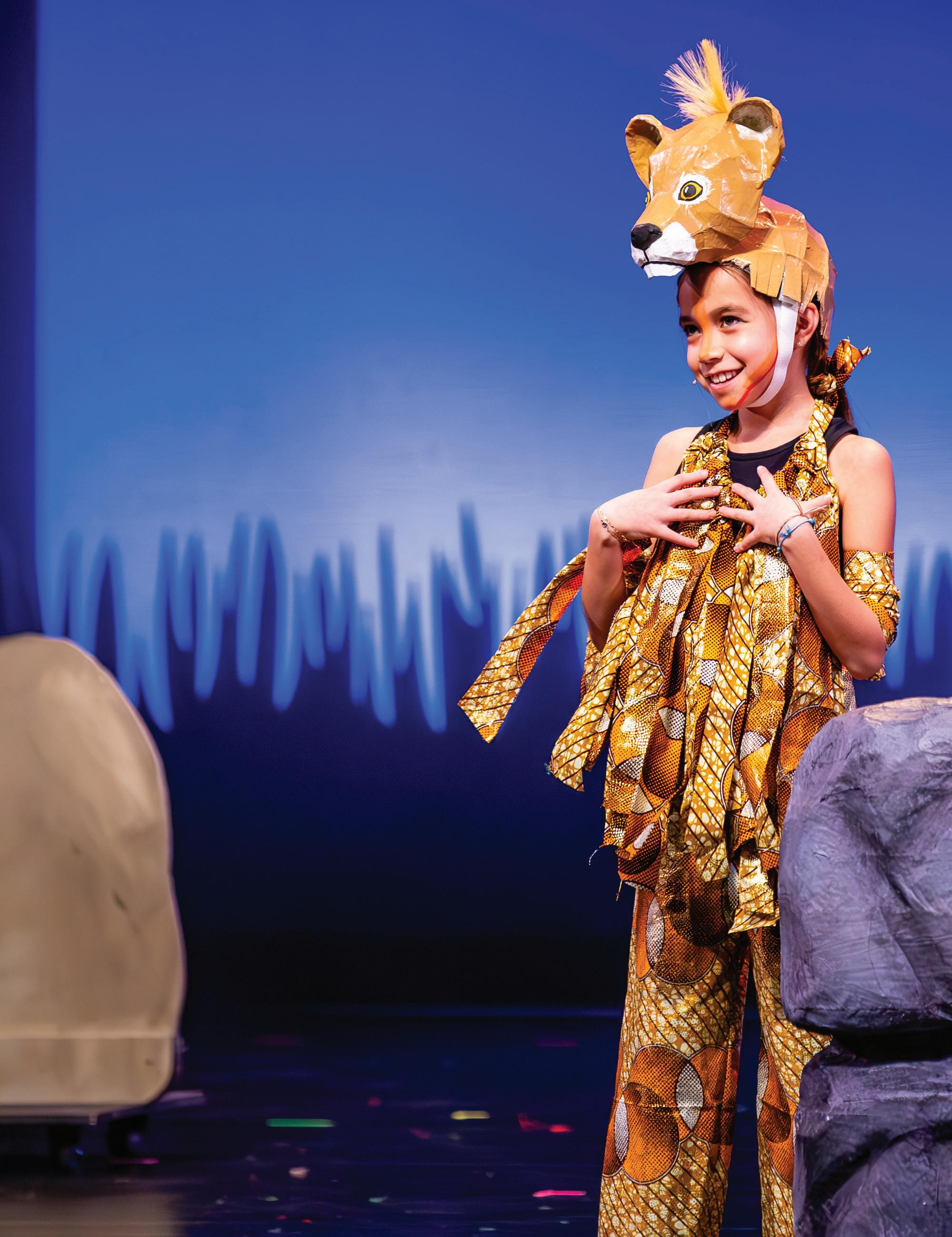
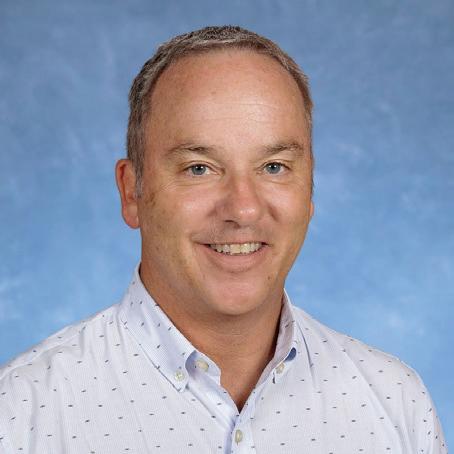
Glen Turf Chief Officer for Global Initiatives, Equity, and Belonging
Miami Country Day School has long believed that education takes place both in and outside the classroom. Understanding other cultures, learning new languages, and appreciating traditions other than our own are essential parts of the Miami Country Day School experience. It lives in our mission and is our north star, as doing anything less than preparing our students to be global citizens would be a disservice in readiness for life beyond MCDS. We are a model, and that is why for three days in April, over 400 educators descended on Miami to learn best practices in the field of global education, travel, and honoring all identities.
Between April 3 -5, Miami Country Day School proudly served as the host of the 12th annual Global Educators Conference sponsored by the Global Education Benchmark Group. GEBG (recently rebranded as the Institute for Global Learning),
chose MCDS as the site for this year’s conference because of its commitment to all things global - from curriculum to travel and everything in between. This conference annually attracts global educators from all around the world and is the flagship professional development opportunity for educators who commit to expanding the horizons of our students so that they understand the importance of global interconnectedness. Just under 400 schools are members of GEBG and Miami Country Day School’s Chief Officer for Global Initiatives, Equity and Belonging, Glen Turf, sits on the Board. MCDS is also one of ten schools worldwide to have received GEBG’s prestigious Standards Endorsement for its commitment to and execution of best practices in the field of global education.

Attending the annual global educator conference is a way to connect, share, and reflect on how to bring the world to our students and our students to the world. With over 400 educators from as far away as New Zealand in attendance, Miami Country Day School was a hub of global learning for three days. The conference kicked off with two local keynote speakers who celebrated the special place that is Miami and South Florida, not for its beaches and glamor, but its commitment to being a home for all. Ms. Tania Francois, an Emmy Award-winning journalist focused on her HaitianAmerican heritage and how, growing up as a first-generation American, she constantly faced a push and pull between her two identities. She regaled the audience with stories from her childhood and, in doing so, provided the audience with an introduction to the myth and reality of immigrants here in South Florida. Ms. Francois shared the opening night’s spotlight with Mr. Luca Martinez, a National Geographic photographer committed to showing the Everglades as you have never seen it before. As a sophomore at FIU, Mr. Martinez has already made a name for himself in his commitment to preserving our natural resources. In his lively presentation, he used storytelling to evoke emotions about why we must all do our part with the environment that surrounds us. The evening was a perfect introduction to why the world needs to pay attention to South Florida as a microcosm for global events and issues.
Other keynote speakers throughout the conference included author and former Ambassador for Young People’s Literature, Ms. Meg Medina. As a Cuban-American author with ties to South Florida, Ms. Medina felt right at home at MCDS. During her chat with Glen Turf, Ms. Medina expressed the importance of celebrating and telling the story of one’s identity while always striking the balance to do so in a non-stereotypical manner. When asked about how best to do this, Ms. Medina said, “You tell the story of the person, not a group of people.”
As the final keynote speaker, former mayor of Miami Beach, Mr. Dan Gelber, recounted the work that he did as mayor in helping Miami Beach to combat sea level rise. In recent years, GEBG has increased its focus on climate action, and Mr. Gelber’s words tied right into this work. Explaining the multitiered approach that our local governments have taken to help our communities stay dry, Mr. Gelber demonstrated how science does not know politics and how, as witnesses to rising water, there is no other option but to act.
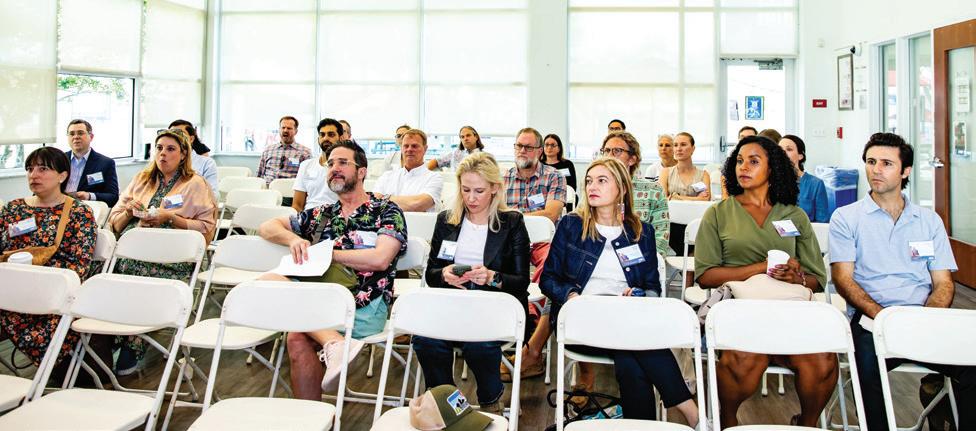
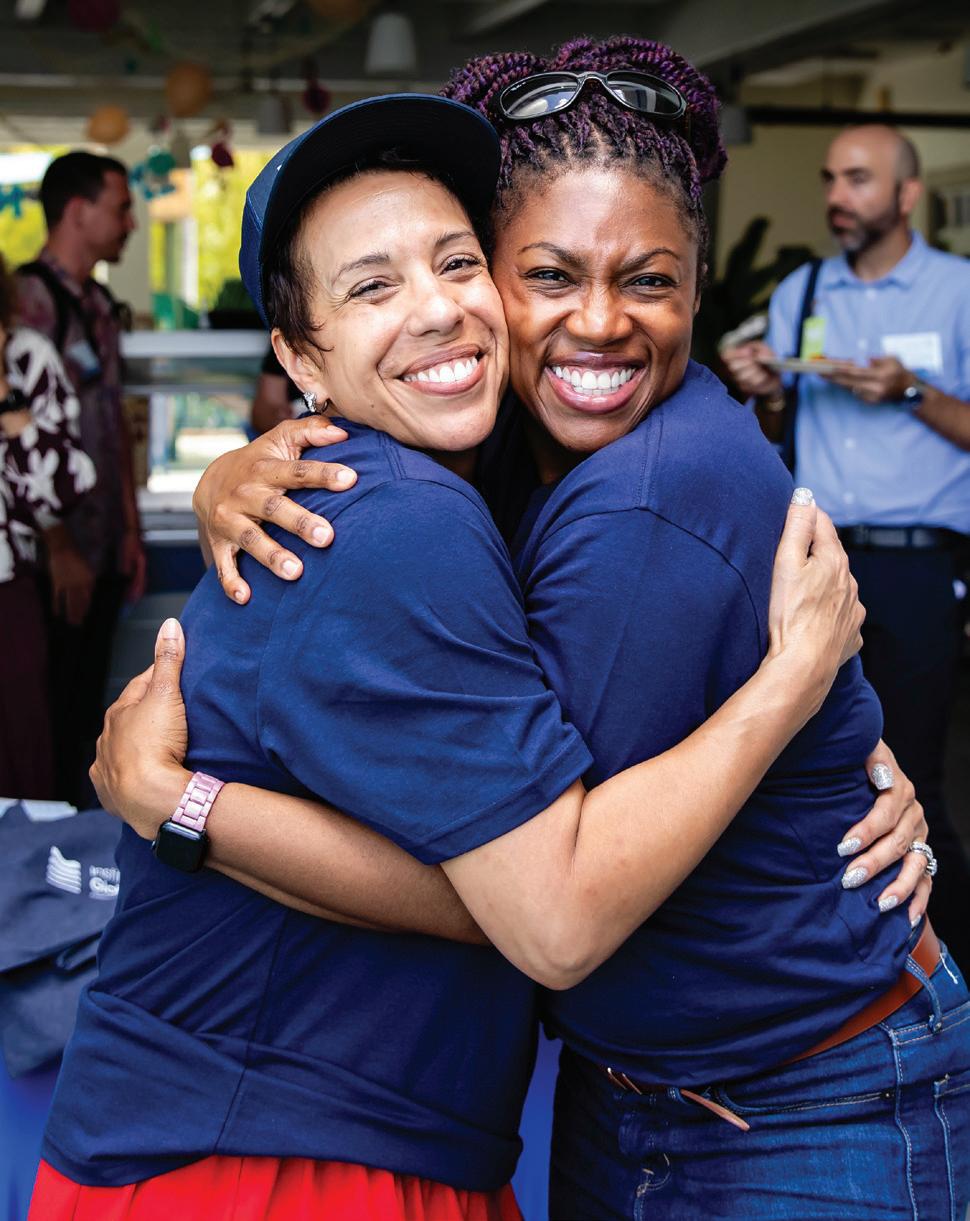
As the saying goes, “The best way to learn is by doing,” and that is how educators enhance their craft. During the 3-day conference, global educators from GEBG member schools presented 48 breakout sessions all designed to provide learning opportunities from experts in the field who do the work day in and day out. These sessions highlighted the work being done in 5 fields: action research, curriculum and assessment, empowering students, program and risk management, and strategic initiatives. These sessions proved to be extremely engaging and fostered a spirit of collegiality and sharing among colleagues.
Of course, MCDS’ educators were eager to share their work in the field with their peers. Parenting on “The DNA of Global Citizenship: A PK3-12 Passport to the Word,” seven educators from MCDS discussed our school’s commitment to understanding oneself and others via the DNA of Global Citizenship, a multi-tiered approach to themes designed to create a comprehensive PK3-12 experience on this topic that is so fundamental to our school’s mission. With each strand of the DNA touching on a different grade-level theme, MCDS’ seven presenters showed how the work can be organic and seamlessly woven into all aspects of the Spartan experience through innovative teaching and programming. As one attendee said, “Attending this session was worth the plane ticket itself!”

No gathering in Miami would be complete without the sounds and tastes of the 305. In addition to the abounding variety of educational opportunities offered to conference attendees through workshops, networking events, and keynote speakers, MCDS put on quite a party as only MCDS would do. Conference attendees were treated to multilingual student performances by students, greetings in the three chosen languages of the conference (English, Spanish, and Haitian Creole), a flamenco performance, a capoeira exhibition, and a photo booth for memories. The festive environment complemented the conversations, reflecting, and sharing among colleagues and highlighted the uniqueness that is South Florida. As an attendee said, “This conference has surpassed my expectations. You’ve gone above and beyond to highlight this community. I want to live and work here!” Of course, MCDS’ very own Sage Dining was eager to be an integral part of the event and kept everyone full and happy with its focus on international cuisine. With Latin music filling the venues, the entire team at MCDS put on a show of hospitality and openness that sent everyone home with smiles and beaming with Spartan pride. As one GEBG board member said, “I don’t know why we need to look at any other future conference site. We should just have the conference at MCDS every year!”

Being an international school does not just happen because of the people in it. Being global is intentional. It is our mission. It is our curriculum. It is our people and our mentality. Over the years, Miami Country Day School has made global education a core of what it does because it understands how our students will reap the benefits of this endeavor. As Glen Turf always says, “A stamp on your passport does not make you a global citizen. It’s what you do to impact others. It’s how others impact you.” As a host of the GEBG conference, MCDS lived this mantra and, for a brief period of time, was the one who made it all possible for others who dedicate themselves to the work that is so crucial in everyone’s development as global citizens.
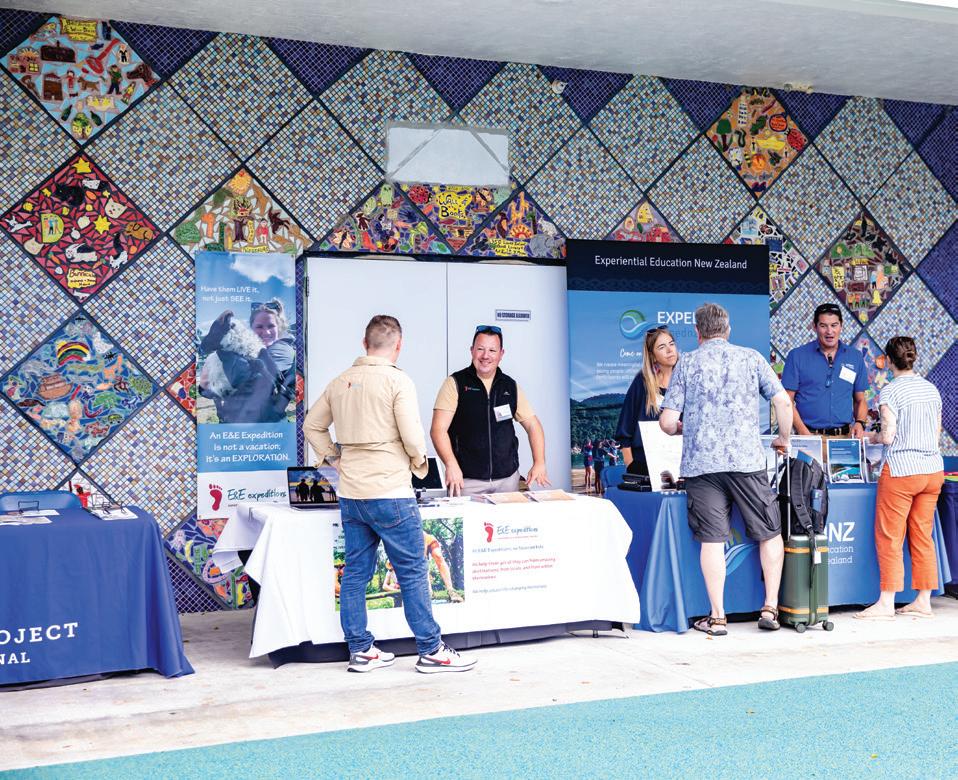
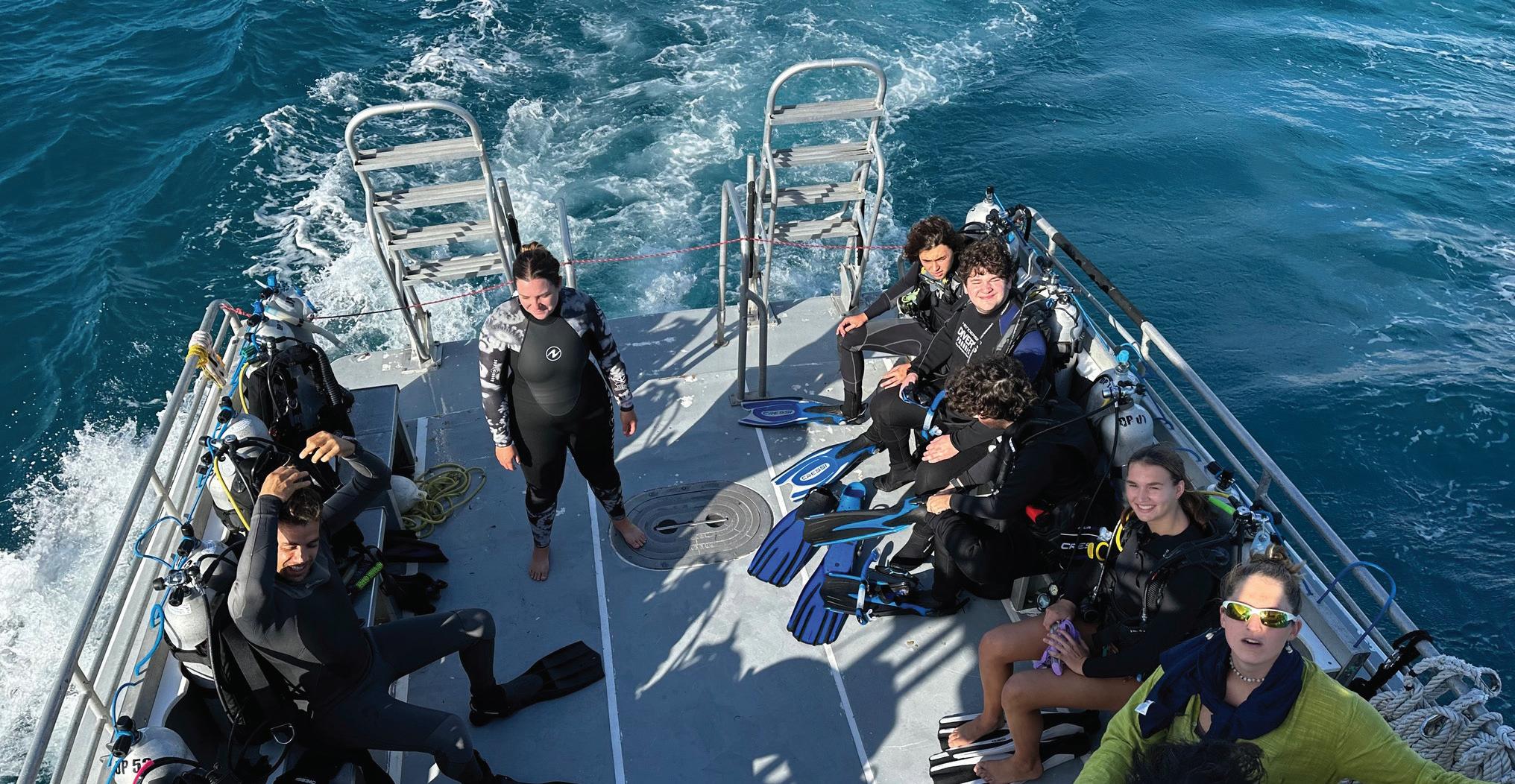
By Andrei Steyn ‘26
My passion for the environment began at an early age when I was living in New York and developed further when I moved to Miami. Specifically, throughout my life, I have been especially interested in advocating for coral preservation. As such, I had worked with groups such as Miami Waterkeeper and NOAA, and gone in front of the Miami-Dade Board of County Commissioners.
However, I quickly realized that participating in one-off events and advocating as an
individual didn’t allow me the impact that I had hoped. That’s when I realized that I needed to look broader than myself. I needed to get my community involved, not only in regards to educating students about these vital issues, but to help create the next generation of advocates.
Roughly two years ago today, I was hit with an idea. Driving home after a successful reef restoration SCUBA dive (stuck in slow Rickenbacker Causeway traffic), I was thinking about how to be able to let my school
and my broader community become more engaged in and learn about the important work of preserving our oceans, and environmentalism as a whole. That’s when I first got the idea of Students For Coral Preservation.
Albeit a rough outline, I knew what I wanted to do, but didn’t really know how to accomplish it. I wasn’t sure what activities I would actually want to do, where to get membership, or how to begin. Unsure of what to do next, I brought my new idea to school, and was able to connect with my advisor
about it, who referred me to Mrs. Robert. Despite having never talked, and being a busy administrator, I was lucky to be met with nothing but support and interest. I believe that sums up the whole-child philosophy and the Miami Country Day ethos as a whole. The fact that a faculty member would be willing to dedicate such a substantial amount of time to help direct a project such as this, to not only be a faculty sponsor but to actually be a mentor is what makes the country day difference. Miami Country Day has empowered
me to take the idea I had, give me room to grow and incubate it into a club on campus, and the freedom and guidance to create a true, not-for-profit coalition of over six schools and universities across Miami.
Starting from the beginning, MCDS was able to help me shape my vision with purpose. The rough outline I brought to the table was to have a science/lab based project where I would do hard science. However, I quickly realized that wouldn’t allow me to have the true impact I wanted for my community. Thanks to MCDS’ flexibility and support I was able to quickly pivot into the advocacy organization that Students For Coral Preservation is today. After I had decided, my next step was to get students involved and to grow our presence on campus and beyond. Our first real opportunity for this was our first speaker event with our lead science partner Colin Foord, a marine biologist from Coral Morphologic. I truly couldn’t have been happier with the outcome. From making posters, to ordering pizza, to helping make sure we could use Smurfit Hall in the middle of Homecoming week, the diligence and assistance from MCDS was truly spectacular. However, (almost) more than that, the MCDS community truly showed its support for this
belief, over 30-35 kids showed up despite simultaneous homecoming events, showing just how passionate and interested students were in for this idea. After our first successful speaker series, and seeing just how many students were interested, we started to cement our presence on campus. Inspired by this support, SCP continued to grow, from that point SCP has grown to a coalition of students from 5 other local high schools and one university within South Florida, with MCDS being the center of our hub-and-spoke model.
As the year went on, our organization realized that our impact needed to extend beyond one off events and speakers. We realized we needed something lasting and meaningful. After discussing and going over it with our science partners at Coral Morphologic, we came up with our coral tank and its internship. Directly from the beginning, we knew the home for this would have to be at Country Day. Not only were we sure it would be well taken care of and maintained, but there could be no better place for it than our own Abess Center for Environmental Studies (ACES). While the school didn’t fund my project, they instead helped find it a home and worked diligently to ensure that it
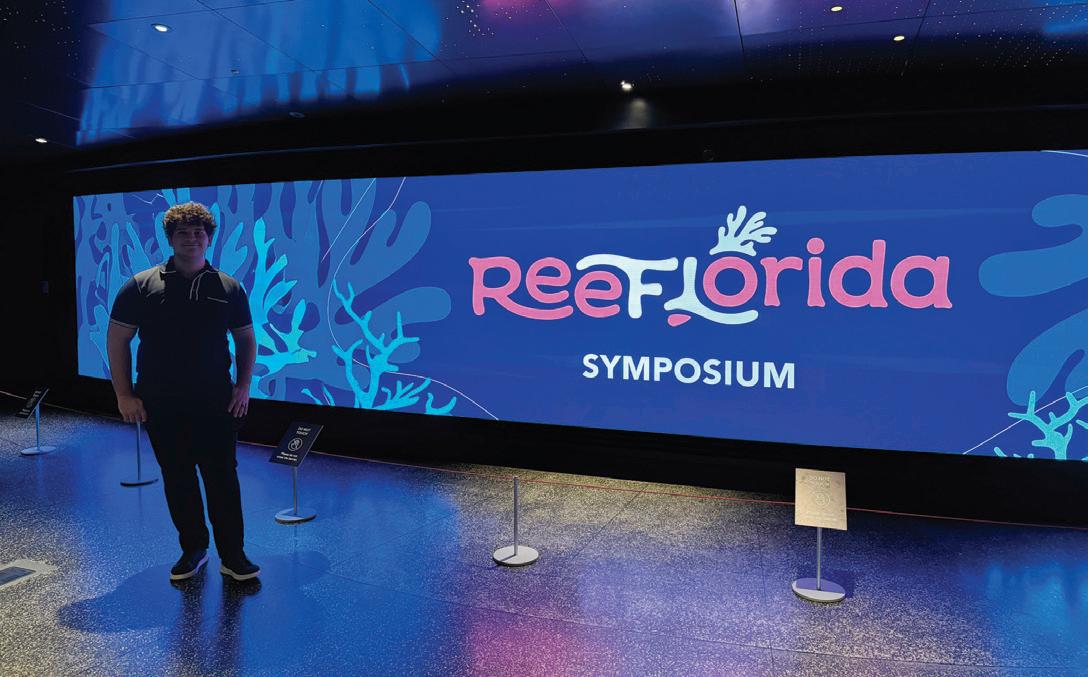
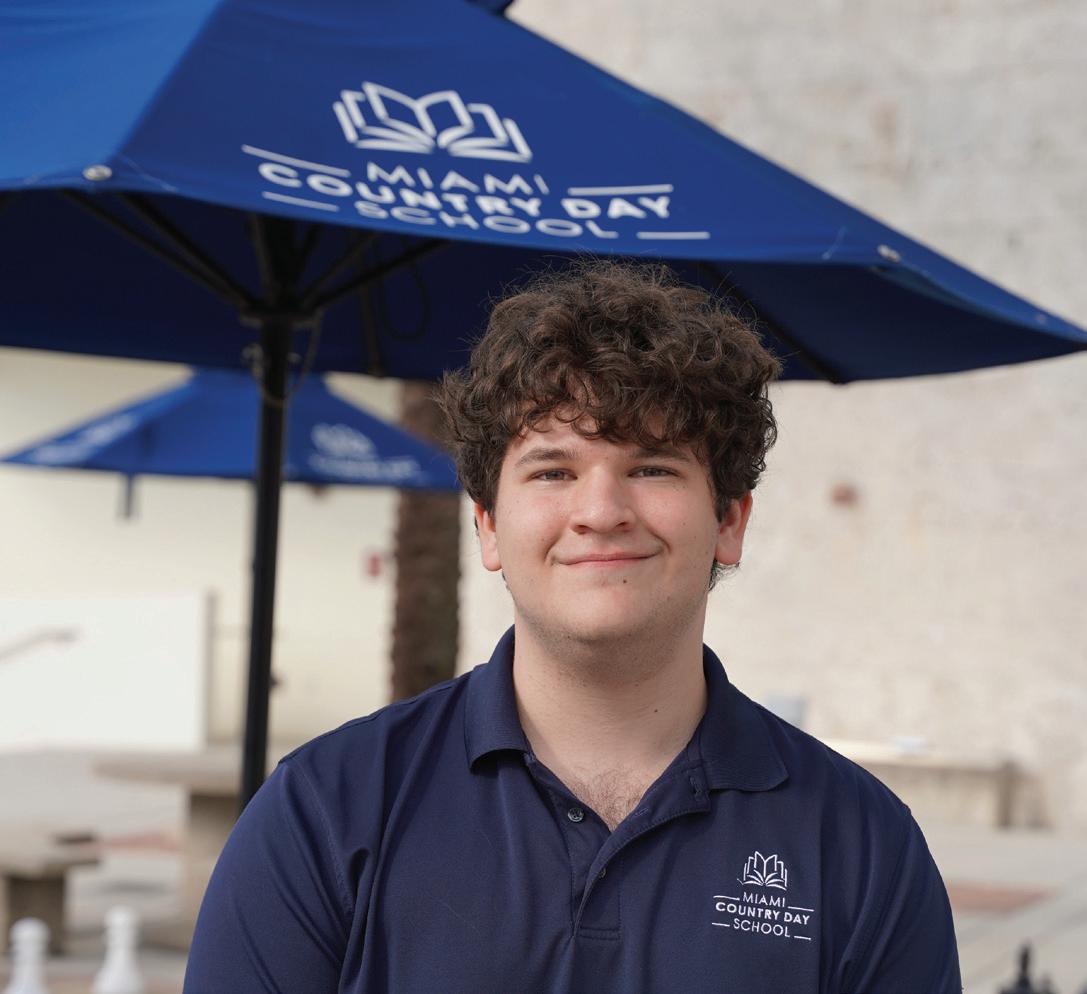
came to fruition. I once again must say that is what makes Country Day different. While the school won’t complete the project for students, those who want to make a difference are empowered to do so.
Miami Country Day’s attitude of fostering the spirit of creativity and leadership within the safe environment of school is what makes MCDS a unique and special learning community. I have been continuously supported throughout my journey, but I have also been given the freedom and space to chart my own course, to deal with issues and learn from mistakes. For example, our first attempt at installing our Coral tank was unfortunately dropped and cracked during its installation. Not only did the school volunteer to house the broken tank for as long as was needed, but Ms. Bovio and Ms. Robert gave time after school and on multiple weekends to ensure that it could be rectified.
I’d like to close by reiterating how thankful I am for MCDS for the support they have given me throughout this journey. Not only did I find a home
for my project, but I found a community that helped me take an idea I had and run with it. I found a community that supported me along every step of the way, a community that let me explore, and learn about leadership and service. Even as I eventually graduate and move on to college, I am happy knowing that my MCDS community will continue what I have started, that the next generation of advocates and environmentalists will have the same support and ability to be able to stand up for what they believe in. I believe MCDS is one of the few schools where this is possible, and for that I am truly grateful.

By Samuel Brown
Upper School Humanities Teacher & GIEB Coordinator
When Jack Eaton ‘25 attended his first Model United Nations conference in 2022, he was the neophyte, the only ninth grader on his committee, and it was also the first in-person conference for the club in a year. He had “no sense whatsoever” what he was getting into, he remembers. But in Model UN, he says, “getting thrown into it” is how one truly learns.
Standing beneath a ceiling of vibrant stalactites in the Human Rights Council meeting room at the UN headquarters in Geneva this January, Jack greeted delegates from 18 countries in French and English. He introduced them to Miami Country Day School and shared how we live our values of global citizenship through innovative and experiential learning. He went on to say:
Attending this conference is a testament to the growth and resilience of our MUN program. If you had told me as a freshman that four years later, our school would be at one of the world’s most prestigious MUN conferences, I wouldn’t have believed it. At that time, our club had few members and even sending a small delegation for a local conference was a challenge. But with determination, word of mouth, and of course some positive peer pressure, our membership started to grow. By the next year, we had doubled our members and attended major conferences at Harvard and Georgetown, which helped establish us in the MUN community. Today we are proud to have over 100 active members.

At the Geneva conference, another MCDS delegate, Ben Rosas ‘25, who represented the workers of Brazil, served as the presenter of his bloc’s plan to improve conditions for migrant workers, with the objective of gathering votes in support of their resolution. Ben, like most of us, relied on interpreters at the conference. He earned his spot at the dais through persistent negotiation and communication with his fellow delegates.
Attending the conference in Geneva was also a first for our delegates in that, like most European conferences, awards are not presented at closing ceremonies. While the emphasis is on learning through participation and multilateral cooperation, as well as getting a taste of life on a college campus, our delegates have won significant recognition over the years, at travel conferences like those Jack mentioned in his speech as well as local conferences. Less than a month after our return from Geneva, at the University of Miami for his final high school conference, Jack contributed to that tradition by earning the highest honor given at North American conferences, the gavel for Best Delegate in his committee.
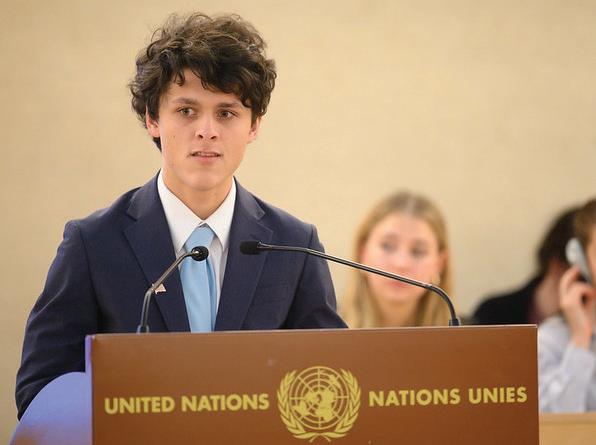
For Maria Fraga Cordeiro ‘26, who serves on this year’s student board with Jack, the conference offered a chance to “immerse myself in other cultures and experience MUN in a different country – an exciting challenge.” The trip also included a first-day visit to the U.S. Mission in Geneva, which, Maria shared, “shed light on how diplomacy plays out in the real world” and sparked ideas that she was able to apply to her committee that week.
Such opportunities to speak with real-life diplomats and subject matter experts are a key element of the club, with speakers each year that have included the current UN communications team for the General Assembly President, a former project manager with the UN Population Fund, the local Refugee Assistance Alliance, and subject matter experts in US-China relations and modern Japan. The MCDS parent community has shared their expertise and wealth of contacts to support students’ learning through speakers many times over the past few years. On a related note, students who went to Geneva spent a preparatory weekend at FIU, gaining useful practice and tips from the school’s nationally-ranked collegiate MUN team. MCDS Model UN sponsor Hiram Rosas worked with Shlomi Dinar, parent of club member Issa Dinar ‘24, and Dean of the Green School for International and Public Affairs, to set this up.
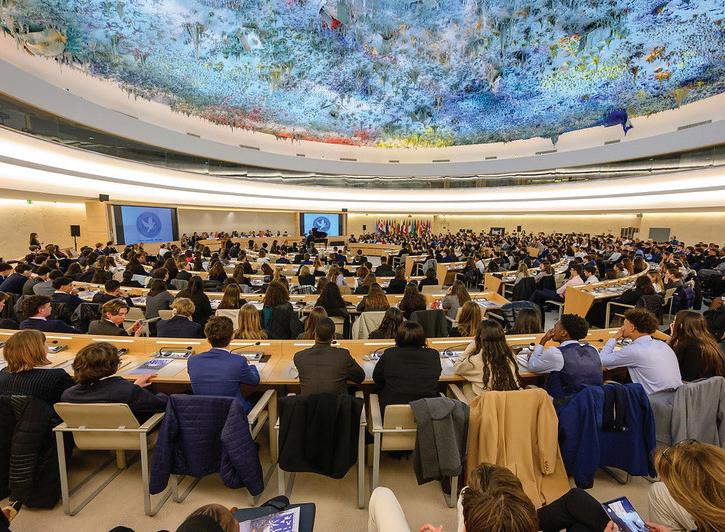
Closer to home, Arabella Gutchess ‘25 remembers her local conferences fondly as well, going back to ninth grade year when “the older members made me feel welcome and prepared me for my first conferences.” This year, she enjoyed pairing with a younger member for the dual-delegate conference at Miami Dade MUN, and observed how her “excitement and eagerness to learn reminded me a lot of my first conference.” The Miami Dade conference this year was a full-circle moment in another way as well, with the Secretary General of the conference, current University of Miami student Zak Djahed ‘23, sharing the story of his MUN journey in his opening remarks.
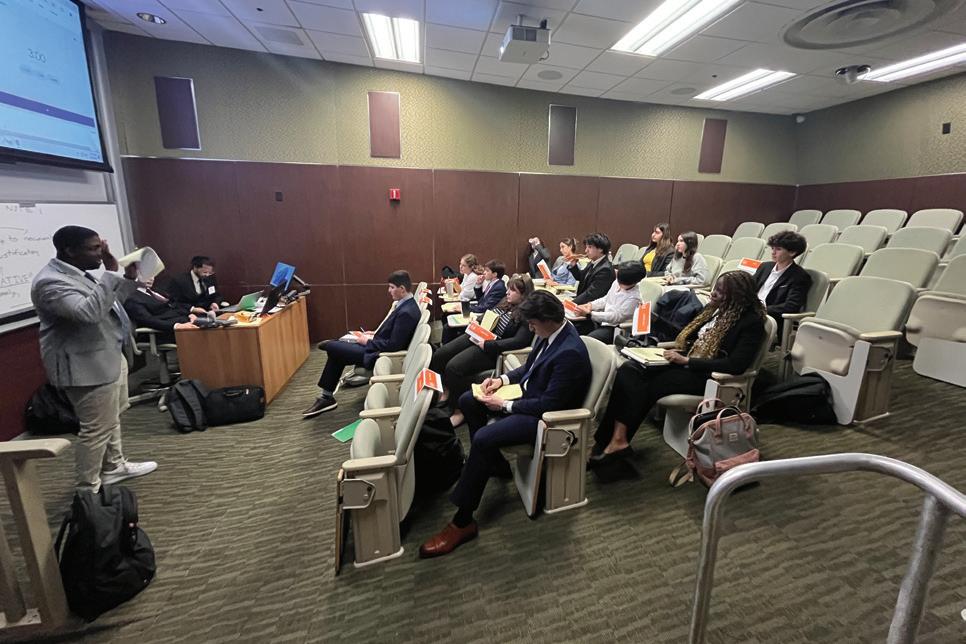
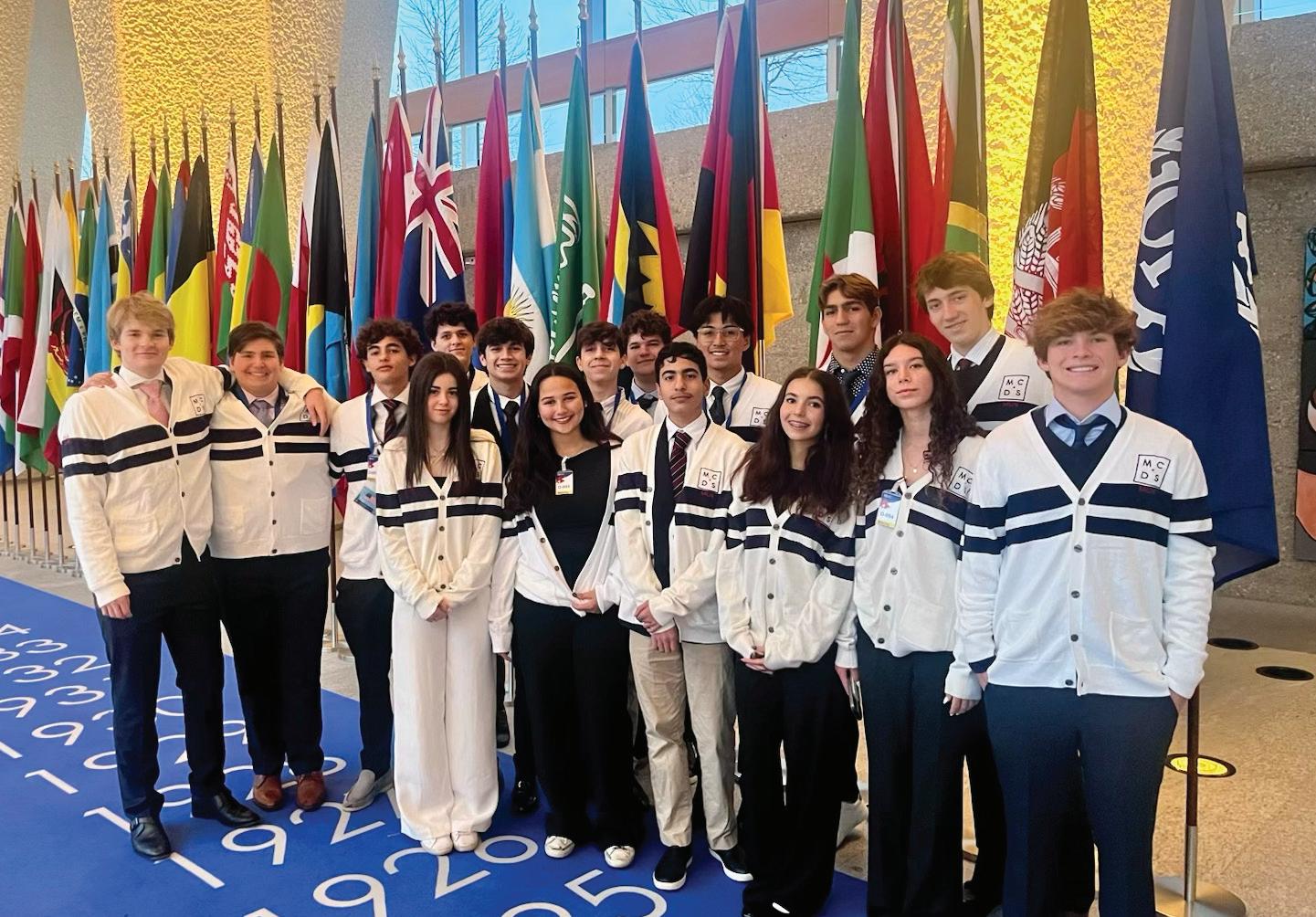
MCDS Model UN has grown in its openness to new members by creating opportunities to prepare for and attend their first conferences, understanding that not everyone will want to devote days straight to practicing diplomacy with a roomful of peers they’ve never met. MUN offers everyone, including students who are naturally quiet, the chance to practice public speaking and strengthen their social confidence. For Jack, as for other members we hear from, Model UN has been “really special in that it has the ability to create lasting relationships in and out of school.” Whether traveling by bus or plane, students from a range of backgrounds and social groups at school come together for a few days in the intense shared experience of their committees. Ultimately, Miami Country Day hopes to empower students’ growth as global citizens, and the exciting intellectual and social challenge offered by Model United Nations is exactly the avenue many of them need to do that.

Kevin J. King, CPWA®, CEPA®, CPFA™, CAP® Managing Director • Wealth Management Advisor The King Group 305.933.6237 • kevin.j.king@ml.com www.fa.ml.com/king-group 19495 Biscayne Blvd • Suite 700 • Aventura, FL 33180
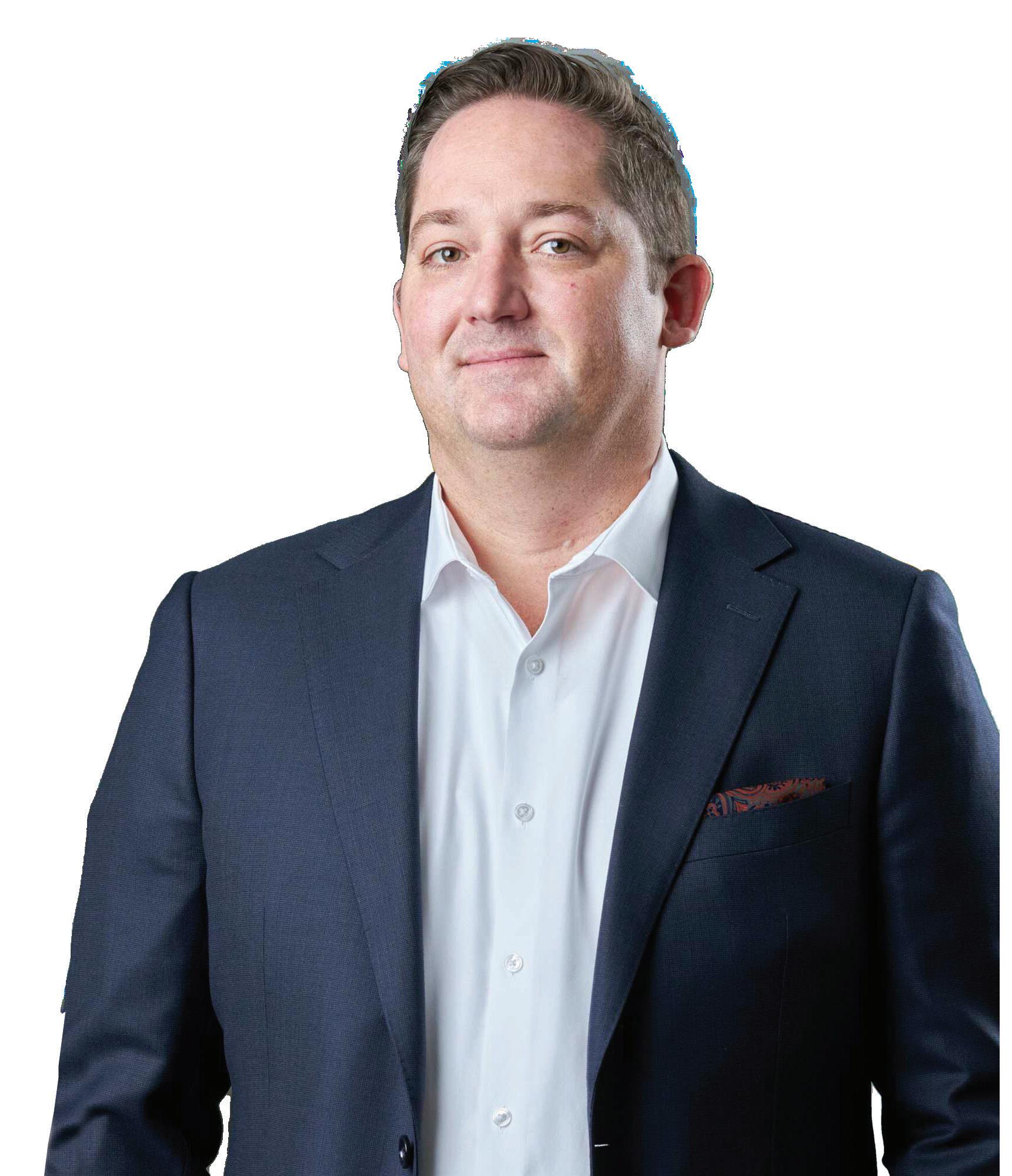
Kevin J. King: Forbes “Best-in-State Wealth Advisors”, 2023-2024 (Published annually Jan – April. Rankings based on data as of June 30 of prior year.) As an alum, parent and trustee, I am proud to support the Miami Country Day School’s Build the Legacy campaign. When you ’ re ready to make an impact, we are ready to help.
Merrill Lynch, Pierce, Fenner & Smith Incorporated (MLPF&S) is a registered

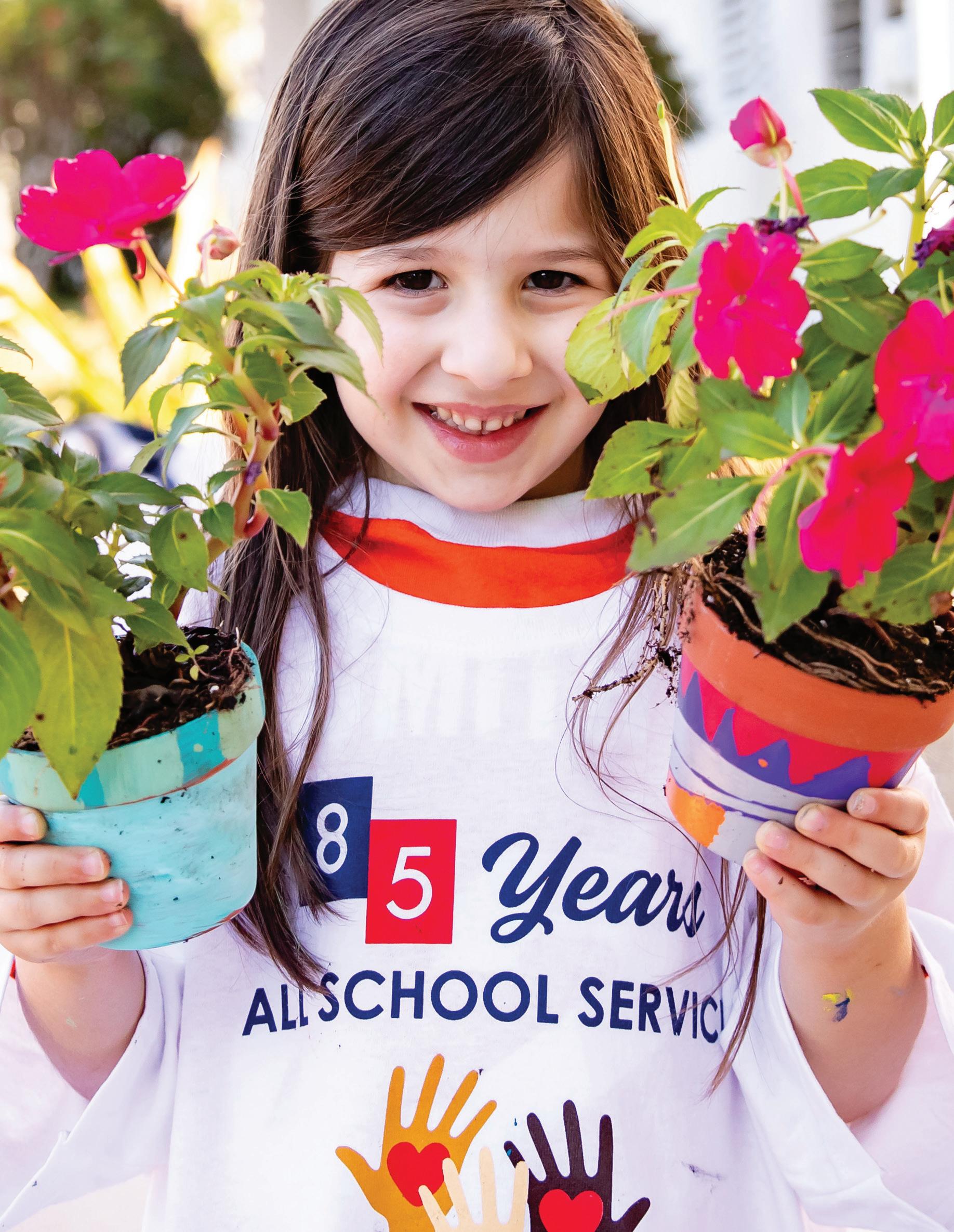

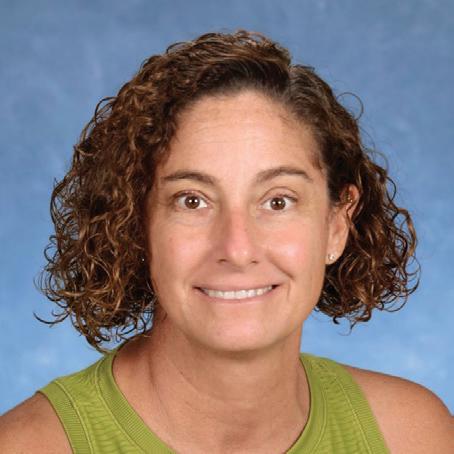
By Jennifer Sennett
Physical Education Department Chair Community Service Coordinator
The Woodhouse Athletic Center is a state-of-the-art facility for scholar-athletes and a cornerstone of Miami Country Day School’s commitment to wellness education for every student from PK3 through 12th grade. Designed to support physical, mental, and emotional development, the Center offers ageappropriate programming that evolves with students as they grow. Whether they are learning fundamental motor skills and healthy movement habits in the early grades or exploring advanced fitness techniques and mental resilience in upper school, students will benefit from a cohesive, wellness journey. A key feature of the Center is its integration of wellness into the academic day across all divisions. Upper School students will have access to new and reimagined for-credit courses like Introduction to Sport Psychology and Introduction to Sports Medicine which will lay the foundation for lifelong healthy habits. In both Lower and Middle School, students engage in movement-based activities and wellness lessons that build coordination, promote teamwork, and support emotional
growth. These early and middle-grade experiences cultivate an understanding of wellness that grows with each student and emphasizes that wellness is not a separate subject, but a way of life.
Upper School offerings like Jiu Jitsu, Yoga & Mindfulness, and Fitness for Life will help students explore physical fitness in new and diverse ways, while also equipping them with strategies for managing stress and building mental clarity. These courses meet students where they are, whether they are athletes looking to improve performance or newcomers seeking an active lifestyle.
Mental wellness is also a vital component of enhanced programming. The Woodhouse Athletic Center provides a space where students can address stress, develop coping skills, and explore the psychological side of performance

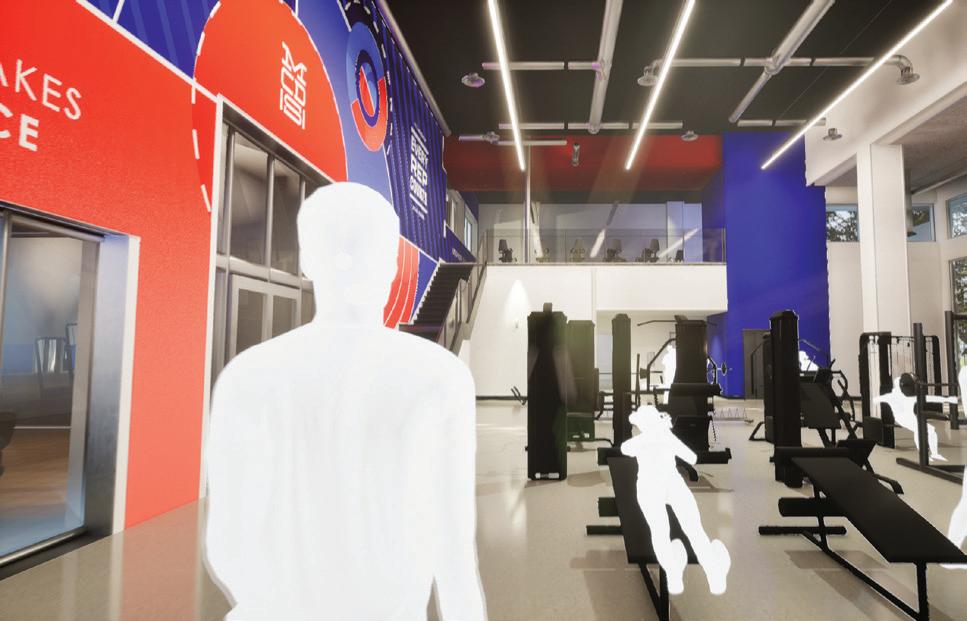
because we know that these tools are just as valuable in a classroom as on a sports field. For students in the Lower and Middle School divisions, this focus begins with foundational practices in self-care, fitness, and active play to build confidence and emotional well-being.
The Woodhouse Athletic Center will serve as a gathering space that fosters community and Spartan pride, bringing students of all ages together to build connections and support one another in their wellness journeys. As a cornerstone of Miami Country Day School’s PK3–12 commitment, the Center reflects an investment in the holistic development of every student. By integrating wellness into daily life, the Center helps students develop the skills, habits, and mindset needed to thrive now and into the future. It is more than a fitness facility—it is a catalyst for health, resilience, and community across the entire Spartan experience.

The Garner Moore Family represents a true legacy family for Miami Country Day School. Philanthropists who understand and have “walked the talk” for over eight decades with their support of the school. Guiding the family, siblings Anne Paulk, James W. Moore ’65 and Gerald W. Moore ’68, have been sharing their gifts of time, expertise, and donations contributing to the school’s transformation over the years.
Why did they and why do they continue to be supportive of an institution where they have no students enrolled, and it’s been 65 years since being on campus as students when Country Day was a boarding school for boys.
Q: What are the advantages of being a nonprofit independent school?
A: Freedom and agility to provide education that meets today’s students’ needs and provides opportunities to do more than teach reading, writing, arithmetic, and physical education. Technology and soon to be “AI” have changed the landscape exponentially and as an independent school, we can and must adapt quickly. Being independent helps the school stay competitive and responsive to the needs of both current and future generations of students.
Q: What have been the biggest changes you’ve seen over the years and how did those
changes come to be?
A: The influx of new families in South Florida since the pandemic has brought the school opportunities to expand its mission dramatically. The challenge now is to educate new families on the importance of philanthropy in enhancing and sustaining the school’s offerings. As a nonprofit, philanthropic support is key to meeting the expectations of our families and the changing needs of our students and teachers. It was philanthropy that provided for the changes I’ve witnessed over the years.
Q: What is the current operating budget, and can you explain
how it works?
A: The Finance, Investment, and Audit Committees of the Board meet regularly and focus on ensuring the financial sustainability of the school.
The school’s operating budget is over $60 million. A big number! Breaking it out, 51.9% represents teachers, students and staff. The budget for facilities includes 48.1% of expenses for security and property insurance, which is $2.4 million, as well as janitorial, grounds, capital projects, repair and maintenance.
Tuition alone at 81% of the operating budget doesn’t
cover the full cost of providing a high-quality education. There are ongoing expenses like teacher resources and professional development, continued efforts to enrich the overall student experience, building and maintaining facilities, funding health and property insurance, security, and all the extracurricular activities that support the mission and the school community.
Philanthropy is what makes it possible for Country Day to carry out the mission of the school and provide students with the unique experiences that are only possible at Country Day.

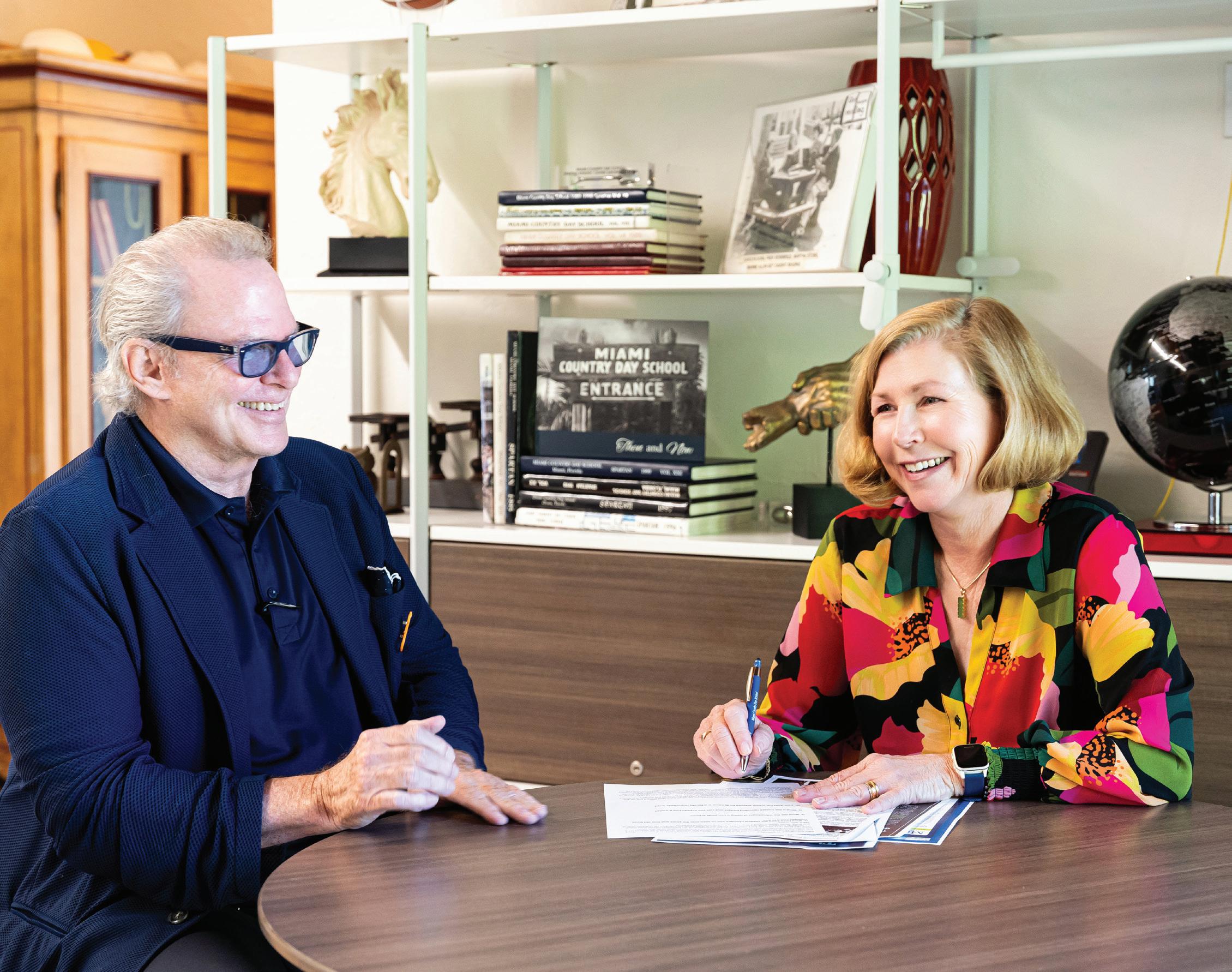
Q: How does the school prepare for its future in a fiscally responsible way?
A: Endowment is the school’s insurance policy and Country Day continues to work on growing that support. At the same time, the Spartan Impact Fund, campaign gifts, and planned giving are critical to funding all the programs and initiatives that make Country Day the school it is. Philanthropy helps fund scholarships, special programs, and advanced learning opportunities to ensure all students have access to the best education possible.
I continue to repeat my mantra, “Education is the solution to every problem on the planet,” and there is no “mission without money!” Our community can ensure that Miami Country Day is positioned to make a difference in South Florida. Our graduates already have influence locally and internationally, and each of us need to be proud of and supportive of our school in every way.
Miami Country Day School and its campus would not be what it is today were it not for The Garner Foundation
and the three generations of family members who attended the school. In recognition of their generous spirit and dedication to the school, the Board of Trustees named The Garner Campus on March 15, 2015, in honor of the family’s commitments and decadeslong relationship with Country Day.
The family’s relationship with the school began when Michael Garner, Class of 1949, Uncle of James and Jerry, enrolled in the Miami Country Day and Resident School for Boys in the 40s. The Garner Family
has been supportive of every annual and capital campaign effort, including the building of the Garner Center in the early 80s, leadership support of the current Upper School building, the current athletic center, the Franco Center, The Center for the Arts, and most recently, support for the new athletic center.
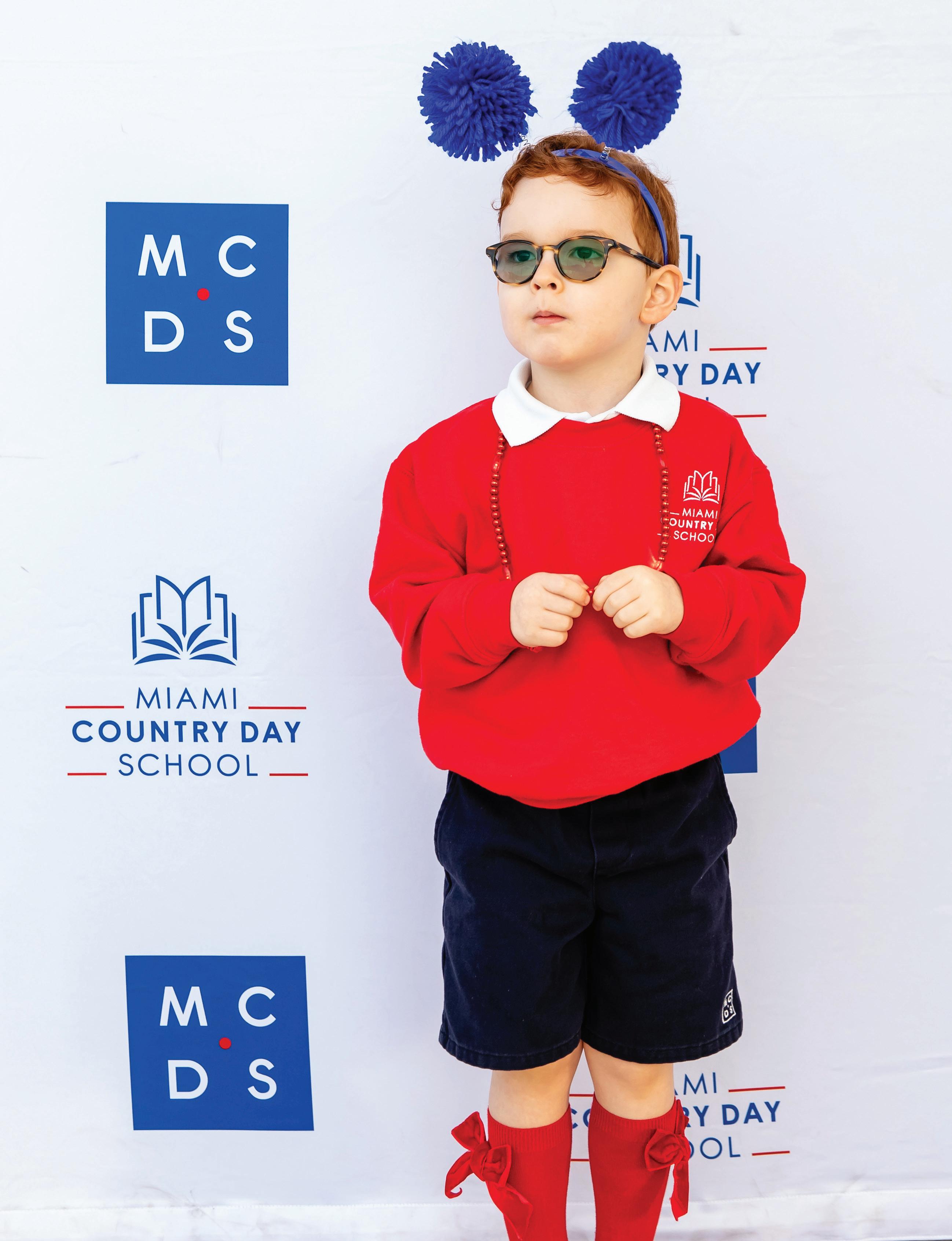
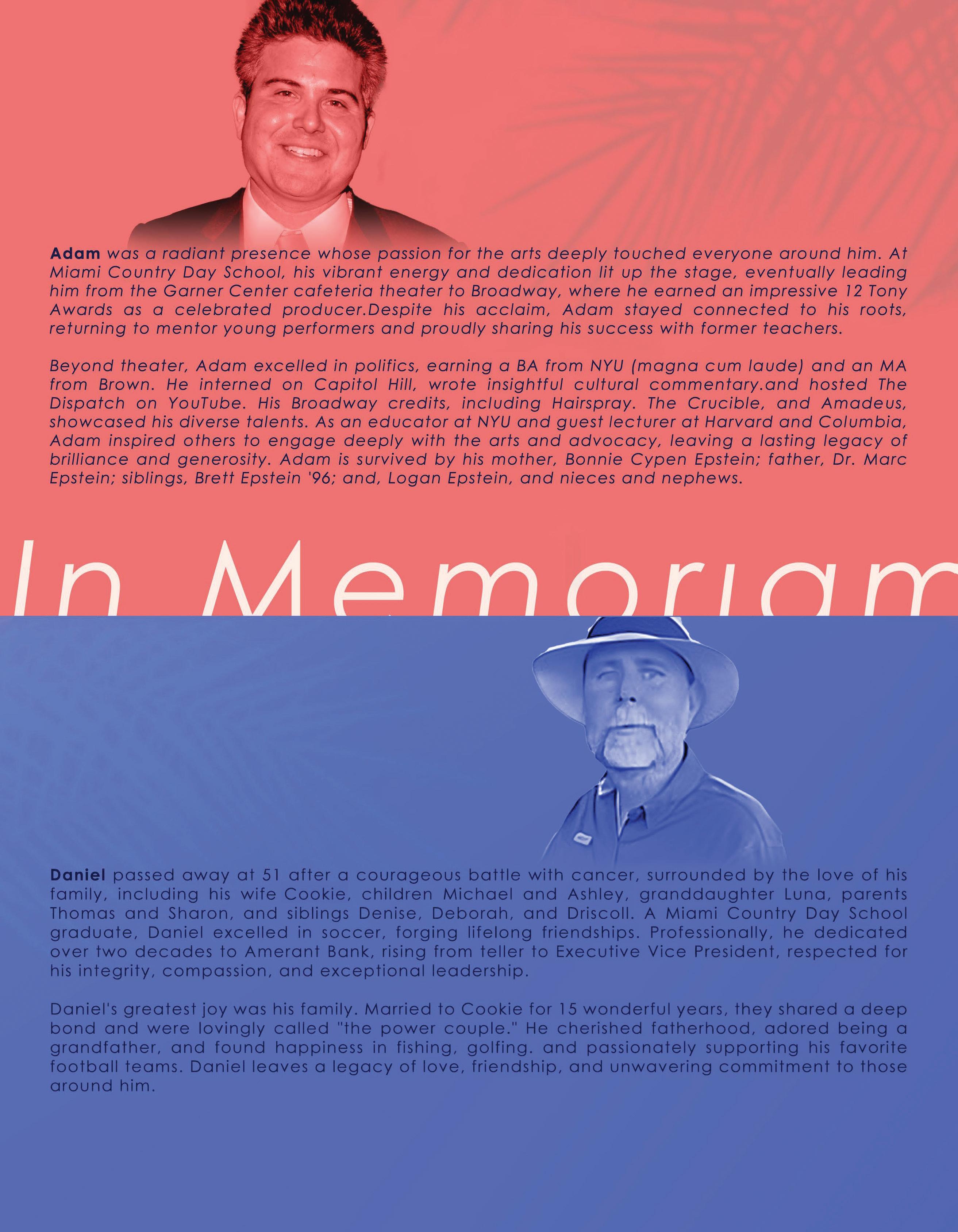

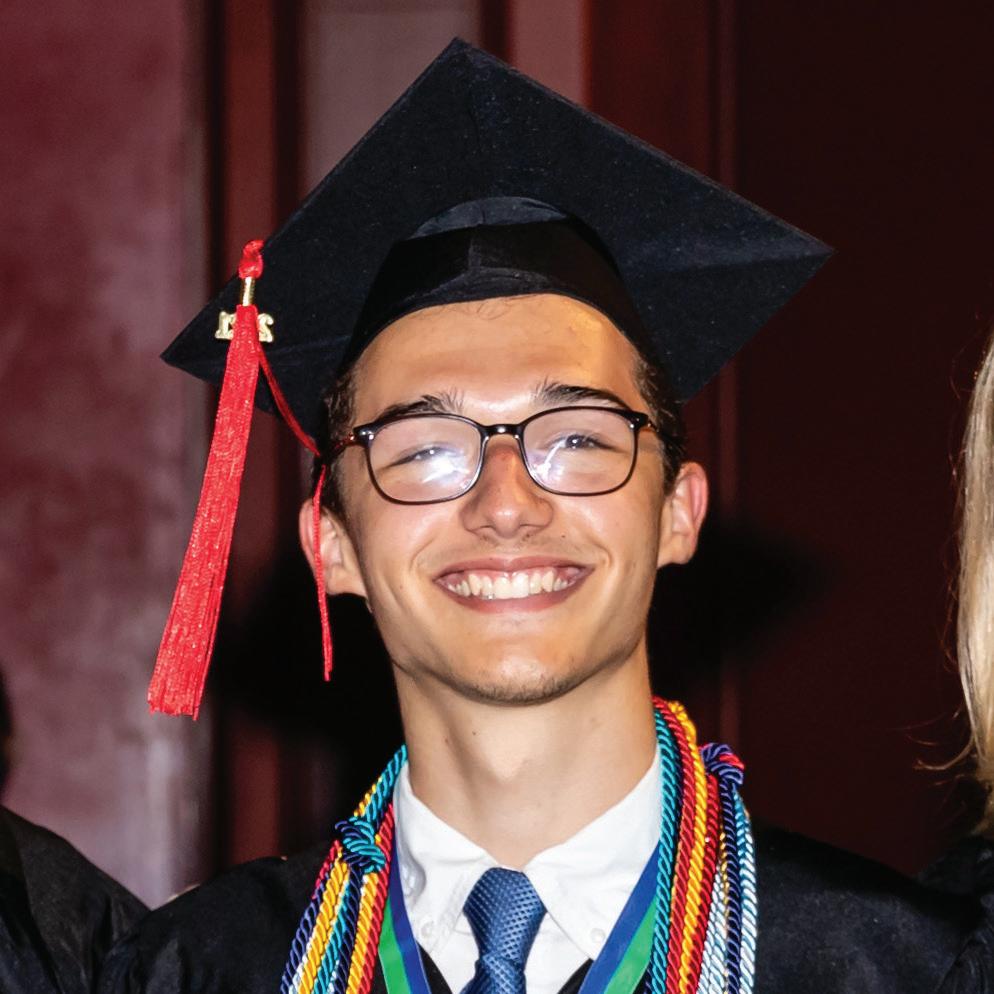
When I entered Mr. Michael Fallik’s civics class on my first day of eighth grade, I saw a quote pasted to the classroom wall that conveyed in one sentence why I was attending Miami Country Day School. It was Thomas Jefferson’s argument that education made democratic self-government possible: “an enlightened citizenry is indispensable for the proper functioning of a republic.” Though this went way over my head at the time, I realized in the years after that MCDS was advancing Jefferson’s vision through the education it provided for its students. The school gave me the intellectual and social skills to govern my life according to my interests and values – what is broadly defined as finding self-purpose. And more importantly, MCDS’ faculty encouraged my passion for public affairs and inspired me to pursue a career in public service, where I could use my education to make our country function better.
The most essential skill I acquired from my MCDS education was critical thinking – how to analyze a piece of evidence and use it to support an answer to a question. Though this may sound simple, no skill is more useful for answering small questions, such as those on a test, and more high-stakes problems, such as how a country can best guarantee security and prosperity for its citizens. Like all important lessons, I learned critical thinking the hard way. In her 9th grade English class, Mrs. Carolyn Dorn would challenge me to cull evidence from Greek myths, Shakespeare, and great American short stories to build arguments about the dangers of hubris, the corrupting influence of political power, and the importance of filial piety. By setting high standards for my work, Mrs. Dorn set a foundation for how to communicate my case to any audience with cogent logic and clear style.
While Mrs. Dorn was building me into a better analyst of the human experience, MCDS’ math and science teachers made sure I nurtured another invaluable skill: induction and deduction – how to build a general theory from observations
and test existing theories. Though I did not know it at the time, Mr. Michael Hutsko’s lectures on calculus and Mr. Peter Konen’s lab experiments did more than teach me how to calculate the area under a curve and extract DNA from a bacteria sample. They were demonstrating how human knowledge has actually been built over centuries and how I could contribute to that project in my lifetime. This revelation was at once empowering and humbling, since it forced me to consider how I could use my college education for larger purposes beyond my own edification.
What all of my teachers impressed on me was that learning is a communal activity even if you often do it alone. All education is an iterative process, making every book you read a conversation with the author and every experiment you run a small advancement in humanity’s understanding of the natural world. That is why MCDS emphasized another skill central to success in professional life: group-based problem-solving. MCDS’ teachers recognized that the collaborative skills required to succeed in any professional organization are not innate but must be taught at an early age. Exploring open-ended questions in Socratic seminars and solving math problems at roundtables taught me how to acknowledge the merits of another person’s argument, incorporate their ideas into my understanding of a problem, and delegate responsibilities to collectively arrive at a solution. These cognitive and social skills have underpinned my work with my peers in college and colleagues in the public sector.
While teaching me how to think, MCDS also exposed me to a set of questions that have occupied most of my academic and professional work since high school. Dr. Brian Dille’s Comparative Politics course first introduced me to the field of political science, which seeks answers to such questions as why autocratic regimes are often so resilient, how countries can deter war and induce peace, and under
what conditions the rule of law thrives in a democracy. In particular, Dr. Dille’s lectures on the Chinese government piqued my interest in that country’s domestic and foreign policy, which informed my decision to study Mandarin Chinese and US-China relations in college. It is unlikely I would have settled upon this career path without MCDS’ diverse course offerings and teachers who cared deeply about their students’ growth.
Yet MCDS did more than give me tools to answer questions about public affairs. Its teachers and administrators provided institutional support for me to go out and solve public policy issues in my community. When a group of students and I organized marches around Miami to pressure local governments to reduce carbon emissions, MCDS promoted our events to raise awareness and accommodated us when we left class early for meetings with elected officials. MCDS demonstrated that it wanted its students to become public leaders who find solutions to intractable policy problems. For guidance on how to build a career in public service, MCDS offered models in its teachers, who showed that there are few careers more fulfilling than those dedicated to the service of others.
Today, my academic and professional work in national security policy is grounded in the intellectual and social skills I honed in the classrooms at MCDS. As cognitive exercises, solving strategic problems about the best use of military resources to deter attacks against the United States is no different than solving math problems with classmates. Both employ critical thinking, logical reasoning, teamwork, and a zeal to answer the problem at hand. I am grateful to Miami Country Day for giving me an education that, in Jefferson’s words, enables me to contribute to the proper functioning of the republic.
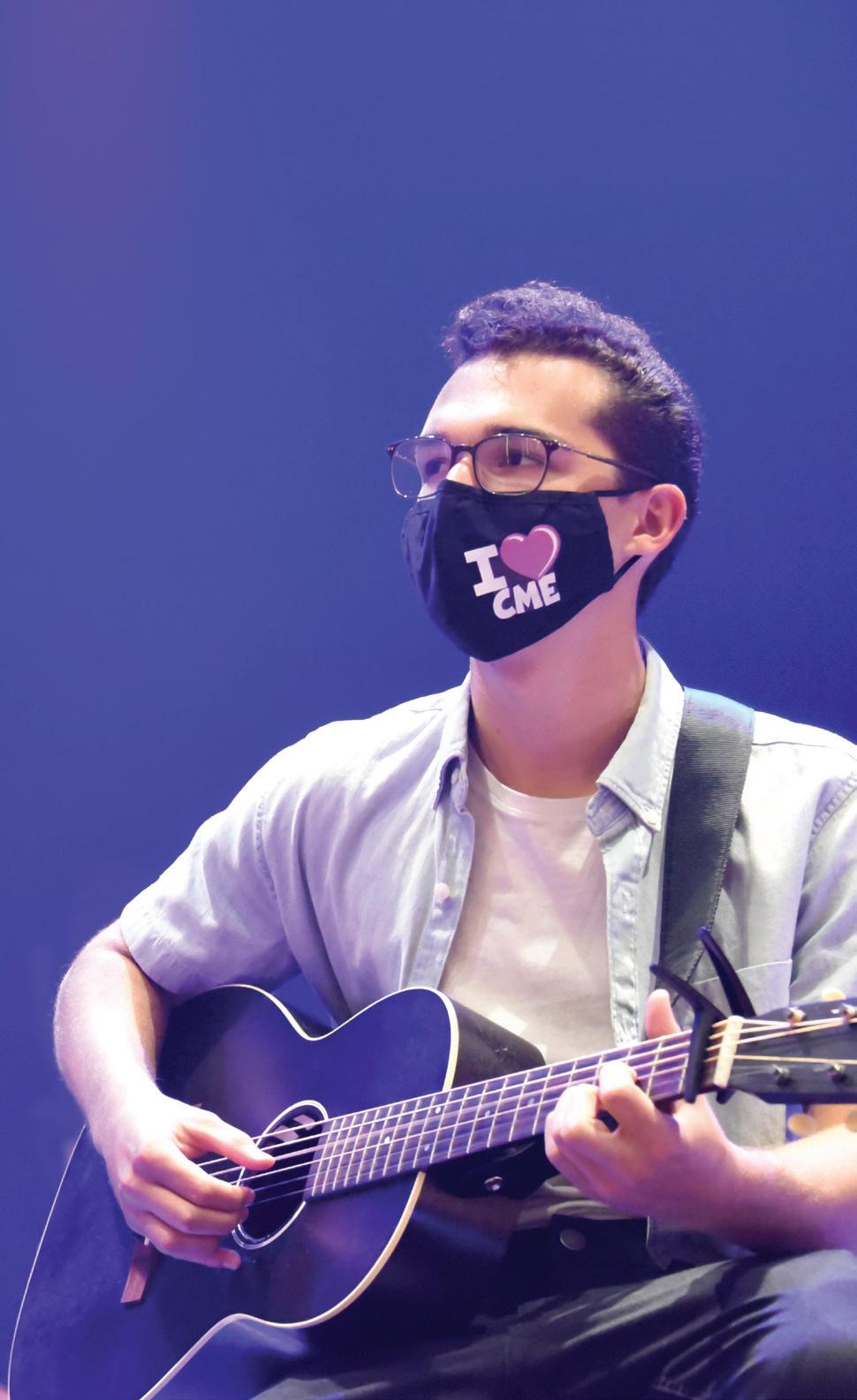
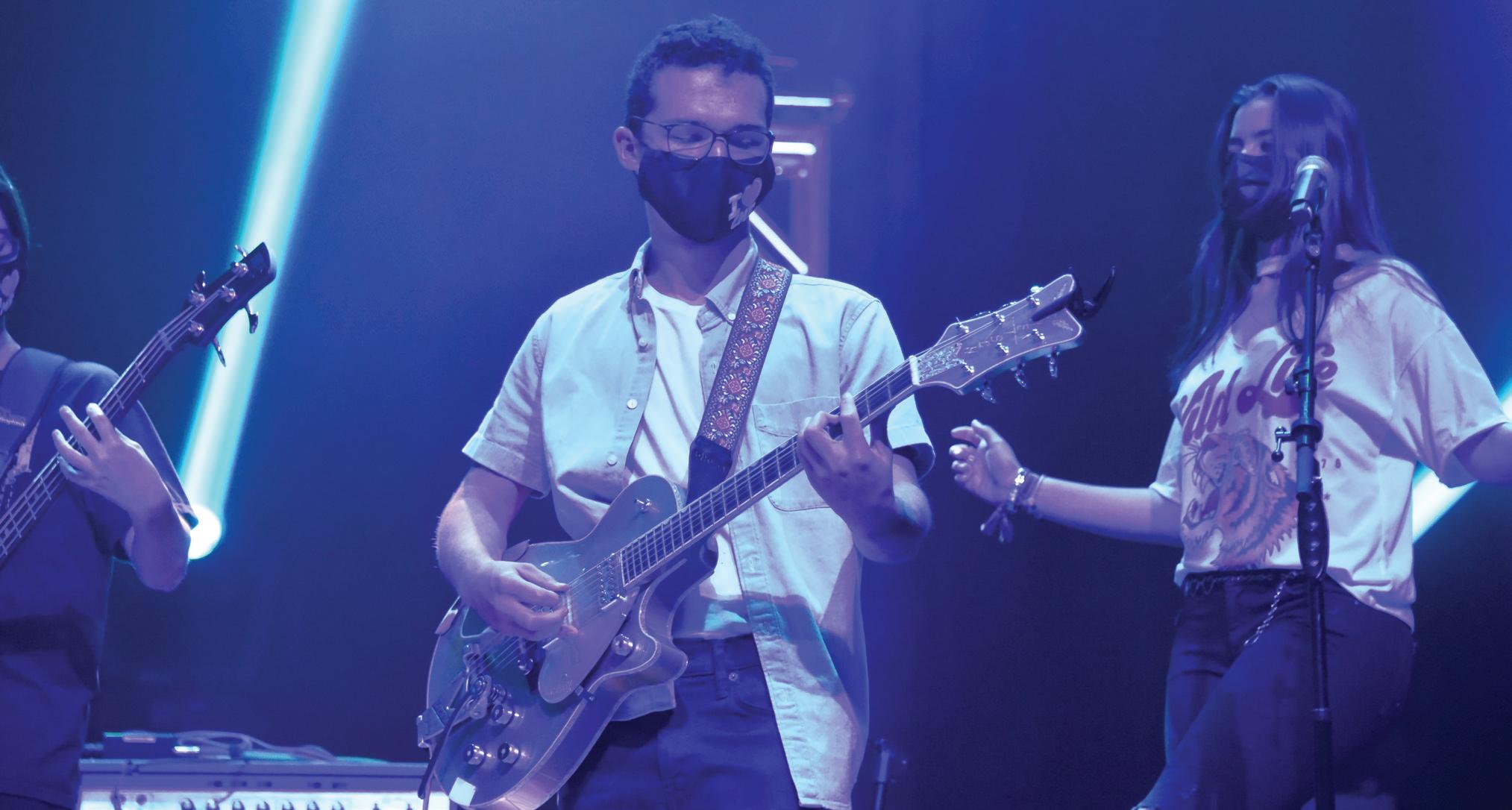
The first-ever breakfast honoring alumni who are MCDS parents was hosted on campus March 14, 2025 in the Alumni Boardroom.
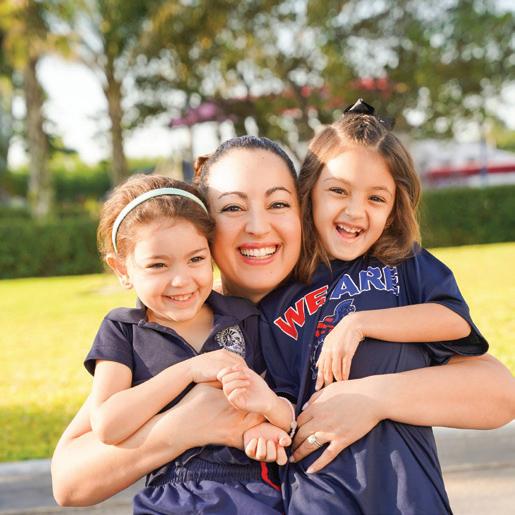

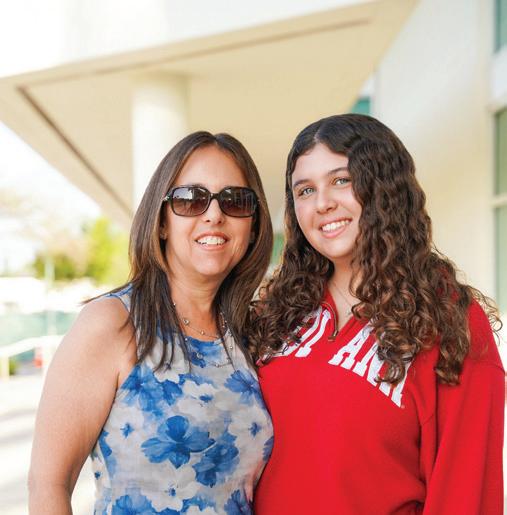
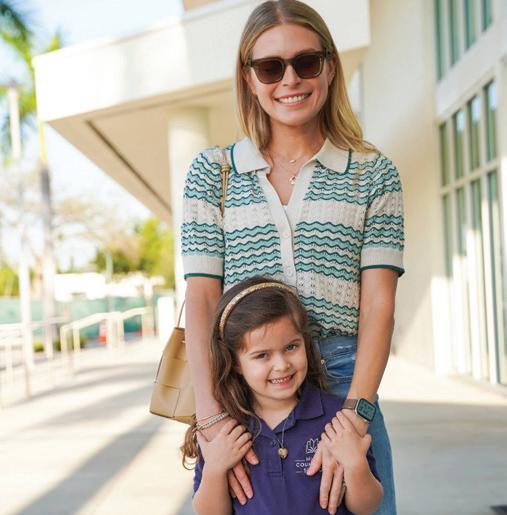
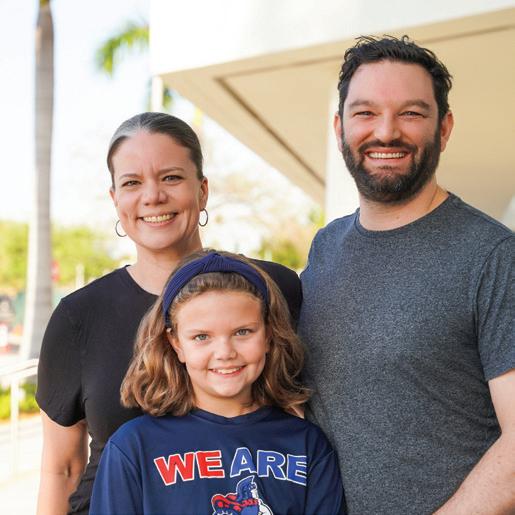
“My time as a student at Miami Country Day School left an indelible feeling of home—an experience so profound that it inspired us to work hard to ensure our daughter, Leyla, could also have the same opportunity. The safe and nurturing environment at MCDS made learning not only enjoyable but also made making friends feel effortless. The sense of belonging that the school fosters has transcended
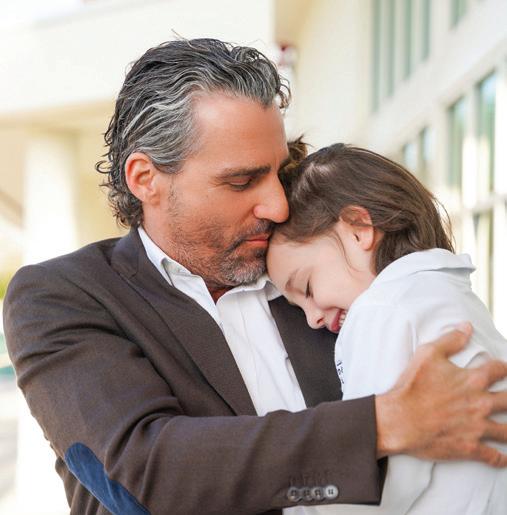

more than 20 years, and now, Leyla experiences the same warmth and comfort that I did as a student.
MCDS doesn’t just teach inside the classroom; it nurtures character, instills values, and shapes individuals who carry these lessons far beyond the walls of the school. It’s been a privilege to witness the school’s growth—evolving with new technologies and state-of-the-
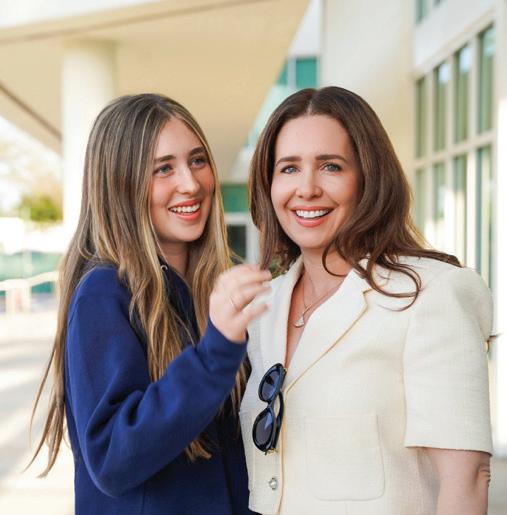
art facilities that make me, as an alumna, wish I could go back and experience them myself.”
Karina Heegard
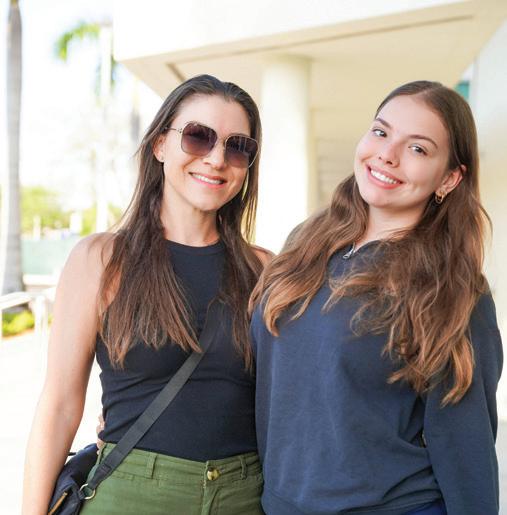
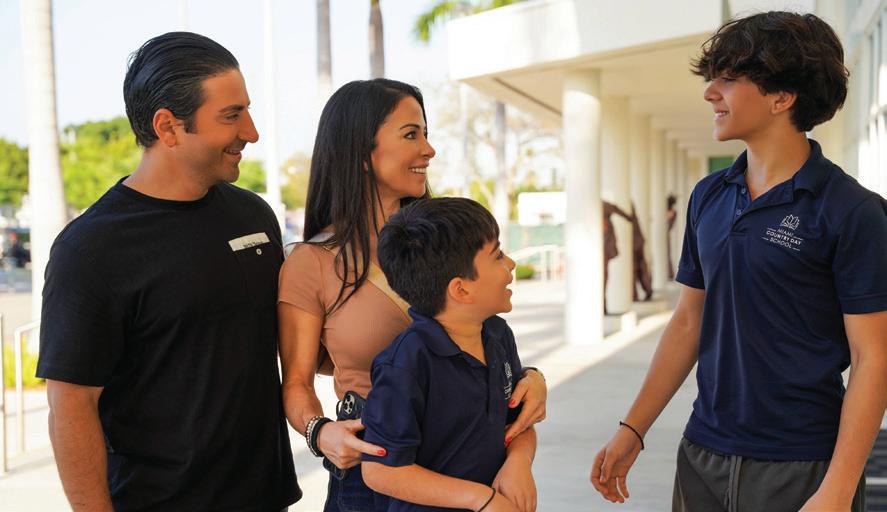
Karakhanian
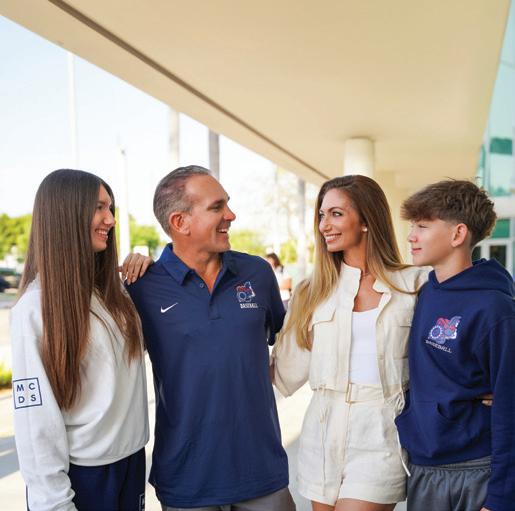
Jordi Mutchnik ’27, Ari Mutchnik ’95, Brittany Mutchnik, & Ryder Mutchnik ’30
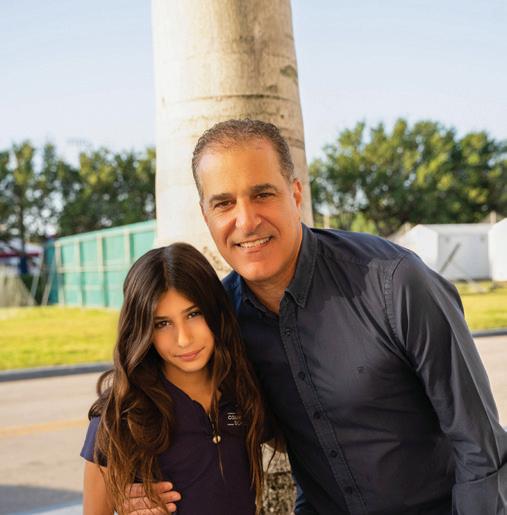
India Elias ’31 & Jamie Elias ’87
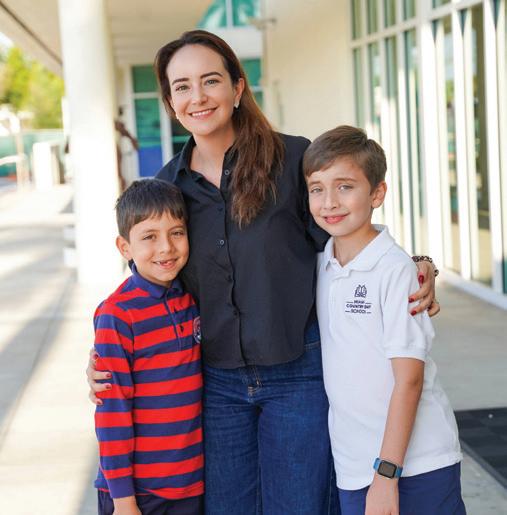
Elon Morgenstern ’35, Tatiana Peisach ’07 & David Morgenstern ’33
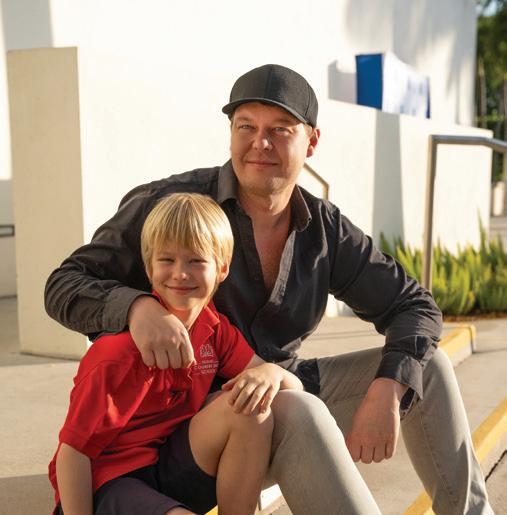
Pavel Pojidaev ’00 & Daniil Pojidaev ’33
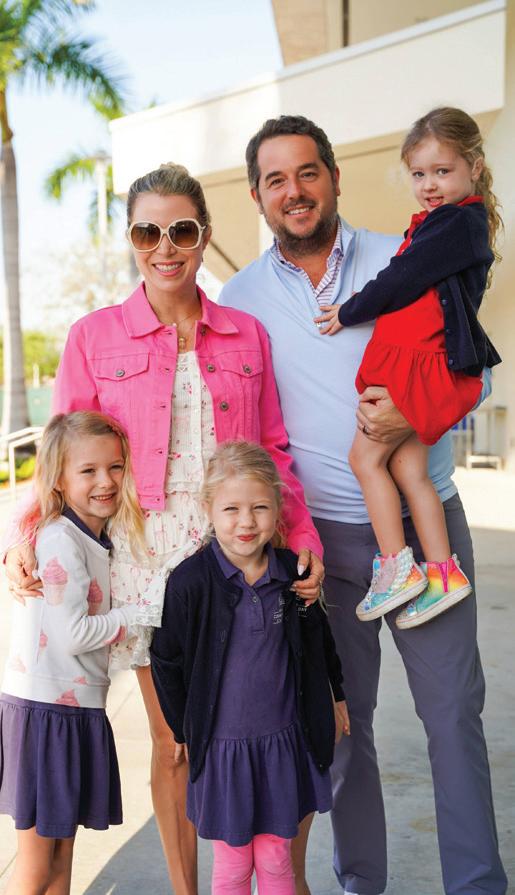
Jagger Tinkler ‘37, Jennifer Tinkler, Jordyn Tinkler ‘38, Lance Tinkler ’01 & Jacquelyn Tinkler ’39
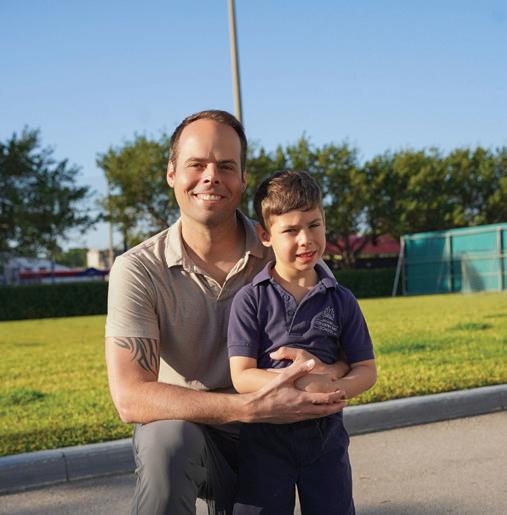
Ike Boruchow ’99 & Ikey Boruchow ’37
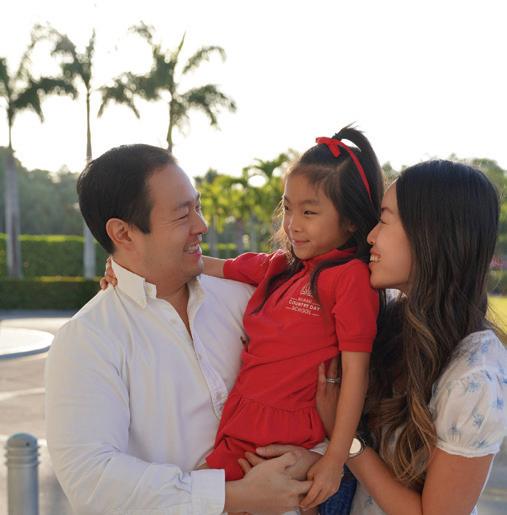
Robert Doo ’01, Gaby Doo ’37 & Rebecca Doo.
“I couldn’t be more proud to have my daughters, Jacquelyn (PK-3), Jordyn (JK-4) & Jagger (SK-5), attending MCDS. While Country Day has grown exponentially, the traditions, experiences and values that define MCDS remain secure from my generation to the next generation of Spartans. The culture of community MCDS has created and secured has clearly formed a foundation that provided me significant confidence while not only growing up & attending MCDS but throughout my career, and I know it will be the same for my daughters. I’m proud to call myself and my daughters Spartans!”
Lance A. Tinkler, ‘01
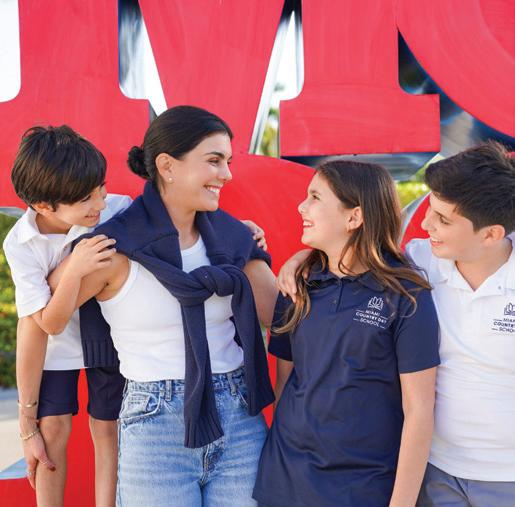
Jonathan Salanic ’35, Alexandra Haime-Salanic ’05, Savannah Salanic ’32 & Benji Salanic ’30

Janine Kochen, Samuel Kochen ’36, & Brandon Kochen ’07
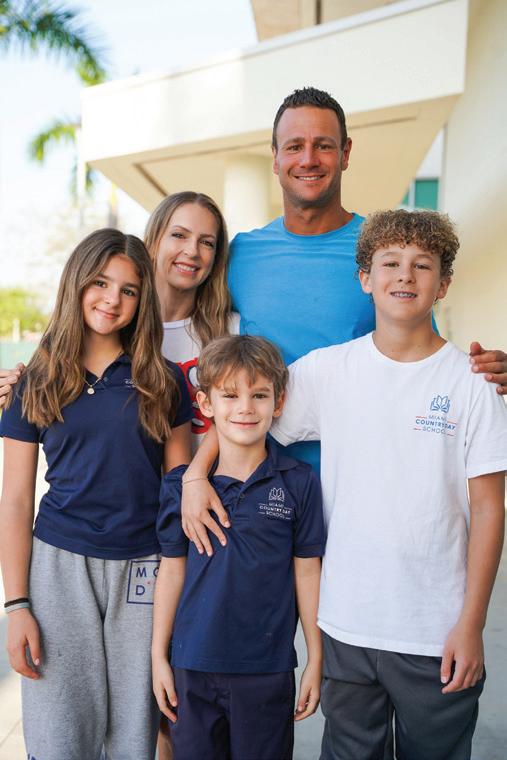
Aria Sherman ‘31, Nirvana Sherman ’96, Theo Sherman ‘35, Ryan Sherman ’95, & Aaron Sherman ’29
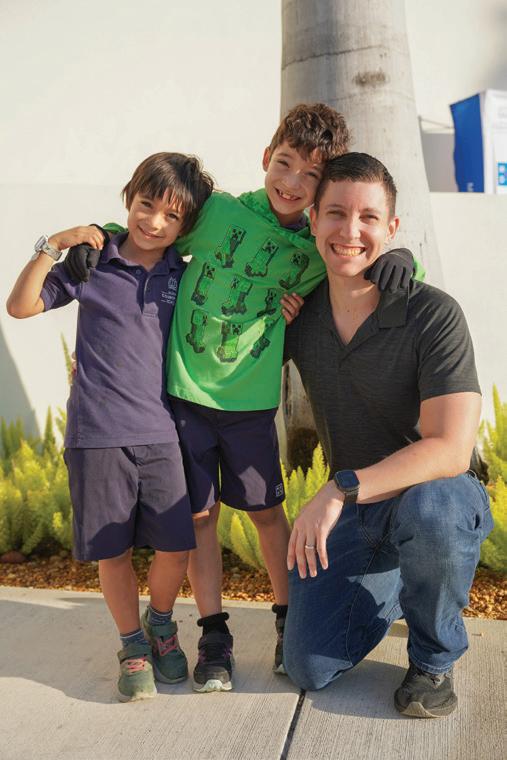
Bastian Locatelli ’36, Theodore Locatelli ’34, & Marcos Locatelli ’07
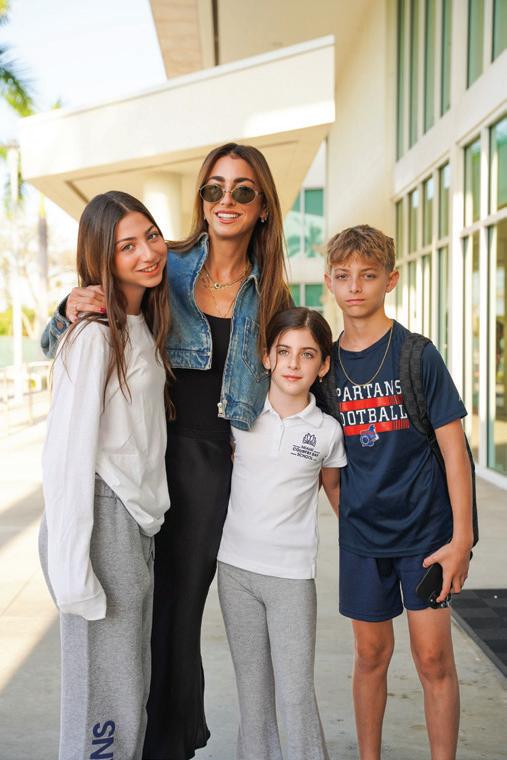
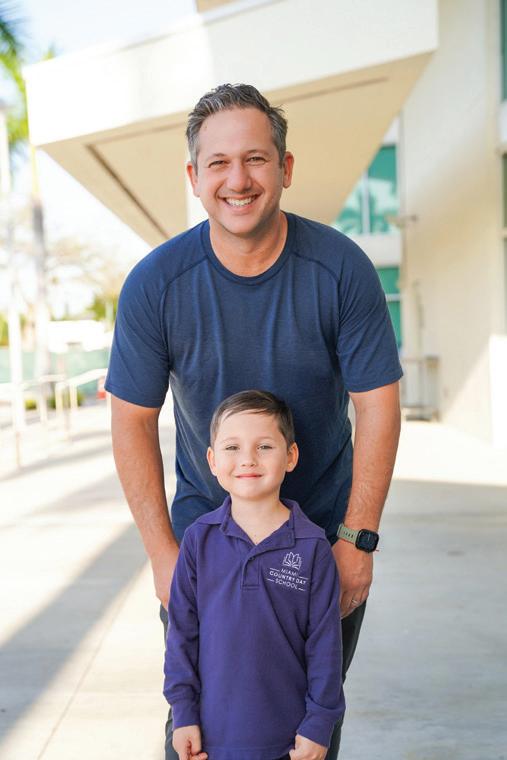
Jon Gitman ’04 & Leon Gitman ’38
& Brody Schinman ’31
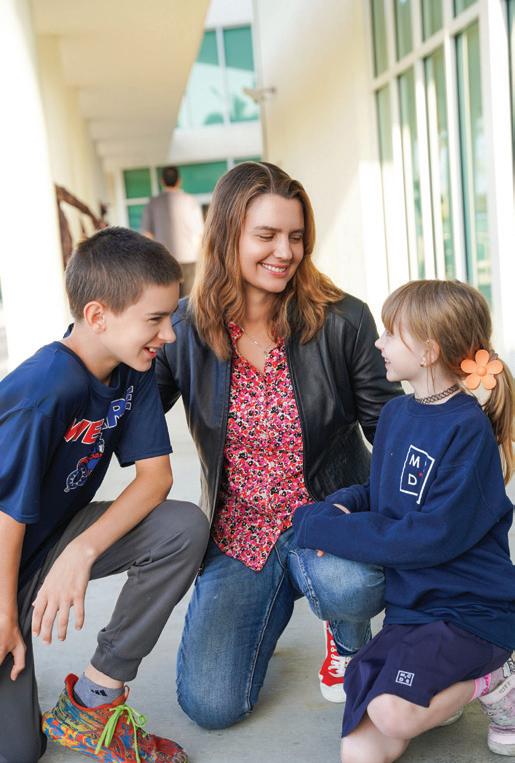
Colton Humphrey ’30, Tracy Towle Humphrey ’96, & Clover Humphrey ’35
Miami Country Day School has been a special part of my entire life. I am an alum, a daughter of an alum, a sister of an alum and now my husband Jeff and I are the parents of two current students. I loved being a student at MCDS and it makes me extremely happy and joyful to see both Colton, Class of 2030 and Clover, Class of 2035, both equally love MCDS as much as I did. While the campus has grown tremendously—along with the number of students, faculty, and staff—the school’s core values, traditions, and sense of community remain as strong as ever.
My father, John Towle, Class of 1951, also attended MCDS and we often discuss how much the school shaped us into the people we are today. The impact is woven into our daily lives and I know it will
continue to shape my two children as well. It is incredible to witness their personal and academic growth, both in and outside of the classroom. They are challenged, inspired and learning every single day.
It is truly amazing and special that my children and I even share some of the same teachers and coaches. Coach Chris Hayes coaches my son in cross country and Coach Hayes coached me in track & field. Mr. Rick Muhlig works with my son in the math lab and Mr. Muhlig was my math teacher in middle and high school. Coach Chuck Sennett is the athletic director for both of my children and Mr. Sennett was my math teacher. These connections make MCDS even more meaningful.
Just as my mother, Carol Towle, was deeply involved in the
school when I was a student, I, too, love being an active member of the community. I am honored to be on the Parents’ Association Executive Board and volunteer for countless events including my favorites the Holiday Bazaar, the fourth grade triathlon, the Yule Log, the Scholastic Book Fair and Homecoming. I love how I enjoyed the traditions of the Holiday Bazaar, Yule Log and Homecoming also as a student.
We are a proud family of Spartans and it makes me so happy everyday to drive both of my children to and from school and anytime I am on campus, I am filled with pride, gratitude, happiness and cherished memories which will remain with me always.
Thank you & Go Spartans! Tracy Towle Humphrey ’96

We love keeping up with our MCDS alumni! Whether you’ve started a new job, launched a business, gotten married, welcomed a new addition to the family, or pursued further education—we want to celebrate with you!
If you’d like to share your story with the MCDS community, scan the QR code or email us at Alumni@miamicountryday.org. We can’t wait to hear from you!
Craig Green ’93 and Lauren Bacon were married February 10, 2024. MCDS classmate, Brian Maser ’93, was his best man. They’ve been friends since Kindergarten at MCDS.
Congratulations to Nicole A. Holtz ’09 on her marriage to Josh Spielman on August 17, 2024 and they are making their home in Miami.
Congratulations to Jordan Hackmeier ’10 on his marriage to Manoela Schneider on January 14, 2024.
Tyler Jove ’10 and Tatiana Seikaly ’13 were married September 7, 2024 and they are residing in Miami.
Congratulations to Larry Gitman ’11 on his marriage to Michelle Gitman on August 25, 2024.
Melissa Mosheim ’06 and her husband, James Ryan, welcomed Walker Hampton Ryan to the world February 24, 2024.
Marissa Bolton ’11 and her husband, Todd Seaver, welcomed their son Jack Henry on April 14, 2024.
Congratulations to Sandy Aronson ’10 and his wife, Sara, on the birth of their son, Andrew “ Drew” Elias Aronson, August 3rd, 2024
Congratulations to Rachael Kamlet ’10 and Andrew Plasker on the arrival of their son, Bernie Kamlet Plasker born on December 13, 2024.
PLEASE NOTE:
Our apologies if we missed your exciting news. If you have any personal or professional updates you would like to include in a future Beacon, please send your updated information to: alumni@miamicountryday.org
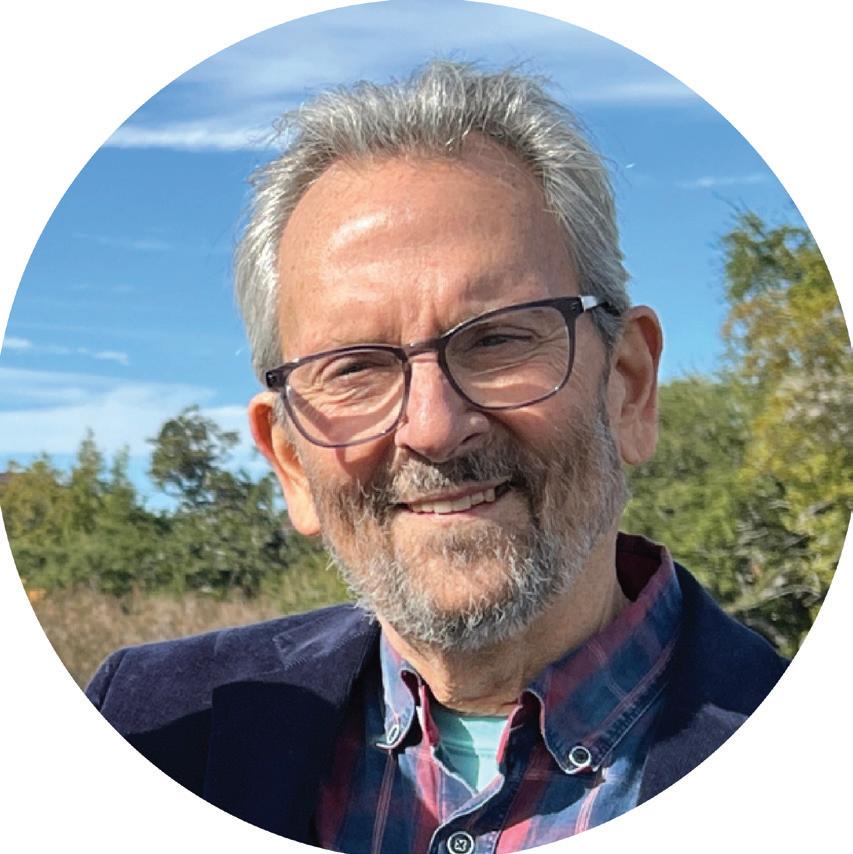
We share in the enduring legacy of John Wicker, a teacher who profoundly impacted all those fortunate enough to have had him as a colleague, teacher, friend, and family man. He has touched hearts and minds in our community through his music, spirit, and unwavering dedication.
We thought it only fitting that his legacy live on forever through the establishment of the John Wicker Music Scholarship at Miami Country Day School. This scholarship ensures that his passion for music and love of students will reach generations to come.”
Terry Alfonso, Director of Arts Education & Programs Longtime friend & colleague
Miami Country Day School is pleased to announce The John Wicker Music Scholarship to honor and recognize the impact Mr. Wicker had on so many students over the years. The John Wicker Music Scholarship is an award that will be available to music students in 10th and 11th grade who qualify for the Arts Diploma Endorsement. The recipient must be an Arts Diploma Endorsement music candidate who demonstrates keen interest and talent in music. The heart of the Miami Country Day School Mission is the education of the whole child, including the development of the aesthetic potential. We believe that developing interests and talent around music of all kinds is essential to develop one’s skills and talents in music.
In 2021, after thirty-six years of dedicated and generous service to Miami Country Day School, John Wicker retired from teaching. Sadly, in 2023 John died after a brief illness.
John had an amazing career of teaching music starting full-time at St. Rose of Lima in Miami Shores, then on to Archbishop Curley Notre Dame, and finally at Miami Country Day School. He taught continuously at MCDS for 36 years and taught for 46 years in total. John was named teacher of the year at both Archbishop Curley and Miami Country Day School.
John inspired countless students and colleagues to live their aspirations and passions in music and beyond. Whether teaching students about Emerson, Lake and Palmer, how to swing a jazz standard, how to rock out on stage or how to move the audience with a piece of transcendent, classical music, John held and nurtured his students to their highest artistic and personal potential to the delight of audiences filled with parents, teachers and more.
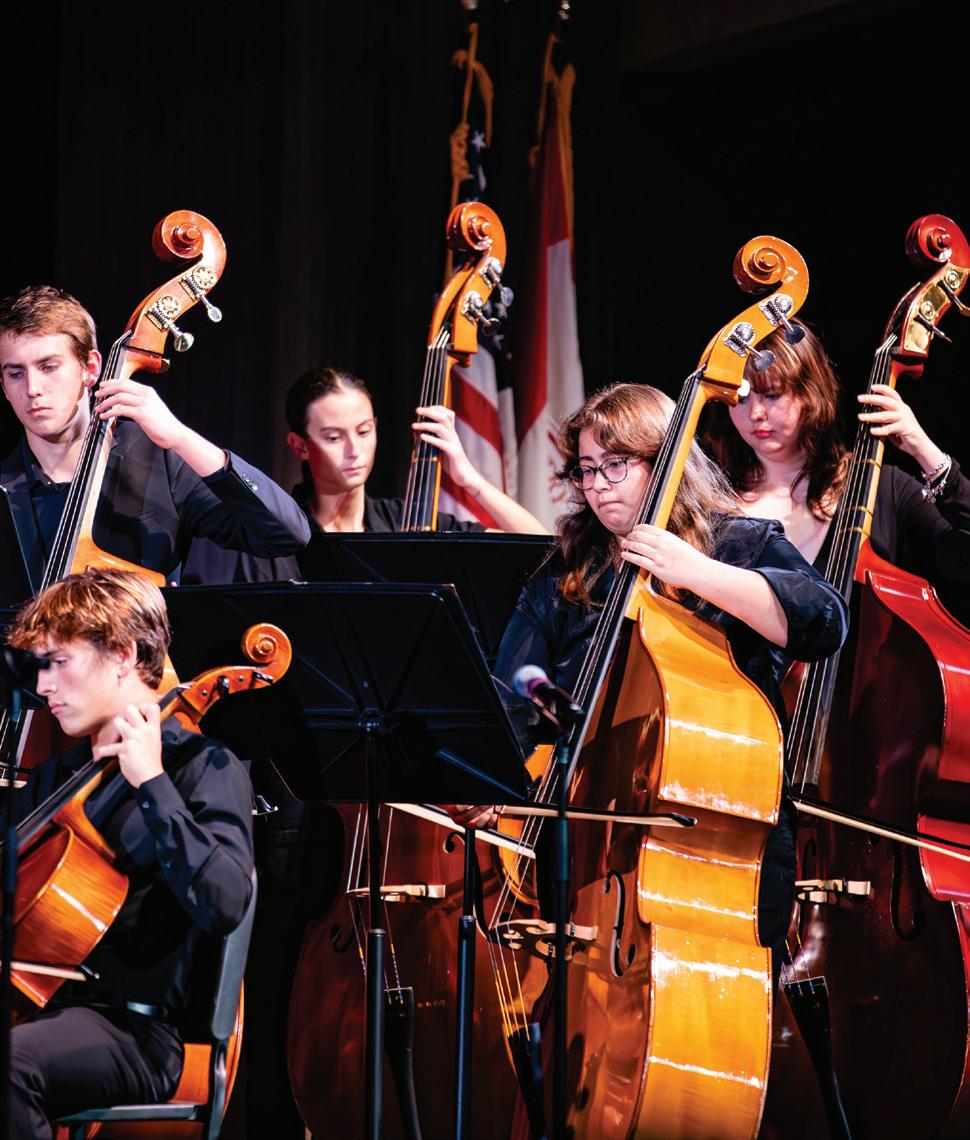
In the world of Music Education which is often dominated by large public-school programs, John put Miami Country Day School’s orchestra and music program on the map. John was an orchestra district chair and state certified orchestra judge for the Florida Orchestra Association (an honor reserved only for exceptionally accomplished directors). The school’s rock band, 21 Hearts, 1 Beat, was the first rock band to perform at the Florida Music Educators State Conference - and they were invited to return the following year. John was invited to bring a Country Day chorus and orchestra to Carnegie Hall. There are many superlatives, too many to list. His lifetime of teaching literally changed our world. His legacy lives on in his students and through this scholarship.
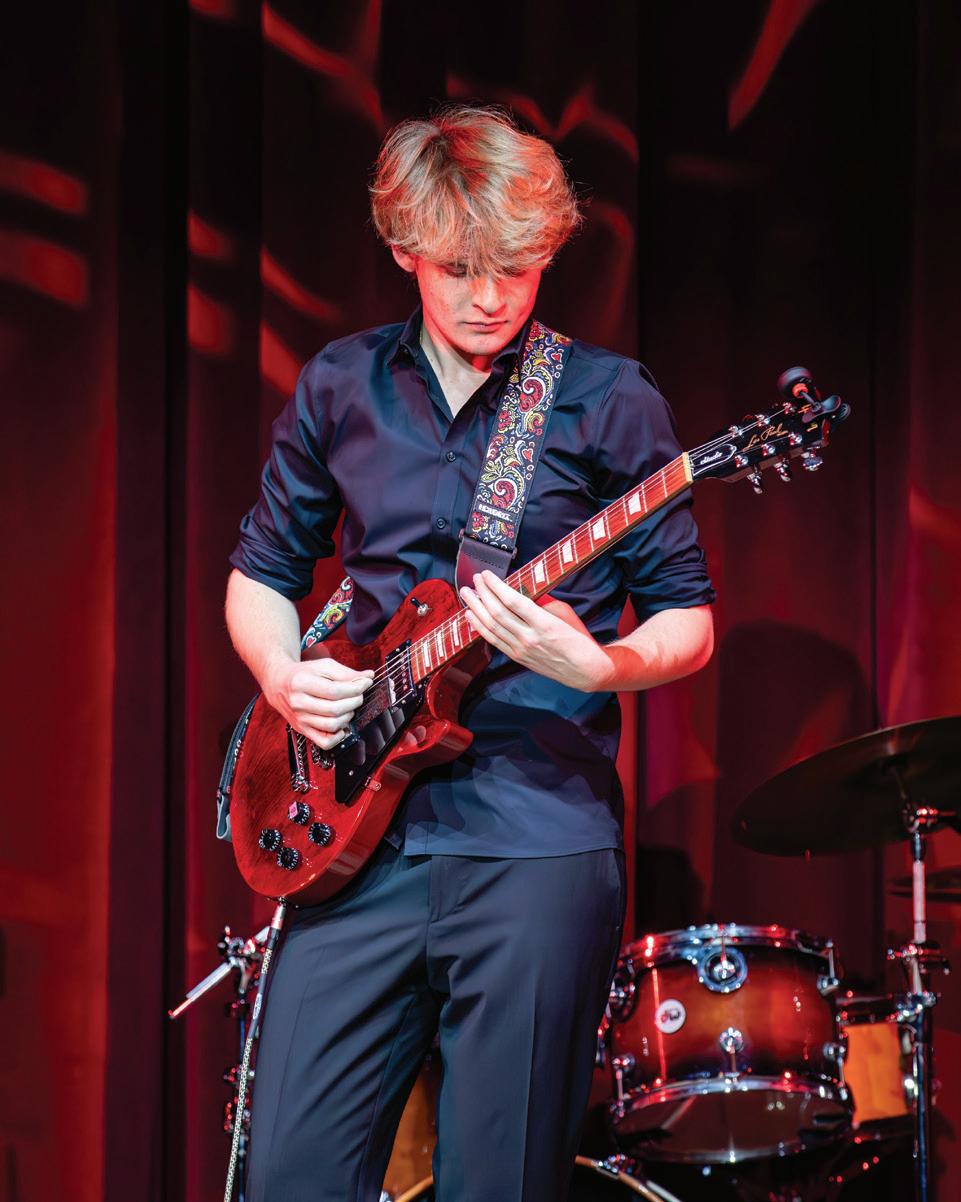
For more information about honoring John Wicker with a gift to the Scholarship, go to: www.miamicountryday.org/ WickerMusicScholarship, or contact Sheryl Piper, Director of Stewardship and Engagement at pipers@miamicountryday.org

Miami Country Day looks forward to celebrating these classes in the fall
Contact the Alumni Office for more details at alumni@miamicountryday.org
Class of 1985 | 40-Year Reunion
Class of 1995 | 30-Year Reunion
Class of 2005 | 20-Year Reunion
Class of 2015 | 10-Year Reunion
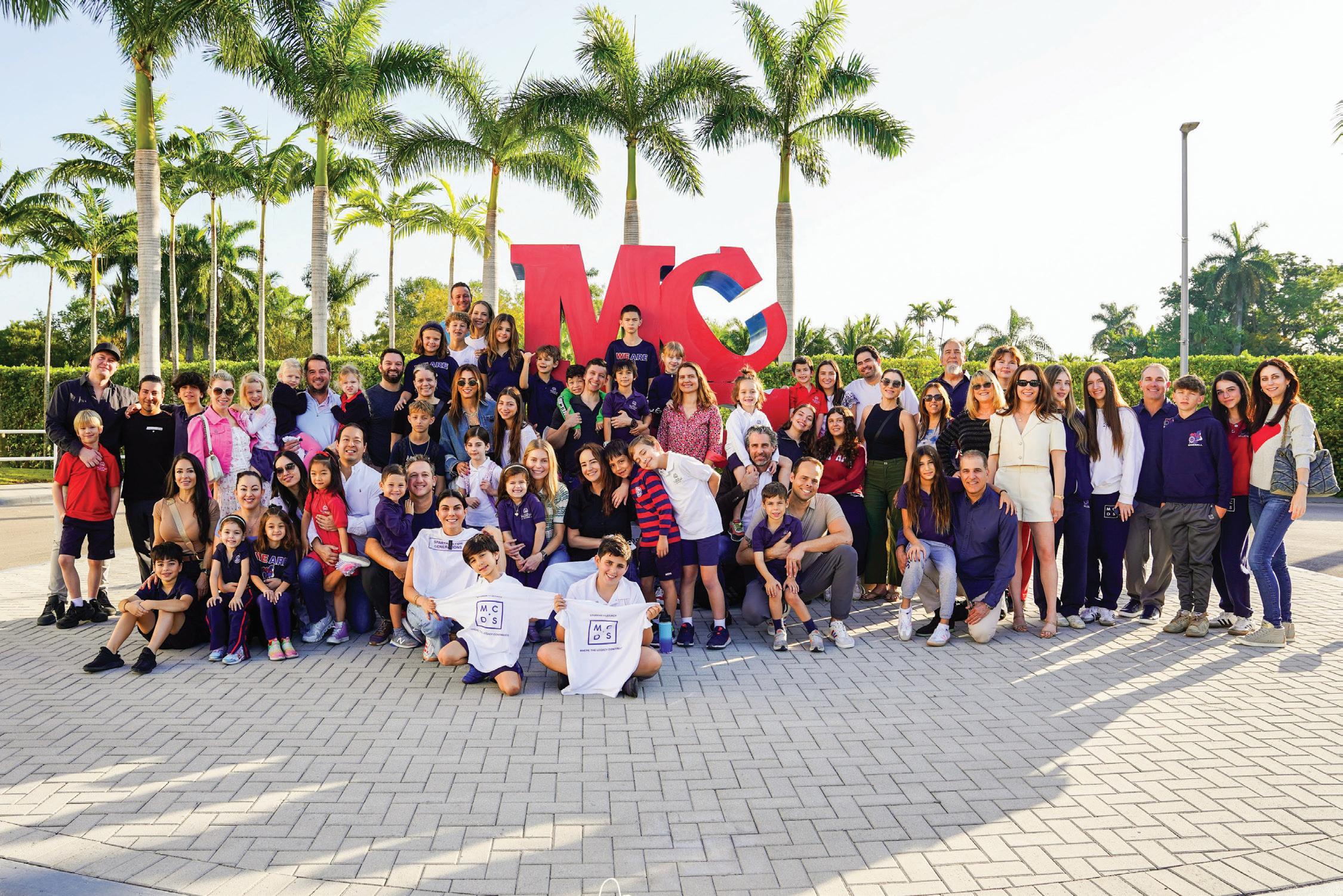


















Every student, every day, everywhere.
